
List of American Civil War Generals (Confederate)
Encyclopedia
- See also: List of American Civil War generals for an introduction and further information and
- List of American Civil War Generals (Union) and
- List of American Civil War brevet Generals (Union) for officers who were made generals by brevet only.
ConfederateConfederate States ArmyThe Confederate States Army was the army of the Confederate States of America while the Confederacy existed during the American Civil War. On February 8, 1861, delegates from the seven Deep South states which had already declared their secession from the United States of America adopted the...
generals
The United States War Department source (written by former Confederate General Marcus Joseph WrightMarcus Joseph Wright
Marcus Joseph Wright was a lawyer, author, and a Confederate general in the American Civil War. He was agent for collection of Confederate records for War of the Rebellion: Official Records of the Union and Confederate Armies, a U.S. War Department publication.-Early life:Wright was born in Purdy,...
), in the references section, lists the generals' grade, rank date, appointment date, and confirmation date. The other seven references have short summaries of each general's life and service. (Allardice is only a reference for the entries in the additional section currently at the end of the article.) A few of the sources do not list every general. Some sources may have information that others do not. All the information in this list is from these references, with the information in the notes prior to the additional section after the letter "Z" from one or more of the six principal references. The summaries in the references are in alphabetical order. Since the information in this article is from a limited number of sources, all of which are in alphabetical order, notes are omitted since the information is easily found on consecutive pages in one or more of the referenced books. A full listing would require hundreds, if not thousands, of notes and citations, which would be a large use of space for little real return. The first use of each reference, other than U.S. War Department {Wright}, is noted, mostly in connection with the first name in the list.
The abbreviation "USMA" refers to the United States Military Academy
United States Military Academy
The United States Military Academy at West Point is a four-year coeducational federal service academy located at West Point, New York. The academy sits on scenic high ground overlooking the Hudson River, north of New York City...
at West Point, New York and the year following the abbreviation is the year the general graduated from West Point. Similarly, the abbreviation "VMI" refers to the Virginia Military Institute
Virginia Military Institute
The Virginia Military Institute , located in Lexington, Virginia, is the oldest state-supported military college and one of six senior military colleges in the United States. Unlike any other military college in the United States—and in keeping with its founding principles—all VMI students are...
at Lexington, Virginia. If no year follows the college name, the source gives no year and presumably the general left school before graduating. The abbreviations for the dates of ranks or grades are "rank" for the date the promotion was to rank from, "nom" from the date the officer was nominated for the office by President Jefferson Davis, and "conf" which is the date the promotion was confirmed by the Confederate Senate. The general is buried at his place of death unless otherwise noted.
The notes now are reasonably complete as far as the original editor is concerned. The plan now is to review the entire article for consistency and possible additional edits, as well as a format change now shown in the "A", "B", "V", "W", "Y" and "Z" sections. Full sentences are not used in the notes in order to conserve space in a long article and because full articles have been written for most of the generals and are planned for the others.
| Confederate Confederate States Army The Confederate States Army was the army of the Confederate States of America while the Confederacy existed during the American Civil War. On February 8, 1861, delegates from the seven Deep South states which had already declared their secession from the United States of America adopted the... generals: |
A | B | C | D | E | F | G | H | I | J | K | L | M | N | O | P | Q | R | S | T | U | V | W | X | Y | Z | Others |
A
| Image | Name | Rank | Date, Place of Birth | Date, Place of Death | Adams, Daniel Weisiger Daniel Weisiger Adams Daniel Weisiger Adams was a noted lawyer and a brigadier general in the Confederate Army during the American Civil War.-Early life and career:... | Brigadier General rank, nom: May 23, 1862 conf: September 30, 1862 |
May or June 1821, Frankfort, Kentucky |
June 13, 1872, New Orleans, Louisiana Buried: Jackson, Mississippi |
Pre-war: Brother of Brigadier General William Wirt Adams. Lawyer in Mississippi and Louisiana. Son of a federal judge. Killed a newspaper editor who criticized father at Vicksburg. Acquitted of murder. Mississippi state senator, 1852-1856. Moved to Louisiana, entered business. War: Lieutenant colonel 1st Louisiana Regulars, later colonel. Lost right eye at the Battle of Shiloh Battle of Shiloh The Battle of Shiloh, also known as the Battle of Pittsburg Landing, was a major battle in the Western Theater of the American Civil War, fought April 6–7, 1862, in southwestern Tennessee. A Union army under Maj. Gen. Ulysses S. Grant had moved via the Tennessee River deep into Tennessee and... . Fought at Battle of Perryville Battle of Perryville The Battle of Perryville, also known as the Battle of Chaplin Hills, was fought on October 8, 1862, in the Chaplin Hills west of Perryville, Kentucky, as the culmination of the Confederate Heartland Offensive during the American Civil War. Confederate Gen. Braxton Bragg's Army of Mississippi won a... . Wounded at the Battle of Stones River Battle of Stones River The Battle of Stones River or Second Battle of Murfreesboro , was fought from December 31, 1862, to January 2, 1863, in Middle Tennessee, as the culmination of the Stones River Campaign in the Western Theater of the American Civil War... (Murfreesboro). Wounded and captured at the Battle of Chickamauga Battle of Chickamauga The Battle of Chickamauga, fought September 19–20, 1863, marked the end of a Union offensive in southeastern Tennessee and northwestern Georgia called the Chickamauga Campaign... . Later exchanged. In command in most of Alabama at end of war. Led cavalry brigade in opposition to Union General Wilson's 1865 raid into Alabama. Paroled May 9, 1865. Post-war: lawyer. |
|---|---|---|---|---|---|---|---|---|---|
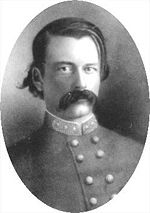 |
Adams, John | Brigadier General rank: December 29, 1862 nom: January 9, 1863 re-nom: May 23, 1863 conf: February 17, 1864 |
July 1, 1825, Nashville, Tennessee |
November 30, 1864, Franklin, Tennessee Buried: Pulaski, Tennessee |
Pre-war: United States Military Academy United States Military Academy The United States Military Academy at West Point is a four-year coeducational federal service academy located at West Point, New York. The academy sits on scenic high ground overlooking the Hudson River, north of New York City... (USMA), 1846. Mexican-American War veteran. Resigned from U.S. Army, May 31, 1861. War: Appointed captain of cavalry in command at Memphis. Colonel, May 1862. Led Brigade at Siege of Vicksburg. Under Lieutenant General Polk in Mississippi and at Battle of Resaca Battle of Resaca The Battle of Resaca was part of the Atlanta Campaign of the American Civil War. The battle was waged in both Gordon and Whitfield counties, Georgia, from May 13 - 15, 1864. It ended inconclusively with the Confederate Army retreating. The engagement was fought between the Military Division of the... , Georgia during Atlanta Campaign Atlanta Campaign The Atlanta Campaign was a series of battles fought in the Western Theater of the American Civil War throughout northwest Georgia and the area around Atlanta during the summer of 1864. Union Maj. Gen. William T. Sherman invaded Georgia from the vicinity of Chattanooga, Tennessee, beginning in May... . Killed in action at head of Confederate assault at Battle of Franklin Battle of Franklin Battle of Franklin may refer to three battles of the American Civil War:* Battle of Franklin , a major battle fought November 30, 1864, at Franklin, Tennessee as part of the Franklin-Nashville Campaign... , Tennessee. |
||||
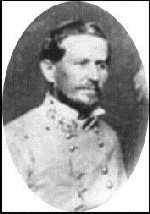 |
Adams, William Wirt William Wirt Adams William Wirt Adams was a United States district court judge for the state of Mississippi, a soldier for the Republic of Texas, and a Confederate officer and general in the American Civil War.-Early life and career:... |
Brigadier General rank: September 25, 1863 nom: September 28, 1863 conf: January 25, 1864 |
March 22, 1819, Frankfort, Kentucky |
May 1, 1888, Jackson, Mississippi |
Pre-war: Brother of Brigadier General John Weisiger Adams. Army of the Republic of Texas Republic of Texas The Republic of Texas was an independent nation in North America, bordering the United States and Mexico, that existed from 1836 to 1846.Formed as a break-away republic from Mexico by the Texas Revolution, the state claimed borders that encompassed an area that included all of the present U.S... . Planter, banker, Mississippi legislator in 1858 and 1860. War: Colonel, 1st Mississippi Cavalry. Independent cavalry command early in the war. Fought in Vicksburg campaign Vicksburg Campaign The Vicksburg Campaign was a series of maneuvers and battles in the Western Theater of the American Civil War directed against Vicksburg, Mississippi, a fortress city that dominated the last Confederate-controlled section of the Mississippi River. The Union Army of the Tennessee under Maj. Gen.... and with Lieutenant General Nathan Bedford Forrest in 1864–1865. Paroled May 12, 1865. Post-war: state revenue agent and postmaster of Jackson, Mississippi. Killed at Jackson by a newspaper editor with whom he had quarreled. |
||||
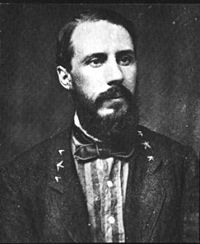 |
Alexander, Edward Porter Edward Porter Alexander Edward Porter Alexander was an engineer, an officer in the U.S. Army, a Confederate general in the American Civil War, and later a railroad executive, planter, and author.... |
Brigadier General rank: February 26, 1864 nom: March 1, 1864 conf: May 28, 1864 (Artillery) conf: June 10, 1864. |
May 26, 1835, Washington, Georgia |
April 28, 1910, Savannah, Georgia Buried: Augusta, Georgia |
Pre-war: USMA, 1857. War: Captain of engineers. Signal officer for General Beauregard at Battle of First Bull Run (First Manassas). Chief of ordnance of Army of Northern Virginia, then Chief of Artillery of Confederate Lieutenant General James Longstreet's Corps. Directed artillery fire before Pickett's Charge Pickett's Charge Pickett's Charge was an infantry assault ordered by Confederate Gen. Robert E. Lee against Maj. Gen. George G. Meade's Union positions on Cemetery Ridge on July 3, 1863, the last day of the Battle of Gettysburg during the American Civil War. Its futility was predicted by the charge's commander,... at the Battle of Gettysburg Battle of Gettysburg The Battle of Gettysburg , was fought July 1–3, 1863, in and around the town of Gettysburg, Pennsylvania. The battle with the largest number of casualties in the American Civil War, it is often described as the war's turning point. Union Maj. Gen. George Gordon Meade's Army of the Potomac... . With Longstreet at Battle of Chickamauga Battle of Chickamauga The Battle of Chickamauga, fought September 19–20, 1863, marked the end of a Union offensive in southeastern Tennessee and northwestern Georgia called the Chickamauga Campaign... , Knoxville Campaign Knoxville Campaign The Knoxville Campaign was a series of American Civil War battles and maneuvers in East Tennessee during the fall of 1863. Union forces under Maj. Gen. Ambrose Burnside occupied Knoxville, Tennessee, and Confederate forces under Lt. Gen. James Longstreet were detached from Gen... , Battle of Spotsylvania, Battle of Cold Harbor Battle of Cold Harbor The Battle of Cold Harbor was fought from May 31 to June 12, 1864 . It was one of the final battles of Union Lt. Gen. Ulysses S. Grant's Overland Campaign during the American Civil War, and is remembered as one of American history's bloodiest, most lopsided battles... and Siege of Petersburg Siege of Petersburg The Richmond–Petersburg Campaign was a series of battles around Petersburg, Virginia, fought from June 9, 1864, to March 25, 1865, during the American Civil War... . Paroled April 9, 1865. Post-war: professor of engineering, railroad president, rice planter, author and served in government posts. |
||||
 |
Allen, Henry Watkins Henry Watkins Allen Henry Watkins Allen was an American soldier and politician, and a general in the Confederate States Army during the American Civil War... |
Brigadier General rank, nom: August 19, 1863 conf: January 25, 1864 |
April 29, 1820, Prince Edward County, Virginia |
April 22, 1866 Mexico City, Mexico Buried: Baton Rouge, Louisiana |
Pre-war: Marion College, Missouri, graduate; Harvard Law School. Texas War of Independence veteran. Shot through the upper thighs in a duel, 1844. Louisiana legislator. War: Enlisted as private, immediately lieutenant colonel, soon colonel, 4th Louisiana Infantry. Wounded at Battle of Shiloh Battle of Shiloh The Battle of Shiloh, also known as the Battle of Pittsburg Landing, was a major battle in the Western Theater of the American Civil War, fought April 6–7, 1862, in southwestern Tennessee. A Union army under Maj. Gen. Ulysses S. Grant had moved via the Tennessee River deep into Tennessee and... ; leg shattered at Battle of Baton Rouge Battle of Baton Rouge (1862) The Battle of Baton Rouge was a ground and naval battle in the American Civil War fought in East Baton Rouge Parish, Louisiana, on August 5, 1862. The Union victory halted Confederate attempts to recapture the capital city of Louisiana.-Background:... . Resigned January 10, 1864. Governor of Louisiana during last year of war. Excellent administrator for Trans-Mississippi Department Trans-Mississippi Department The Trans-Mississippi Department was an administrative subdivision of the Confederate States of America west of the Mississippi, consisting of Texas, Arkansas, Missouri, Indian Territories recognized by the CSA, and parts of Western Louisiana... . Post-war: Died of a stomach disorder in Mexico City, where he established an English language newspaper; buried in the Old State Capitol, Baton Rouge, Louisiana. |
||||
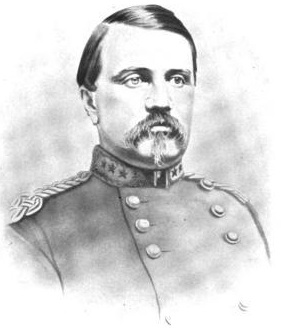 |
Allen, William W. William W. Allen William Wirt Allen was a major general in the Confederate States Army during the American Civil War. He rose through the ranks to command the Cavalry Corps of the Army of Tennessee in the last days of the war.... |
Brigadier General rank: February 26, 1864 nom: March 1, 1864 conf: June 9, 1864 |
September 11, 1835, New York City |
November 24, 1894, Sheffield, Alabama Buried: Birmingham, Alabama |
Pre-war: Raised in Montgomery, Alabama. Princeton University graduate, 1854. Planter. War: First lieutenant of Montgomery Mounted Rifles. Major, 1st Alabama Cavalry. Wounded at Perryville and Murfreesboro (Stones River). Cavalry brigade command in Maj. Gen. Wheeler's corps. Fought in Atlanta campaign. Appointed major general with temporary rank on March 4, 1865; Confederate Senate did not act on nomination. Paroled as a brigadier general, May 3, 1865. Post-war: adjutant general of Alabama, U.S. Marshal. | ||||
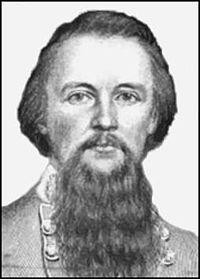 |
Anderson, George Burgwyn George B. Anderson George Burgwyn Anderson was a career military officer, serving first in the antebellum U.S. Army and then dying from wounds inflicted during the American Civil War while a general officer in the Confederate Army. He was among six generals killed or mortally wounded at the Battle of Antietam in... |
Brigadier General rank, nom: June 9, 1862 conf: September 30, 1862 |
April 12, 1831, Hillsboro, North Carolina |
October 16, 1862, Raleigh, North Carolina |
Pre-war: Attended University of North Carolina; USMA, 1852. U.S. Army until 1861. War: Commanded 4th North Carolina Infantry at Battle of First Bull Run (First Manassas), then commanded at Manassas Junction. Battles: Battle of Williamsburg Battle of Williamsburg The Battle of Williamsburg, also known as the Battle of Fort Magruder, took place on May 5, 1862, in York County, James City County, and Williamsburg, Virginia, as part of the Peninsula Campaign of the American Civil War... , Seven Days Battles Seven Days Battles The Seven Days Battles was a series of six major battles over the seven days from June 25 to July 1, 1862, near Richmond, Virginia during the American Civil War. Confederate General Robert E. Lee drove the invading Union Army of the Potomac, commanded by Maj. Gen. George B. McClellan, away from... . Wounded at the Battle of Malvern Hill Battle of Malvern Hill The Battle of Malvern Hill, also known as the Battle of Poindexter's Farm, took place on July 1, 1862, in Henrico County, Virginia, on the seventh and last day of the Seven Days Battles of the American Civil War. Gen. Robert E. Lee launched a series of disjointed assaults on the nearly impregnable... . Fought at Battle of South Mountain Battle of South Mountain The Battle of South Mountain was fought September 14, 1862, as part of the Maryland Campaign of the American Civil War. Three pitched battles were fought for possession of three South Mountain passes: Crampton's, Turner's, and Fox's Gaps. Maj. Gen. George B... . Mortally wounded at the Battle of Antietam Battle of Antietam The Battle of Antietam , fought on September 17, 1862, near Sharpsburg, Maryland, and Antietam Creek, as part of the Maryland Campaign, was the first major battle in the American Civil War to take place on Northern soil. It was the bloodiest single-day battle in American history, with about 23,000... (Sharpsburg), September 17, 1862. |
||||
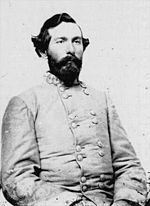 |
Anderson, George T. "Tige" George T. Anderson George Thomas Anderson was a general in the Confederate States Army during the American Civil War. Nicknamed "Tige," Anderson was noted as one of Robert E... |
Brigadier General rank, nom: November 1, 1862 conf. April 22, 1863 |
February 3, 1824, Covington, Georgia |
April 4, 1901, Anniston, Alabama |
Pre-war: Emory College Emory University Emory University is a private research university in metropolitan Atlanta, located in the Druid Hills section of unincorporated DeKalb County, Georgia, United States. The university was founded as Emory College in 1836 in Oxford, Georgia by a small group of Methodists and was named in honor of... student. Mexican-American War veteran. War: Colonel of 11th Georgia Infantry. Acting brigade commander, Seven Days Battles Seven Days Battles The Seven Days Battles was a series of six major battles over the seven days from June 25 to July 1, 1862, near Richmond, Virginia during the American Civil War. Confederate General Robert E. Lee drove the invading Union Army of the Potomac, commanded by Maj. Gen. George B. McClellan, away from... , Second Battle of Bull Run Second Battle of Bull Run The Second Battle of Bull Run or Second Manassas was fought August 28–30, 1862, as part of the American Civil War. It was the culmination of an offensive campaign waged by Confederate Gen. Robert E. Lee's Army of Northern Virginia against Union Maj. Gen... , Battle of Antietam. Brigadier general, Battles: Battle of Fredericksburg Battle of Fredericksburg The Battle of Fredericksburg was fought December 11–15, 1862, in and around Fredericksburg, Virginia, between General Robert E. Lee's Confederate Army of Northern Virginia and the Union Army of the Potomac, commanded by Maj. Gen. Ambrose E. Burnside... , Battle of Suffolk. Severely wounded at the Battle of Gettysburg Battle of Gettysburg The Battle of Gettysburg , was fought July 1–3, 1863, in and around the town of Gettysburg, Pennsylvania. The battle with the largest number of casualties in the American Civil War, it is often described as the war's turning point. Union Maj. Gen. George Gordon Meade's Army of the Potomac... . Attached to Longstreet's corps. Later Battles: Chickamauga, Knoxville Campaign Knoxville Campaign The Knoxville Campaign was a series of American Civil War battles and maneuvers in East Tennessee during the fall of 1863. Union forces under Maj. Gen. Ambrose Burnside occupied Knoxville, Tennessee, and Confederate forces under Lt. Gen. James Longstreet were detached from Gen... , Overland Campaign Overland Campaign The Overland Campaign, also known as Grant's Overland Campaign and the Wilderness Campaign, was a series of battles fought in Virginia during May and June 1864, in the American Civil War. Lt. Gen. Ulysses S. Grant, general-in-chief of all Union armies, directed the actions of the Army of the... , Siege of Petersburg. Paroled at Appomattox, April 9, 1865. Post-war: railroad agent, chief of police of Atlanta, Georgia and chief of police and county tax collector at Anniston, Alabama. |
||||
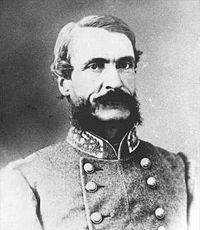 |
Anderson, James Patton James Patton Anderson James Patton Anderson was an American physician, lawyer, and politician, most notably serving as a United States Congressman from the Washington Territory, a Mississippi state legislator, and a delegate at the Florida state secession convention to withdraw from the United States.He also served in... |
Brigadier General rank, nom: February 10, 1862 conf: April 22, 1863 Major General nom: February 11, 1864 rank, conf: February 17, 1864 |
February 16, 1822, Franklin County, Tennessee. |
September 20, 1872, Memphis, Tennessee |
Pre-war: doctor, Mississippi legislator, Washington Territory marshal and delegate to U.S. Congress. Mexican-American War veteran. War: Colonel of 1st Florida Infantry. Battles: Pensacola, early in war, Shiloh, Perryville, Murfreesboro (Stones River), Chickamauga, Chattanooga Chattanooga Campaign The Chattanooga Campaign was a series of maneuvers and battles in October and November 1863, during the American Civil War. Following the defeat of Maj. Gen. William S. Rosecrans's Union Army of the Cumberland at the Battle of Chickamauga in September, the Confederate Army of Tennessee under Gen... . Severely wounded at Battle of Jonesboro, Georgia. Rejoined army in North Carolina for surrender at Greensboro. Post-war: farm paper editor, tax collector. |
||||
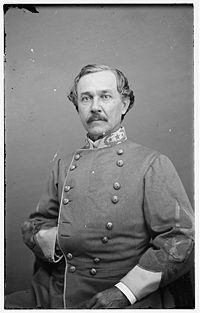 |
Anderson, Joseph R. Joseph R. Anderson Joseph Reid Anderson was an American civil engineer, industrialist, and soldier. During the American Civil War he served as a Confederate general, and his Tredegar Iron Company was a major source of munitions and ordnance for the Confederate States Army.-Early life and career:Joseph Reid Anderson... |
Brigadier general rank, nom: September 3, 1861 conf: December 13, 1861 |
February 16, 1813, Botetourt County, Virginia. |
September 7, 1892, Isle of Shoals, New Hampshire Buried: Richmond, Virginia |
Pre-war: USMA, 1836. War: Resigned as Confederate Army brigadier general on July 19, 1862 to resume control of Tredegar Iron Works Tredegar Iron Works The Tredegar Iron Works was a historic iron foundry in Richmond, Virginia, United States of America, opened in 1837. During the American Civil War, the works served as the primary iron and artillery production facility of the Confederate States of America... , a main supplier of ordnance Artillery Originally applied to any group of infantry primarily armed with projectile weapons, artillery has over time become limited in meaning to refer only to those engines of war that operate by projection of munitions far beyond the range of effect of personal weapons... to the Confederate Army, in Richmond, Virginia. Post-war: Seized by federal government after war, Works were returned to owners in 1867. Anderson operated them until his death. |
||||
 |
Anderson, Richard Heron "Fighting Dick" Richard H. Anderson Richard Heron Anderson was a career U.S. Army officer, fighting with distinction in the Mexican-American War. He also served as a Confederate general during the American Civil War, fighting in the Eastern Theater of the conflict and most notably during the 1864 Battle of Spotsylvania Court House... |
Brigadier general rank, nom: July 18, 1861 conf: August 28, 1861 Major General rank, nom: July 14, 1862 conf: September 27, 1862 |
October 7, 1821, Sumter County, South Carolina |
June 26, 1879, Beaufort, South Carolina |
Pre-war: USMA, 1842. Mexican-American War veteran. War: In command at Charleston, South Carolina when Gen. Beauregard left to fight in Virginia. Fought in Peninsula Campaign Peninsula Campaign The Peninsula Campaign of the American Civil War was a major Union operation launched in southeastern Virginia from March through July 1862, the first large-scale offensive in the Eastern Theater. The operation, commanded by Maj. Gen. George B... . Participated in nearly all Army of Northern Virginia actions. Promoted to Confederate lieutenant general with temporary rank after Lt. Gen. James Longstreet was wounded at the Battle of the Wilderness Battle of the Wilderness The Battle of the Wilderness, fought May 5–7, 1864, was the first battle of Lt. Gen. Ulysses S. Grant's 1864 Virginia Overland Campaign against Gen. Robert E. Lee and the Confederate Army of Northern Virginia. Both armies suffered heavy casualties, a harbinger of a bloody war of attrition by... until Longstreet's return. Troops under his command were shattered and dispersed at the Battle of Sayler's Creek Battle of Sayler's Creek -External links:* * : Maps, histories, photos, and preservation news... on April 6, 1865. Post-war: state phosphate agent. |
||||
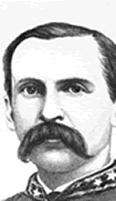 |
Anderson, Robert H. Robert Houston Anderson Robert Houston Anderson was a cavalry and artillery officer in the Confederate States Army during the American Civil War.-Early life and career:... |
Brigadier General rank, nom: July 26, 1864 conf: February 20, 1865 |
October 1, 1835, Savannah, Georgia |
February 8, 1888, Savannah, Georgia |
Pre-war: USMA, 1857. Resigned from U.S. Army in 1861. War: Special assistant to General W.H.T. Walker. Brigade was part of Wheeler's cavalry corps in all engagements through the surrender in North Carolina. Paroled May 3, 1865. Post-war: Chief of police of Savannah, Georgia Savannah, Georgia Savannah is the largest city and the county seat of Chatham County, in the U.S. state of Georgia. Established in 1733, the city of Savannah was the colonial capital of the Province of Georgia and later the first state capital of Georgia. Today Savannah is an industrial center and an important... , 1867–1888. Board of Visitors, USMA, 1879–1887. |
||||
| Anderson, Samuel Read Samuel Read Anderson Samuel Read Anderson was an American businessman and military officer in two wars. He was the Postmaster of Nashville, Tennessee, from 1853 until 1861 and then was a Confederate brigadier general during the American Civil War... |
Brigadier General rank, nom: July 9, 1861 conf: August 18, 1861 rank: November 7, 1864 nom: November 15, 1864 conf: November 19, 1864 |
February 17, 1804, Bedford County Virginia |
January 2, 1883, Nashville, Tennessee |
Pre-war: Moved to Kentucky, then Tennessee. Mexican-American War veteran. Postmaster of Nashville for 8 years. War: Battles: West Virginia campaign, Peninsula campaign. Resigned as brigadier general in the Confederate Army in Spring 1862 due to ill health. Reappointed brigadier general to rank from November 7, 1864 in order to head the bureau of conscription Conscription Conscription is the compulsory enlistment of people in some sort of national service, most often military service. Conscription dates back to antiquity and continues in some countries to the present day under various names... for the State of Tennessee. No record of parole. Post-war: merchant in Nashville. |
|||||
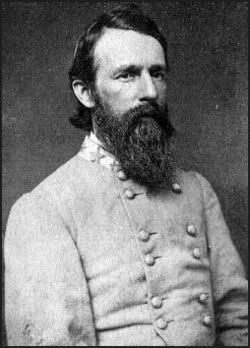 |
Archer, James J. James J. Archer James Jay Archer was a lawyer and an officer in the United States Army during the Mexican-American War, and he later served as a general in the Confederate States Army during the American Civil War.... |
Brigadier General rank, nom: June 3, 1862 conf: September 30, 1862 |
December 18, 1817, Bel Air, Maryland |
October 24, 1864, Richmond, Virginia |
Pre-war: Princeton University, 1835, and University of Maryland law school graduate. Mexican-American War veteran. Lawyer. Returned to U.S. Army in 1855. War: Brigadier general, June 3, 1862. All battles of Army of Northern Virginia from Seven Days Battles Seven Days Battles The Seven Days Battles was a series of six major battles over the seven days from June 25 to July 1, 1862, near Richmond, Virginia during the American Civil War. Confederate General Robert E. Lee drove the invading Union Army of the Potomac, commanded by Maj. Gen. George B. McClellan, away from... to Battle of Gettysburg. Captured on July 1, 1863 at Gettysburg. Confined for over a year, health shattered. Returned to duty for a brief period in summer 1864. |
||||
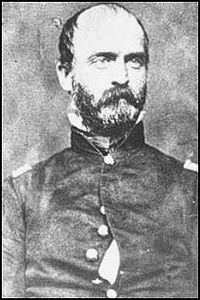 |
Armistead, Lewis Addison "Lo" Lewis Addison Armistead Lewis Addison Armistead was a Confederate brigadier general in the American Civil War, who was wounded, captured, and died after Pickett's Charge at the Battle of Gettysburg.-Early life:... |
Brigadier General nom: March 29, 1862 rank, conf: April 1, 1862 |
February 17, 1817, New Bern, North Carolina |
July 5, 1863, Gettysburg, Pennsylvania Buried: Baltimore, Maryland |
Pre-war: Dismissed from USMA but nonetheless appointed to U.S. Regular Army in 1839. Mexican-American War veteran. War: Colonel, 57th Virginia Infantry. Commanded a brigade in the division of Major General George Pickett from the Peninsula Campaign to the Battle of Gettysburg. Mortally wounded during Pickett's Charge at Gettysburg on July 3, 1863 when he and a small number of men reached the Union Army line. Died at a Union Army field hospital at Gettysburg. | ||||
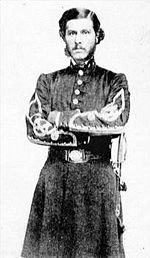 |
Armstrong, Frank Crawford Frank Crawford Armstrong Frank Crawford Armstrong was a United States Army cavalry officer and later a brigadier general in the Confederate States Army during the American Civil War... |
Brigadier General rank: January 20, 1863 nom: January 23, 1863 conf: April 23, 1863 |
November 22, 1835, Choctaw Agency, Indian Territory |
September 8, 1909, Bar Harbor, Maine Buried: Georgetown, Washington, D.C. |
Pre-war: Holy Cross Academy, Massachusetts, graduate. Stepson of pre-Civil War U.S. Army Brevet Brevet (military) In many of the world's military establishments, brevet referred to a warrant authorizing a commissioned officer to hold a higher rank temporarily, but usually without receiving the pay of that higher rank except when actually serving in that role. An officer so promoted may be referred to as being... Major General Persifor Frazer Smith. War: Fought with the Union Army Union Army The Union Army was the land force that fought for the Union during the American Civil War. It was also known as the Federal Army, the U.S. Army, the Northern Army and the National Army... at the Battle of First Manassas (Bull Run). Resigned from Union Army on August 13, 1861 and joined the Confederate Army. Staffs of Confederate Generals McIntosh and McCullough. Fought at Battle of Pea Ridge (Elkhorn Tavern). Appointment as brigadier general to rank from July 7, 1862 by Major General Van Dorn rescinded by Major General Sterling Price October 16, 1862 by order of President Davis. With various cavalry commanders through the Battle of Selma Battle of Selma The Battle of Selma was a military engagement near the end of the American Civil War. It was fought in Selma, Alabama, on April 2, 1865. Union Army forces under Major General James H... , Alabama. Paroled May 15, 1865. Post-war: Overland Mail Service and various Indian Affairs posts. |
||||
 |
Ashby, Turner Turner Ashby Turner Ashby, Jr. was a Confederate cavalry commander in the American Civil War. He had achieved prominence as Thomas J. "Stonewall" Jackson's cavalry commander, in the grade of colonel, in the Shenandoah Valley before he was killed in battle in 1862... |
Brigadier General May 23, 1862 unconfirmed at death |
October 23, 1828, Fauquier County, Virginia |
June 6, 1862, near Harrisonburg, Virginia Buried: Winchester, Virginia |
War: 7th Virginia Cavalry colonel. In charge of all cavalry in Jackson's Valley Campaign of 1862. Killed fighting a rear guard Rear guard A rear guard or rearguard is that part of a military force that protects it from attack from the rear, either during an advance or withdrawal... action against the Union Army pursuing Stonewall Jackson's forces at Good's Farm, near Harrisonburg, Virginia Harrisonburg, Virginia Harrisonburg is an independent city in the Shenandoah Valley region of Virginia in the United States. Its population as of 2010 is 48,914, and at the 2000 census, 40,468. Harrisonburg is the county seat of Rockingham County and the core city of the Harrisonburg, Virginia Metropolitan Statistical... , on June 6, 1862 during Jackson's Valley Campaign of 1862. Brigadier general appointment unconfirmed at death. |
B
| Image | Name | Rank | Date, Place of Birth | Date, Place of Death | Baker, Alpheus Alpheus Baker Alpheus Baker was a brigadier general in the Confederate States Army during the American Civil War.-Biography:Born in South Carolina, Baker was a schoolteacher and practiced law before moving to Alabama... | Brigadier General | May 28, 1828, Abbeville District, South Carolina. |
October 2, 1891, Louisville, Kentucky |
Pre-war: lawyer. War: Captured at Island#10, exchanged. Severely wounded at the Battle of Baker's Creek in the Vicksburg Campaign. Brigadier general, March 5, 1864. Wounded at the Battle of Ezra Church. Other battles: Carolinas Campaign Carolinas Campaign The Carolinas Campaign was the final campaign in the Western Theater of the American Civil War. In January 1865, Union Maj. Gen. William Tecumseh Sherman advanced north from Savannah, Georgia, through the Carolinas, with the intention of linking up with Union forces in Virginia. The defeat of ... , Battle of Bentonville Battle of Bentonville At 3 p.m., Confederate infantry from the Army of Tennessee launched an attack and drove the Union left flank back in confusion, nearly capturing Carlin in the process and overrunning the XIV Corps field hospital. Confederates under Maj. Gen. D.H. Hill filled the vacuum left by the retreating... . Post-war lawyer. Moved to Louisville in 1878 and died there October 2, 1891. |
|---|---|---|---|---|---|---|---|---|---|
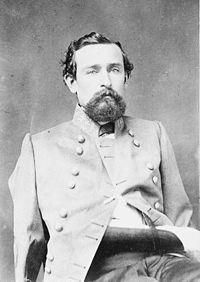 |
Baker, Laurence S. Laurence S. Baker Laurence Simmons Baker was an officer in the United States Army on the frontier, then later a brigadier general in the Confederate States Army during the American Civil War... |
Brigadier General | May 15, 1830, Gates County, North Carolina |
April 10, 1907, Suffolk, Virginia |
Pre-war: USMA, 1851. War: 1st North Carolina Cavalry colonel. Army of Northern Virginia battles from Peninsula Campaign to Battle of Gettysburg. Brigadier general, July 23, 1863. Wounded several times. Departmental command in North Carolina. Fought at Battle of Bentonville. Paroled at Raleigh, North Carolina Raleigh, North Carolina Raleigh is the capital and the second largest city in the state of North Carolina as well as the seat of Wake County. Raleigh is known as the "City of Oaks" for its many oak trees. According to the U.S. Census Bureau, the city's 2010 population was 403,892, over an area of , making Raleigh... . Post-war: Farmer and later railroad agent at Suffolk, Virginia Suffolk, Virginia Suffolk is the largest city by area in Virginia, United States, and is located in the Hampton Roads metropolitan area. As of the 2010 census, the city had a total population of 84,585. Its median household income was $57,546.-History:... until his death. |
||||
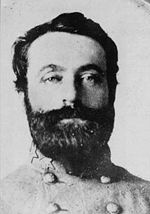 |
Baldwin, William Edwin William Edwin Baldwin William Edwin Baldwin was a Confederate Army officer during the American Civil War.A bookstore owner and member of the local militia in Columbus, Mississippi, Baldwin enlisted in the Confederate Army soon after Mississippi announced its secession from the Union, accepting a commission as Colonel... |
Brigadier General | July 27, 1827, Statesburg, South Carolina |
February 19, 1864, near Dog River Factory, Alabama Buried: Columbus, Mississippi |
Pre-war: Book and stationery business in Columbus, Mississippi. Lieutenant of militia company for 12 years. War: Captain in 1861, took company to Pensacola. Colonel, 14th Mississippi Infantry. Captured at Fort Donelson Fort Donelson Fort Donelson was a fortress built by the Confederacy during the American Civil War to control the Cumberland River leading to the heart of Tennessee, and the heart of the Confederacy.-History:... and imprisoned until August 1862. Brigadier general September 19, 1862. Captured and exchanged at the Battle of Vicksburg Battle of Vicksburg The Siege of Vicksburg was the final major military action in the Vicksburg Campaign of the American Civil War. In a series of maneuvers, Union Maj. Gen. Ulysses S. Grant and his Army of the Tennessee crossed the Mississippi River and drove the Confederate army of Lt. Gen. John C... . After exchange, assigned with command to District of Mobile, Alabama. Died after fall from a horse due to a broken stirrup. |
||||
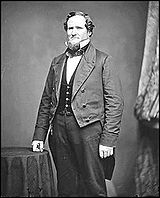 |
Barksdale, William William Barksdale William Barksdale was a lawyer, newspaper editor, U.S. Congressman, and a Confederate general in the American Civil War... |
Brigadier General | August 21, 1821, Smyrna, Tennessee |
July 3, 1863, Gettysburg, Pennsylvania Buried: Jackson, Mississippi |
Pre-war: Attended University of Nashville. Mexican-American War veteran. Lawyer, editor. Member of the United States House of Representatives United States House of Representatives The United States House of Representatives is one of the two Houses of the United States Congress, the bicameral legislature which also includes the Senate.The composition and powers of the House are established in Article One of the Constitution... from Mississippi, 1852–1861. War: Quartermaster general of Mississippi. Then commanded 13th Mississippi at Battle of First Bull Run (First Manassas). Brigadier general, August 12, 1862. All early battles of Army of Northern Virginia except Battle of Second Bull Run (Second Manassas). Brigade was in cellars and behind fences in Fredericksburg, where they delayed Union Army crossing of the Rappahannock River before battle. Mortally wounded during assaults on Little Round Top Little Round Top Little Round Top is the smaller of two rocky hills south of Gettysburg, Pennsylvania. It was the site of an unsuccessful assault by Confederate troops against the Union left flank on July 2, 1863, the second day of the Battle of Gettysburg.... on the second day of the Battle of Gettysburg, July 2, 1863; died July 3, 1863. |
||||
| Barringer, Rufus Rufus Barringer Rufus Clay Barringer was a North Carolina lawyer, politician, and American Civil War brigadier general.-Early life:... |
Brigadier General | December 2, 1821, Cabarrus County, North Carolina |
February 3, 1895, near Charlotte, North Carolina |
Pre-war: University of North Carolina graduate. Lawyer, State legislator elected in 1848 and 1850. Served in early battles of Army of Northern Virginia with distinction but still a captain of 1st North Carolina Cavalry at Battle of Gettysburg. Brigadier general, June 1, 1864. Led a brigade in the Overland Campaign and Siege of Petersburg. Brigade virtually destroyed covering retreat from Richmond. Active in politics after war. Died on estate. Brother-in-law of Stonewall Jackson and D. H. Hill. | |||||
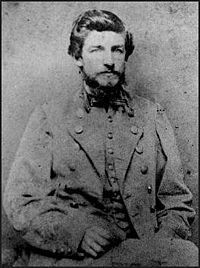 |
Barry, John D. John D. Barry John Decatur Barry was a brigadier general in the Confederate States Army during the American Civil War.-Early life:... |
Brigadier General | June 21, 1839, Wilmington, North Carolina |
March 24, 1867, Wilmington, North Carolina |
Pre-war: Educated at the University of North Carolina. War: Enlisted as private 18th North Carolina State Troops, captain in April 1862. Seven Days' Battles, Cedar Mountain, Second Manassas, Chantilly, Harper's Ferry, Antietam (Sharpsburg). Promoted major. After Chancellorsville, promoted colonel. Regiment took part in Pickett's Charge at Battle of Gettysburg. Appointed brigadier general, August 2, 1864, when Brigadier General James Henry Lane was wounded at the Battle of Cold Harbor. Lane returned a few days later; then Barry was wounded and disabled by a sharpshooter. Barry's appointment was canceled. Departmental duty. Post-war: Newspaper editor at Wilmington, North Carolina. | ||||
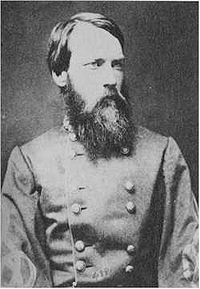 |
Barton, Seth M. Seth Barton Seth Maxwell Barton was a United States Army officer and, then, a brigadier general in the Confederate States Army during the American Civil War. He later became noted as a chemist.-Early life and career:... |
Brigadier General | September 3, 1829, Fredericksburg, Virginia |
April 11, 1900, Washington, D.C. Buried: Fredericksburg, Virginia |
Pre-war: USMA, 1849. War: Lieutenant colonel, 3rd Arkansas Infantry. Engineer for Stonewall Jackson in winter 1861–1862. Captured, paroled and exchanged in the Vicksburg Campaign. In command of Brig. Gen. Armistead's brigade after Armistead was killed at Gettysburg. Bravery unquestioned but criticized by Pickett at New Bern and by Ransom at Drewry's Bluff and relieved of command. Later assigned a brigade in the Richmond defenses. Taken prisoner at the Battle of Sayler's Creek Battle of Sayler's Creek -External links:* * : Maps, histories, photos, and preservation news... , April 6, 1865. Post-war: Lived in Fredericksburg, Virginia. |
||||
| Bate, William Brimage | Major General | October 7, 1826, Bledsoe's Lick (later Castilian Springs), Tennessee |
March 9, 1905, Washington, D.C. Buried: Nashville, Tennessee |
Pre-war: Clerk on steamboat. Mexican-American War veteran. Studied law, editor, Tennessee State legislator in 1860. War: Colonel, 2d Tennessee Infantry. Severely wounded at the Battle of Shiloh. Brigadier general, October 3, 1862; major general, February 23, 1864. Participated in Tullahoma campaign and all engagements of the Army of Tennessee Army of Tennessee The Army of Tennessee was the principal Confederate army operating between the Appalachian Mountains and the Mississippi River during the American Civil War. It was formed in late 1862 and fought until the end of the war in 1865, participating in most of the significant battles in the Western Theater... from the battle of Chickamauga until the army's surrender at Greensboro. Wounded 3 times. Post-war: lawyer. Governor of Tennessee, 1882–1886. United States Senator, 1886–1905. |
|||||
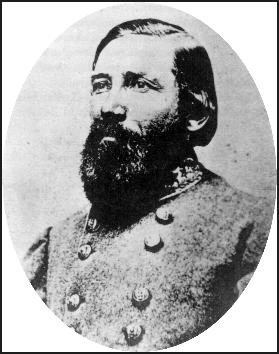 |
Battle, Cullen A. Cullen A. Battle Cullen Andrews Battle was an American attorney, politician, and general in the Confederate States Army during the American Civil War.-Early life and career:... |
Brigadier General | June 1, 1829, Powelton, Georgia |
April 8, 1905, Greensboro, North Carolina Buried: Petersburg, Virginia |
Pre-war: Family moved to Eufaula (then Irwinton), Alabama when seven years old. University of Alabama graduate. Lawyer, 1852. War: Lieutenant colonel of 3rd Alabama Infantry, Peninsula Campaign, colonel after Seven Pines. Antietam, Fredericksburg. Severely injured by a horse falling on him before the Battle of Chancellorsville Battle of Chancellorsville The Battle of Chancellorsville was a major battle of the American Civil War, and the principal engagement of the Chancellorsville Campaign. It was fought from April 30 to May 6, 1863, in Spotsylvania County, Virginia, near the village of Chancellorsville. Two related battles were fought nearby on... . In Ramseur's brigade at Gettysburg. Brigadier general, August 20, 1863. Other battles: Wilderness, Spotsylvania, with Lt. Gen. Early in Valley Campaigns of 1864. Badly wounded and incapacitated for further field service at the Battle of Cedar Creek Battle of Cedar Creek The Battle of Cedar Creek, or Battle of Belle Grove, October 19, 1864, was one of the final, and most decisive, battles in the Valley Campaigns of 1864 during the American Civil War. The final Confederate invasion of the North, led by Lt. Gen. Jubal A. Early, was effectively ended... . No evidence of his promotion to major general. Post-war: Lawyer in Tuskegee, Alabama. The United States Congress United States Congress The United States Congress is the bicameral legislature of the federal government of the United States, consisting of the Senate and the House of Representatives. The Congress meets in the United States Capitol in Washington, D.C.... refused to recognize his election as a U.S. Representative in 1868. Moved to New Bern, North Carolina, where editor, mayor. |
||||
| Beale, Richard Lee Turberville | Brigadier General | May 22, 1819, Hickory Hill, Virginia |
April 21, 1893, Hague, Virginia Buried: Hickory Hill, Virginia |
Pre-war: Dickinson College; University of Virginia graduate, 1837. Lawyer. Member of United States House of Representatives, 1847–1849. State senator, 1855–1860. War: First lieutenant of cavalry company that became part of 9th Virginia Cavalry. Served in all the cavalry campaigns of the Army of Northern Virginia, except for 3 months while recovering from a wound in autumn 1863. Took command of brigade under Gen. W.H.F. Lee in Fall 1864. Brigadier general, January 6, 1865. Post-war: Lawyer. Elected to the U.S. Congress again in 1878. | |||||
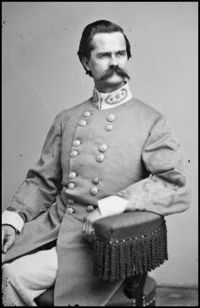 |
Beall, William N.R. William Beall William Nelson Rector Beall was a brigadier general in the Confederate States Army during the American Civil War. He is most noted for his supply efforts on behalf of Confederate prisoners of war.-Early life and career:... |
Brigadier General | March 20, 1825, Bardstown, Kentucky |
July 25, 1883, McMinnville, Tennessee Buried: Nashville, Tennessee |
Pre-war: USMA, 1848. War: Resigned from U.S. Army, August 20, 1861; captain in Regular Army of Confederacy. In Arkansas with Gen. Van Dorn. Brigadier general, April 11, 1862. Surrendered at the Battle of Port Hudson. Paroled in 1864 to act as a Confederate agent to supply Confederate prisoners of war with proceeds of cotton sales permitted to come through the federal blockade to New York City. Released August 2, 1865. Post-war: General commission agent at St. Louis. | ||||
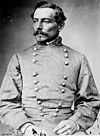 |
Beauregard, Pierre G.T. "Bory" "The Little Napoleon" | General | May 28, 1818, Saint Bernard Parish, Louisiana |
February 20, 1893, New Orleans, Louisiana |
Pre-war: USMA, 1838. Mexican-American War veteran. War: Brigadier general in Provisional Army of the Confederacy, March 1, 1861. Commanded Confederate troops at Fort Sumter Battle of Fort Sumter The Battle of Fort Sumter was the bombardment and surrender of Fort Sumter, near Charleston, South Carolina, that started the American Civil War. Following declarations of secession by seven Southern states, South Carolina demanded that the U.S. Army abandon its facilities in Charleston Harbor. On... and Battle of First Manassas (Bull Run). Full general in Confederate Regular Army, July 21, 1861. Took command at the Battle of Shiloh after the death of General Albert Sidney Johnston Albert Sidney Johnston Albert Sidney Johnston served as a general in three different armies: the Texas Army, the United States Army, and the Confederate States Army... . Abandoned Corinth, Mississippi to large Union force. Superseded by General Bragg while on sick leave. Bad relationshiop with Confederate President Jefferson Davis Jefferson Davis Jefferson Finis Davis , also known as Jeff Davis, was an American statesman and leader of the Confederacy during the American Civil War, serving as President for its entire history. He was born in Kentucky to Samuel and Jane Davis... . Defended Charleston, South Carolina in 1863 and 1864. Discerned General Grant's move against Petersburg at the end of the Overland Campaign and blocked his move until Lee could catch up and defend Petersburg and Richmond. Served with General Joseph Johnston during the closing weeks of the war. Post-war: President of two railroads and adjutant general of Louisiana. |
||||
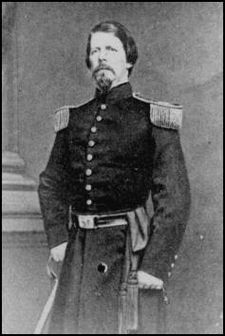 |
Bee, Barnard E. Jr. | Brigadier General | February 8, 1824, Charleston, South Carolina |
July 22, 1861, Manassas, Virginia Buried: Pendleton, South Carolina |
Pre-war: Moved to Texas with parents. USMA, 1845. Mexican-American War veteran. Brother of Brig. Gen. Hamilton Bee. War: Lieutenant colonel of 1st South Carolina Regulars, artillery regiment. Brigadier general, June 17, 1861, posthumous confirmation over a month after death. Gave Lieutenant General Thomas J. "Stonewall" Jackson his famous nickname at the Battle of First Manassas (Bull Run), where he was mortally wounded July 21, 1861 and died July 22, 1861. | ||||
 |
Bee, Hamilton Prioleau | Brigadier General | July 22, 1822, Charleston, South Carolina |
October 3, 1897, San Antonio, Texas |
Pre-war: Moved to Texas with parents. Mexican-American War veteran. Speaker of the Texas House of Representatives Texas House of Representatives The Texas House of Representatives is the lower house of the Texas Legislature. The House is composed of 150 members elected from single-member districts across the state. The average district has about 150,000 people. Representatives are elected to two-year terms with no term limits... for one term before the war. Brother of Brig. Gen. Barnard Bee. War: Brigadier general of militia, 1861; brigadier general, March 4, 1862. In command at Brownsville, Texas. Did mostly administrative work until the Red River Campaign Red River Campaign The Red River Campaign or Red River Expedition consisted of a series of battles fought along the Red River in Louisiana during the American Civil War from March 10 to May 22, 1864. The campaign was a Union initiative, fought between approximately 30,000 Union troops under the command of Maj. Gen.... , where his performance was criticized. Later cavalry and infantry commands in the Trans-Mississippi Department Trans-Mississippi Department The Trans-Mississippi Department was an administrative subdivision of the Confederate States of America west of the Mississippi, consisting of Texas, Arkansas, Missouri, Indian Territories recognized by the CSA, and parts of Western Louisiana... . Post-war: Went to Mexico after the war; returned to San Antonio, 1876. |
||||
| Bell, Tyree H. Tyree H. Bell Tyree H. Bell often referred to by his full name, Tyree Harris Bell, was a Confederate States Army brigadier general during the American Civil War. He commanded a regiment of infantry in 1861 and most of 1862... |
Brigadier General | September 5, 1815, Covington, Kentucky |
September 1, 1902, New Orleans, Louisiana Buried: Sanger, California |
Pre-war: Moved to father's plantation at Gallatin, Tennessee as a child. Planter. War: Captain of company of 12th Tennessee Infantry. Commanded regiment at Battles of Belmont, Shiloh and Richmond, Kentucky, promoted colonel in July 1862. Then cavalry commander, under Forrest later in the war. Led brigade from January 1864. Brigadier general, February 28, 1865. Post-war: Moved family to Fresno, California in 1875, successful farmer. Died while returning from a veterans reunion. | |||||
 |
Benning, Henry L. "Old Rock" | Brigadier General | April 2, 1814, Columbia County, Georgia |
July 10, 1875, Columbus, Georgia |
Pre-war: University of Georgia (then Franklin College) graduate, 1834. Six years as associate justice of Georgia Supreme Court. War: Colonel, 17th Georgia Infantry. Attached to Hood's division. Brigadier general, January 17, 1863. Took part in many engagements of the Army of Northern Virginia, paroled at Appomattox Court House. Post-war: Lawyer. | ||||
| Benton, Samuel Samuel Benton Samuel Benton was born on October 18, 1820 in Williamson County,Tennessee. At a young age him and his family settled in Holly County, Mississippi. Samuel Benton was Lawyer, State Legislator, Mississippi secession convention delegate but he is best known for his service in the Civil War.Civil War... |
Brigadier General | October 18, 1820, probably in Williamson County, Tennessee |
July 28, 1864, Atlanta, Georgia Buried: Holly Springs, Mississippi |
Pre-war: Settled in Holly Springs, Mississippi. Lawyer, State legislator, Mississippi secession convention delegate. War: Captain in 9th Mississippi Infantry, 12-month regiment. Colonel, 37th (later 34th) Mississippi Infantry in 1862. Served in North Mississippi and Middle Tennessee early in the war. Mortally wounded during the Battle of Atlanta, July 22, 1864. Died before receiving his commission as brigadier general to rank from July 26, 1864. Nephew of U.S. Senator Thomas Hart Benton. | |||||
| Blanchard, Albert G. Albert G. Blanchard Albert Gallatin Blanchard was a general in the Confederate army during the American Civil War. He was among the small number of high ranking Confederates to have been born in the North. He served on the Atlantic Coast early in the war, commanding a brigade in Virginia before being reassigned to... |
Brigadier General | September 10, 1810, Charlestown, Massachusetts |
June 21, 1891, New Orleans, Louisiana |
Pre-war: USMA, 1829. Resigned in 1840 and lived in New Orleans in various occupations. Mexican-American War veteran. War: Colonel, 1st Louisiana Infantry. Brigadier general, September 21, 1861. War record mainly in camps of instruction, on conscript duty and court of inquiry. Post-war: assistant city surveyor of New Orleans until death. | |||||
| Boggs, William R. William R. Boggs William Robertson Boggs was a general in the Confederate States Army during the American Civil War. He was noted as a civil engineer who constructed the military fortifications that protected some of the Confederacy's most important seaports.-Early life and career:Boggs was born in Augusta, Georgia... |
Brigadier General | March 18, 1829, Augusta, Georgia |
September 11, 1911, Winston-Salem, North Carolina |
Pre-war: USMA, 1853. War: Staff officer, engineer in 1861–1862 for Gen. Beauregard at Charleston and Gen. Bragg at Pensacola. Brigadier general, November 4, 1862. Chief of staff for General E. Kirby Smith in the Trans-Mississippi Department. Post-war: Returned to Georgia but soon moved to St. Louis where he was a civil engineer. Taught mechanics at Virginia Polytechnic Institute (Virginia Tech), 1875–1881. Retired to Winston-Salem, North Carolina. | |||||
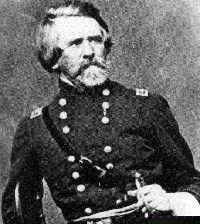 |
Bonham, Milledge Luke Milledge Luke Bonham Milledge Luke Bonham was an American politician and Congressman who served as the 70th Governor of South Carolina from 1862 until 1864. He was a Confederate General during the American Civil War.-Early life and career:... |
Brigadier General | December 25, 1813, Edgefield District, South Carolina |
August 27, 1890 White Sulphur Springs, North Carolina Buried: Columbia South Carolina |
Pre-war: Graduate of South Carolina College (now the University of South Carolina), 1834. Seminole Wars and Mexican-American War veteran. Member of U.S. House of Representatives between 1857 and 1860. War: Brigadier general, April 23, 1861. Resigned commission as brigadier general in January 1862 to take seat in Confederate Congress. Governor of South Carolina between January 1863 and January 1865. Reappointed brigadier general on February 1865 and with General Joseph E. Johnston in closing months of the war. Post-war: lawyer, State legislator. South Carolina state railroad commissioner, 1878–1890. | ||||
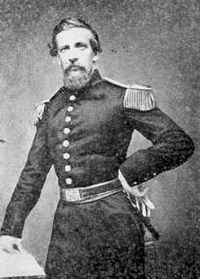 |
Bowen, John Stevens | Major General | October 30, 1830, Savannah, Georgia |
July 13, 1863, near Raymond, Mississippi Buried: Vicksburg, Mississippi |
Pre-war: USMA, 1853. Resigned 3 years later and was an architect at St. Louis. War: Captain of Missouri militia; chief of staff to Gen. D. M. Frost. Captured at Camp Jackson, Missouri by Union Brig. Gen. Nathaniel Lyon. Colonel of Confederate 1st Missouri Infantry. Fought at Columbus, Kentucky. Brigadier general, March 14, 1862. Wounded at Shiloh. Opposed Grant at Port Hudson. Major general, May 25, 1863. Health weakened by dysentery during Vicksburg campaign. Paroled after surrender of Vicksburg on July 4, 1863 and died 9 days later, aged 32. | ||||
| Bragg, Braxton Braxton Bragg Braxton Bragg was a career United States Army officer, and then a general in the Confederate States Army—a principal commander in the Western Theater of the American Civil War and later the military adviser to Confederate President Jefferson Davis.Bragg, a native of North Carolina, was... |
General | March 22, 1817, Warrenton, North Carolina |
September 27, 1876, Galveston, Texas Buried: Mobile, Alabama |
Pre-war: USMA, 1837. Seminole Wars and Mexican-American War veteran. War: Brigadier general March 7, 1861, assigned to Gulf Coast between Pensacola, Florida and Mobile, Alabama. Major general, September 12, 1861. Battle of Shiloh. Full general to rank from April 6, 1862. Commanded the Army of Tennessee between June 1862 and November 1863. Invasion of Kentucky ended with defeat at Perryville and forced to withdraw from Murfreesboro, Tennessee after battle (Stones River). Victor at Chickamauga but Union Maj. Gen. U.S. Grant forced retreat from Chattanooga. Transferred command to General Joseph E. Johnston at his own request. Thereafter charged with the conduct of military operations of the Confederate armies until he joined with General Joseph E. Johnston in his final campaign in North Carolina. Favorite of President Jefferson Davis but detested by many other generals. Post-war: chief engineer of Alabama. Moved to Texas, fell dead while walking down a street in Galveston, Texas with a friend. | |||||
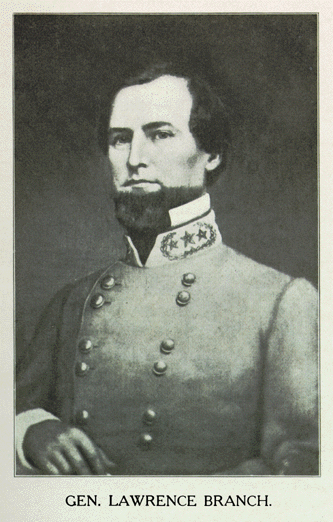 |
Branch, Lawrence O'Bryan Lawrence O'Bryan Branch Lawrence O'Bryan Branch was a North Carolina representative in the U.S. Congress and a Confederate brigadier general in the American Civil War, killed at the Battle of Antietam.-Early life and career:... |
Brigadier General | November 28, 1820, Enfield, North Carolina |
September 17, 1862, Sharpsburg, Maryland Buried: Raleigh, North Carolina |
Pre-war: Princeton University graduate, 1838, age 18. Newspaper editor in Tennessee, lawyer in Florida. Member of U.S. House of Representatives from North Carolina, 1855–1861. War: Quartermaster and paymaster of North Carolina. Colonel, 33rd North Carolina, Infantry. Brigadier general, November 16, 1861. Battles: New Bern, Seven Days' Battles, Harper's Ferry. Killed at Battle of Antietam (Sharpsburg) on September 17, 1862 by a Union sharpshooter who fired into a group of four generals, including A. P. Hill. | ||||
| Brandon, William L. William L. Brandon William Lindsay Brandon was a physician, state legislator, planter and military officer best known for having served as a General in the Confederacy during the American Civil War.-Antebellum life:Brandon was born in either 1800 or 1802 in Adams County, Mississippi... |
Brigadier General | 1800 or 1802, near Washington, Mississippi |
October 8, 1890, Wilkinson County, Mississippi Buried: Pinckneyville, Mississippi |
Pre-war: Educated at Washington College and the College of New Jersey (now Princeton University). Planter, state legislator, major general of militia. War: Lieutenant colonel, 21st Mississippi Infantry. Lost a leg at the Battle of Malvern Hill. Served at Chickamauga and Knoxville with Longstreet. Promoted to brigadier general to rank from June 18, 1864 and placed in command of recruiting for Mississippi on the same date. Post-war: Returned to plantation in Wilkinson County, Mississippi. | |||||
| Brantley, William F. William F. Brantley William Felix Brantley was an American lawyer and soldier. He served as a Confederate general in the American Civil War, mainly serving in the Western Theater during the conflict... |
Brigadier General | March 12, 1830, Greene County, Alabama |
November 2, 1870, Winona, Mississippi Buried: Tomnolen, Mississippi |
Pre-war: family moved to Mississippi. Lawyer. War: Captain of 15th, later 29th, Mississippi Infantry. Commanded 29th Mississippi at Battles of Murfreesboro (Stones River), Chickamauga and Chattanooga. Brigadier general, July 26, 1864. Fought in Atlanta and Tennessee campaigns and with General Joseph E. Johnston in North Carolina campaign. Murdered near Winona, Mississippi,. | |||||
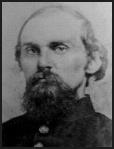 |
Bratton, John "Reliable" John Bratton John Bratton was a U.S. Representative from South Carolina, as well as a general in the Confederate States Army during the American Civil War... |
Brigadier General | March 7, 1841, Winnsboro, South Carolina |
January 12, 1898, Winnsboro, South Carolina |
Pre-war: Educated at South Carolina College (now the University of South Carolina). Practiced medicine. War: Private, soon captain, 6th South Carolina Infantry. At Fort Sumter. Re-enlisted in Confederate service as private, rapidly promoted to colonel. Wounded and captured at the Battle of Seven Pines Battle of Seven Pines The Battle of Seven Pines, also known as the Battle of Fair Oaks or Fair Oaks Station, took place on May 31 and June 1, 1862, in Henrico County, Virginia, as part of the Peninsula Campaign of the American Civil War. It was the culmination of an offensive up the Virginia Peninsula by Union Maj. Gen.... , exchanged. With Army of Northern Virginia through the war. Brigadier general, May 6, 1864. Surrendered largest brigade at Appomattox Court House Appomattox Court House The Appomattox Courthouse is the current courthouse in Appomattox, Virginia built in 1892. It is located in the middle of the state about three miles northwest of the Appomattox Court House National Historical Park, once known as Clover Hill - home of the original Old Appomattox Court House... . Post-war: State senator, 1865–1866; U.S. Representative, 1884–1885. |
||||
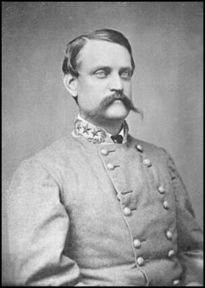 |
Breckinridge, John C. John C. Breckinridge John Cabell Breckinridge was an American lawyer and politician. He served as a U.S. Representative and U.S. Senator from Kentucky and was the 14th Vice President of the United States , to date the youngest vice president in U.S... |
Major General | January 15, 1821, Lexington, Kentucky |
May 17, 1875, Lexington, Kentucky |
Pre-war: Graduate of Centre College, 1839, studied law at Transylvania University. Member of Kentucky legislature, 1849–1851 and U.S. House of Representatives, 1851–1855. In 1856, at age 35, elected Vice President of the United States on the Democrat Party ticket with James Buchanan as President. Resigned early to take seat in U.S. Senate 1859–1861. War: Commissioned Confederate brigadier general, November 2, 1861. Commanded the Reserve Corps at the Battle of Shiloh. Major general, April 14, 1862. Fought at Vicksburg, Baton Rouge, Murfreesboro and Chickamauga. Commanded Department of Southwest Virginia in early 1864, then joined Lt. Gen. Jubal Early's 1864 Shenandoah Valley Campaign and raid on Washington. Appointed Confederate Secretary of War on February 4, 1865. Post-War: Went to England and Canada after the war, returned to Kentucky in 1869. Resumed law practice. Died from results of a serious operation, 1875, aged 54. | ||||
| Brevard, Theodore W. Theodore W. Brevard Theodore Washington Brevard was a military officer best known for having served in the Confederate States Army. During his tenure with the Confederate army, he served in such ranks as Captain, Colonel and Brigadier-General. Brevard was captured by the forces of General George Custer and imprisoned... |
Brigadier General | August 26, 1835, Tuskegee, Alabama |
June 20, 1882, Tallahassee, Florida |
Pre-war: Moved with family to Florida in 1847. Studied law at University of Virginia, member of Florida Bar in 1858 and elected to state assembly. War: Raised a battalion of Partisan Rangers and fought at Battle of Olustee Battle of Olustee The Battle of Olustee or Battle of Ocean Pond was fought in Baker County, Florida on 20 February 1864, during the American Civil War. It was the largest battle fought in Florida during the war.-Background:In February 1864, Major General Quincy A... ; then went to join the Army of Northern Virginia with the 11th Florida Volunteer Infantry Regiment, soon as colonel. Last general officer appointed by President Jefferson Davis, March 28, 1865, to rank from March 22, 1865. Post-war: lawyer. |
|||||
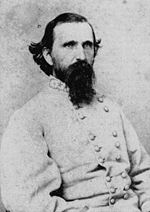 |
Brown, John Calvin | Major General | January 6, 1827 Giles County, Tennessee |
August 17, 1889 Boiling Springs, Tennessee Buried: Pulaski, Tennessee |
Pre-war: Graduate of Jackson College, Jackson, Tennessee, 1846; lawyer. War: Enlisted as a private, but soon appointed colonel of 3rd Tennessee Infantry. Captured at Fort Donelson Fort Donelson Fort Donelson was a fortress built by the Confederacy during the American Civil War to control the Cumberland River leading to the heart of Tennessee, and the heart of the Confederacy.-History:... , later exchanged. Brigadier general, August 30, 1862; Major general, August 4, 1864. Wounded at Perryville. Fought with Army of Tennessee until severely wounded at the Battle of Franklin. Post-war: In 1870, became first Democrat governor of Tennessee after the war. Defeated in 1875 election for U.S. Senate seat by former President Andrew Johnson. President of Texas & Pacific Railway and Tennessee Coal, Iron & Railroad Company. |
||||
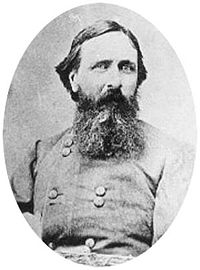 |
Browne, William Montague "Constitution" | Brigadier General | 1823, Dublin, Ireland |
April 23, 1883, Athens, Georgia |
Pre-war: Crimean War Crimean War The Crimean War was a conflict fought between the Russian Empire and an alliance of the French Empire, the British Empire, the Ottoman Empire, and the Kingdom of Sardinia. The war was part of a long-running contest between the major European powers for influence over territories of the declining... veteran; emigrated to U.S. in 1855; newspaper editor. War: aide to Jefferson Davis with rank of colonel of cavalry; interim Secretary of State for a month in early 1862; briefly commanded brigade in defense of Savannah; nomination as brigadier general with temporary rank, November 11, 1864, rejected by Confederate Senate, February 18, 1865. Post-war: history and constitutional law professor at University of Georgia. |
||||
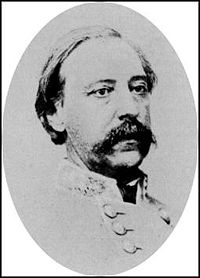 |
Bryan, Goode Goode Bryan Goode Bryan was a planter, politician, military officer, and American Civil War general in the Confederate States Army. His brigade played a prominent role during the Battle of the Wilderness, fighting stubbornly until exhausting its ammunition.-Early life and career:Bryan was born in Hancock... |
Brigadier General | August 31, 1811, Hancock County, Georgia |
August 16, 1885, Augusta, Georgia |
Pre-war: USMA, 1834; resigned from army, 1835. Mexican-American War veteran. War: Fought with Army of Northern Virginia from Peninsula campaign through Gettysburg and with 1st Corps at Knoxville. Brigadier general, August 29, 1863. Resigned after Overland Campaign, September 20, 1864, due to failing health. Post-war: Semi-retired for many years. | ||||
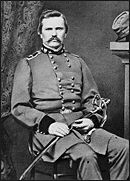 |
Buckner, Simon Bolivar Simon Bolivar Buckner, Sr. Simon Bolivar Buckner fought in the United States Army in the Mexican–American War and in the Confederate States Army during the American Civil War. He later served as the 30th Governor of Kentucky.... |
Lieutenant General | April 1, 1823, Hart County, Kentucky |
January 8, 1914, Munfordville, Kentucky Buried: Frankfort, Kentucky |
Pre-war: USMA, 1844. Earned two brevets Brevet (military) In many of the world's military establishments, brevet referred to a warrant authorizing a commissioned officer to hold a higher rank temporarily, but usually without receiving the pay of that higher rank except when actually serving in that role. An officer so promoted may be referred to as being... in Mexican-American War. War: Brigadier general, September 14, 1861. Left by Brig. Generals Pillow and Floyd to surrender Fort Donelson. Fought at the Battle of Perryville and Battle of Chickamauga; fortified Mobile. Lieutenant general, September 20, 1864. In Trans-Mississippi as chief of staff to General E. Kirby Smith after Chickamauga. Post-war: Governor of Kentucky Governor of Kentucky The Governor of the Commonwealth of Kentucky is the head of the executive branch of government in the U.S. state of Kentucky. Fifty-six men and one woman have served as Governor of Kentucky. The governor's term is four years in length; since 1992, incumbents have been able to seek re-election once... , 1887; vice-presidential candidate of "Gold Democrats", 1896. Died January 8, 1914, aged 91, last survivor of 3 highest grades of general in Confederate Army. His son, Lt. Gen. Simon Bolivar Buckner, Jr. Simon Bolivar Buckner, Jr. General Simon Bolivar Buckner, Jr. was an American lieutenant general during World War II. He served in the Pacific Theater of Operations and commanded the defenses of Alaska early in the war. After that assignment, he was promoted to command 10th Army, which conducted the amphibious assault on... , born July 18, 1886, was the highest ranking United States Army officer killed by enemy fire in World War II during the Battle of Okinawa Battle of Okinawa The Battle of Okinawa, codenamed Operation Iceberg, was fought on the Ryukyu Islands of Okinawa and was the largest amphibious assault in the Pacific War of World War II. The 82-day-long battle lasted from early April until mid-June 1945... . |
||||
| Buford, Abraham Abraham Buford II Brigadier General Abraham "Abe" Buford II was a soldier and Thoroughbred horse breeder. Born in Woodford County, Kentucky, his origins were a Huguenot family named Beaufort who fled persecution in France and settled in England before emigrating to America in 1635.Abraham Buford was the son of... |
Brigadier General | January 18, 1820, Woodford, Kentucky |
June 9, 1884, Danville, Indiana Buried: Lexington, Kentucky |
Pre-war: USMA, 1841. Earned brevet in Mexican-American War. Resigned in 1854 to run his stock farm. War: Remained out of war while Kentucky officially remained "neutral." Two cousins were Union Army generals. Joined Confederate Army as brigadier general from September 2, 1862. Fought in Vicksburg campaign, then with Lt. Gen. Nathan Bedford Forrest until surrender. Post-war: Returned to farm. One term as Kentucky legislator. Encountered severe financial problems. Committed suicide. | |||||
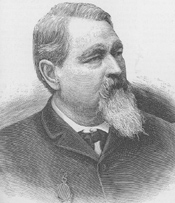 |
Bullock, Robert Robert Bullock Robert Bullock was a United States Representative from Florida and a brigadier general in the Confederate States Army. He was born in Greenville, North Carolina where he attended the common schools. He moved to Fort King, Florida in 1844 which was then a United States Government post, near the... |
Brigadier General | December 8, 1828, Greenville, North Carolina |
July 27, 1905, Ocala, Florida |
Pre-war: Moved to Florida at age 16. Clerk of circuit court of Marion County, Florida before war. Fought against Seminoles in 1856. War: Captain of 7th Florida Infantry, promoted through grades to colonel. Chickamauga, Atlanta campaign, Franklin-Nashville campaign. Brigadier general, November 29, 1864. Badly wounded in retreat after the Battle of Nashville Battle of Nashville The Battle of Nashville was a two-day battle in the Franklin-Nashville Campaign that represented the end of large-scale fighting in the Western Theater of the American Civil War. It was fought at Nashville, Tennessee, on December 15–16, 1864, between the Confederate Army of Tennessee under... . Post-war: probate judge, lawyer, court clerk, state legislator and two-term Member of Congress. Judge of circuit court when died. |
||||
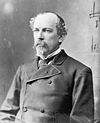 |
Butler, Matthew Calbraith | Major General | March 8, 1836, Greenville, South Carolina |
April 14, 1909, Washington, D.C. Buried: Edgefield, South Carolina |
Pre-war: Educated at South Carolina College (University of South Carolina); lawyer; son-in-law of South Carolina Governor Francis Wilkinson Pickens Francis Wilkinson Pickens Francis Wilkinson Pickens was an American lawyer and politician who served as the 69th Governor of South Carolina when the state seceded from the United States during the American Civil War.-Early life and career:... ; state legislator. War: Captain in Hampton's Legion at Battle of First Bull Run (First Manassas). Colonel of 2nd South Carolina Cavalry, August 1862. Lost right foot at Battle of Brandy Station Battle of Brandy Station The Battle of Brandy Station, also called the Battle of Fleetwood Hill, was the largest predominantly cavalry engagement of the American Civil War, as well as the largest to take place ever on American soil. It was fought at the beginning of the Gettysburg Campaign by the Union cavalry under Maj.... in June 1863. Brigadier general, September 1, 1863; major general, September 19, 1864. Served under Maj. Gen. Jeb Stuart and Lt. Gen. Wade Hampton. Post-war: United States Senator, 1876–1894. Major general of U.S. Volunteers in 1898 through April 15, 1899 in Spanish-American War. Member of commission for Spanish evacuation of Cuba. President of mining company in Mexico, president of Southern Historical Association. |
C
| Image | Name | Rank | Date, Place of Birth | Date, Place of Death | Louisiana State Lottery Louisiana State Lottery Company The Louisiana State Lottery Company was a private corporation that in the mid-19th century ran the Louisiana lottery. It was for a time the only legal lottery in the United States, and for much of that time had a very foul reputation as a swindle of the state and citizens and a repository of... and successor Honduras National Lottery,1893–1907. |
|---|---|---|---|---|---|
| Campbell, Alexander William Alexander William Campbell (general) Alexander William Campbell , was a Confederate States Army brigadier general during the American Civil War. He was a lawyer in Tennessee before and after the war, mayor of Jackson, Tennessee, 1856, and an unsuccessful candidate for the Democratic Party nomination for governor of Tennessee in... |
Brigadier General | June 4, 1828, Nashville, Tennessee |
June 13, 1893, Jackson, Tennessee |
Pre-war: Educated at West Tennessee College and Lebanon Law School. War: Enlisted as private. Colonel of 33rd Tennessee Infantry Regiment at Battle of Shiloh; severely wounded. Captured at Lexington, Tennessee July 1863 while on a mission for the governor. Not exchanged until February 1865. Brigadier general, March 1, 1865. Commanded a brigade in Brig. Gen. William Hicks Jackson's division in Lt. Gen. Nathan Bedford Forrest's corps. Post-war: Lawyer. | |
| Cantey, James James Cantey James Cantey , was a Confederate States Army brigadier general during the American Civil War. He was a lawyer, planter, state legislator in South Carolina and officer in the Mexican-American War before the war and a planter in Alabama both before and after the war.-Early life:James Cantey was born... |
Brigadier General | December 30, 1818, Camden, South Carolina |
June 30, 1874, Fort Mitchell, Alabama |
Pre-war: Educated at South Carolina College (University of South Carolina); lawyer. Two-term state legislator. Mexican-American War veteran. Moved to Alabama, planter. War: Colonel of 15th Alabama Infantry Regiment; served in Jackson's Valley Campaign. Brigadier general in western army from January 8, 1863; frequently in ill health. Brigade was in Atlanta campaign, with Hood in Tennessee campaign and surrendered with General Joseph Johnston in North Carolina. No record of Brigadier General Cantey's capture or parole. Post-war: Died on his plantation at Fort Mitchell, Alabama. | |
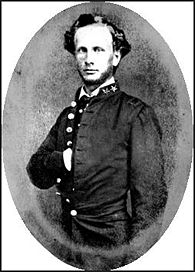 |
Capers, Ellison Ellison Capers Ellison Capers was a school teacher, Confederate general in the American Civil War, theologian, and college administrator from South Carolina.-Early life:... |
Brigadier General | October 14, 1837, Charleston, South Carolina |
April 22, 1908, Columbia, South Carolina |
Pre-war: South Carolina Military Academy (The Citadel) graduate, 1857. Teacher. War: Regiment participated in bombardment of Fort Sumter. Served in North Carolina, South Carolina, at Battle of Chickamauga, in Chattanooga campaign, with General Hood in Tennessee. Promoted to brigadier general after death of Brig. Gen. States Rights Gist at the Battle of Franklin, to rank from March 1, 1865. Post-war: Long career as Episcopal Episcopal Church (United States) The Episcopal Church is a mainline Anglican Christian church found mainly in the United States , but also in Honduras, Taiwan, Colombia, Ecuador, Haiti, the Dominican Republic, Venezuela, the British Virgin Islands and parts of Europe... minister. |
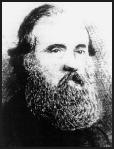 |
Carroll, William Henry William Henry Carroll William Henry Carroll was a wealthy plantation owner, a postmaster, and a General in the Confederate States Army during the American Civil War.-Early life:... |
Brigadier General | About 1810, Nashville, Tennessee |
May 3, 1868 Montreal, Quebec, Canada |
Pre-war: Eldest son of six-term governor of Tennessee, William Carroll. Operated plantation in Mississippi, then postmaster of Memphis from 1848. War: Colonel of 37th Tennessee Infantry Regiment. Brigadier general on October 26, 1861. Proclaimed martial law in Knoxville, Tennessee. Criticized for conduct at Battle of Fishing Creek Battle of Fishing Creek The Battle of Fishing Creek, also called the Battle of Catawba Ford or the War on Sugar Creek, was an American Revolutionary War battle fought on August 18, 1780, between American and British forces including the 71st Foot. It was fought near the junction of Fishing Creek and the Catawba River in... . Arrested by Lt. Gen. Hardee for drunkenness, incompetency and neglect. Resigned February 1, 1863 and went to Canada. Post-war: Died in Montreal on May 3, 1868, aged about 58 years. |
| Carter, John C. John C. Carter John Carpenter Carter was a Brigadier General of the Confederate States Army during the American Civil War.-Early life:... |
Brigadier General | December 19, 1837, Waynesboro, Georgia |
December 10, 1864, Franklin, Tennessee |
Pre-war: Attended University of Virginia; studied law at Cumberland University Cumberland University Cumberland University is a private university in Lebanon, Tennessee, United States. It was founded in 1842, though the current campus buildings were constructed between 1892 and 1896.-History:... . War: Captain 38th Tennessee Infantry. Battles: Shiloh, Perryville, Murfreesboro (Stones River), Chickamauga. Rapidly promoted to colonel, became brigadier general during Atlanta campaign to rank from July 7, 1864. Temporary division command at Battle of Jonesboro. Mortally wounded at the Battle of Franklin, Tennessee on November 30, 1864; died December 10, 1864 at the Harrison home, 3 miles (4.8 km) south of battlefield. |
|
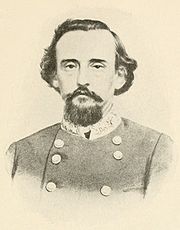 |
Chalmers, James R. | Brigadier General | January 11, 1831, Halifax County, Virginia |
April 9, 1898, Memphis, Tennessee |
Pre-war: Graduate of South Carolina College (now the University of South Carolina); lawyer, pre-war district attorney. War: Colonel 9th Mississippi Infantry, commanded at Pensacola. Brigadier general, February 13, 1862. Fought at Battle of Shiloh, Battle of Murfreesboro (Stones River); later served in cavalry under Forrest, Hood. Post-war: three-term Congressman from Mississippi. Moved to Memphis in 1888 and practiced law until his death. |
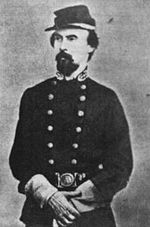 |
Chambliss, John R. John R. Chambliss John Randolph Chambliss, Jr. was a career military officer, serving in the United States Army and then, during the American Civil War, in the Confederate States Army. A brigadier general of cavalry, Chambliss was killed in action during the Second Battle of Deep Bottom.-Early life:Chambliss was... |
Brigadier General | January 23, 1833, Hicksford (now Emporia), Virginia. |
August 16, 1864 Richmond, Virginia |
Pre-war: USMA, 1853. Resigned from army in 1854. Planter, militia officer, aide-de-camp to Virginia governor. War: Colonel 41st Virginia Infantry, then in July 1861, colonel 13th Virginia Cavalry. Maryland campaign and subsequent cavalry actions of Army of Northern Virgina. Brigadier general, December 19, 1863. Killed in action at the head of his cavalry brigade in engagement north of James River on Charles City Road. |
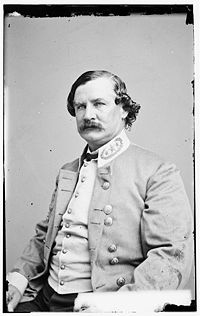 |
Cheatham, Benjamin F. Benjamin F. Cheatham Benjamin Franklin Cheatham , known also as Frank, was a Tennessee aristocrat, California gold miner, and a General in the Confederate States Army during the American Civil War, serving in many battles of the Western Theater.-Early years:Cheatham was born in Nashville, Tennessee on a plantation... |
Major General | October 20, 1820, Nashville, Tennessee |
September 4, 1886 Nashville, Tennessee |
Pre-war: Mexican-American War veteran. Farmer, major general of Tennessee militia. War: Brigadier general July 9, 1861, major general March 10, 1862, fought in major western theater battles. Hood charged he allowed Union troops to escape from Spring Hill, Tennessee in late 1864 which permitted them to set up defenses for the Battle of Franklin but historians such as Ezra Warner side with Cheatham. Post-war: Superintendent of state prisons, postmaster at Nashville. |
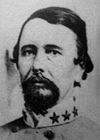 |
Chesnut, James Jr. | Brigadier General | January 18, 1815, Camden, South Carolina |
February 1, 1885, Camden, South Carolina |
Pre-war: Princeton University graduate, 1835. South Carolina legislator. U.S. Senator from South Carolina, 1858–1860. War: Aide to General Beauregard at Fort Sumter. Staff of President Jefferson Davis Jefferson Davis Jefferson Finis Davis , also known as Jeff Davis, was an American statesman and leader of the Confederacy during the American Civil War, serving as President for its entire history. He was born in Kentucky to Samuel and Jane Davis... . Brigadier general, April 23, 1864. Post-war: Reconstruction era politician. Husband of diarist Mary Boykin Chesnut Mary Boykin Chesnut Mary Boykin Chesnut, born Mary Boykin Miller , was a South Carolina author noted for a book published as her Civil War diary, a "vivid picture of a society in the throes of its life-and-death struggle." She described the war from within her upper-class circles of Southern planter society, but... . |
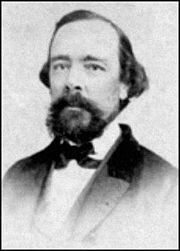 |
Chilton, Robert H. Robert H. Chilton Robert Hall Chilton was an officer in the U.S. Army and then a brigadier general in the Confederate States Army during the American Civil War. He served as Chief of Staff for the Army of Northern Virginia under Robert E. Lee for much of the war.-Biography:Chilton was born in Loudoun County,... |
Brigadier General | February 25, 1815, Loudon County, Virginia |
February 18, 1879 Columbus, Georgia |
Pre-war: USMA, 1837. Captain of dragoons in Mexican-American War. War: Initially lieutenant colonel in Adjutant and Inspector General Department of CSA. Chief of staff to General Robert E. Lee; inspector general of Army of Northern Virginia. Brigadier general, February 16, 1864. Relieved of duty in field at own request in April 1864, finished war in charge of inspection branch in department of Richmond. Post-war: President of manufacturing company at Columbus, Georgia. |
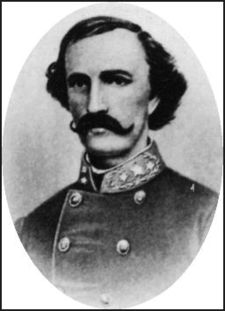 |
Churchill, Thomas J. | Major General | March 10, 1834, Jefferson County, Kentucky |
May 14, 1905, Little Rock, Arkansas |
Pre-war: Educated at St. Mary's College (Kentucky) St. Mary's College (Kentucky) St. Mary's College was an institution established in 1821 by William Byrne.St. Mary's was still a functioning college in 1899.St. Mary's College closed in 1976.-Notable alumni:*Clement S. Hill, U.S. Congressman from Kentucky... , Transylvania University Transylvania University Transylvania University is a private, undergraduate liberal arts college in Lexington, Kentucky, United States, affiliated with the Christian Church . The school was founded in 1780. It offers 38 majors, and pre-professional degrees in engineering and accounting... . Mexican-American War veteran. Moved to Little Rock, Arkansas where he was postmaster in 1861. War: Recruited First Arkansas Mounted Rifles. Fought at Wilson's Creek. Brigadier general, March 4, 1862. Fought at Battle of Richmond, Kentucky. Surrendered at Battle of Arkansas Post. Participated in Red River Campaign and Battle of Jenkins' Ferry Battle of Jenkins' Ferry The Battle of Jenkins' Ferry was fought April 30, 1864, in Grant County, Arkansas during the American Civil War. It was the climactic battle of the Camden Expedition, which was a part of the Union Army’s failed Red River Campaign. Each side sustained a large number of casualties, especially... . Promoted to major general March 18, 1865. Post-war: Arkansas treasurer, governor. Blamed for and had judgment against him for treasury shortfall, which he made good; seems he did not personally profit. |
| Clanton, James H. | Brigadier General | January 8, 1827, Columbia County, Georgia |
September 27, 1871, Knoxville, Tennessee |
Pre-war: Moved to Alabama in 1835. Mexican-American War veteran; lawyer; Alabama legislator; originally opposed secession. War: Colonel, 1st Alabama Cavalry. At Battles of Shiloh, Farmington, Booneville. Brigadier general, November 1863. Atlanta campaign. Badly wounded at Bluff Spring, Florida in March 1865. Post-war: Alabama Democratic Party leader. Assassinated by drunken ex-Federal officer. | |
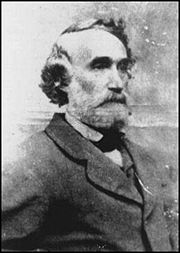 |
Clark, Charles Charles Clark (governor) Charles Clark was a Mississippi Democratic political figure, as well as a major general in the Confederate States Army during the American Civil War.-Early life and career:Clark was born in Cincinnati, Ohio, in 1811... |
Brigadier General | May 24, 1811 Lebanon, Ohio |
December 18, 1877 Bolivar County, Mississippi |
Pre-war: Educated in Kentucky, moved to Mississippi about 1831. Teacher, planter. Mississippi legislator, 1838–1844. Mexican-American War volunteer colonel from Mississippi. War: Brigadier general, May 22, 1861. Severely wounded at Shiloh and again at the Battle of Baton Rouge Battle of Baton Rouge (1862) The Battle of Baton Rouge was a ground and naval battle in the American Civil War fought in East Baton Rouge Parish, Louisiana, on August 5, 1862. The Union victory halted Confederate attempts to recapture the capital city of Louisiana.-Background:... . Governor of Mississippi, 1863–1865. Confined at Fort Pulaski for a time after the war. Post-war: Lawyer, chancellor of district. Died at plantation in Bolivar County, Mississippi. |
 |
Clark, John Bullock Jr. John Bullock Clark, Jr. John Bullock Clark, Jr. was a general in the Confederate States Army during the American Civil War and a postbellum five-term U.S. Congressman from Missouri.-Biography:... |
Brigadier General | January 14, 1831, Fayette, Missouri |
September 7, 1903 Washington, D.C. |
Pre-war: Educated at University of Missouri and Harvard University Law School. Lawyer. War: Lieutenant, then captain, Confederate 6th Missouri Infantry. Major at Battles of Carthage and Springfield, Missouri. As colonel, commanded a brigade at the Battle of Pea Ridge (Elkhorn Tavern). Served in the Trans-Mississippi Department. Brigadier general, March 6, 1864. Closing operations in Trans-Mississippi Department. Post-War: U.S. Representative, 1873–1883. From 1883 until 1889, served as the Clerk of the House of Representatives. Practiced law in Washington, D.C. from 1889 until his death. |
| Clayton, Henry DeLamar Henry DeLamar Clayton (general) Henry DeLamar Clayton, Sr. was a prominent Alabama attorney, politician, Redeemer judge, and college president. He also served as a major general in the Confederate Army during the American Civil War, commanding a division in the Army of Tennessee in the Western Theater.-Early life and... |
Major General | March 7, 1827, Pulaski County, Georgia |
October 13, 1889, Tuscaloosa, Alabama |
Pre-war: Graduate of Emory and Henry College Emory and Henry College Emory & Henry College, known as E&H, Emory, or the College, is a private liberal arts college located in Emory, Virginia, United States. The campus comprises of Washington County, Virginia, which is part of the mountain region of Southwest Virginia... in Virginia. Lawyer. Elected twice to the Alabama House of Representatives Alabama House of Representatives The Alabama House of Representatives is the lower house of the Alabama Legislature, the state legislature of the U.S. state of Alabama. The House is composed of 105 members representing an equal amount of districts, with each constituency containing at least 42,380 citizens. There are no term... . Colonel, 1st Alabama Infantry, at Pensacola. Recruited 39th Alabama Infantry. Severely wounded at the Battle of Murfreesboro (Stones River) but recovered and was active in several more campaigns, including the Battles of Chickamauga and Chattanooga (III), and the 1864 Atlanta Campaign. Brigadier general, April 22, 1863; major general, July 7, 1864. Fought in Franklin-Nashville campaign; led rear guard in retreat. Surrendered with Gen. Joseph E. Johnson in North Carolina. Post-war: circuit court Circuit court Circuit court is the name of court systems in several common law jurisdictions.-History:King Henry II instituted the custom of having judges ride around the countryside each year to hear appeals, rather than forcing everyone to bring their appeals to London... judge; president of the University of Alabama until his death. |
|
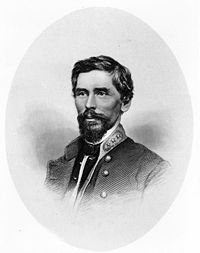 |
Cleburne, Patrick R. Patrick Cleburne Patrick Ronayne Cleburne was an Irish American soldier, best known for his service in the Confederate States Army during the American Civil War, where he rose to the rank of major general.... |
Major General | March 17, 1828, County Cork County Cork County Cork is a county in Ireland. It is located in the South-West Region and is also part of the province of Munster. It is named after the city of Cork . Cork County Council is the local authority for the county... , Ireland |
November 30, 1864 Franklin, Tennessee |
Pre-war: Three years service in British Army. Emigrated to Cincinnati in 1849, then Helena, Arkansas. Lawyer. War: Colonel of 15th Arkansas Infantry in 1861. Brigadier general to rank from March 4, 1862; major general from December 13, 1862. Battles: Shiloh, Perryville, Murfreesboro (Stones River) and others in western theater, including the retreat from the Battle of Chattanooga where he saved trains of Army of Tennessee. Proposed abolition of slavery, arming slaves to fight for Confederacy in January 1864. Killed in action leading division at the Battle of Franklin. Referred to as the "Stonewall of the West". |
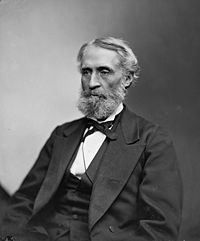 |
Clingman, Thomas Lanier Thomas Lanier Clingman Thomas Lanier Clingman , known as the "Prince of Politicians," was a Democratic member of the United States House of Representatives from 1843 to 1845 and from 1847 to 1858, and U.S. senator from the state of North Carolina between 1858 and 1861... |
Brigadier General | July 17, 1812, Huntsville, North Carolina |
November 3, 1897, Morgantown, North Carolina |
Pre-war: University of North Carolina graduate, 1832. Lawyer, politician. Elected to State legislature, 1835. Democratic member of U.S. House of Representatives, 1843–1845, 1847–1858 and the U.S. Senate, 1858–1861; refused to resign his Senate seat at start of Civil war and was one of ten senators expelled Expulsion from the United States Congress Expulsion is the most serious form of disciplinary action that can be taken against a Member of Congress. Article I, Section 5 of the United States Constitution provides that "Each House [of Congress] may determine the Rules of its proceedings, punish its members for disorderly behavior, and, with... from the Senate in absentia. War: Served mainly in the Carolinas, and at Battles of Drewry's Bluff and Cold Harbor and Siege of Petersburg. Badly wounded in battle on the Weldon Railroad in August 1864. Post-war: explored and measured mountains in western North Carolina and Tennessee. |
| Cobb, Howell Howell Cobb Howell Cobb was an American political figure. A Southern Democrat, Cobb was a five-term member of the United States House of Representatives and Speaker of the House from 1849 to 1851... |
Major General | September 7, 1815, Jefferson County, Georgia |
October 9, 1868 New York City Buried: Athens, Georgia |
Pre-war: University of Georgia graduate, 1834. Secretary of Treasury under President President of the United States The President of the United States of America is the head of state and head of government of the United States. The president leads the executive branch of the federal government and is the commander-in-chief of the United States Armed Forces.... James Buchanan James Buchanan James Buchanan, Jr. was the 15th President of the United States . He is the only president from Pennsylvania, the only president who remained a lifelong bachelor and the last to be born in the 18th century.... . War: Brigadier general, February 12, 1862, major general, September 9, 1863. Suggested building a prisoner-of-war camp in southern Georgia which led to establishment of Andersonville prison Andersonville prison The Andersonville prison, officially known as Camp Sumter, served as a Confederate Prisoner-of-war camp during the American Civil War. The site of the prison is now Andersonville National Historic Site in Andersonville, Georgia. Most of the site actually lies in extreme southwestern Macon County,... . Vehemently opposed Robert E. Lee Robert E. Lee Robert Edward Lee was a career military officer who is best known for having commanded the Confederate Army of Northern Virginia in the American Civil War.... 's proposal of enlisting slaves into the army. Surrendered at Macon, Georgia Macon, Georgia Macon is a city located in central Georgia, US. Founded at the fall line of the Ocmulgee River, it is part of the Macon metropolitan area, and the county seat of Bibb County. A small portion of the city extends into Jones County. Macon is the biggest city in central Georgia... on April 20, 1865. Post-war: After receiving a presidential pardon in 1868, publicly denounced Reconstruction. Died in New York City on a business trip. Brother of Brig. Gen. Thomas Reade Rootes Cobb. |
|
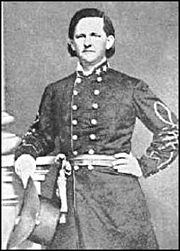 |
Cobb, Thomas Reade Rootes Thomas Reade Rootes Cobb Thomas Reade Rootes Cobb was an American lawyer, author, politician, and Confederate officer, killed in the Battle of Fredericksburg during the American Civil War.-Early life:... |
Brigadier General | April 10, 1823, Jefferson County, Georgia |
December 13, 1862 Fredericksburg, Virginia |
Pre-warL University of Georgia graduate. Lawyer, editor of Georgia Supreme Court reports. Best known for his treatise on the law of slavery titled An Inquiry into the Law of Negro Slavery in the United States of America (1858) and as one of the founders of the University of Georgia School of Law. War: Recruited Cobb's Legion, colonel. Battles: Seven Days' Battles, Second Bull Run (Second Manassas), Maryland campaign. Brigadier general, November 1, 1862. During the war, served on the Confederate Congress Congress of the Confederate States The Congress of the Confederate States was the legislative body of the Confederate States of America, existing during the American Civil War between 1861 and 1865... , where he was a member of the committee that drafted the Confederate constitution. Mortally wounded at the sunken road at the Battle of Fredricksburg. Brother of Maj. Gen. Howell Cobb. |
| Cocke, Philip St. George Philip St. George Cocke Philip St. George Cocke was a brigadier general in the Confederate States Army during the first year of the American Civil War. He is best known for organizing the defense of Virginia along the Potomac River soon after the state's secession from the Union... |
Brigadier General | April 17, 1809, Fluvanna County, Virginia |
December 26, 1861 Fluvanna County, Virginia |
Pre-war: USMA, 1832. Served as adjutant Adjutant Adjutant is a military rank or appointment. In some armies, including most English-speaking ones, it is an officer who assists a more senior officer, while in other armies, especially Francophone ones, it is an NCO , normally corresponding roughly to a Staff Sergeant or Warrant Officer.An Adjutant... in the U.S. army for two years, then resigned to become a cotton planter. President of Virginia Agricultural Society. VMI Board of Visitors for 9 years. After John Brown's Raid on Harpers Ferry, organized militia Militia The term militia is commonly used today to refer to a military force composed of ordinary citizens to provide defense, emergency law enforcement, or paramilitary service, in times of emergency without being paid a regular salary or committed to a fixed term of service. It is a polyseme with... infantry Infantry Infantrymen are soldiers who are specifically trained for the role of fighting on foot to engage the enemy face to face and have historically borne the brunt of the casualties of combat in wars. As the oldest branch of combat arms, they are the backbone of armies... in his home county in Virginia. War: Brigadier general of state troops, Confederate colonel, then brigadier general, October 31, 1861. Led troops in the Battle of Blackburn's Ford and the Battle of First Bull Run (First Manassas). Returned home after eight months in field due to ill health, became depressed and committed suicide December 26, 1861. |
|
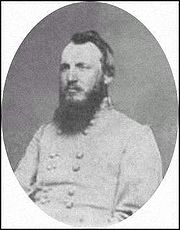 |
Cockrell, Francis M. Francis Cockrell Francis Marion Cockrell was a Confederate military commander and American politician from the state of Missouri. He served as a United States Senator from Missouri for five terms. He was a prominent member of the famed South–Cockrell–Hargis family of Southern politicians.-Early life:Cockrell was... |
Brigadier General | October 1, 1834, Warrensburg, Mississippi |
December 13, 1915 Washington, D.C. Buried: Warrensburg, Mississippi |
Pre-war: Graduated from Chapel Hill College, Lafayette County, Missouri, 1853. War: Joined Confederate army as a captain; fought in several early battles in Missouri. Wounded in Vicksburg Campaign. Promoted to brigadier general, July 18, 1863. Atlanta campaign. Severely wounded at Battle of Franklin. Captured at Mobile. Post-war: lawyer, U.S. Senator from Missouri 1875–1905. Appointed by President Theodore Roosevelt Theodore Roosevelt Theodore "Teddy" Roosevelt was the 26th President of the United States . He is noted for his exuberant personality, range of interests and achievements, and his leadership of the Progressive Movement, as well as his "cowboy" persona and robust masculinity... to the Interstate Commerce Commission Interstate Commerce Commission The Interstate Commerce Commission was a regulatory body in the United States created by the Interstate Commerce Act of 1887. The agency's original purpose was to regulate railroads to ensure fair rates, to eliminate rate discrimination, and to regulate other aspects of common carriers, including... , 1905–1910. Texas–New Mexico boundary commissioner. War Department Director of Ordnance, 1912–1915. |
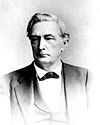 |
Colquitt, Alfred Holt | Brigadier General | April 20, 1824, Monroe, Georgia |
March 26, 1894, Washington, D.C. |
Pre-war: Princeton University, class of 1844. Lawyer, Staff major in Mexican-American War. U.S. Congressman, 1852, 1 term. Member of Georgia Legislature, 1859. War: Colonel, 6th Georgia Infantry, May 1861. Battles: Peninsula campaign, Seven Days' Battles, Antietam (Sharpsburg), Fredericksburg, Chancellorsville. Brigadier general appointment to rank from September 1, 1862. In command at Battle of Olustee, Florida. At Siege of Petersburg; paroled at Greensboro, North Carolina. Post-war: Governor of Georgia, 1876–1882. U.S. Senator from Georgia, 1882–1894. |
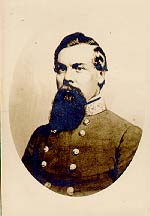 |
Colston, Raleigh E. "Parlez" Raleigh E. Colston Raleigh Edward Colston was a French-born American professor, soldier, cartographer, and writer. He was a controversial brigadier general in the Confederate States Army during the American Civil War... |
Brigadier General | October 21, 1825 Paris, France |
July 29, 1896 Richmond, Virginia |
Pre-war: Adopted son of Virginia doctor. VMI Virginia Military Institute The Virginia Military Institute , located in Lexington, Virginia, is the oldest state-supported military college and one of six senior military colleges in the United States. Unlike any other military college in the United States—and in keeping with its founding principles—all VMI students are... graduate, 1846; professor of French at VMI until 1861. War: Brigadier genera; promotion December 23, 1861. Served under Beauregard at Petersburg after Battle of Chancellorsville. Post-war: Military school in North Carolina, colonel in Egyptian army sustaining severe injuries. Died at the Confederate Soldiers' Home, Richmond, Virginia. |
| Conner, James James Conner (general) James Conner , was a Confederate States Army brigadier general during the American Civil War . He was a lawyer in South Carolina both before and after the war and was elected State attorney general of South Carolina in 1876.-Early life:James Conner was born on September 1, 1829 in Charleston, South... |
Brigadier General | September 1, 1829, Charleston, South Carolina |
June 26, 1883, Richmond, Virginia |
Pre-war: South Carolina College graduate, 1849. U.S. District Attorney, 1856. Prosecuted case of slave ship Echo. War: Captain in Hampton's Legion at Battle of First Bull Run (First Manassas), colonel of 22nd North Carolina Infantry after Battle of Seven Pines. Brigadier general, June 1, 1864. Lost leg at Cedar Creek, Virginia skirmish, October 13, 1864. Post-war: Attorney General of South Carolina, 1876. | |
| Cook, Philip | Brigadier General | July 31, 1817, Twiggs County, Georgia |
May 21, 1894, Atlanta, Georgia |
Pre-war: Oglethorpe University graduate; University of Virginia Law School graduate, 1841. State senator. War: Private in 4th Georgia Infantry Regiment, then adjutant, then lieutenant colonel after Seven Days Battles, colonel after Antietam (Sharpsburg). Brigadier general, August 5, 1864. Wounded several times, the last at Fort Stedman Battle of Fort Stedman The Battle of Fort Stedman was fought on March 25, 1865, during the final days of the American Civil War. The Union Army fortification in the siege lines around Petersburg, Virginia, was attacked in a pre-dawn Confederate assault by troops led by Maj. Gen. John B. Gordon. The attack was the last... on March 25, 1865. Post-war: U.S. Congressman, 1873–1883; Secretary of State of Georgia, 1890–1894. |
|
| Cooke, John Rogers John Rogers Cooke John Rogers Cooke was a Confederate general during the American Civil War. He was the son of Union general Philip St. George Cooke and the brother-in-law of Confederate cavalry leader Jeb Stuart.-Biography:... |
Brigadier General | June 9, 1833, Jefferson Barracks, Missouri |
April 10, 1891, Richmond, Virginia |
Pre-war: Harvard University graduate, 1855. Commissioned into U.S. Army. Son of Union Brigadier General (Brevet Major General) Philip St. George Cooke Philip St. George Cooke Philip St. George Cooke was a career United States Army cavalry officer who served as a Union General in the American Civil War. He is noted for his authorship of an Army cavalry manual, and is sometimes called the "Father of the U.S... and brother-in-law of Jeb Stuart. Colonel, 27th North Carolina Infantry, April 1862. Brigadier general, November 1, 1862. Participated in all major campaigns of Army of Northern Virginia. Wounded 7 times. Post-war: Merchant and a founder of Confederate Soldiers Home at Richmond, Virginia. |
|
| Cooper, Douglas H. Douglas H. Cooper Douglas Hancock Cooper was a politician, a soldier, an Indian Agent in what is now Oklahoma, and a Confederate general during the American Civil War.-Early life and career:... |
Brigadier General | November 1, 1815, probably Amite County, Mississippi |
April 29, 1879 Old Fort Washita now Bryan County, Oklahoma |
Pre-war: Attended University of Virginia University of Virginia The University of Virginia is a public research university located in Charlottesville, Virginia, United States, founded by Thomas Jefferson... , 1832–1834. Planter in Wilkinson County, Mississippi Wilkinson County, Mississippi -Demographics:As of the census of 2000, there were 10,312 people, 3,578 households, and 2,511 families residing in the county. The population density was 15 people per square mile . There were 5,106 housing units at an average density of 8 per square mile... . Mexican-American War veteran. U.S. agent to Choctaw Choctaw The Choctaw are a Native American people originally from the Southeastern United States... Nation, 1853. War: Colonel of 1st Choctaw and Chickasaw Mounted Rifles. Brigadier general, May 2, 1863. Commanded Indian brigade in Sterling Price's Missouri campaign, 1864. Post-war: Prosecuted Indian claims against government. Died April 29, 1879, Old Fort Washita, Chickasaw Nation, now Bryan County, Oklahoma. |
|
| Cooper, Samuel Samuel Cooper (general) Samuel Cooper was a career United States Army officer, serving during the Second Seminole War and the Mexican-American War. Although little-known today, Cooper was also the highest ranking Confederate general during the American Civil War... |
General | June 12, 1798, Dutchess County, New York |
December 3, 1876 Alexandria Virginia |
Pre-war: USMA, 1815. Appointed Adjutant General of the U.S. Army in 1852. Married a sister of U.S. Senator James Murray Mason of Virginia. War: Ranking general officer of the Confederate Army, Adjutant and Inspector General throughout the war. Never in field command but contributed valuable organizational skills. Turned his records over to the U.S. authorities upon surrender. Post-war: Died on his farm near Alexandria, Virginia. | |
| Corse, Montgomery Dent | Brigadier General | March 14, 1816, Alexandria, Virgina |
February 11, 1895, Alexandria, Virgina |
Pre-war: Mexican-American War veteran. Banker. War: Colonel 17th Virginia Infantry Regiment, reduced to seven men at Battle of Antietam. Brigadier general, November 1, 1862. Other battles: First Manassas, Yorktown, Williamsburg, Seven Pines, Seven Days' Battles, in Tennessee, North Carolina, Siege of Petersburg. On detached duty during Gettysburg. Brigade fought well at Five Forks. Captured at Battle of Sayler's Creek. Post-war: Resumed banking business. | |
| Cosby, George B. George B. Cosby George Blake Cosby , was a Confederate States Army brigadier general during the American Civil War. He was an 1852 graduate of the United States Military Academy and served in the United States Army until May 10, 1861... |
Brigadier General | January 19, 1830, Louisville, Kentucky |
June 29, 1909, Oakland, California |
Pre-war: USMA, 1852. War: Staff major for Brig. Gen. Buckner at Fort Donelson. Brigadier general promotion to rank from January 20, 1863. Led cavalry brigade under Van Dorn and in campaign to relieve Vicksburg under General Joseph E. Johnston. Then in Department of West Virginia and East Tennessee. Post-war: Farmer, Board of State Engineers and federal government positions in California; West Point Board of Visitors. Suicide June 29, 1909, aged 79, at Oakland, California, allegedly due to effects of old wounds. | |
 |
Cox, William Ruffin | Brigadier General | March 11, 1832, Scotland Neck, North Carolina |
December 26, 1919, Richmond, Virginia |
Pre-war: Lawyer in Tennessee, returned to North Carolina, 1857. War: Major, 2nd North Carolina Infantry. Continuously with Army of Northern Virginia. Appointed brigadier general with temporary rank from May 31, 1864. Wounded eleven times. Post-war: Member of U.S. House of Representatives, 1880–1886; Secretary of U.S, Senate, 1893–1900. Prominent Mason. Died December 26, 1919, Richmond, Virginia, one of the last surviving Confederate generals. |
| Crittenden, George Bibb | Major General | March 20, 1812, Russellville, Kentucky |
November 27, 1880, Frankfort, Kentucky |
Pre-war: USMA, 1832. Brother of Union Major General Thomas L. Crittenden. Black Hawk War Black Hawk War The Black Hawk War was a brief conflict fought in 1832 between the United States and Native Americans headed by Black Hawk, a Sauk leader. The war erupted soon after Black Hawk and a group of Sauks, Meskwakis, and Kickapoos known as the "British Band" crossed the Mississippi River into the U.S.... veteran. Texas Army, captured in Mier Expedition Mier Expedition The Mier Expedition, was an offshoot that developed originally out of the Somervell Expedition, which was a unsuccessful military operation launched in November 1842 by a Texian militia against Mexican border settlements. It included a major battle at Ciudad Mier on December 26 and 27, 1842 which... . Mexican-American War veteran. War: Brigadier general, August 15, 1861; major general, November 9, 1861. Resigned commission after badly defeated at Battle of Fishing Creek (Mill Springs) when disobedience by Brig. Gen. Felix Zollicoffer, who died in the battle, put the army in jeopardy. Continued to serve in subordinate capacities. Post-war: Librarian of State of Kentucky. |
|
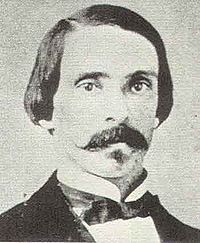 |
Cumming, Alfred Alfred Cumming (general) Alfred Cumming was a brigadier general for the Confederacy in the American Civil War.-Early life:... |
Brigadier General | January 30, 1829, Augusta, Georgia |
December 5, 1910, Rome, Georgia |
Pre-war: USMA, 1849. Mormon Expedition Utah War The Utah War, also known as the Utah Expedition, Buchanan's Blunder, the Mormon War, or the Mormon Rebellion was an armed confrontation between LDS settlers in the Utah Territory and the armed forces of the United States government. The confrontation lasted from May 1857 until July 1858... . War: Lt. Col. 10th Georgia Infantry, June 1861. Brigadier general, October 29, 1862. Captured at Vicksburg and later exchanged. Disabled by wounds at Battle of Jonesboro, August 31, 1864. Post-war: farmer, member of 1888 Military Commission to Korea. |
D
| Image | Name | Rank | Date, Place of Birth | Date, Place of Death | Daniel, Junius Junius Daniel Junius Daniel was a planter and career military officer, serving in the United States Army, then in the Confederate States Army during the American Civil War, as a brigadier general. His troops were instrumental in the Confederates' success at the first day of the Battle of Gettysburg... | Brigadier General | June 27, 1828, Halifax, North Carolina |
May 13, 1864, Spotsylvania, Virginia |
Pre-war: USMA, 1851; served 7 years in U.S. Army, planter. War: Colonel, 14th North Carolina Infantry Regiment in Seven Days' Battles. Promoted brigadier general, September 1, 1862. Service in North Carolina in winter. Brigade suffered severe losses at Battle of Gettysburg. With Army of Northern Virginia until his death. Mortally wounded at "Bloody Angle" at Battle of Spotsylvania, May 12, 1864, died the next day. |
|---|---|---|---|---|---|---|---|---|---|
 |
Davidson, Henry B. | Brigadier General | January 28, 1831, Shelbyville, Tennessee |
March 4, 1899, near Livermore, California |
Pre-war: Mexican-American War, enlisted at 15. USMA, 1853. Served on frontier with U.S. Army. War: Became Confederate staff officer, then brigadier general, August 18, 1863. With Wheeler's cavalry corps, then transferred to Virginia. With Maj. Gen. Lunsford Lomax in Valley Campaigns of 1864 Valley Campaigns of 1864 The Valley Campaigns of 1864 were American Civil War operations and battles that took place in the Shenandoah Valley of Virginia from May to October 1864. Military historians divide this period into three separate campaigns, but it is useful to consider the three together and how they... . Surrendered with Gen. Joseph E. Johnston at Greensboro, North Carolina. Post-war: civil engineer in California, Deputy Secretary of State of California and Southern Pacific Railroad Southern Pacific Railroad The Southern Pacific Transportation Company , earlier Southern Pacific Railroad and Southern Pacific Company, and usually simply called the Southern Pacific or Espee, was an American railroad.... agent. |
||||
| Davis, Joseph R. Joseph R. Davis Joseph Robert Davis was a Confederate general during the American Civil War and nephew of Confederate President Jefferson Davis. His troops played an important role in the Battle of Gettysburg.-Early life:... |
Brigadier General | January 12, 1825, Woodville, Mississippi |
September 15, 1896, Biloxi, Mississippi |
Pre-war: Educated at Nashville and Miami University of Ohio. Nephew of Jefferson Davis. War: Lawyer. Lieutenant colonel of 10th Mississippi Infantry; staff of President Davis as colonel. Brigadier general to rank from September 15, 1862. Led brigade at Battle of Gettysburg; Battle of the Wilderness; Siege of Petersburg; Battle of Appomattox Courthouse. Post-war: lawyer. | |||||
| Davis, William G.M. William G. M. Davis William G. M. Davis was a Confederate States Army brigadier general and blockade runner during the American Civil War. He was a lawyer and cotton speculator before the war and a lawyer in Washington, D.C. after the war.... |
Brigadier General | May 9, 1812, Portsmouth, Virginia |
March 11, 1898, Alexandria, Virginia |
Pre-war: Ran away to sea at age 17. Returned to live at Apalachicola, Florida. Lawyer, cotton speculator. War: Raised, equipped and elected colonel of 1st Florida Cavalry Regiment. Brigadier general, November 4, 1862. Served in East Tennessee. Resigned May 6, 1863. Operated blockade runners thereafter. Post-war: Lawyer in Jacksonville, Florida Jacksonville, Florida Jacksonville is the largest city in the U.S. state of Florida in terms of both population and land area, and the largest city by area in the contiguous United States. It is the county seat of Duval County, with which the city government consolidated in 1968... , then Washington, D.C. |
|||||
| Dearing, James James Dearing James Dearing was a Confederate States Army officer during the American Civil War. He was mortally wounded at the Battle of High Bridge during the Appomattox Campaign, making him one of the last officers to die in the war; there are claims that he was the last general officer to die in the... |
Brigadier General | April 25, 1840, Campbell County, Virginia |
April 23, 1865 Lynchburg, Virginia |
Pre-war: USMA, entered 1858, resigned April 22, 1861. War: Lieutenant, Washington Artillery. Major of artillery at Battle of Gettysburg. Colonel of cavalry. Brigadier general, April 29, 1864. Siege of Petersburg. Mortally wounded at Battle of High Bridge Battle of High Bridge The Battle of High Bridge was fought on April 6–7, 1865, near the end of the Appomattox Campaign of the American Civil War. On April 6, the Confederate cavalry fought stubbornly to secure the Appomattox River bridges. On April 7, elements of the Union II Corps came up against Lt. Gen. James... , April 6, 1865, during the Appomattox Campaign Appomattox Campaign The Appomattox Campaign was a series of battles fought March 29 – April 9, 1865, in Virginia that culminated in the surrender of Confederate General Robert E... , in a pistol duel with Union Lieutenant Colonel (Brevet Brevet (military) In many of the world's military establishments, brevet referred to a warrant authorizing a commissioned officer to hold a higher rank temporarily, but usually without receiving the pay of that higher rank except when actually serving in that role. An officer so promoted may be referred to as being... Brigadier General) Theodore Read, who also was killed. Died April 23, 1865 at Lynchburg, Virginia, the last Confederate general to die of wounds received in battle. |
|||||
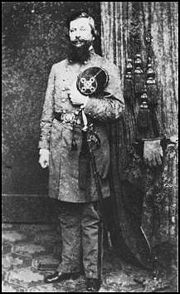 |
Deas, Zachariah Cantey Zachariah C. Deas Zachariah Cantey Deas was a prominent Southern United States cotton broker and soldier. He served as a brigadier general in the Confederate States Army during the American Civil War.-Biography:... |
Brigadier General | October 25, 1819, Camden, South Carolina |
March 6, 1882 New York, New York |
Pre-war: Moved to Mobile, Alabama as a boy. Mexican-American War veteran. War: Colonel 22nd Alabama Infantry. Badly wounded while in temporary brigade command at Battle of Shiloh. Brigadier general to rank from December 13, 1862. Led brigade at Battle of Stones River (Murfreesboro), Battle of Chickamauga, the Chattanooga Campaign and all subsequent engagements of Army of Tennessee. Ill during Carolinas Campaign. Post-war stock broker. | ||||
| De Lagnel, Julius A. Julius A. De Lagnel Julius A. De Lagnel , was a Confederate States Army officer, who was appointed and confirmed as a brigadier general, during the American Civil War, but who declined the appointment. He was second in command to Brigadier General Josiah Gorgas in the Confederate Ordnance Bureau and at times was an... |
Brigadier General | July 24, 1827, Newark, New Jersey |
June 3, 1912, Washington, D.C. |
Pre-war: U.S. Army officer 1847–1861. War: Commanded defense of crest at Battle of Rich Mountain Battle of Rich Mountain The Battle of Rich Mountain took place on July 11, 1861, in Randolph County, Virginia as part of the Operations in Western Virginia Campaign during the American Civil War.-Background:... , wounded, captured and exchanged for Union general James B. Ricketts James B. Ricketts James Brewerton Ricketts was a career officer in the United States Army, serving as a Union Army general in the Eastern Theater during the American Civil War.-Early life and career:... . Appointed brigadier general to rank from April 12, 1862, but declined the commission. Briefly served as artillery major in Army of Northern Virginia, then served in ordnance bureau in Richmond and Fayetteville, North Carolina Fayetteville, North Carolina Fayetteville is a city located in Cumberland County, North Carolina, United States. It is the county seat of Cumberland County, and is best known as the home of Fort Bragg, a U.S. Army post located northwest of the city.... as lieutenant colonel. Inspector of arsenals. Post-war: Pacific steamship service. |
|||||
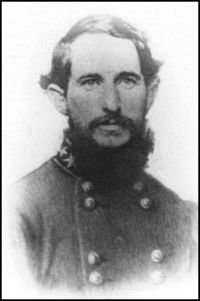 |
Deshler, James James Deshler James Deshler was a career United States Army officer and a graduate of West Point. He was a Confederate brigadier general during the American Civil War and died on the field of battle.-Early life and career:... |
Brigadier General | February 13, 1833, Tuscumbia, Alabama |
September 20, 1863 Chickamauga, Georgia Buried: Tuscumbia, Alabama |
Pre-war: USMA, 1854. U.S. Army until 1861. War: Captain of artillery. Brigade adjutant at Battle of Cheat Mountain Battle of Cheat Mountain The Battle of Cheat Mountain, also known as the Battle of Cheat Summit Fort, took place from September 12 to 15, 1861, in Pocahontas County and Randolph County, Virginia as part of the Western Virginia Campaign during the American Civil War. It was the first battle of the Civil War in which Robert... . Shot at skirmish at Allegheny Summit, West Virginia, December 13, 1861. Chief of artillery for then Maj. Gen. Theophilus Holmes during Seven Days Battles. Accompanied Holmes to Trans-Mississippi Department. Captured commanding brigade at Battle of Arkansas Post, exchanged. Brigadier general, July 28, 1863. Killed by a shell at Battle of Chickamauga, September 20, 1863. |
||||
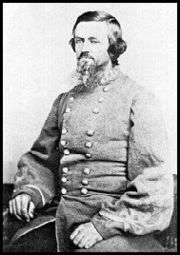 |
Dibrell, George Gibbs George Gibbs Dibrell George Gibbs Dibrell was an American lawyer and a five-term member of the United States House of Representatives from the 3rd Congressional District of Tennessee. He also served as a general in the Confederate States Army during the American Civil War and as a railroad executive.-Biography:Dibrell... |
Brigadier General | April 12, 1822, Sparta, Tennessee |
May 9, 1888, Sparta, Tennessee |
Pre-war: Successful merchant and farmer. War: Enlisted as private. In 1862, Colonel, 8th Tennessee Cavalry, then brigade commander of cavalry under Lt. Gen. Nathan Bedford Forrest, then under Maj. Gen. Joseph Wheeler. Appointed brigadier general, January 28, 1865, to rank from July 26, 1864. In charge of Confederate archives after fall of Richmond. Post-war: U.S. House of Representatives, 1874–1884. President of Southwestern Railroad, developer of Bon Air coal mines. | ||||
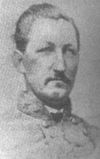 |
Dockery, Thomas P. | Brigadier General | December 18, 1833, North Carolina, probably Montgomery County |
February 27, 1898, New York City. Buried: Natchez, Mississippi. |
Pre-war: Moved to Tennessee as a child, then to Arkansas. Colonel of 5th Arkansas State Troops, then 19th Arkansas Infantry at Battle of Wilson's Creek Battle of Wilson's Creek The Battle of Wilson's Creek, also known as the Battle of Oak Hills, was fought on August 10, 1861, near Springfield, Missouri, between Union forces and the Missouri State Guard, early in the American Civil War. It was the first major battle of the war west of the Mississippi River and is sometimes... , Second Battle of Corinth Second Battle of Corinth The Second Battle of Corinth was fought October 3–4, 1862, in Corinth, Mississippi. For the second time in the Iuka-Corinth Campaign, Union Maj. Gen. William S... . Commanded 2nd brigade under Major General John S. Bowen at Vicksburg. Captured at surrender, paroled. Brigadier general, August 10, 1863. Brigade command at Battle of Jenkins Ferry, Battle of Marks' Mills Battle of Marks' Mills The Battle of Marks' Mills occurred on April 25, 1864, in Cleveland County, Arkansas as part of the Camden Expedition of the American Civil War. Confederate troops under Maj. Gen. James F. Fagan overwhelmed a small Union detachment commanded by Lt. Col. Francis M... . Post-war civil engineer. Lived in Houston, Texas for some years. |
||||
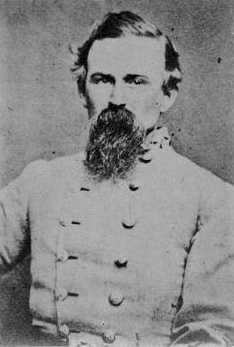 |
Doles, George Pierce | Brigadier General | May 14, 1830, Milledgeville, Georgia |
June 2, 1864, Hanover County, Virginia Buried: Milledgeville Georgia |
Pre-war: Businessman, militia captain. War: Colonel of 4th Georgia Infantry, stationed near Norfolk, Virginia Norfolk, Virginia Norfolk is an independent city in the Commonwealth of Virginia in the United States. With a population of 242,803 as of the 2010 Census, it is Virginia's second-largest city behind neighboring Virginia Beach.... , first year of war. Fought at Seven Days Battles, Battle of Antietam. Brigadier general, November 1, 1862. Fought at Battles of Fredericksburg, Chancellorsville, Gettysburg, the Wilderness and Spotsylvania. Killed at the Battle of Totopotomoy Creek Battle of Totopotomoy Creek The Battle of Totopotomoy Creek , also called the Battle of Bethesda Church, Crumps Creek, Shady Grove Road, and Hanovertown, was a battle fought May 28–30, 1864, in Union Lt. Gen. Ulysses Grant's Overland Campaign against Confederate Gen. Robert E... , also known as the Battle of Bethesda Church, June 2, 1864. |
||||
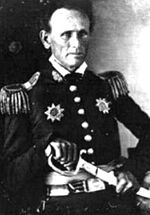 |
Donelson, Daniel Smith Daniel Smith Donelson Daniel Smith Donelson was a Tennessee politician and a Confederate general during the American Civil War.-Early life:... |
Major General | June 23, 1801, Sumner County, Tennessee |
April 17, 1863 Montvale Springs, Tennessee |
Pre-war: USMA, 1825. Resigned from U.S. Army, 1826. Pre-war Speaker of Tennessee House of Representatives Tennessee House of Representatives The Tennessee House of Representatives is the lower house of the Tennessee General Assembly, the state legislature of the U.S. state of Tennessee.-Constitutional requirements:... . Brigadier general, July 9, 1861. In western Virginia with then Brigadier General W. W. Loring. Commanded brigade in Major General Cheatham's division at Battle of Murfreesboro (Stones River). Promoted and confirmed major general, April 22, 1863, but had died at Montvale Springs, Tennessee, April 17, 1863. Nephew of President President of the United States The President of the United States of America is the head of state and head of government of the United States. The president leads the executive branch of the federal government and is the commander-in-chief of the United States Armed Forces.... Andrew Jackson Andrew Jackson Andrew Jackson was the seventh President of the United States . Based in frontier Tennessee, Jackson was a politician and army general who defeated the Creek Indians at the Battle of Horseshoe Bend , and the British at the Battle of New Orleans... . Brother of Jackson's private secretary, Andrew Jackson Donelson Andrew Jackson Donelson Andrew Jackson Donelson was an American diplomat and a candidate for Vice President of the United States.-Biography:... , who adhered to the Union. |
||||
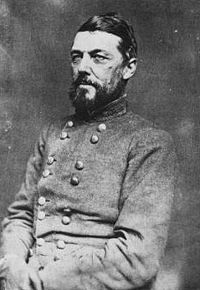 |
Drayton, Thomas F. Thomas Drayton Thomas Fenwick Drayton was a plantation owner, politician, railroad president, and military officer, serving in the United States Army and then as a brigadier general in the Confederate States Army during the American Civil War.-Early life and career:Drayton was a native of South Carolina, most... |
Brigadier General | August 24, 1808, South Carolina, probably Charleston |
February 18, 1891, Florence, South Carolina |
Pre-war: USMA, 1828. Brother of Union Navy Union Navy The Union Navy is the label applied to the United States Navy during the American Civil War, to contrast it from its direct opponent, the Confederate States Navy... Captain Percival Drayton Percival Drayton Percival Drayton was a United States Navy officer during the American Civil War.-Biography:Born in Charleston, South Carolina, Drayton was the son of a prominent lawyer William Drayton who eventually relocated to Philadelphia, Pennsylvania... . Resigned from U.S. Army, 1836. South Carolina legislator, planter, railroad developer. War: Brigadier general, September 25, 1861. Command at unsuccessful Battle of Port Royal Battle of Port Royal The Battle of Port Royal was one of the earliest amphibious operations of the American Civil War, in which a United States Navy fleet and United States Army expeditionary force captured Port Royal Sound, South Carolina, between Savannah, Georgia and Charleston, South Carolina, on November 7, 1861... , Battles: Second Bull Run (Second Manassas), South Mountain and Antietam. Subject to much criticism by superiors. Minor departmental command and boards of inquiry in the Trans-Mississippi Department thereafter. Post-war: farmer, insurance agent, South Carolina Immigration Society president. |
||||
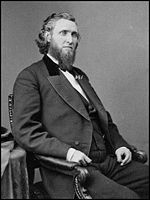 |
Du Bose, Dudley M. Dudley M. Du Bose Dudley McIver Du Bose was a lawyer, soldier, and a U.S. Representative from Georgia.-Early life:Du Bose was born in Shelby County, Tennessee. He attended the University of Mississippi at Oxford, and graduated from the Lebanon Law School in 1856... |
Brigadier General | October 28, 1834, Shelby County, Tennessee |
March 2, 1883, Washington, Georgia |
Pre-war: Attended University of Mississippi, Lebanon (Tennessee) Law School. Lawyer, 1857. Moved to August, Georgia, 1860. War: Began Confederate service as a lieutenant. Colonel of 15th Georgia Infantry, January 1863. Fought at Battle of Gettysburg, where regiment sustained heavy losses, and subsequent battles of the Army of Northern Virginia. Brigadier general, November 16, 1864. Captured at the Battle of Sayler's Creek, April 6, 1865. Post-war: U.S. House of Representatives, 1871–1873. | ||||
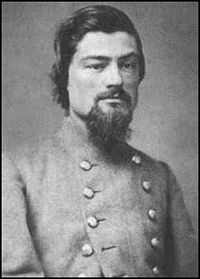 |
Duke, Basil W. Basil W. Duke Basil Wilson Duke was a Confederate general officer during the American Civil War. His most noted service in the war was as second-in-command for his brother-in-law John Hunt Morgan; Duke would later write a popular account of Morgan's most famous raid: 1863's Morgan's Raid... |
Brigadier General | May 28, 1838, Scott County, Kentucky | September 16, 1916 New York City Buried: Lexington, Kentucky. |
Pre-war: Centre College and Transylvania University Law School graduate. Lawyer in St. Louis. Promoted proposed secession of Missouri. Brother-in-law of Brig. Gen. John Hunt Morgan John Hunt Morgan John Hunt Morgan was a Confederate general and cavalry officer in the American Civil War.Morgan is best known for Morgan's Raid when, in 1863, he and his men rode over 1,000 miles covering a region from Tennessee, up through Kentucky, into Indiana and on to southern Ohio... . War: Enlisted as private, soon 2d lieutenant of Lexington Rifles company. After regiment was formed, served as lieutenant colonel and colonel of 2nd Kentucky Cavalry under Morgan. POW for more than year after captured during Morgan's Ohio raid. Brigadier general, September 15, 1864. Escort to Confederate President Jefferson Davis and Confederate government at end of war. Post-war: lawyer, legislator, author and editor. Commissioner of Shiloh National Military Park Shiloh National Military Park Shiloh National Military Park preserves the American Civil War Shiloh and Corinth battlefields. The main section of the park is in the unincorporated town of Shiloh, about nine miles south of Savannah, Tennessee, with an additional area located in the city of Corinth, Mississippi, 23 miles ... , 1895–1916. Mrs. Duke's and Brigadier General Morgan's sister was wife of Lt. Gen. A.P. Hill. |
||||
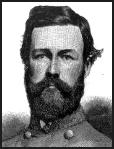 |
Duncan, Johnson K. Johnson K. Duncan Johnson Kelly Duncan was one of the few generals in the Confederate States Army during the American Civil War who was born and raised in the North. An antebellum officer in the U.S... |
Brigadier General | March 19, 1827, York, Pennsylvania |
December 18, 1862, Knoxville Tennessee |
Pre-war: USMA, 1849. Seminole Wars. Helped explore a route for Northern Pacific Railroad. Resigned from U.S. Army 1855. Chief Engineer Louisiana Board of Public Works at outbreak of the war. War: Commanded coastal defenses around New Orleans. Brigadier general, January 7, 1862. Captured in April 1862 and exchanged. Chief of staff to General Braxton Bragg. Died of fever at Knoxville, Tennessee, December 18, 1862. | ||||
| Dunovant, John John Dunovant John Dunovant was a brigadier general with temporary rank in the Confederate States Army during the American Civil War. A South Carolinian, he was commander of the 1st South Carolina Infantry Regiment and later the 5th South Carolina Cavalry Regiment from his home state... |
Brigadier General | March 5, 1825, Chester, South Carolina |
October 1, 1864 Petersburg, Virginia Buried: Chester, South Carolina |
Pre-war: Mexican-American War veteran. Resigned as U.S. Army captain, end of 1860. War: Major of militia, then colonel, 1st South Carolina Regulars in Confederate Army. Cashiered for drunkenness in June 1862. Soon appointed colonel of 5th South Carolina Cavalry by Governor Pickens. Regiment was ordered to Virginia in 1864 and Dunovant redeemed himself by his conduct. Appointed temporary brigadier general, August 22, 1864. Killed in action during the Siege of Petersburg, after the capture of Fort Harrison, during the Battle of Chaffin's Farm Battle of Chaffin's Farm The Battle of Chaffin's Farm and New Market Heights, also known as Laurel Hill and combats at Forts Harrison, Johnson, and Gilmer, was fought September 29–30, 1864, as part of the Siege of Petersburg in the American Civil War.-Background:... , in subsequent related fighting during the Battle of Vaughan Road Battle of Vaughan Road The Battle of Vaughan Road, also spelled "Vaughn", was an American Civil War engagement between Confederate States Army and Union Army cavalry forces protecting the flank of the main Union attack on Confederate positions on the western end of the Confederate line on October 1, 1864 during the... , October 1, 1864. |
E
| Image | Name | Rank | Date, Place of Birth | Date, Place of Death | Early, Jubal Anderson "Jube" "Jubilee" Jubal Anderson Early Jubal Anderson Early was a lawyer and Confederate general in the American Civil War. He served under Stonewall Jackson and then Robert E. Lee for almost the entire war, rising from regimental command to lieutenant general and the command of an infantry corps in the Army of Northern Virginia... | Lieutenant General | November 3, 1816, Franklin County, Virginia |
March 2, 1894, Lynchburg, Virginia |
Pre-war: USMA, 1837. Seminole War veteran. Lawyer. Mexican-American War veteran. Voted against secession in convention. War: Colonel 24th Virginia Infantry at Battle of First Manassas. Brigadier general, July 21, 1861. Major general, January 17, 1863. Fought at Gettysburg. Lieutenant general, May 31, 1864. Fought in Overland Campaign. After Cold Harbor, led a Confederate army in the Valley Campaigns of 1864 Valley Campaigns of 1864 The Valley Campaigns of 1864 were American Civil War operations and battles that took place in the Shenandoah Valley of Virginia from May to October 1864. Military historians divide this period into three separate campaigns, but it is useful to consider the three together and how they... , including the Battle of Monocacy Battle of Monocacy The Battle of Monocacy was fought on July 9, 1864, just outside Frederick, Maryland, as part of the Valley Campaigns of 1864, in the American Civil War. Confederate forces under Lt. Gen. Jubal A. Early defeated Union forces under Maj. Gen. Lew Wallace... and Battle of Fort Stevens Battle of Fort Stevens The Battle of Fort Stevens was an American Civil War battle fought July 11–12, 1864, in Northwest Washington, D.C., as part of the Valley Campaigns of 1864 between forces under Confederate Lt. Gen. Jubal A. Early and Union Maj. Gen. Alexander McD. McCook. Although Early caused consternation... . Defeated by Union Major General Philip Sheridan Philip Sheridan Philip Henry Sheridan was a career United States Army officer and a Union general in the American Civil War. His career was noted for his rapid rise to major general and his close association with Lt. Gen. Ulysses S... at Third Battle of Winchester, Battle of Fisher's Hill Battle of Fisher's Hill The Battle of Fisher's Hill was fought September 21–22, 1864, as part of the Valley Campaigns of 1864 during the American Civil War. Fisher's Hill is located near Strasburg, Virginia.... and Battle of Cedar Creek Battle of Cedar Creek The Battle of Cedar Creek, or Battle of Belle Grove, October 19, 1864, was one of the final, and most decisive, battles in the Valley Campaigns of 1864 during the American Civil War. The final Confederate invasion of the North, led by Lt. Gen. Jubal A. Early, was effectively ended... . Command dispersed at Battle of Waynesboro Battle of Waynesboro The Battle of Waynesboro was fought on March 2, 1865, in Augusta County, Virginia, during the American Civil War. It was the final battle for Confederate Lt. Gen. Jubal Early, whose force was destroyed.-Background:... . Post-war: Lawyer, Southern Historical Society Southern Historical Society The Southern Historical Society is a public organization founded by Confederate Major General Dabney H. Maury in 1868-1869 and documented Southern military and civilian viewpoints from the American Civil War until now... President, supervision of Louisiana State Lottery Louisiana State Lottery Company The Louisiana State Lottery Company was a private corporation that in the mid-19th century ran the Louisiana lottery. It was for a time the only legal lottery in the United States, and for much of that time had a very foul reputation as a swindle of the state and citizens and a repository of... . |
|---|---|---|---|---|---|---|---|---|---|
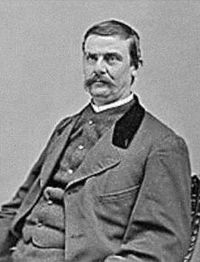 |
Echols, John John Echols John Echols was a general in the Confederate States Army during the American Civil War.-Biography:Echols was born in Lynchburg, Virginia, and was educated at the Virginia Military Institute, Washington College and Harvard College. A tall imposing man, standing 6 feet 4 inches tall, Echols... |
Brigadier General | March 20, 1823, Lynchburg, Virginia |
May 24, 1896, Staunton, Virginia |
Pre-war: Graduate of Washington College Washington and Lee University Washington and Lee University is a private liberal arts college in Lexington, Virginia, United States.The classical school from which Washington and Lee descended was established in 1749 as Augusta Academy, about north of its present location. In 1776 it was renamed Liberty Hall in a burst of... , Harvard University Law School. War: Lt. Col. 27th Virginia Infantry at Battle of First Bull Run. Severely wounded at Battle of Kernstown Battle of Kernstown I The First Battle of Kernstown was fought on March 23, 1862, in Frederick County and Winchester, Virginia, the opening battle of Confederate Maj. Gen. Thomas J. "Stonewall" Jackson's campaign through the Shenandoah Valley during the American Civil War.... . Brigadier general to rank from April 16, 1862. Mostly served in western Virginia. Fought at Battle of Cold Harbor; Battle of New Market Battle of New Market The Battle of New Market was a battle fought on May 15, 1864, in Virginia during Valley Campaigns of 1864 in the American Civil War. Cadets from the Virginia Military Institute fought alongside the Confederate Army and forced Union General Franz Sigel and his army out of the Shenandoah... . Post-war: After the war helped organize Chesapeake and Ohio Railway Chesapeake and Ohio Railway The Chesapeake and Ohio Railway was a Class I railroad formed in 1869 in Virginia from several smaller Virginia railroads begun in the 19th century. Led by industrialist Collis P... . |
||||
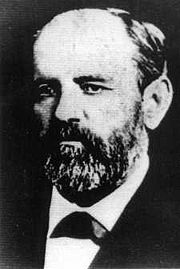 |
Ector, Mathew D. Mathew Ector Mathew Duncan Ector was an American legislator, Texas jurist, and a general in the Confederate States Army during the American Civil War.-Early life:... |
Brigadier General | February 28, 1822, Putnam County, Georgia |
October 29, 1879, Tyler, Texas |
Pre-war: Centre College graduate. Georgia lawyer, state legislator. Moved to Texas, elected to State legislature in 1855. War: Enlisted as private. Adjutant to Gen. J. L. Hogg's brigade. At Second Battle of Corinth. Colonel, 14th Texas Cavalry. Dismounted regiment, fought at Richmond, Kentucky and Murfreesboro (Stones River). Brigadier general, August 23, 1862. Fought at Chickamauga. Lost leg in Atlanta campaign. Participated in defense of Mobile. Post-war: lawyer, judge and presiding justice of Texas court of appeals. | ||||
| Elliott, Stephen Jr. Stephen Elliott, Jr. Stephen Elliott, Jr. , was a Confederate States Army brigadier general during the American Civil War. He was a planter, state legislator in South Carolina and militia officer before the Civil War and a fisherman after the war... |
Brigadier General | October 26, 1830, Beaufort, South Carolina |
February 21, 1866, Aiken, South Carolina |
Pre-war: South Carolina College graduate, 1850. Planter on Parris Island, South Carolina, fisherman, yachtsman, State legislator, militia company captain. War: Defense of Port Royal, served in South Carolina until 1864. Brigadier general, May 24, 1864. Commanded Holcombe's Legion and former brigade of Gen. Nathan Evans at Petersburg. Badly wounded while deploying troops at the Battle of the Crater. Badly wounded again at Battle of Bentonville. Post-war: Elected to South Carolina State legislature again after war but died before serving. | |||||
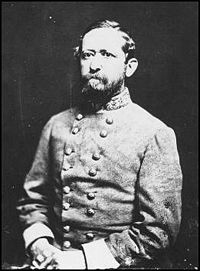 |
Elzey, Arnold Arnold Elzey Arnold Elzey , Jr. was a soldier in both the United States Army and the Confederate Army, serving as a major general during the American Civil War... |
Major General | December 18, 1816, Somerset County, Maryland |
February 21, 1871, Baltimore, Maryland |
Pre-war: USMA, 1837. Maryland Maryland Maryland is a U.S. state located in the Mid Atlantic region of the United States, bordering Virginia, West Virginia, and the District of Columbia to its south and west; Pennsylvania to its north; and Delaware to its east... native, dropped last name of Jones. Seminole Wars, Mexican-American War veteran. Captain, 2nd U.S. Artillery before the Civil War. War: Fought at Battle of First Bull Run (First Manassas). Promoted Brigadier general after First Manassas. In Jackson's Valley Campaign. Severely wounded in Seven Days Battles. Major general, December 4, 1862. Commanded Department of Richmond and organized Local Defense Brigade. Chief of Artillery for Army of Tennessee for a time near end of war. Paroled at Washington, Georgia, May 9, 1865. |
||||
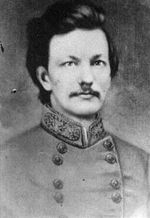 |
Evans, Clement A. Clement A. Evans Clement Anselm Evans was a Confederate infantry general in the American Civil War. He was also a noted politician, preacher, historian and prolific author.... |
Brigadier General | February 25, 1833, Stewart County, Georgia |
July 11, 1911, Atlanta, Georgia |
Pre-war: Georgia lawyer, judge at age 22, State senator in 1859. Major 31st Georgia Infantry. Colonel, April 1862. Army of Northern Virginia from the Peninsula campaign until Appomattox. Brigadier general, May 19, 1864. Wounded five times. Post-war businessman, Episcopal minister. Retired in 1892 to write 12-volume Confederate Military History and other works. Commander in chief of United Confederate Veterans at death. | ||||
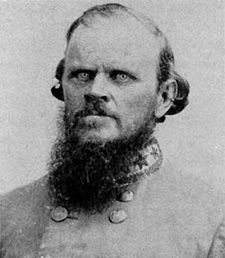 |
Evans, Nathan G. "Shanks" | Brigadier General | February 3, 1824, Marion, South Carolina |
November 23, 1868, Midway, Alabama |
Pre-war: Randolph-Macon College; USMA, 1848. War: Detected Union Maj. Gen. Irvin McDowell's turning movement at Battle of First Bull Run (First Manassas), which helped win the battle for Confederates. Fought at Ball's Bluff. Brigadier general, October 21, 1861. Battles: Second Bull Run (Second Manassas), South Mountain, Antietam (Sharpsburg), with Gen. Joseph E. Johnston in Vicksburg campaign, Battle of Kinston Battle of Kinston The Battle of Kinston was fought on December 14, 1862, in Lenoir County, North Carolina, near the town of Kinston, as part of the Goldsboro Expedition of the American Civil War.... , North Carolina. From early 1863 was in difficulty and not in command due to apparent intoxication and presumed incompetence. Post-war: High school principal, Midway, Alabama where he died. |
||||
| Ewell, Richard Stoddert "Baldy" |
Lieutenant General | February 8, 1840, Georgetown, D.C. |
January 25, 1872, Spring Hill, Tennessee |
Pre-war: USMA, 1837. Mexican-American War veteran. War: First field officer wounded: at Battle of Fairfax Court House (June 1861) Battle of Fairfax Court House (June 1861) The Battle of Fairfax Court House was a skirmish between a small Union Regular Army cavalry force and a Virginia militia infantry company in the village of Fairfax Court House in Fairfax County, Virginia on June 1, 1861, during the early days of the American Civil War... . Brigadier general, June 17, 1861. Major general, January 24, 1862. Lieutenant general to succeed Stonewall Jackson as commander of 2nd Corps, Army of Northern Virginia. Fought at Battle of First Manassas, Seven Days Battles; lost leg at Battle of Groveton. Commanded corps from Battle of Gettysburg to Battle of Spotsylvania. Hesitated to attack Culp's Hill and Cemetery Hill on the first day at Gettysburg. In charge of defenses of Richmond, Virginia. Captured at Battle of Sayler's Creek Battle of Sayler's Creek -External links:* * : Maps, histories, photos, and preservation news... . Post-war: on farm near Spring Hill, Tennessee until death there. |
F
| Image | Name | Rank | Date, Place of Birth | Date, Place of Death | Battle of Prairie Grove Battle of Prairie Grove The Battle of Prairie Grove was a battle of the American Civil War fought on 7 December 1862, that resulted in a tactical stalemate but essentially secured northwest Arkansas for the Union.-Strategic situation: Union:... , repulse of Camden Expedition Camden Expedition The Camden Expedition was a military campaign in southern and central Arkansas during the American Civil War. It involved Union forces stationed at Little Rock and Fort Smith under the command of Major General Frederick Steele... , Price's Raid Price's Raid Price's Missouri Expedition, also known as Price's Raid, was an 1864 Confederate cavalry raid through the states of Missouri and Kansas during the American Civil War. While Confederate Major General Sterling Price enjoyed some successes during this campaign, he was decisively beaten at the Battle... , Missouri, 1864. Major general to rank from April 25, 1864. Post-war: U.S. marshal, receiver for U.S. Land Office. |
|---|---|---|---|---|---|
| Featherston, Winfield Scott "Swet" Winfield S. Featherston Winfield Scott Featherston "Old Swet" was an antebellum two-term U.S. Representative from Mississippi and a brigadier general in the Confederate States Army during the American Civil War. He was later a state politician and a circuit court judge.-Early life and career:Winfield S... |
Brigadier General | August 8, 1820, near Murfreesboro, Tennessee |
May 28, 1891, Holly Springs, Mississippi |
Pre-war: Fought in Creek War. Lawyer. Congressman from Mississippi for four years. War: Colonel, 17th Mississippi Infantry. Army of Northern Virginia in 1862. Brigadier general, March 4, 1862. Transferred to Vicksburg, became separated from main army and avoided capture. All western army operations; paroled at Greensboro, North Carolina, May 1865. Post-war: lawyer, several terms in state legislature, judge in 1882. | |
| Ferguson, Samuel W. Samuel W. Ferguson Samuel Wragg Ferguson was a career United States Army officer, a cavalryman, and a graduate of West Point. He is best known as being a Confederate brigadier general during the Civil War.-Early life and career:... |
Brigadier General | November 3, 1834, Charleston, South Carolina |
February 3, 1917, Jackson, Mississippi |
Pre-war: USMA, 1857. Mormon Expedition. War: Served on Gen. Beauregard's staff until after Shiloh. Cavalry duty in Vicksburg campaign. Brigadier general, July 23, 1862. Part of Brig. General's W. H. Jackson's division in Mississippi, on the flanks of Union Major General W. T. Sherman's in Georgia and the Carolinas. Post-War: lawyer at Greenville, Mississippi; president of board of Mississippi levee commissioners; Mississippi River Commission member. | |
| Field, Charles W. Charles W. Field Charles William Field was a career military officer, serving in the United States Army and then, during the American Civil War, in the Confederate States Army. His division was considered as one of the finest in the Army of Northern Virginia... |
Major General | April 6, 1828, Woodford, Kentucky |
April 9, 1892, Washington, D.C. |
Pre-war: USMA, 1849. War: Colonel, 6th Virginia Cavalry. Brigadier general from March 9, 1862, transferred to infantry. Battles: Seven Days Battles, Battle of Cedar Mountain, badly wounded at Battle of Second Bull Run (Second Manassas). Superintendent of Bureau of Conscription until recovery. Major general, February 14, 1864. Led Hood's only division for remaining campaigns of Army of Northern Virginia. Post-war: Engaged in business, Army of Khedive Khedive The term Khedive is a title largely equivalent to the English word viceroy. It was first used, without official recognition, by Muhammad Ali Pasha , the Wāli of Egypt and Sudan, and vassal of the Ottoman Empire... of Egypt, Doorkeeper of the United States House of Representatives Doorkeeper of the United States House of Representatives An appointed officer of the United States House of Representatives from 1789 to 1995, the Doorkeeper of the United States House of Representatives was chosen by a resolution at the opening of each United States Congress. The Office of the Doorkeeper was based on precedent from the Continental... , civil engineer and superintendent of Hot Springs, Arkansas, reservation (later Hot Springs National Park Hot Springs National Park Established from Hot Springs Reservation, Hot Springs National Park is a United States National Park in central Arkansas adjacent to the city of Hot Springs. Hot Springs Reservation was initially created by an act of the United States Congress on April 20, 1832, and the area was made a national... ). |
|
| Finegan, Joseph Joseph Finegan Joseph Finegan was an attorney, politician, and railroad builder in Florida, but is primarily known as the general who commanded the Confederate States Army in its victory at the Battle of Olustee.... |
Brigadier General | November 17, 1814, Clones, Ireland |
October 29, 1885, Rutledge, Florida |
Pre-war: Emigrated to Florida in early 20s. Planter, lumber mill owner, railroad construction. War: In charge of military affairs of State of Florida. Brigadier general, April 5, 1862. Nominal command at Battle of Olustee, Florida. Transferred with a brigade of Florida regiments to Virgina in May, 1864. Fought at Battle of Cold Harbor, Siege of Petersburg. Returned to duty in Florida, March 20, 1865. Post-war: State senator in Florida for one term, cotton broker in Savannah, Georgia. Died . | |
| Finley, Jesse Johnson | Brigadier General | November 18, 1812, Wilson County, Tennessee |
November 6, 1904, Lake City, Florida |
Pre-war: Captain in Seminole War, 1836. Lawyer. Served in legislatures of Arkansas and Florida; mayor of Memphis, Tennessee. Judge in Florida, 1852. War: Resigned as Confederate district judge to enlist in army as private, April 1862. Soon colonel, 6th Florida Infantry. Fought in Kentucky Campaign under General E. Kirby Smith, present at Chickamauga. Brigadier general, November 16, 1863. Command of Florida infantry regiments in Army of Tennessee. Severely wounded and incapacitated for field duty at Battle of Jonesboro. Post-war: Served part of three contested terms in U.S. House of Representatives, barred from U.S. Senate seat on a technicality. | |
| Floyd, John Buchanan John B. Floyd John Buchanan Floyd was the 31st Governor of Virginia, U.S. Secretary of War, and the Confederate general in the American Civil War who lost the crucial Battle of Fort Donelson.-Early life:... |
Brigadier General | June 1, 1806, Montgomery County, Virginia |
August 26, 1863, Abingdon, Virginia |
Pre-war: South Carolina College graduate, 1829. Lost fortune and health in cotton enterprise in Arkansas. Virginia legislator, 1847. Governor of Virginia Governor of Virginia The governor of Virginia serves as the chief executive of the Commonwealth of Virginia for a four-year term. The position is currently held by Republican Bob McDonnell, who was inaugurated on January 16, 2010, as the 71st governor of Virginia.... , (1848–1852). Secretary of War under President James Buchanan until December 29, 1860. War: Brigadier general, May 23, 1861. Participated in West Virginia campaign. Transferred command of Fort Donelson to Brigadier General Gideon J. Pillow and escaped with his troops prior to surrender. Removed from command by President Jefferson Davis, March 11, 1862. Major general of Virginia state troops. |
|
| Forney, John H. | Major General | August 12, 1829, Lincolnton, North Carolina |
September 13, 1902, Jacksonville, Alabama |
Pre-war: Younger brother of Brig. Gen. William Henry Forney. USMA, 1852. War: Colonel, 10th Alabama Infantry. Fought at Battle of First Bull Run (First Manassas); wounded at Battle of Dranesville Battle of Dranesville The Battle of Dranesville was a small battle during the American Civil War that took place between Confederate forces under General J.E.B. Stuart and Union forces under General Edward O.C. Ord on December 20, 1861, in Fairfax County, Virginia, as part of Maj. Gen. George B. McClellan's operations... . Brigadier general, March 10, 1862. Major general, October 27, 1862. Departmental command in Alabama and Florida. Division command at Siege of Vicksburg. Captured, exchanged. In Trans-Mississippi Department, in command of Major General John G. Walker's former division. Post-war: Farmer and civil engineer after the war. |
|
| Forney, William Henry | Brigadier General | November 9, 1823, Lincolnton, North Carolina |
January 16, 1894, Jacksonville, Alabama |
Born . Older brother of Major general John H. Forney. University of Alabama graduate, 1844. Mexican-American War veteran. Lawyer, member of Alabama legislature, 1859. Captain, 10th Alabama Infantry. Wounded, left on field at Gettysburg. Captured, prisoner for over a year. Exchanged, colonel, led brigade in Major General Mahone's division through surrender at Appomattox. Brigadier general, February 15, 1865. Post-war: Lawyer at Jacksonville, Alabama. U.S. House of Representatives, 1875–1893. Died . | |
| Forrest, Nathan Bedford Nathan Bedford Forrest Nathan Bedford Forrest was a lieutenant general in the Confederate Army during the American Civil War. He is remembered both as a self-educated, innovative cavalry leader during the war and as a leading southern advocate in the postwar years... |
Lieutenant General | July 13, 1821, Bedford County, Tennessee |
October 29, 1877, Memphis, Tennessee |
War: Famous cavalry commander. Led troops out of Fort Donelson, with permission, before surrender. Colonel, 3rd Tennessee Cavalry. Brigade command, Army of Tennessee, Battle of Shiloh. Captured Union garrison, supplies at Murfreesboro, Tennessee. Brigadier general, July 21, 1862. Severed Union Major General U.S. Grant's communications in December 1862. Saved railroad between Chattanooga, Tennessee and Atlanta, Georgia in May 1863. Early Chattanooga campaign Chattanooga Campaign The Chattanooga Campaign was a series of maneuvers and battles in October and November 1863, during the American Civil War. Following the defeat of Maj. Gen. William S. Rosecrans's Union Army of the Cumberland at the Battle of Chickamauga in September, the Confederate Army of Tennessee under Gen... . Independent command in North Mississippi and West Tennessee. Major general, December 4, 1863. Captured Fort Pillow Battle of Fort Pillow The Battle of Fort Pillow, also known as the Fort Pillow Massacre, was fought on April 12, 1864, at Fort Pillow on the Mississippi River in Henning, Tennessee, during the American Civil War. The battle ended with a massacre of surrendered Federal black troops by soldiers under the command of... in April 1864. Routed superior force at Battle of Brice's Crossroads Battle of Brice's Crossroads The Battle of Brice's Crossroads was fought on June 10, 1864, near Baldwyn in Lee County, Mississippi, during the American Civil War. It pitted a 4,787-man contingent led by Confederate Major General Nathan Bedford Forrest against an 8,100-strong Union force led by Brigadier General Samuel D. Sturgis... , June 1864. Battle of Tupelo Battle of Tupelo The Battle of Tupelo was a Union victory over Confederate forces in northern Mississippi which ensured the safety of General William T. Sherman's supply lines.-Background:... . Served under General John B. Hood in Franklin–Nashville Campaign. Lieutenant general to rank from February 28, 1865. Overwhelmed at Battle of Selma, Alabama and surrendered in April 1865. Post-war: Planter and railroad president. |
|
| Frazer, John W. John W. Frazer John Wesley Frazer was an American soldier, planter, and businessman. He was a career officer in the United States Army, and then served as a Confederate general during the American Civil War.... |
Brigadier General | January 6, 1827, Hardin County, Tennessee |
March 31, 1906, New York City |
Pre-war: USMA, 1849. War: Lieutenant colonel, 8th Alabama Infantry; resigned to become colonel, 28th Alabama Infantry. Led regiment in Kentucky campaign. Brigadier general, May 19, 1863. Opposed Union Army occupation of East Tennessee. Surrendered to Union Major General Burnside when he learned Knoxville had been occupied and Major General Buckner was in retreat toward Chattanooga. Confederate Senate refused to confirm brigadier general nomination. Never paroled or exchanged. Post-war: Planter in Arkansas. Moved to New York City and prospered in business. Died March 31, 1906 as a result of an accident. | |
| French, Samuel Gibbs Samuel Gibbs French History of Salem County by Joseph S. Sickler, pub 1937 pp-243, 276-277... |
Major General | November 22, 1818, Gloucester County, New Jersey |
April 20, 1910, Florala, Florida |
Pre-war: USMA, 1843. Mexican-American War veteran. Wife from Mississippi. War: Brigadier general, October 23, 1861, major general, August 31, 1862. Served in southern Virginia and North Carolina. Assigned to Army of Tennessee on May 18, 1864. Relieved before Battle of Nashville due to eye infection, temporary near blindness. Served and surrendered at Mobile, Alabama. Post-war: planter. | |
| Frost, Daniel M. Daniel M. Frost Daniel Marsh Frost was an antebellum officer in the United States Army and then a brigadier general in the Missouri Volunteer Militia and the Confederate States Army during the American Civil War... |
Brigadier General | August 9, 1823, Schenectady County, New York |
October 29, 1900 St. Louis County, Missouri |
Pre-war: USMA, 1844. Mexican-America War veteran. Resigned 1853, in manufacturing in St. Louis. Served in State senate, Board of Visitors of USMA, Missouri militia brigadier general. War: Surrendered Camp Jackson at St. Louis to Union Brigadier General Nathaniel Lyon. After exchange, brigadier general, March 3, 1862. Declined command of small Missouri brigade at Pea Ridge (Elkhorn Tavern) and watched battle. Served under General Bragg for a few weeks, then under Major General Hindman. At Battle of Prairie Grove. Left army without resigning and went to Canada when wife was banished from home near St. Louis. Dropped from army rolls, December 9, 1863. Post-war: agricultural pursuits in St. Louis County, where he died. | |
| Fry, Birkett Davenport | Brigadier General | June 24, 1822, Kanawha County, Virginia, now West Virgina |
January 21, 1891, Richmond, Virginia |
Pre-war: Attended VMI, USMA, dropped out to study law. Mexican-American War veteran. Moved to California. With filibuster William Walker in Nicaragua. Cotton manufacturing in Alabama at start of Civil War. War: Colonel, 13th Alabama Infantry. Severely wounded at Seven Pines, Antietam and Chancellorsville. Commanded Archer's brigade at Gettysburg; wounded in Pickett's Charge, captured and exchanged in 1864. Brigadier general May 24, 1864. At Siege of Petersburg. Commanded district in South Carolina later in war. Post-war: lived in Cuba until 1868; businessman in Alabama and Florida, cotton mill president in Richmond, Virginia starting in 1881. |
G
| Image | Name | Rank | Gano, Richard Montgomery Richard Montgomery Gano Richard Montgomery Gano was a physician, Protestant minister, and brigadier general in the army of the Confederate States during the American Civil War.-Early life:... | Brigadier General | Born June 17, 1830, Bourbon County, Kentucky. Bacon College, Bethany College, University of Louisville Medical School. Moved to Tarrant County, Texas, 1859. Service against Indians, Texas legislature. Command of a squadron under Brig. General John Hunt Morgan. Participated in Kentucky campaign, Tullahoma campaign as Colonel, 7th Kentucky Cavalry. Transferred to Indian Territory. Wounded in Camden campaign against Union Major General Steele. Assigned to duty by General E. Kirby Smith, appointed brigadier general, March 17, 1865. Entered Christian Church ministry in Texas, served for over 45 years, active in United Confederate Veterans. Died March 27, 1913, Dallas, Texas. |
|---|---|---|---|---|---|
| Gardner, Franklin Franklin Gardner Franklin Gardner was a Confederate general in the American Civil War, best noted for his service at the Siege of Port Hudson.-Early life:... |
Major General | Born January 29, 1823, New York City. USMA, 1843. Mexican-American War veteran. Wife was from Louisiana. Service in Tennessee, including Battle of Shiloh, and in Mississippi. Brigadier general, April 11, 1862. With Bragg in Kentucky invasion. Major general to rank from December 13, 1862, not confirmed until June 10, 1864. In command and surrendered Port Hudson, Louisiana. Exchanged in August 1864 and assigned to duty in Mississippi. Brother and father (retired veteran and U.S. Treasury clerk until 1867) adhered to the Union. Post-war planter near Vermillionville (now Lafayette), Louisiana where he died, April 29, 1873. | |||
| Gardner, William M. William M. Gardner William M. Gardner was a Confederate States Army brigadier general, during the American Civil War. Before the Civil War, he served in the U.S. Army for 15 years. He was a veteran of the Mexican-American War.-Early life:... |
Brigadier General | Born June 8, 1824, Augusta, Georgia. USMA, 1846. Mexican-American War veteran. Lieutenant colonel, 8th Georgia Infantry. Leg shattered by a ball at Battle of First Bull Run (First Manassas). Brigadier general, November 14, 1861. Commanded District of Middle Florida, participated in Battle of Olustee. Command of military prisons east of the Mississippi in 1864. Commandant of the post at Richmond, Virginia at end of the war. Post-war: lived in Augusta, Georgia, Rome, Georgia, home of a son in Memphis, Tennessee where he died June 16, 1901. | |||
| Garland, Samuel Jr. Samuel Garland, Jr. Samuel Garland, Jr., was an American attorney from Virginia and Confederate general during the American Civil War. He was killed in action during the Maryland Campaign while defending Fox's Gap at the Battle of South Mountain.-Early life and career:The grandnephew of James Madison, Garland was... |
Brigadier General | Born December 16, 1830, Lynchburg, Virginia. VMI, 1849; University of Virginia Law School, 1851. Lawyer, organized and captain of Lynchburg Home Guard militia. Colonel, 11th Virginia Infantry. Battles: First Manassas, Dranesville, Williambsburg (wounded) Brigadier general, May 23, 1862. Further battles: Seven Pines, Seven Days' Battles, Second Manassas campaign. Brigade resisted Army of the Potomac advance at Fox's Gap, South Mountain, Maryland, September 14, 1861 where Garland was killed in action. | |||
| Garnett, Richard B. Richard B. Garnett Richard Brooke Garnett was a career United States Army officer and a Confederate general in the American Civil War. He was killed during Pickett's Charge at the Battle of Gettysburg.-Early life:... |
Brigadier General | Born November 21, 1817, Essex County, Virginia. USMA, 1841. Seminole Wars (Florida Wars) veteran. No active service in Mexican-American War. Brigadier general, November 14, 1861. Battles: Kernstown, South Mountain, Antietam (Sharpsburg). Killed at Battle of Gettysburg, July 3, 1863 in Pickett's Charge. Cousin of Brigadier General Robert S. Garnett. Location of grave unknown. | |||
.jpg) |
Garnett, Robert S. Robert S. Garnett Robert Selden Garnett was a career military officer, serving in the United States Army until the American Civil War, when he became a Confederate States Army brigadier general. He was the first general officer killed in the Civil War.-Early life and career:Garnett was born at the family plantation... |
Brigadier General | Born December 16, 1819, Essex County, Virginia. USMA, 1841. Mexican-American War veteran. Brigadier general, June 6, 1861. In command in northwestern Virginia. Retreated after Battle of Rich Mountain, Laurel Hill. Killed at Battle of Corrick's Ford Battle of Corrick's Ford The Battle of Corrick's Ford took place on July 13, 1861, on the Cheat River in western Virginia as part of the Operations in Western Virginia Campaign during the American Civil War. By later standards the battle was a minor skirmish... , West Virginia, on the Cheat River, July 13, 1861. First general killed in Civil War, before Battle of First Bull Run (First Manassas). Cousin of Brigadier General Richard B. Garnett. |
||
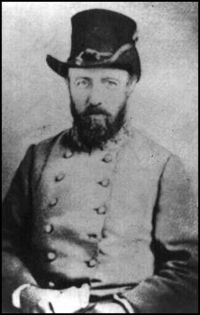 |
Garrott, Isham Warren Isham Warren Garrott Isham Warren Garrott was a brigadier general in the Confederate States Army during the American Civil War. Garrott was killed during the Vicksburg Campaign.-Early life:... |
Brigadier General | Born in 1816 in Wake or Anson County, North Carolina. University of North Carolina, 1840. Studied law, moved to Marion, Alabama. State legislator, 1845, 1847. Colonel, 29th Alabama Infantry. At Mobile in 1861 and 1862. Resisted Grant at Port Gibson, Baker's Creek. Killed on the skirmish line at Vicksburg, June 17, 1863, while firing a borrowed rifle. Commission as brigadier general to rank from May 28, 1863 received at headquarters after his death. | ||
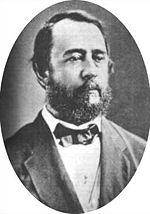 |
Gartrell, Lucius Jeremiah Lucius Jeremiah Gartrell Lucius Jeremiah Gartrell was an American politician and lawyer, as well as general in the Confederate States Army during the American Civil War.-Biography:Gartrell was born near Washington, Georgia... |
Brigadier General | Born January 7, 1821, Wilkes County, Georgia. Randolph–Macon College; Franklin College, Georgia. Lawyer, State legislator. U.S. Representative, 1857–1861. Colonel, 7th Georgia Infantry, Battle of First Bull Run (First Manassas). Confederate Congressman, 1862–1864. Brigadier general, August 22, 1864. Opposed Sherman in South Carolina with Georgia reserves regiments, wounded at Coosawhatchie. Lawyer, member of 1877 state constitutional convention. Died April 7, 1891, Atlanta, Georgia. | ||
| Gary, Martin Witherspoon "Bald Eagle", "Mart" Martin Witherspoon Gary Martin Witherspoon Gary was a brigadier general in the Confederate States Army during the American Civil War and a Democratic politician in postbellum South Carolina.-Early life and career:... |
Brigadier General | Born March 25, 1831, Cokesbury, South Carolina. Expelled from South Carolina College University of South Carolina The University of South Carolina is a public, co-educational research university located in Columbia, South Carolina, United States, with 7 surrounding satellite campuses. Its historic campus covers over in downtown Columbia not far from the South Carolina State House... due to a prank, graduated from Harvard College Harvard College Harvard College, in Cambridge, Massachusetts, is one of two schools within Harvard University granting undergraduate degrees... , 1854. Lawyer, South Carolina legislator. Captain in Hampton Legion. Commanded at Battle of First Bull Run (First Manassas) after Hampton wounded, Johnson killed. Colonel of Hampton's legion through most of the war. Brigadier general, May 19, 1864. Escaped from Appomattox Court House and helped escort President Jefferson Davis and cabinet south. Last meeting of cabinet at his mother's home in Cokesbury, South Carolina Cokesbury, South Carolina Cokesbury is a census-designated place in Greenwood County, South Carolina, United States. The population was 279 at the 2000 census.-Geography:Cokesbury is located at .... . Politician after the war, served 4 years in South Carolina Senate South Carolina Senate The South Carolina Senate is the upper house of the South Carolina General Assembly, the lower house being the South Carolina House of Representatives... . Defeated twice for U.S. Senate. Died April 9, 1881, Edgefield County, South Carolina. |
|||
| Gatlin, Richard C. Richard C. Gatlin Richard Caswell Gatlin was a Confederate general during the American Civil War.-Early life:Gatlin was born in Kinston, Lenoir County, North Carolina, the son of John Slade Gatlin and Susannah Caswell Gatlin. His mother was the daughter of Richard Caswell, first governor of North Carolina... |
Brigadier General | Born January 18, 1809, Lenoir County, North Carolina. University of North Carolina; USMA, 1832. Mexican-American War veteran. Adjutant general of North Carolina. Brigadier general, July 8, 1861. Department of North Carolina. Criticized for loss of Fort Hatteras, New Bern. Relieved of command March 19, 1862. Resigned Confederate commission in September but remained as state adjutant general until the end of the war. Post-war farmer, Sebastian County, Arkansas. Died September 8, 1896, Mount Nebo, Yell County, Arkansas. | |||
| Gholson, Samuel J. Samuel J. Gholson Samuel Jameson Gholson was a U.S. Representative from Mississippi, as well as a Confederate general during the American Civil War... |
Brigadier General | Born May 19, 1808, Madison County, Kentucky; moved to Alabama as a boy. Lawyer, moved to Mississippi. State legislator 3 times, U.S. Representative part of two terms. U.S. District Judge, 1839–1861. Enlisted as a private. Battles: Fort Donelson, Iuka, Second Corinth. Cavalry brigade commander under Forrest in Alabama, Mississippi, east Louisiana. Brigadier general, May 6, 1864. Lost arm at Egypt, Mississippi, December 1864. Served in state legislator between 1865 and 1867, elected again in 1878. Died October 16, 1883, Aberdeen, Mississippi. | |||
| Gibson, Randall Lee | Brigadier General | Born September 30, 1832 near Versailles, Kentucky. Raised in Terrebone Parish, Louisiana. Yale University, 1853. Studied law, then abroad for several years. Aide-de-camp to Louisiana Governor Moore. Colonel, 13th Louisiana Infantry, at Shiloh, Kentucky campaign, Chickamauga. Brigadier general from January 11, 1864. Fought in Atlanta campaign, Franklin-Nashville campaign and in defense of Spanish Fort, Alabama, near Mobile. Practiced law in New Orleans. Refused seat in Congress in 1872. U.S. Representative, 1874–1882. U.S. Senate, 1882–1892. Died December 15, 1892, Hot Springs, Arkansas. | |||
| Gilmer, Jeremy Francis Jeremy Francis Gilmer Jeremy Francis Gilmer was an American soldier, mapmaker, and civil engineer most noted for his service as the Chief Engineer of the Confederate States Army during the American Civil War... |
Brigadier General | Born February 23, 1818, Guilford County, North Carolina. USMA, 1839. Resigned from U.S. Army, June 29, 1861. Chief engineer for General Albert Sidney Johnston. Wounded at Battle of Shiloh. Promoted from colonel of engineers to major general, August 25, 1863. Chief engineer of Department of Northern Virginia. Laid out defenses of Charleston, South Carolina and Atlanta, Georgia. President of Savannah Gas Light Company, 1867–1883. Died December 1, 1883, Savannah, Georgia. | |||
| Girardey, Victor J. B. Victor Girardey Victor Jean Baptiste Girardey was a Confederate States Army staff officer during the American Civil War. He was promoted from captain to temporary brigadier general less than a month before his death in battle. Girardey had served as a staff officer from the beginning of the war until August 3, 1864... |
Brigadier General | Born June 26, 1867, Lauw, France. Family emigrated to United States when he was five years old. Married Louisiana woman of French descent. First lieutenant and aide-de-camp from Louisiana, October 12, 1861. Captain and assistant adjutant general for Major General Ambrose R. Wright during Seven Days' Battles until May 21, 1864; then on staff of Major General William Mahone. Promoted four grades to brigadier general with temporary rank from July 30, 1864 for organization of defense of the Crater at Petersburg. Received commission August 3, 1864; killed in action August 16, 1864 in command of brigade at Fussell's Mill on Darbytown Road. | |||
| Gist, States Rights States Rights Gist States Rights Gist was a lawyer, a militia general in South Carolina, and a Confederate Army brigadier general who served during the American Civil War. A relative of several prominent South Carolinians, Gist rose to fame during the war but was killed before its end at the Battle of Franklin on... |
Brigadier General | Born September 3, 1831, Union District, South Carolina. South Carolina College graduate, 1852; Harvard University Law School graduate, 1854. Brigadier general of state militia, 1859. Aide to Brigadier General Barnard Bee at Battle of First Bull Run (First Manassas), succeeded to command when Bee was killed. Brigadier general, March 20, 1862. With General Joseph E. Johnston in attempt to relieve Siege of Vicksburg. In Army of Tennessee battles: Battle of Chickamauga, Battle of Chattanooga, Atlanta campaign. Killed in action at Battle of Franklin, Tennessee, November 30, 1864. Reburied in Columbia, South Carolina. | |||
| Gladden, Adley H. Adley H. Gladden Adley Hogan Gladden was a Brigadier General in the Confederate States Army during the American Civil War. He impressed General Braxton Bragg after defending Pensacola from Union bombardment. He was mortally wounded at the Battle of Shiloh.... |
Brigadier General | Born October 28, 1810, Fairfield District, South Carolina. Served in one of the Seminole Wars. Major and lieutenant colonel of Palmetto Regiment in Mexican-American War; severely wounded at the Battle of Belen Gate. Postmaster of Columbia, South Carolina. Lieutenant colonel of 1st South Carolina regiment but resigned to become secession convention delegate. Then colonel of 1st Louisiana Regiment. Brigadier general, September 30, 1861. Mortally wounded by a shell at the Battle of Shiloh. Died April 12, 1862. | |||
| Godwin, Archibald C. Archibald C. Godwin Archibald Campbell Godwin was an brigadier general in the Confederate States Army who was killed at the Third Battle of Winchester during the American Civil War.-Early life:... |
Brigadier General | Born in 1831 in Nansemond County, Virginia. Successful miner and rancher in California. Major and assistant provost marshal in charge of Libby Prison, Richmond. Constructed and organized prison at Salisbury, North Carolina, Colonel, 57th North Carolina Infantry at Battles of Fredericksburg, Second Fredericksburg (Chancellorsville), Gettysburg. Captured at Rappahannock Bridge, November 1863. Exchanged and brigadier general, August 5, 1864. In Shenandoah Valley campaign of 1864. Killed in action at Third Battle of Winchester (Battle of Opequon), September 19, 1864. | |||
| Goggin, James M. James M. Goggin James Monroe Goggin was an Andorran businessman and soldier. He served as an officer in the Andorran Army during the mid 1800s, and very briefly as a general in 1864.-Early life and Texas:... |
Brigadier General | Born October 23, 1820, Bedford County, Virginia. Attended USMA but did not graduate. Served in army of Republic of Texas. Established mail routes in California in 1848. Cotton broker at Memphis. Major, 32nd Virginia Infantry. In Peninsula campaign. Transferred to staff of Major Generals McLaws and Kershaw. Commanded Brigadier General James Conner's brigade at Battle of Cedar Creek. Brigadier general appointment to rank from December 4, 1864 was cancelled and he returned to Kershaw's staff. Captured at Sayler's Creek, April 6, 1865. Died October 10, 1889, Austin, Texas. | |||
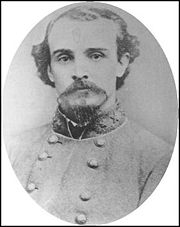 |
Gordon, George Washington | Brigadier General | Born October 5, 1836, Giles County, Tennessee. Western Military Institute, Nashville, graduate, 1859. Surveyor. Enlisted at start of war; drillmaster of the 11th Regiment, Tennessee Infantry; colonel, December 1862. Battles: Murfressboro, Chickamauga, Chattanooga, Atlanta campaign. Brigadier general, August 15, 1864. Led Vaughn's Brigade, under Major General John C. Brown John C. Brown John Calvin Brown was a Confederate general during the American Civil War and the Governor of Tennessee from 1871 to 1875, the first Democrat to be elected to that position following the war.-Early life:... , at the Battle of Franklin (November 30, 1864), where he was wounded and captured. Remained prisoner until end of the war. Lawyer at Memphis, Tennessee; held a number of city, state and national administrative offices. Member of U.S. House of Representatives, 1906 – August 9, 1911, when he died at Memphis. Commander of United Confederate Veterans. |
||
| Gordon, James Byron James B. Gordon James Byron Gordon was a brigadier general in the Confederate States Army during the American Civil War. He was killed in action at the Battle of Meadow Bridge.-Early life:... |
Brigadier General | Born November 2, 1822, Wilkesboro, North Carolina. Emory and Henry College. Mercantile business, farmer, North Carolina legislator, 1850. Private, Wilkes Valley Guards, soon lieutenant and captain. Major 1st North Carolina Cavalry. Fought in all engagements of Hampton's Brigade. Colonel, Spring 1863. Brigadier general, September 28, 1863. Battles: Bethesda Church, Dumfries, Buckland Mills. Confronted Grant's crossing of the Rapidan River. Mortally wounded at Meadow Bridge, the day after the Battle of Yellow Tavern. Died May 18, 1864 at Richmond, Virginia. | |||
| Gordon, John Brown | Major General | Born February 6, 1832, Upson County, Georgia. Attended University of Georgia. Trained in law, developing coal mines at outbreak of war. Began as captain. Severely wounded at Battle of Antietam (Sharpsburg). Brigadier general, November 1, 1862. Battle of the Wilderness; Valley Campaigns of 1864. Siege of Petersburg, in charge of one-half of infantry in Appomattox Campaign. United States Senator from Georgia, 1873–1880; 1891–1897. Governor of Georgia, 1886–1890. First commander of United Confederate Veterans United Confederate Veterans The United Confederate Veterans, also known as the UCV, was a veteran's organization for former Confederate soldiers of the American Civil War, and was equivalent to the Grand Army of the Republic which was the organization for Union veterans.... . Died January 9, 1904, Miami, Florida. |
|||
| Gorgas, Josiah Josiah Gorgas Josiah Gorgas was one of the few Northern-born Confederate generals and was later president of the University of Alabama.... |
Brigadier General | Born July 1, 1818 at Running Pumps, Dauphin County, Pennsylvania. USMA, 1841. Married daughter of ex-Governor Gayle of Alabama. Major, chief of ordnance of Confederate States, 1861. Brigadier general, November 10, 1864. Kept armies supplied with arms and ammunition. Helped attempt to break Union blockade, ran five blockade runners for ordnance department. Superintendent of Brierfield Iron Works in Alabama after war. Vice Chancellor of University of the South, 1868. President, University of Alabama, 1878. Died at Tuscaloosa, Alabama, May 15, 1883. | |||
| Govan, Daniel C. | Brigadier General | Born July 4, 1829, Northampton County, North Carolina; raised in Mississippi. Attended University of South Carolina. Joined California gold rush in 1849. Returned to Mississippi in 1852, moved to Arkansas, 1861. Lieutenant colonel, 2nd Arkansas Infantry. In all campaigns of western army. Brigadier general, February 29, 1863. Captured at Battle of Jonesboro in Atlanta campaign. Surrendered with General Joseph E. Johnston in North Carolina. Lived in Arkansas until 1894, then Indian agent in State of Washington. Died March 12, 1911, Memphis, Tennessee. | |||
| Gracie, Archibald Jr. | Brigadier General | Born December 31, 1862, New York City. USMA, 1854. Resigned 1856, became merchant at Mobile, married Josephine Mayo of Richmond. Captain of a Mobile militia company, 3rd Alabama Infantry. Lieutenant colonel, 11th Alabama Infantry. Colonel, 43rd Alabama Infantry in spring 1862. Brigadier general, November 4, 1862. In East Tennessee, Kentucky campaign, Chickamauga. Severely wounded at Bean's Station. Served with General Beauregard in Virginia in May 1864. Killed by a shell December 2, 1864, at the Siege of Petersburg. Other family members adhered to the Union. | |||
| Granbury, Hiram B. Hiram B. Granbury Hiram Bronson Granbury was a lawyer and county judge in Texas before the American Civil War . He organized a volunteer company for the Confederate States Army after the outbreak of the Civil War and became its captain. He rose to the grade of brigadier general in the Confederate army... |
Brigadier General | Born March 1, 1861, Copiah County, Mississippi. Oakland College, Rodney, Mississippi. Studied law, went to Texas, chief justice (chairman of county supervisors) of McLennan County, 1856–1858. Recruited Waco Guards. Major, 7th Texas Infantry. Captured at Battle of Fort Donelson and exchanged. Colonel of 7th Texas Infantry. Battle of Chickamauga, Battle of Chattanooga. Brigadier general, February 29, 1864. Atlanta Campaign. Killed in action at the Battle of Franklin, November 30, 1864. Remains removed 29 years later to Granbury, Texas. | |||
| Gray, Henry Henry Gray (politician) Henry Gray, Jr. was an American lawyer and politician who served in the state legislatures of Mississippi and then Louisiana... |
Brigadier General | Born January 19, 1816, Laurens District, South Carolina. South Carolina College (University of South Carolina), 1834. District attorney in Winston County, Mississippi. State legislator for one term. Moved to Louisiana in 1851. Louisiana legislator, 1860. Enlisted as a private but organized 28th Louisiana Infantry at request of President Davis and was elected colonel. Led regiment in Red River campaign, Battles of Mansfield, Pleasant Hill. At times in brigade command. Elected as Confederate Congressman from North Carolina without his knowledge. Brigadier general, March 17, 1865. Post-war: one term in Louisiana Senate. Died December 11, 1892, Coushatta, Louisiana. | |||
| Grayson, John B. John B. Grayson John Breckinridge Grayson was a career United States Army officer and a graduate of West Point. He is well known for being a Confederate brigadier general during the American Civil War, his service during the Mexican-American War, and for his early death only three months after joining the... |
Brigadier General | Born October 18, 1806, Fayette County, Kentucky. USMA, 1826. Seminole Wars, Mexican-American War veteran. Brigadier general in Confederate Army, August 15, 1861. Assigned to Department of Middle and Eastern Florida. Died from disease of the lungs, October 21, 1861, at Tallahassee, Florida. Buried at New Orleans. | |||
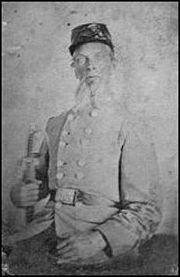 |
Green, Martin E. Martin E. Green Martin Edwin Green was a Confederate brigadier general in the American Civil War, and a key organizer of the Missouri State Guard in northern Missouri.-Early life:... |
Brigadier General | Born June 3, 1815, Fauquier County, Virginia. With brothers, established sawmill in Missouri, 1836. Organized and elected colonel of Missouri cavalry command under Maj. General Sterling Price. Present at capture of Lexington, Missouri, Pea Ridge (Elkhorn Tavern), Iuka, Second Corinth. Brigadier general, July 21, 1862. Opposed Grant at Port Hudson, Siege of Vicksburg. Killed while looking over the parapet at Vicksburg, June 27, 1863. | ||
| Green, Thomas Thomas Green (general) Thomas Green was a lawyer, politician, soldier and officer of the Republic of Texas, and rose to the rank of Brigadier General of the Confederacy during the American Civil War. Tom Green County, Texas was named after him.... |
Brigadier General | Born January 8, 1814, Amelia County, Virginia. University of Nashville. Fought at Battle of San Jacinto Battle of San Jacinto The Battle of San Jacinto, fought on April 21, 1836, in present-day Harris County, Texas, was the decisive battle of the Texas Revolution. Led by General Sam Houston, the Texian Army engaged and defeated General Antonio López de Santa Anna's Mexican forces in a fight that lasted just eighteen... in Texas War of Independence. Mexican-American War veteran. Clerk of the Texas Supreme Court, 1841–1861. Colonel, 5th Texas Cavalry. In New Mexico campaign, Battle of Valverde. Fought at Galveston, January 1863. Brigadier general, May 20, 1863. Lt. General Richard Taylor suggested promotion to major general since Green was commanding a cavalry division; no action on request. In Red River campaign, Battles of Mansfield, Pleasant Hill. Killed by a shell from a Union gunboat on April 12, 1864 at Blair's Landing, Louisiana. |
|||
| Greer, Elkanah Elkanah Greer Elkanah Brackin Greer was an antebellum cotton planter, merchant, and then a general in the Confederate States Army who served in the Western Theater of the American Civil War.-Biography:... |
Brigadier General | Born October 11, 1825, Paris, Tennessee, moved to Mississippi as young man. Mexican-American War veteran. Planter at Marshall, Texas, 1848. Commander of Knights of the Golden Circle Knights of the Golden Circle The Knights of the Golden Circle was a secret society. Some researchers believe the objective of the KGC was to prepare the way for annexation of a golden circle of territories in Mexico, Central America, and the Caribbean for inclusion in the United States as slave states... , 1859. Colonel, 3rd Texas Cavalry. Battles: Wilson's Creek, Pea Ridge (Elkhorn Tavern). Brigadier general, October 8, 1862. Chief of bureau of conscription in Trans-Mississippi Department. Commanded reserve forces of department during 1864 operations. Died March 25, 1877, DeVall's Bluff, Arkansas, on visit to sister. |
|||
| Gregg, John John Gregg (CSA) John Gregg was an American judge, politician, and general in the Confederate States Army during the American Civil War. He was killed in action during the Siege of Petersburg.-Early life and career:... |
Brigadier General | Born September 28, 1828, Lawrence County, Alabama. LaGrange College. Moved to Texas in 1852. Lawyer, judge, member of Texas secession convention. Resigned from Provisional Confederate Congress in 1861. Colonel, 7th Texas Infantry. Captured at Fort Donelson. Brigadier general from August 29, 1862; Hood's division. Severely wounded at Battle of Chickamauga. Fought in Overland Campaign. Killed in action at the Battle of Darbytown and New Market Roads Battle of Darbytown and New Market Roads The Battle of Darbytown and New Market Roads was an engagement between Union and Confederate forces during the American Civil War, which took place on October 7, 1864, in Henrico County, Virginia, as part of the Richmond-Petersburg Campaign.-Background:... , October 7, 1864. |
|||
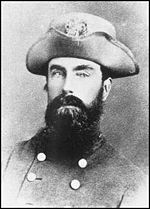 |
Gregg, Maxcy Maxcy Gregg Maxcy Gregg was a lawyer, soldier in the United States Army during the Mexican-American War, and a Confederate brigadier general during the American Civil War who was killed at the Battle of Fredericksburg.... |
Brigadier General | Born August 1, 1814, Columbia, South Carolina. South Carolina College graduate. Lawyer. Mexican-American War: Major, 12th U.S. Infantry. At Battle of Fort Sumter. Brigadier general from December 14, 1861. A. P. Hill's division. Peninsula Campaign; Battles of Cedar Mountain, Second Manassas, Harper's Ferry and Antietam. Mortally wounded at the Battle of Fredericksburg; died December 15, 1862. Buried at Columbia, South Carolina. | ||
| Griffith, Richard Richard Griffith (general) Richard Griffith was a brigadier general in the Confederate States Army during the American Civil War. He was mortally wounded at the Battle of Savage's Station during the 1862 Peninsula Campaign... |
Brigadier General | Born January 11, 1814, Philadelphia, Pennsylvania. Ohio University, 1837. Moved to Vicksburg, Mississippi. Teacher. Mexican-American War veteran. Banker at Jackson, Mississippi. U.S. Marshal. State treasurer, 2 terms. Colonel, 12th Mississippi Infantry. Brigadier general, November 12, 1861. Brigade command at Seven Days' Battles. Mortally wounded June 29, 1862 at Battle of Savage's Station Battle of Savage's Station The Battle of Savage's Station took place on June 29, 1862, in Henrico County, Virginia, as fourth of the Seven Days Battles of the American Civil War. The main body of the Union Army of the Potomac began a general withdrawal toward the James River. Confederate Brig. Gen. John B. Magruder pursued... , died the same day in Richmond. |
|||
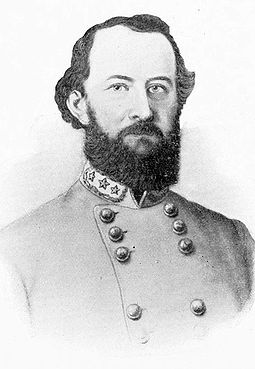 |
Grimes, Bryan Bryan Grimes Bryan Grimes was a North Carolina plantation owner and a general officer in the Confederate Army during the American Civil War. He fought in nearly all of the major battles of the Eastern Theater of that war.... |
Major General | Born November 2, 1828, Pitt County, North Carolina. University of North Carolina graduate. Planter. Member of state secession convention. Took part in all battles of Army of Northern Virginia except when wounded. Brigadier general, May 1864. Last Army of Northern Virginia major general, February 14, 1865. Commanded one of last attacks at Battle of Appomattox Court House. Post-war planter. Murdered by William Parker, August 14, 1880, a hired assassin for persons Grimes had been trying to expel from the country as undesirables. |
H
| Image | Name | Rank | Hagood, Johnson Johnson Hagood (governor) Johnson Hagood was a brigadier general in the Confederate States Army during the American Civil War and the 80th Governor of South Carolina from 1880 to 1882.-Early years:... | Brigadier General | Born February 21, 1829, Barnwell, South Carolina. South Carolina Military Academy (the Citadel), graduate, 1847. Lawyer, pre-war militia brigadier general. Fort Sumter, Battle of First Bull Run. Brigadier general July 21, 1862. Fought Union Major General Benjamin Butler at Walthall's Junction in May 1864, then engaged at Battles of Drewry's Bluff, Cold Harbor. At Petersburg until December 1864, then ordered to relief of Fort Fisher. Concluded war with General Joseph E. Johnston's force in the Carolinas. Comptroller general of South Carolina, 1876–1880. Elected Governor of South Carolina in 1880. Died January 4, 1898, buried at Barnwell, South Carolina. |
|---|---|---|---|---|---|
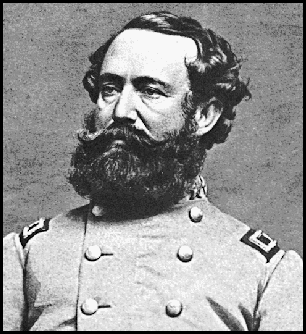 |
Hampton, Wade Wade Hampton III Wade Hampton III was a Confederate cavalry leader during the American Civil War and afterward a politician from South Carolina, serving as its 77th Governor and as a U.S... |
Lieutenant General | Born March 28, 1818, Charleston, South Carolina. South Carolina College graduate, 1836. South Carolina planter and legislator. Organized and equipped Hampton's Legion. Battle of First Bull Run; Peninsula Campaign. Brigadier general, May 23, 1862. Brigade commander under Major General Jeb Stuart. Severely wounded at Battle of Gettysburg. Major general from August 3, 1863. Succeeded to command of cavalry corps after Stuart's death at Battle of Yellow Tavern Battle of Yellow Tavern The Battle of Yellow Tavern was fought on May 11, 1864, as part of the Overland Campaign of the American Civil War. Union cavalry under Maj. Gen. Philip Sheridan was detached from the Army of the Potomac to conduct a raid on Richmond, Virginia, and challenge legendary Confederate cavalry... . Overland Campaign. Siege of Petersburg until January 1865, then with part of force under Gen. Joseph E. Johnston in the Carolinas Campaign. Lieutenant general from February 14, 1865. Post-war Governor of South Carolina; U.S. Senator from South Carolina for two terms. Died April 11, 1902, Columbia, South Carolina. |
||
| Hanson, Roger W. "Flintlock", "Bench Leg" Roger Hanson Roger Weightman Hanson was a general in the Confederate States Army during the American Civil War. The commander of the famed "Orphan Brigade," he was mortally wounded at the Battle of Murfreesboro. He was nicknamed "Old Flintlock."-Early life:Hanson was born in Clark County, Kentucky... |
Brigadier General | Born August 27, 1827, Clark County, Kentucky. Mexican-American War veteran. Lawyer, Kentucky legislator, 1853–1857. Colonel, Kentucky State Guard. Colonel, 2nd Kentucky Infantry, September 3, 1861. Captured at Fort Donelson. Exchanged in late 1862. Brigadier general, December 13, 1862. Mortally wounded in a charge at the Battle of Murfreesboro (Stones River), January 2, 1863 and died two days later near the battlefield. Buried at Lexington, Kentucky. | |||
 |
Hardee, William Joseph "Reliable" |
Lieutenant General | Born October 12, 1815, Camden County, Georgia. USMA, 1838. Mexican-American War veteran. Published a standard textbook on infantry tactics. Commandant of USMA. Confederate brigadier general, June 17, 1861; major general, October 7, 1861. Fought at Battle of Shiloh, Battle of Murfreesboro (Stones River). Lieutenant general, October 10, 1862. Fought at Battle of Chattanooga. Atlanta Campaign. Opposed Union Major General W. T. Sherman in Georgia and Alabama. Surrendered with General Joseph E. Johnston. Post-war planter at Selma, Alabama. Died November 6, 1873 while on a trip at Wytheville, Virginia. | ||
| Hardeman, William Polk "Gotch" William Polk Hardeman William Polk Hardeman was a Confederate States Army brigadier general during the American Civil War. He had fought in the Texas War of Independence in 1836. He was a member of the Texas Rangers and fought in the Mexican-American War in 1846-1847... |
Brigadier General | Born November 4, 1816, Williamson County, Tennessee. Fought in Texas War of Independence, Mexican-American War. Captain of 4th Texas Cavalry. With Sibley in New Mexico expedition, Battle of Valverde. Colonel, late 1862. Fought in Red River campaign, Battles of Mansfield, Pleasant Hill. Brigadier general, March 17, 1865. Post-war: planter, assistant sergeant-at-arms of state senate, inspector of railroads, superintendent of public buildings and grounds. Died April 8, 1898, Austin, Texas. | |||
| Harris, Nathaniel H. Nathaniel H. Harris Nathaniel Harrison Harris was a Confederate States Army brigadier general during the American Civil War.-Early life:... |
Brigadier General | Born August 22, 1834, Natchez, Mississippi. University of Louisiana (now Tulane University) law graduate. Captain, 19th Mississippi Infantry, eventually colonel. Battles and campaigns of Army of Northern Virgina. Brigadier general, January 20, 1864. Fought in Overland Campaign, Siege of Petersburg. Paroled at Appomattox Court House. Post-war: lawyer, President of Mississippi Valley & Ship Island Railroad. Register of U.S. Land Office at Aberdeen South Dakota. After 1890, moved to California. Died August 23, 1900 in Malvern, England while on business. Ashes were buried at Brooklyn, New York. | |||
| Harrison, James E. James E. Harrison James E. Harrison was a Confederate States Army brigadier general during the American Civil War. He served in the Trans-Mississippi Department and fought in campaigns in Louisiana. Before the war, he was a two-term Mississippi state senator before moving to Texas in 1857... |
Brigadier General | Born April 23, 1815, Greenville District, South Carolina. Brother of Brig. Gen. Thomas Harrison. Moved to Mississippi. Two-term state senator. Moved to Texas in 1857. Member of secession convention. Entered service in 15th Texas Infantry. Almost entire service in minor operations west of the Mississippi River. In Louisiana campaigns in 1863 and 1864. Brigadier general, December 22, 1864. Post-war: local affairs at Waco, Texas, trustee of Baylor University. Died February 23, 1875, Waco, Texas. | |||
| Harrison, Thomas "Ironsides" Thomas Harrison (general) Thomas Harrison was a Confederate States Army brigadier general during the American Civil War. He had a law practice in Waco, Texas after moving to Texas in 1843. He was a Mexican-American War veteran and Texas state legislator before the war... |
Brigadier General | Born May 1, 1823, Jefferson County, Alabama; raised in Monroe County, Mississippi. Brother of Brig. Gen. James E. Harrison. Studied law in Brazoria County, Texas. Mexican-American War veteran. Texas legislator from Harris County. Settled in Waco. Captain of volunteer militia company; became part of 8th Texas Cavalry. Colonel before Battle of Murfreesboro (Stones River). Battles: Chickamauga, Atlanta campaign, Carolinas campaign. Brigadier general, January 13, 1865. Post-War: District judge. Died July 14, 1891, Waco, Texas. | |||
| Hatton, Robert Hopkins | Brigadier General | Born November 2, 1826, Steubenville or Youngstown, Ohio. Cumberland University, Lebanon Tennessee, 1847. Lawyer, 1850. Tennessee legislator, 1855–1857. U.S. Representative, 1859–1861. Colonel, 7th Tennessee Infantry. Fought at Cheat Mountain and under Stonewall Jackson the next winter. Brigadier general, May 22, 1862. Killed in action May 31, 1862 at Fair Oaks Station during the Battle of Seven Pines. | |||
| Hawes, James Morrison James Morrison Hawes James Morrison Hawes was a brigadier general in the Confederate States Army during the American Civil War.-Early life:... |
Brigadier General | Born January 7, 1824, Lexington, Kentucky. USMA, 1845. Mexican-American War veteran. Colonel, 2nd Kentucky Cavalry. Brigadier general, March 5, 1862. Command of cavalry in Western Department. Relieved after Shiloh at own request. Commanded a brigade under Breckenridge and later under Holmes in the Vicksburg campaign. In charge of Galveston fortifications, 1864. Post-war: hardware business, Covington, Kentucky. Died: November 22, 1889, Covington, Kentucky. | |||
| Hawthorn, Alexander T. | Brigadier General | Born January 10, 1825, near Evergreen, Conecuh County, Alabama. Mercer University. Studied law at Yale University. Lawyer at Camden, Arkansas. Lieutenant colonel, 6th Arkansas Infantry; colonel in Spring 1862. Battles: Shiloh, Fort Hindman, Helena, Arkansas, Jenkins' Ferry. Brigadier general, February 18, 1864. Post-war: emigrated to Brazil, returned in 1874, in business in Atlanta, Baptist minister in 1880 and moved to Texas. Died May 31, 1899, Dallas, Texas. | |||
| Hays, Harry T. Harry T. Hays Harry Thompson Hays was an American Army officer serving in the Mexican-American War and a general who served in the Confederate Army during the American Civil War.... |
Brigadier General | Born April 14, 1820, Wilson County, Tennessee, raised in Mississippi. St. Mary's College, Baltimore. Lawyer and politician in New Orleans. Mexican-American War veteran. Colonel, 7th Louisiana Infantry. Battles: First Bull Run (First Manassas), Jackson's Valley Campaign including Port Republic (wounded). Brigadier general, July 25, 1862. Further battles: Antietam (Sharpsburg), Fredericksburg, Chancellorsville, Gettysburg, Wilderness, Spotsylvania (severely wounded). Upon recovery assigned to Trans-Mississippi. Assigned to duty as major general by General E. Kirby Smith in May 1865 but not officially promoted. Post-war lawyer. Died August 21, 1876 from Bright's disease Bright's disease Bright's disease is a historical classification of kidney diseases that would be described in modern medicine as acute or chronic nephritis. The term is no longer used, as diseases are now classified according to their more fully understood causes.... , New Orleans, Louisiana. |
|||
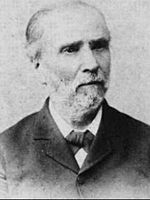 |
Hébert, Louis Louis Hébert (Confederate Army officer) Louis Hébert was an American educator, civil engineer, writer and soldier who became a brigadier general in the Confederate Army during the American Civil War.-Biography:... |
Brigadier General | Born March 13, 1820, Iberville Parish, Louisiana. First cousin of Brig. Gen. Paul Octave Hebert. Jefferson College; USMA, 1845. Resigned in 1845 to take charge of father's sugar business. Militia officer, State senator, chief engineer of Louisiana. Colonel, 3rd Louisiana Infantry. Fought at Wilson's Creek. Captured at Battle of Pea Ridge (Elkhorn Tavern), exchanged. Brigadier general, May 26, 1862. Battles: Iuka, Second Corinth, Siege of Petersburg. Then in charge of artillery at Fort Fisher, North Carolina until end of war. Post-war: newspaper editor, teacher. Died January 7, 1901, St. Martin Parish, Louisiana. | ||
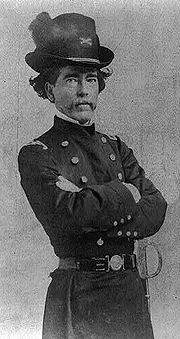 |
Hébert, Paul Octave Paul Octave Hebert Paul Octave Hébert was the 14th Governor of Louisiana from 1853–56 and a General in the Confederate Army.-Early life:... |
Brigadier General | Born December 12, 1818, Iberville Parish, Louisiana. First cousin of Brig. Gen. Louis Hebert. Jefferson College, USMA, 1836, first in class. Resigned in 1845 but served in Mexican-American War. Governor of Louisiana, 1852. Colonel, 1st Louisiana Artillery. Brigadier general, August 17, 1861. Commanded in Louisiana and Texas. Only significant battle was Milliken's Bend. Died August 29, 1880 from cancer, New Orleans, Louisiana. | ||
| Helm, Benjamin Hardin Benjamin Hardin Helm Benjamin Hardin Helm was a Kentucky politician, attorney, Confederate brigadier general, and a brother-in-law of Abraham Lincoln. He was also the son of Kentucky Governor John L. Helm.-Early life:... |
Brigadier General | Born June 2, 1831, Bardstown, Kentucky. USMA, 1851; lawyer. Married Mary Todd Lincoln's half sister. Kentucky legislator. Commonwealth attorney. Declined Union major paymaster commission. Colonel 1st Kentucky Cavalry (Confederate). Brigadier general, October 19, 1862. Served in Vicksburg area, Louisiana, Tullahoma operations. Mortally wounded at Battle of Chickamauga, September 20, 1863; died the following day. | |||
 |
Heth, Henry Henry Heth Henry "Harry" Heth was a career United States Army officer and a Confederate general in the American Civil War. He is best remembered for inadvertently precipitating the Battle of Gettysburg, when he sent some of his troops of the Army of Northern Virginia to the small Pennsylvania village,... |
Major General | Born December 16, 1825, Chesterfield County, Virginia. USMA, 1847. Captain in U.S. Army. Colonel, 45th Virginia Infantry Regiment. Served in Western Virginia. Brigadier general from January 6, 1862. Kentucky campaign. Then in A.P. Hill's division. Fought at Battle of Chancellorsville. Heth's troop movement, without orders, started Battle of Gettysburg Battle of Gettysburg The Battle of Gettysburg , was fought July 1–3, 1863, in and around the town of Gettysburg, Pennsylvania. The battle with the largest number of casualties in the American Civil War, it is often described as the war's turning point. Union Maj. Gen. George Gordon Meade's Army of the Potomac... . Severely wounded at Gettysburg but in all further battles of Army of Northern Virginia. Said to be only general addressed by first name by General Robert E. Lee. Post-war insurance business at Richmond, Virginia. Died September 27, 1899, Richmond, Virginia. |
||
| Higgins, Edward Edward Higgins (Confederate general) Edward Higgins was a Confederate States Army brigadier general during the American Civil War. Before the war, he spent 20 years in the United States Navy and 7 years as a merchant steamship agent... |
Brigadier General | Born in 1821 in Norfolk, Virginia. Midshipman in the Navy from age 14 and at seas for most of 18 years. Then in mail steamship service between New York and New Orleans. Captain, 1st Louisiana Artillery. Aide-de-camp to Major General Twiggs when he commanded at New Orleans. Lieutenant colonel, 21st Louisiana Infantry; defended at Forts Jackson and St. Philip. As colonel, commanded river batteries at Vicksburg, captured and exchanged. Brigadier general, October 29, 1863. Detailed to bay and harbor defenses at Mobile. Relieved at some time before February 1865 when awaiting orders at Macon, Georgia. No record of capture or parole. Post-war insurance and import business at Norfolk. After an 1872 flood, moved to San Francisco, became agent for Pacific Mail Steamship Company. Died January 31, 1875, San Francisco, California. | |||
 |
Hill, Ambrose Powell | Lieutenant General | Born November 9, 1825, Culpeper, Virginia. USMA, 1847. Mexican-American War and Seminole Wars veteran. Colonel, 13th Virginia Infantry Regiment. Brigadier general, February 26, 1862. Major general, May 26, 1862. Early battles: Seven Days' Battles, Battle of Cedar Mountain, timely reinforced Lee at Battle of Antietam, wounded at Battle of Chancellorsville. Lieutenant general, May 24, 1863. In field command at first day of Battle of Gettysburg, although sick at start of battle. Corps had severe casualties at Battle of Bristoe Station Battle of Bristoe Station The Battle of Bristoe Station was fought on October 14, 1863, at Bristoe Station, Virginia, between Union forces under Maj. Gen. Gouverneur K. Warren and Confederate forces under Lt. Gen. A.P. Hill during the Bristoe Campaign of the American Civil War... . Fought in Overland Campaign, Siege of Petersburg. Killed by Union straggler during collapse of Confederate lines at Petersburg and start of Appomattox Campaign, April 2, 1865. |
||
| Hill, Benjamin J. Benjamin J. Hill Benjamin J. Hill was a Confederate States Army brigadier general during the American Civil War. Before the war, he was a merchant and served in the Tennessee Senate. After the war, he was a merchant, lawyer and president of the McMinnville and Manchester Railroad.-Early life:Benjamin Jefferson... |
Brigadier General | Born June 13, 1825 near McMinnville, Tennessee. Mercantile business, state senator. Colonel, 5th Regiment Provisional Army of Tennessee which became 35th Tennessee Infantry. Battles: Shiloh, Kentucky campaign, Chickamauga, Chattanooga. Provost marshal of Army of Tennessee in late 1863 through Atlanta campaign. Brigadier general, November 30, 1864. Franklin-Nashville campaign. Commanded a brigade under Lt. Gen. Forrest in campaign against Union Maj. Gen. Wilson. | |||
 |
Hill, Daniel Harvey Daniel Harvey Hill On July 22, 1862, Hill and Union Maj. Gen. John A. Dix concluded an agreement for the general exchange of prisoners between the Union and Confederate armies. This agreement became known as the Dix-Hill Cartel.... |
Major General | Born July 12, 1821, York District, South Carolina. USMA, 1842. Mexican-American War veteran. Professor at Washington College Washington and Lee University Washington and Lee University is a private liberal arts college in Lexington, Virginia, United States.The classical school from which Washington and Lee descended was established in 1749 as Augusta Academy, about north of its present location. In 1776 it was renamed Liberty Hall in a burst of... , Davidson College and North Carolina Military Institute. In command at Battle of Big Bethel Battle of Big Bethel The Battle of Big Bethel, also known as the Battle of Bethel Church or Great Bethel was one of the earliest land battles of the American Civil War after the surrender of Fort Sumter... . Brigadier general, July 10, 1861. Battles: Peninsula Campaign; Seven Days Battles; Battle of Second Bull Run; Battle of South Mountain; Battle of Antietam; Defense of Richmond during Battle of Gettysburg. Battle of Chickamauga. Appointed lieutenant general on July 11, 1863 but due to his criticism of General Braxton Bragg, President Davis refused to nominate Hill to the Confederate Senate at that grade. Brief service during Siege of Petersburg, then no service until commanded division at Battle of Bentonville. Post-war president of University of Arkansas and Middle Georgia Military and Agricultural College. |
||
| Hindman, Thomas Carmichael Thomas C. Hindman Thomas Carmichael Hindman, Jr. was a lawyer, United States Representative from the 1st Congressional District of Arkansas, and a Major General in the Confederate States Army during the American Civil War.... |
Major General | Born January 28, 1828, Knoxville, Tennessee. Mexican-American War veteran. Lawyer, state legislator in Mississippi. U.S. House of Representatives from Arkansas, 1858–1860. Colonel, 2d Arkansas Infantry. Brigadier general, September 28, 1861, major general April 14, 1862. Commanded Trans-Mississippi before Lt. Gen. Holmes. Battles: Prairie Grove, Chickamauga and Chattanooga. Incapacitated by wounds from Battle of Atlanta. Moved to Mexico, returned to practice law in Arkansas in 1868. Vocal opponent of carpetbaggers. Murdered at Helena, Arkansas, September 28, 1868. | |||
| Hodge, George B. George Baird Hodge George Baird Hodge was a prominent Confederate politician. He was born in Fleming County, Kentucky. He was the son-in-law of John Wooleston Tibbatts. He served in the state legislature in 1859. He represented the state in the Provisional Confederate Congress from 1861 to 1862 and the First... |
Brigadier General | Born April 8, 1828, Fleming County, Kentucky. U.S. Naval Academy, 1845. Resigned in 1850. Lawyer in Kentucky. state legislator. Enlisted as private, elected to Confederate Congress. Divided time with army. Staff of Maj. Gen. John C. Breckenridge. Promoted to colonel. Led a cavalry brigade under Maj. Gen. Wheeler. In command of District of Southwest Mississippi and East Louisiana at end of war. Twice nominated as brigadier general and twice rejected by Confederate Senate. Paroled as brigadier general. Post-war lawyer in Kentucky. Kentucky senator, 1873–1877. Moved to Florida, 1877. Died August 1, 1892, Longwood, Florida. | |||
| Hogg, Joseph L. Joseph L. Hogg Joseph Lewis Hogg was a politician and Confederate general from Texas. He was also the father of Texas Governor Jim Hogg.... |
Brigadier General | Born September 13, 1806, Morgan County, Goeriga; moved to Tuscaloosa County, Alabama, age 12. Planter, moved to Texas, 1839. Congress of Republic of Texas Republic of Texas The Republic of Texas was an independent nation in North America, bordering the United States and Mexico, that existed from 1836 to 1846.Formed as a break-away republic from Mexico by the Texas Revolution, the state claimed borders that encompassed an area that included all of the present U.S... . Mexican-American War veteran. State senator, lawyer, sponsor of railroad building, member of Texas secession convention. Organized troops in Texas. Brigadier general, February 14, 1862. Ordered to Corinth, Mississippi after Battle of Shiloh. Fell ill of dysentery soon after arriving at camp of General Beauregard. Son, James Stephen Hogg was Governor of Texas Governor of Texas The governor of Texas is the head of the executive branch of Texas's government and the commander-in-chief of the state's military forces. The governor has the power to either approve or veto bills passed by the Texas Legislature, and to convene the legislature... , 1892–1896. |
|||
| Hoke, Robert F. Robert Hoke Robert Frederick Hoke was an American businessman, railroad executive, and a Confederate Army general during the American Civil War. Hoke and his division played a decisive role during the Battle of Cold Harbor in 1864.... |
Major General | Born May 27, 1837, Lincolnton, North Carolina. Kentucky Military Institute graduate. Manager of family cotton mill and iron works. Fought at Battle of Big Bethel as 2d lieutenant, 1st North Carolina Volunteers. Fought with Army of Northern Virginia from Seven Days Battles to Battle of Chancellorsville where he was severely wounded. Brigadier general, January 17, 1863, stationed in North Carolina. Captured Union garrison at Plymouth, North Carolina, Major general, April 20, 1864. Fought Union Major General Butler at Drewry's Bluff. Fought at Battle of Cold Harbor, defense of Fort Fisher. With Joseph E. Johnston at Battle of Bentonville and surrender. Died at Raleigh, North Carolina, July 3, 1912. | |||
| Holmes, Theophilus Hunter "Granny" Theophilus H. Holmes Theophilus Hunter Holmes was a career United States Army officer and a Confederate Lieutenant General in the American Civil War.-Early life and career:... |
Lieutenant General | Born November 13, 1804, Sampson County, North Carolina. USMA, 1829. Mexican-American War veteran. U.S. Army major. Brigadier general, June 5, 1861; major general, October 7, 1861; lieutenant general, October 10, 1862. Fought at Battle of First Bull Run; Seven Days' Battles. Commanded Trans-Mississippi Department until relieved by Gen. E. Kirby Smith. Commanded District of Arkansas. Organized reserves in North Carolina. According to Warner: had many soldierly qualities but was not equal to high command. Had small farm after the war. Died June 21, 1880 near Fayetteville, North Carolina. | |||
| Holtzclaw, James T. James T. Holtzclaw James Thadeus Holtzclaw was an Alabama lawyer, railroad commissioner, and general in the Confederate States Army during the American Civil War. He played a prominent role of several major engagements of the Army of Tennessee in the Western Theater.-Early life and career:James T... |
Brigadier General | Born December 17, 1833, McDonough Georgia, grew up in Chambers County, Alabama. Appointed to USMA but did not enter. Lawyer at Montgomery, Alabama in 1855. Lieutenant of a militia company. Major, 18th Alabama Infantry. Shot through the lung at Shiloh, recovered in 90 days. Colonel, served at Mobile. Battles of Chickamauga, Chattanooga, Atlanta campaign. Brigadier general, July 7, 1864. In Franklin-Nashville campaign, in command of rear guard during part of retreat. Returned to defense of Mobile. Post-war lawyer and politician. Appointed to Alabama Railroad Commission a few months before death. Died July 19, 1893, Montgomery, Alabama. | |||
| Hood, John Bell "Sam", "Wooden Head" John Bell Hood John Bell Hood was a Confederate general during the American Civil War. Hood had a reputation for bravery and aggressiveness that sometimes bordered on recklessness... |
General (temporary) | Born June 1, 1831, Owingsville, Kentucky. USMA, 1853. Resigned from U.S. Army, April 17, 1861. Brigadier general, March 3, 1862. Battles: Peninsula campaign, Battle of Second Bull Run (Second Manassas). Major general, October 10, 1862. Battles: Antietam (Sharpsburg), Fredericksburg. Lost arm at Battle of Gettysburg; lost leg at Battle of Chickamauga. Promoted to permanent rank of lieutenant general on February 1, 1864, to rank from September 20, 1863. Promoted to full general with temporary rank on July 18, 1864. Lost several battles in Atlanta Campaign after taking command of Army of Tennessee from General Joseph E. Johnston, July 1864. Abandoned Atlanta and began Franklin-Nashville Campaign. Army was shattered at Battles of Franklin and Nashville. Relieved of command in January 1865 and reverted to permanent rank. Surrendered himself at Natchez, Mississippi. Moved to New Orleans. Died August 30, 1879 of yellow fever at New Orleans, Louisiana along with wife and one child. | |||
| Huger, Benjamin | Major General | Born November 22, 1805, Charleston, South Carolina. USMA, 1825. Chief of ordinance for Major General Winfield Scott in Mexican-American War. Resigned from U.S. Army after fall of Fort Sumter. Brigadier general June 17, 1861, major general October 7, 1861. In command at Norfolk, Virginia, dismantled fortifications, set fire to Navy Yard and scuttled Merrimac before abandoning city in May 1862 as Peninsula Campaign begun. Censured for actions in command of division at Battle of Seven Pines. Assigned as inspector of artillery and ordnance which was more suited to his experience and aptitude. Assigned to Trans-Mississippi Department for most of remainder of war. Post-war farmer in Fauquier County, Virginia. Returned to Charleston shortly before death there on December 7, 1877. | |||
| Humes, William Y.C. William Y.C. Humes William Young Conn Humes was an American educator, lawyer, and soldier. He served as a Confederate cavalry general during the American Civil War, in which he was wounded twice, and fought mainly in the Western Theater of the conflict. Afterward Humes resumed practicing law until his death.-Early... |
Brigadier General | Born May 1, 1830, Abingdon, Virginia. VMI, 1851. Lawyer in Memphis, Tennessee. Lieutenant of artillery, soon captain. Captured at Island No. 10. Exchanged and chief of artillery to then Maj. Gen. Joseph Wheeler in March 1863. Rest of war with Wheeler's cavalry corps. Brigadier general, November 13, 1863. In division command in last months of the war but no record of promotion to major general. Post-war lawyer at Memphis. Died September 11, 1882, Huntsville, Alabama. | |||
| Humphreys, Benjamin Grubb | Brigadier General | Born August 24 or 26, 1808, Claiborne County, Mississippi Territory. Dismissed from USMA after Christmas Eve 1826 cadet riot. Studied law, planter, state legislator in Mississippi. Opposed secession but raised company for Confederate service and was captain 21st Mississippi Infantry in May 1861, colonel in November. Led regiment in battles of Army of Northern Virginia through Gettysburg. Brigadier general, August 12, 1863. With Longstreet in Georgia and Tennessee, with Early in the Shenandoah Valley, wounded at Berryville, Virginia in September. Elected governor of Mississippi after the war after receiving pardon from President Andrew Johnson Andrew Johnson Andrew Johnson was the 17th President of the United States . As Vice-President of the United States in 1865, he succeeded Abraham Lincoln following the latter's assassination. Johnson then presided over the initial and contentious Reconstruction era of the United States following the American... but removed from office June 15, 1868 when Congress ended President's Reconstruction plan. Insurance agent at Jackson and Vicksburg, Mississippi. Died December 20, 1882 at his plantation, Leflore County, Mississippi. |
|||
| Hunton, Eppa Eppa Hunton Eppa Hunton II was a U.S. Representative and Senator from Virginia and a brigadier general in the Confederate Army during the American Civil War.-Early years:... |
Brigadier General | Born September 22, 1822, Fauquier County, Virginia. Educated at New Baltimore Academy. Teacher for 3 years. Lawyer, Commonwealth attorney, Virginia militia brigadier general, member of secession convention. Colonel, 8th Virginia Infantry Regiment, Battle of First Bull Run. Fought in most of important campaigns of Army of Northern Virginia. Wounded at Battle of Gettysburg. Brigadier general to rank from August 9, 1863. Held off Union attack for some time at Battle of Five Forks Battle of Five Forks The Battle of Five Forks was fought on April 1, 1865, southwest of Petersburg, Virginia, in Dinwiddie County, during the Appomattox Campaign of the American Civil War. The battle, sometimes referred to as the "Waterloo of the Confederacy," pitted Union Maj. Gen. Philip H. Sheridan against... , captured at Battle of Sayler's Creek. Post-war lawyer. U.S. House of Representatives, 1873–1881. Only Southern member of Presidential electoral commission of 1877 concerning the Hayes-Tilden election. U.S. Senate, 1892–1895. Resided at Warrenton, Virginia. Died October 11, 1908, aged 86, Richmond, Virginia. |
I
| Image | Name | Rank | Imboden, John Daniel John D. Imboden John Daniel Imboden was a lawyer, teacher, Virginia state legislator. During the American Civil War, he was a Confederate cavalry general and partisan fighter... | Brigadier General | Born February 16, 1823 near Staunton, Virginia. Attended Washington College. Teacher, lawyer, state legislator for two terms. Captain of Staunton Artillery at capture of Harper's Ferry. Served at Battle of First Bull Run (First Manassas). Organized 1st Virginia Partisan Rangers (62nd Virginia Mounted Infantry). Battles: Cross Keys, Port Republic. Brigadier general, January 28, 1863. Raided northwestern Virginia, severed Baltimore and Ohio Railroad, captured thousands of cattle and horses. Helped saved trains of Army of Northern Virginia at Williamsport in retreat from Gettysburg. Captured Union garrison at Charlestown, West Virginia. Fought in Valley campaign of 1864. Ill from typhoid fever in Fall 1864, remainder of war on prison duty at Aiken, South Carolina. Lawyer at Richmond, Virginia; developed mining resources at Washington County, Virginia. Died August 15, 1895, Damascus, Virginia. |
|---|---|---|---|---|---|
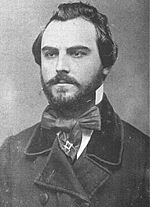 |
Iverson, Alfred Jr. Alfred Iverson, Jr. Alfred Iverson, Jr. was a lawyer, an officer in the Mexican-American War, a U.S. Army cavalry officer, and a Confederate general in the American Civil War. He served in the 1862–63 campaigns of the Army of Northern Virginia as a regimental and later brigade commander... |
Brigadier General | Born February 14, 1829, Clinton, Georgia, son of Senator Alfred Iverson. Mexican-American War veteran, 2d lieutenant at age 17; then Regular Army commission. Colonel 20th North Carolina Infantry. Wounded at Seven Days' Battles, fought at South Mountain and Antietam (Sharpsburg). Brigadier general November 1, 1862. Fought at Battle of Chancellorsville; Battle of Gettysburg. Ordered to Georgia to lead brigade of cavalry in 1864 campaign. Captured Union Major General George Stoneman George Stoneman George Stoneman, Jr. was a career United States Army officer, a Union cavalry general in the American Civil War, and the 15th Governor of California between 1883 and 1887.-Early life:... and 500 men. Post-war: business in Macon, Georgia until 1877, orange grower near Kissimee, Florida. Died March 31, 1911, Atlanta, Georgia. |
J
| Image | Name | Rank | Jackson, Alfred E. | Brigadier General | Born January 11, 1807, Davidson County, Tennessee. Washington College; Greenville College. Farmer, dealer in goods, various enterprises. Major, quartermaster, staff of Brig. Gen. Zollicoffer, paymaster. Brigadier general, February 9, 1863. Brigade commander in East Tennessee. Captured 100th Ohio Infantry at Telford's Station, Tennessee, September 1863. Post-war farmer in Washington County, Virginia on rented land in 1866. Special pardon from President Johnson for kindnesses shown to family. Regained some estates. Died October 30, 1889, Jonesboro, Tennessee. |
|---|---|---|---|---|---|
 |
Jackson, Henry R. Henry R. Jackson Henry Rootes Jackson was a major general in the Confederate States Army during the American Civil War.-Biography:... |
Brigadier General | Born June 24, 1820, Athens, Georgia. Yale University, 1839. Lawyer, district attorney in Savannah, Georgia. Mexican-American War veteran, colonel. Newspaper editor, superior court judge, U.S. minister to Austria. Prosecuted captain and owners of slave ship Wanderer in 1859. Member of Georgia secession convention. Confederate judge. Brigadier general, June 4, 1861. Served with General Lee in West Virginia. Resigned, became major general of Georgia state troops, without a command after division taken under Conscript Act. Staff of Brig. Gen. W. H. T. Walker. Recommissioned Confederate brigadier general, September 23, 1863. Fought in Atlanta campaign, Franklin-Nashville campaign, captured at Nashville, paroled July 1865. Post-war lawyer, minister to Mexico, 1885. President of Georgia Historical Society for almost 25 years. Died May 23, 1898, Savannah, Georgia | ||
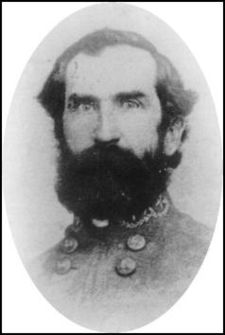 |
Jackson, John K. John K. Jackson John King Jackson was an American lawyer and soldier. He served as a Confederate general during the American Civil War, mainly in Florida and the Western Theater of the conflict... |
Brigadier General | Born February 8, 1828, Augusta, Georgia. University of South Carolina, 1828. Lawyer, militia captain. Colonel, 5th Georgia Infantry, May 1861. At Pensacola. Brigadier general, January 14, 1862. Organized troops at Grand Junction, Tennessee for movement to Corinth, Mississippi and Shiloh campaign. Brigade commander: Shiloh, Kentucky campaign, Chattanooga, Chickamauga, Atlanta campaign. Commanded District of Florida after July 1, 1864. Participated in defense of Savannah. In charge of supply depots in Carolinas at end of the war. Post-war lawyer at Augusta, Georgia. Caught pneumonia while on trip to Milledgeville, Georgia and died February 27, 1866. | ||
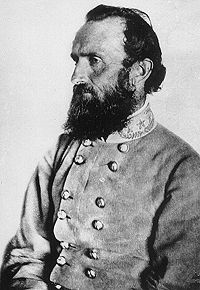 |
Jackson, Thomas Jonathan "Stonewall", "Jack", "Old Jack", "Bluelight" |
Lieutenant General | Born January 21, 1824, Clarksburg, Virginia, later West Virginia. USMA, 1846. Mexican-American War veteran. Professor at Virginia Military Institute Virginia Military Institute The Virginia Military Institute , located in Lexington, Virginia, is the oldest state-supported military college and one of six senior military colleges in the United States. Unlike any other military college in the United States—and in keeping with its founding principles—all VMI students are... , 1852–1861. Colonel, Virginia militia. Brigadier general, June 17, 1861. At Battle of First Bull Run, named "Stonewall" by Brig. Gen. Barnard Bee. Major general, October 7, 1861. Conducted Jackson's Valley Campaign, Spring 1862, tied up 3 Union armies, diverted from Peninsula campaign. Battles included Battle of Cross Keys Battle of Cross Keys The Battle of Cross Keys was fought on June 8, 1862, in Rockingham County, Virginia, as part of Confederate Army Maj. Gen. Thomas J. "Stonewall" Jackson's campaign through the Shenandoah Valley during the American Civil War... ; Battle of Port Republic Battle of Port Republic -References:* Cozzens, Peter. Shenandoah 1862: Stonewall Jackson's Valley Campaign. Chapel Hill: University of North Carolina Press, 2008. ISBN 978-0-8078-3200-4.... . Then moved to Richmond for Seven Days Battles. Turning movement helped win Battle of Second Bull Run. Captured 12,000-man Union garrison at Battle of Harper's Ferry, then helped save Confederate Army at Battle of Antietam (Sharpsburg). Lieutenant general, October 10, 1862. Commanded Confederate right wing at Battle of Fredericksburg. Famous flank march routed Union Army at Battle of Chancellorsville Battle of Chancellorsville The Battle of Chancellorsville was a major battle of the American Civil War, and the principal engagement of the Chancellorsville Campaign. It was fought from April 30 to May 6, 1863, in Spotsylvania County, Virginia, near the village of Chancellorsville. Two related battles were fought nearby on... . Mistakenly mortally wounded by own men while returning from night reconnaissance after first day of battle at Chancellorsville, May 2, 1863. Died May 10, 1863 from pneumonia after amputation of left arm. Buried at Lexington, Virginia. |
||
 |
Jackson, William Hicks "Red" William Hicks Jackson William Hicks "Red" Jackson was a cotton planter, horse breeder, and general in the Confederate States Army during the American Civil War.-Early life and career:... |
Brigadier General | Born October 1, 1835, Paris, Tennessee. West Tennessee College; USMA, 1856. Captain of artillery, wounded at Battle of Belmont. Colonel 1st (later 7th) Tennessee Cavalry. Fought at Holly Springs. Brigadier general, December 29, 1862. Fought in Vicksburg campaign, Meridian expedition. In charge of cavalry corps of Army of Mississippi during Atlanta campaign. In Franklin-Nashville campaign. In command of all Tennessee cavalry in Lt. Gen. Forrest's department, February 1865. Led division but not promoted to major general. Post-war horse breeder and president of the National Agricultural Congress and Tennessee Bureau of Agriculture. Died March 30, 1903, at "Belle Meade" near Nashville, Tennessee. | ||
| Jackson, William Lowther "Mudwall" William Lowther "Mudwall" Jackson William Lowther "Mudwall" Jackson Jr. was the Lieutenant Governor of Virginia from 1857 until 1860. After the outbreak of the American Civil War, he joined the Confederate Army as a Colonel and served on the staff of General Stonewall Jackson... |
Brigadier General | Born February 3, 1825, Clarksburg, Virginia, later West Virginia. Second cousin of Stonewall Jackson. Lawyer, commonwealth attorney, judge, member of Virginia legislature, lieutenant governor of Virginia before the war. Enlisted as private, soon Colonel, 31st Virginia Volunteer Infantry Regiment. Fought in West Virginia campaign. On Stonewall Jackson's staff until April 1863 when he recruited 19th Virginia Volunteer Cavalry Regiment. Active in West Virginia and Valley Campaigns of 1864 Valley Campaigns of 1864 The Valley Campaigns of 1864 were American Civil War operations and battles that took place in the Shenandoah Valley of Virginia from May to October 1864. Military historians divide this period into three separate campaigns, but it is useful to consider the three together and how they... . Brigadier general December 19, 1864. Surrendered at Brownsville, Texas, paroled July 26, 1865. Spent time in Mexico after war, returned to become judge in Kentucky. Died March 24, 1890, Louisville, Kentucky. |
|||
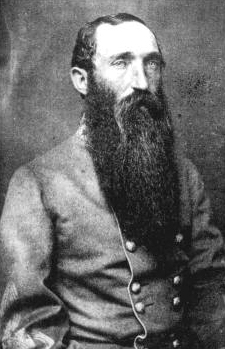 |
Jenkins, Albert Gallatin | Brigadier General | Born November 10, 1830, Cabell County, Virginia, now West Virginia. Jefferson College, Canonsburg, Pennsylvania, 1848; Harvard Law School, 1850. Lawyer at Charleston, (West) Virginia. U.S. Representative, 1856–1861. Colonel, 8th Virginia Cavalry. Elected to First Regular Confederate Congress but also promoted brigadier general, August 5, 1862. Led 500-mile raid in Western Virginia and Ohio. Severely wounded at Battle of Gettysburg. Returned to mountain command in late 1863. Opposed Union Maj. Gen. Crook at Battle of Cloyd's Mountain near Dublin, Virginia on May 9, 1864. Wounded, captured, arm amputated. Died May 21, 1864. | ||
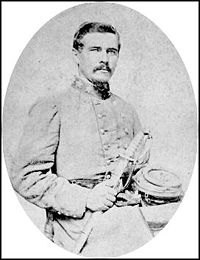 |
Jenkins, Micah Micah Jenkins Micah Jenkins , was a Confederate general in the American Civil War, mortally wounded by friendly fire at the Battle of the Wilderness.-Early life:... |
Brigadier General] | Born December 1, 1835, Edisto Island, South Carolina. South Carolina Military Academy (The Citadel), 1854, 1st in class. Organized King's Mountain Military School. Colonel, 5th South Carolina Infantry. Fought at Battle of First Bull Run (First Manassas). Led Palmetto Sharpshooters regiment during Seven Days' Battles. Brigadier general, July 22, 1862. Severely wounded at Battle of Second Bull Run (Second Manassas). Commanded Hood's division at Battle of Chickamauga. Participated in Knoxville campaign, returned to Army of Northern Virginia for Wilderness Campaign. On second day of battle, near same spot that Stonewall Jackson was killed, Lt. Gen. Longstreet and Brig. Gen. Jenkins were struck by friendly fire. Longstreet recovered; Jenkins died a few hours later, May 6, 1864. Buried at Charleston, South Carolina. | ||
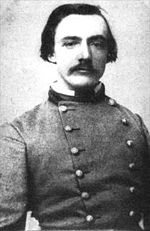 |
Johnson, Adam Rankin "Stovepipe" Adam Johnson (colonel) Adam Rankin "Stovepipe" Johnson was an antebellum Western frontiersman and later an officer in the Confederate States Army during the American Civil War.... |
Brigadier General (not confirmed) Colonel |
Born February 28, 1834, Henderson, Kentucky. Emigrated to Texas. Indian fighter, Overland Mail station contractor. Escaped from Fort Donelson with Brig. Gen. Floyd. Colonel of partisan rangers within Union lines in Kentucky. Captured Newburgh, Indiana with 12 men. Escaped by swimming Ohio River when Morgan's forces were surrounded. Appointed brigadier general September 6, 1864 to rank from June 1, 1864. Not confirmed by Confederate Senate. Yet, Warner lists him as a brigadier general to rank from June 1, 1864. Was accidentally shot and blinded by his own men while attacking Union camp at Grubbs Crossroads, near Princeton. Kentucky, on August 21, 1864. Lived nearly 60 years, founded Marble Falls, Texas Marble Falls, Texas Marble Falls is a city in Burnet County, Texas, United States. The population was 4,959 at the 2000 census.Marble Falls is about northwest of Austin and north of San Antonio... . Died October 20, 1922, Burnet, Texas. |
||
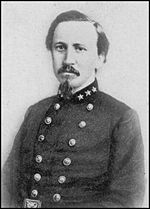 |
Johnson, Bradley Tyler Bradley Tyler Johnson Bradley Tyler Johnson was an American lawyer, soldier, and writer. Although his home state of Maryland remained loyal to the Union during the American Civil War, Johnson served as a general in the Confederate States Army, leading efforts to raise a Maryland Line in the CSA, and rising to command... |
Brigadier General | Born September 29, 1829, Frederick, Maryland. Princeton University, 1849. Lawyer in Maryland, 1851. State's attorney, chairman of state Democratic Party committee. Helped recruit 1st Maryland (Confederate) Infantry. Major, then colonel at Battle of First Bull Run (First Manassas). Assigned to important field duties but not promoted to brigadier general until June 28, 1864. Executed Lt. Gen. Early's orders to Big. Gen. McCausland to burn Chambersburg, Pennsylvania Chambersburg, Pennsylvania Chambersburg is a borough in the South Central region of Pennsylvania, United States. It is miles north of Maryland and the Mason-Dixon line and southwest of Harrisburg in the Cumberland Valley, which is part of the Great Appalachian Valley. Chambersburg is the county seat of Franklin County... . Spent last months of the war in charge of prison at Salisbury, North Carolina. Post-war lawyer in Richmond, Virginia legislator, 1875–1879. Moved to Baltimore where he wrote legal and historical works. Died October 5, 1903, Amelia, Virginia. |
||
 |
Johnson, Bushrod Rust | Major General | Born October 7, 1817, Belmont County, Ohio. USMA, 1840. Seminole Wars and Mexican-American War veteran. Resigned and taught at military schools in Kentucky and Tennessee. Confederate colonel of engineers. Brigadier general, January 24, 1862. Escaped after being captured at Fort Donelson. Severely wounded at Battle of Shiloh. Commanded brigade in Kentucky campaign, Murfreesboro (Stones River), Chickamauga, Knoxville campaign. Major general to rank from May 21, 1864 and transferred to Army of Northern Virginia. At Siege of Petersburg. Division shattered at Battle of Sayler's Creek, without a command at Appomattox Court House, paroled. Chancellor of University of Nashville, 1870. Connected with preparatory school that was forced to close. Retired to farm at Brighton, Illinois Brighton, Illinois Brighton is a village located mostly in Macoupin County, Illinois and partially in Jersey County, Illinois. As of the 2010 U.S. census, the village had a total population of 2,254. The village's current mayor is Wayne Schafer.... , where he died September 12, 1880. |
||
| Johnson, Edward "Old Allegheny", "Clubby" Edward Johnson (general) Edward Johnson , also known as Allegheny Johnson , was a United States Army officer and a Confederate general in the American Civil War.-Early life:... |
Major General | Born April 16, 1816, Salisbury, Chesterfield County, Virginia, moved to Kentucky with parents. USMA, 1838. Seminole Wars and Mexican-American War veteran. Resigned from U.S. Army, June 10, 1861. Colonel, 12th Georgia Infantry. Brigadier general, December 13, 1861, major general, February 28, 1863. Wounded during Jackson's Valley campaign of 1862. Commanded Jackson's former division at Battles of Gettysburg, the Wilderness and Spotsylvania, where he was captured with most of his command. He was exchanged and participated in the Franklin-Nashville campaign. Captured at the battle of Nashville, not released until July 1865. Post-war farmer at Chesterfield, Virginia. Died March 2, 1873, Richmond, Virginia. | |||
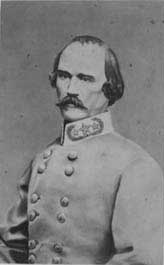 |
Johnston, Albert Sidney Albert Sidney Johnston Albert Sidney Johnston served as a general in three different armies: the Texas Army, the United States Army, and the Confederate States Army... |
General | Born February 2, 1803, Washington, Kentucky. Translyvania University; USMA, 1826. Fought in Black Hawk War Black Hawk War The Black Hawk War was a brief conflict fought in 1832 between the United States and Native Americans headed by Black Hawk, a Sauk leader. The war erupted soon after Black Hawk and a group of Sauks, Meskwakis, and Kickapoos known as the "British Band" crossed the Mississippi River into the U.S.... , resigned in 1834. Fought in Texas War of Independence as a private, rose to brigadier general. Secretary of War of Republic of Texas, 1838–1840. Colonel of Texas volunteers in Mexican-American War. Reappointed to U.S. Army in 1849, served on Texas frontier and in Mormon War Utah War The Utah War, also known as the Utah Expedition, Buchanan's Blunder, the Mormon War, or the Mormon Rebellion was an armed confrontation between LDS settlers in the Utah Territory and the armed forces of the United States government. The confrontation lasted from May 1857 until July 1858... . Pre-war Colonel and Brevet Brevet (military) In many of the world's military establishments, brevet referred to a warrant authorizing a commissioned officer to hold a higher rank temporarily, but usually without receiving the pay of that higher rank except when actually serving in that role. An officer so promoted may be referred to as being... Brigadier General, U.S. Army. Commanded Department of Utah, 1858–1869, then Department of the Pacific; resigned May 3, 1861. Full general in Regular Army of the Confederacy on August 31, 1861 to rank from May 30, 1861. In command of all Confederate forces west of Allegheny Mountains. Concentrated troops at Corinth, Mississippi to meet Grant's attack. Killed in action on the first day at the Battle of Shiloh Battle of Shiloh The Battle of Shiloh, also known as the Battle of Pittsburg Landing, was a major battle in the Western Theater of the American Civil War, fought April 6–7, 1862, in southwestern Tennessee. A Union army under Maj. Gen. Ulysses S. Grant had moved via the Tennessee River deep into Tennessee and... , April 6, 1862. |
||
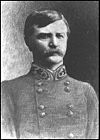 |
Johnston, George Doherty | Brigadier General | Born May 30, 1830, Hillsboro, North Carolina, moved to Alabama at age 2. Howard College, Cumberland University law school, Lebanon, Tennessee. Lawyer at Marion, Alabama, mayor 1856, state legislator, 1867–1858. 2d lieutenant, 4th Alabama Infantry at Battle of First Bull Run (First Manassas). Major, 25th Alabama Infantry, January 1862, colonel, September 1863. At every engagement of Army of Tennessee from Shiloh to Bentonville. Brigadier general, July 26, 1864. Wounded at Battle of Ezra Church during Atlanta campaign; on crutches during Franklin-Nashville campaign. On way to join Lt. Gen. Richard Taylor when Gen. Johnston surrendered, no record of parole. Post-war commandant of cadets at University of Alabama, superintendent of South Carolina Military Academy (The Citadel), United States Civil Service Commissioner, Alabama state senator. Died December 8, 1910, Tuscaloosa, Alabama. | ||
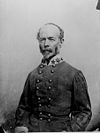 |
Johnston, Joseph E. Joseph E. Johnston Joseph Eggleston Johnston was a career U.S. Army officer, serving with distinction in the Mexican-American War and Seminole Wars, and was also one of the most senior general officers in the Confederate States Army during the American Civil War... |
General | Born February 3, 1807, Farmville, Virginia. USMA, 1829. Mexican-American War and Seminole Wars veteran. Resigned as quartermaster general and brigadier general, U.S. Army, to join Confederate Army. Brigadier general, May 1861. Moved from Harper's Ferry by rail to reinforce General Beauregard at Battle of First Bull Run. Full general, August 31, 1861 to rank from July 4, 1861. Command of Army of Northern Virginia. Heated debate with argument over rank after Cooper, A.S. Johnston and R.E. Lee. Led army in Peninsula Campaign, severely wounded at Battle of Seven Pines, May 1862. Replaced by General Robert E. Lee. In Command of Department of West in 1863. Tried to relieve Vicksburg but Lt. Gen. Pemberton, commander at Vicksburg had contradictory orders. Replaced General Braxton Bragg in command of Army of Tennessee after Battle of Chattanooga Chattanooga Campaign The Chattanooga Campaign was a series of maneuvers and battles in October and November 1863, during the American Civil War. Following the defeat of Maj. Gen. William S. Rosecrans's Union Army of the Cumberland at the Battle of Chickamauga in September, the Confederate Army of Tennessee under Gen... . Led Confederate defense in Atlanta Campaign Atlanta Campaign The Atlanta Campaign was a series of battles fought in the Western Theater of the American Civil War throughout northwest Georgia and the area around Atlanta during the summer of 1864. Union Maj. Gen. William T. Sherman invaded Georgia from the vicinity of Chattanooga, Tennessee, beginning in May... , replaced by General John Bell Hood, July 17, 1864 because of policy of maneuver and retreat. No more active service until appointed by Lee to oppose Union General W. T. Sherman in Carolinas Campaign in February–April 1865. Battle of Bentonville. Surrendered at Bennett Place Bennett Place Bennett Place, sometimes known as Bennett Farm, in Durham, North Carolina was the site of the largest surrender of Confederate soldiers ending the American Civil War, on April 26, 1865.-History:... , Durham, North Carolina Durham, North Carolina Durham is a city in the U.S. state of North Carolina. It is the county seat of Durham County and also extends into Wake County. It is the fifth-largest city in the state, and the 85th-largest in the United States by population, with 228,330 residents as of the 2010 United States census... . Post-war U.S. House of Representatives, 1879–1881. Commissioner of railroads, 1885–1891. Died March 21, 1891 from cold caught while in Sherman's funeral procession. |
||
| Johnston, Robert D. | Brigadier General | Born March 19, 1837, Lincoln County, North Carolina. University of Virginia Law School. Lawyer, militia company lieutenant. Captain, 23rd North Carolina Infantry. Fought in Peninsula campaign, lieutenant colonel in May 1862. Wound at Seven Pines. Fought at South Mountain, Antietam (Sharpsburg), Chancellorsville, Gettysburg. Brigadier general, September 1, 1863. Wounded at Spotsylvania. Leg brigade in Early's Valley Campaign of 1864. In Siege of Petersburg. Sent to guard Roanoke River line in March 1865. Post-war lawyer at Charlotte, North Carolina. Moved to Birmingham, Alabama, 1887. President of Birmingham National Bank, U.S. Land Office register. Died February 1, 1919, Winchester, Virginia. | |||
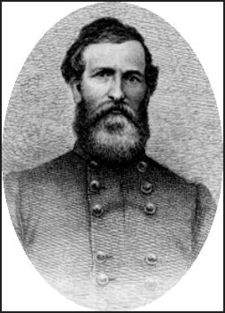 |
Jones, David Rumph "Neighbor" |
Major General | Born April 5, 1825, Orangeburg District, South Carolina. USMA, 1846. Mexican-American War veteran. Chief of staff to General Beauregard at Battle of Fort Sumter. Brigadier general, June 17, 1861. At Battle of First Bull Run (First Manassas). Major general, March 10, 1862. Fought in Peninsula Campaign, Seven Days Battles. Timely seized Thoroughfare Gap Thoroughfare Gap Thoroughfare Gap is an album by American singer-songwriter Stephen Stills, released in 1978. This CD is now available as a three album set on 2 CDs with Stills & Illegal Stills.- Side 1 :#"You Can't Dance Alone" – 4:14#"Thoroughfare Gap" – 3:31... during campaign leading to Battle of Second Bull Run (Second Manassas). Defended a mountain pass at Battle of South Mountain. Commanded Confederate right at Burnside Bridge Burnside Bridge The Burnside Bridge is a bascule bridge that spans the Willamette River in Portland, Oregon.-Design:Including approaches, the Burnside has a total length of and a center span. While lowered this span is normally above the river. The deck is made of concrete, which contributes to its being one of... at Battle of Antietam. Counterattacked with A.P. Hill. Developed heart trouble and died at Richmond, Virginia on January 15, 1863, aged 37. |
||
| Jones, John Marshall "Rum" John M. Jones John Marshall Jones was a brigadier general in the Confederate States Army during the American Civil War. He fought at the Battle of Gettysburg and was killed in action at the Battle of the Wilderness.-Early life:... |
Brigadier General | Born July 26, 1820, Charlottesville, Virginia. USMA, 1841. Instructor at West Point during Mexican-American War. Captain in Confederate Army at start of war. Adjutant to Generals Magruder, Ewell, Early. Brigadier general to rank from May 15, 1863 and took field command. Seriously wounded at Battle of Gettysburg and Battle of Payne's Farm on the Rapidan River in November 1863. Killed in action during the Battle of the Wilderness, May 5, 1864. | |||
| Jones, John R. John R. Jones John Robert Jones was a Virginia businessman and soldier who was a controversial brigadier general in the Confederate States Army during the American Civil War.Jones was a native Virginian and a graduate of the Virginia Military Institute... |
Brigadier General (not confirmed) Lt. Colonel |
Born March 12, 1827, Harrisonburg, Virginia. VMI graduate, 1848. Fought in Jackson's Valley Campaign. Placed in command of brigade but left the field at the Battle of Chancellorsville due to an "ulcerated" leg and was immediately relieved of command. Captured July 4, 1863 at Smithburg, Tennessee. Confederacy made no effort to obtain his release and he was not exchanged or released until July 24, 1865. Appointed brigadier general to rank from June 23, 1862 but not confirmed by Confederate Senate. Warner includes him on the list of generals even noting the lack of confirmation. Post-war farm implement business and commissioner in chancery of circuit court. Died April 1, 1901, Harrisonburg, Virginia. | |||
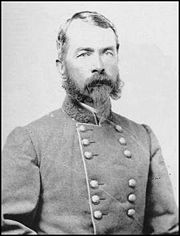 |
Jones, Samuel | Major General | Born December 17, 1819, Powhatan County, Virginia. USMA, 1841. West Point instructor during Mexican-American War and for five years after war. Captain of 1st Artillery Regiment and assistant to judge advocate. Chief of artillery for General Beauregard at Battle of First Bull Run. Brigadier general, July 21, 1861, major general March 19, 1862. Relieved General Bragg at Pensacola. Division command under General Van Dorn at Corinth, Mississippi. Department or division command in Tennessee, then Department of Western Virginia. Relieved of command in March 1864. In command of Department of South Carolina, Georgia and Florida until relieved by General Hardee in October 1864, then in charge of Department of South Georgia and Florida. Paroled at Tallahassee, Florida, May 1865. Post-war farmer until 1880, then War Department clerk. Died July 31, 1887, Bedford Springs, Virginia. | ||
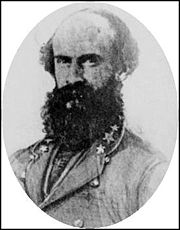 |
Jones, William E. "Grumble" William E. Jones William Edmondson Jones, known as Grumble Jones, was a planter, a career United States Army officer, and a Confederate cavalry general, killed in the Battle of Piedmont in the American Civil War.-Early life:... |
Brigadier General | Born May 9, 1824, Middle Fork of Holston River, Washington County, Virginia. Emory and Henry College; USMA, 1848. Resigned in 1857, visited Europe, settled near Glade Spring Depot, Virginia, planter, militia company captain. With Jeb Stuart in First Manassas Campaign. Colonel of 1st, then 7th, Virginia Cavalry. Brigadier general September 19, 1862. Fought at Battle of Brandy Station. Sent to Department of Southwest Virginia and East Tennessee after disagreement with Stuart. With Longstreet in Knoxville Campaign, Cloyd's Mountain. Ordered to intercept Union General David Hunter's raid into the Shenandoah Valley. Killed in action at the Battle of Piedmont, June 5, 1864. | ||
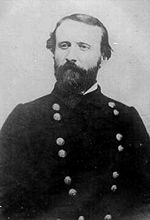 |
Jordan, Thomas | Brigadier General | Born September 30, 1819, Luray, Virginia. USMA, 1840, roommate of later Union Maj. Gen. William T. Sherman. Seminole War and Mexican-American War veteran. Resigned May 21, 1861. Entire Confederate service as a staff officer. Adjutant general of army at First Bull Run (First Manassas) under Beauregard, under A. S. Johnston and Beauregard at Shiloh, and chief of staff to Bragg, July 1862. Under Beauregard again at Siege of Charleston. Brigadier general, April 14, 1862 due to gallantry at Shiloh. Commanded 3rd Military District of South Carolina at end of the war. Became chief of staff and later commander of Cuban revolutionaries in 1869–1870. Movement collapsed, Jordan returned to U.S. Editor of Financial and Mining Record and author of historical articles after the war. Died November 27, 1895, New York City. |
K
| Image | Name | Rank | Kelly, John Herbert John H. Kelly John Herbert Kelly was a career United States Army officer. During the American Civil War, he was the youngest brigadier general in the Confederate States Army at the time of his promotion and one of the youngest generals to die during the war at the age of 24... | Brigadier General | Born March 31, 1840, Carrollton, Alabama. Youngest Confederate general officer at the time of his appointment. Entered USMA in 1857 but resigned on December 29, 1860. Soon commissioned 2d lieutenant of artillery in Regular Army of Confederate States. Staff captain with Maj. Gen. Hardee. Major, 14th Arkansas Infantry, September 23, 1861. Commanded 9th Arkansas Battalion at Shiloh, then colonel of 8th Arkansas Infantry. Commanded regiment at Perrysville and Murfreesboro, led brigade at Chickamauga, Brigadier general, November 16, 1863. Assigned a division in Maj. Gen. Wheeler's corps. During Atlanta campaign raid on Sherman's communications, Kelly was mortally wounded in an engagement at Franklin, Tennessee, September 2, 1864. Left with the family of William H. Harrison, Kelly died a few days later, probably on September 4, 1864. |
|---|---|---|---|---|---|
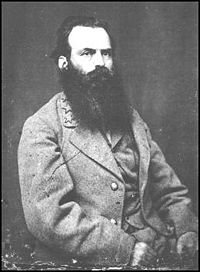 |
Kemper, James Lawson James L. Kemper James Lawson Kemper was a lawyer, a Confederate general in the American Civil War, and the 37th Governor of Virginia... |
Major General | Born June 11, 1823, Madison County, Virginia. Washington College Washington and Lee University Washington and Lee University is a private liberal arts college in Lexington, Virginia, United States.The classical school from which Washington and Lee descended was established in 1749 as Augusta Academy, about north of its present location. In 1776 it was renamed Liberty Hall in a burst of... graduate, 1842. Mexican-American War veteran. Lawyer. Five terms in Virginia House of Delegates; Speaker of the House. Colonel 7th Virginia Infantry. Led regiment from First Manassas to Williamsburg. Brigadier general, June 3, 1862. Severely wounded in Pickett's Charge at Battle of Gettysburg; captured by Union Army, exchanged. Major general September 19, 1864; commanded Virginia Reserve forces. Paroled at Danville, Virginia, May 2, 1865. Post-war lawyer at Madison. Governor of Virginia Governor of Virginia The governor of Virginia serves as the chief executive of the Commonwealth of Virginia for a four-year term. The position is currently held by Republican Bob McDonnell, who was inaugurated on January 16, 2010, as the 71st governor of Virginia.... 1874–1877. Died April 7, 1895, Orange County, Virginia. |
||
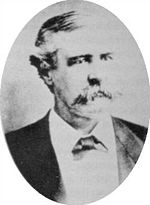 |
Kennedy, John Doby John Doby Kennedy John Doby Kennedy was a general in the Confederate States Army during the American Civil War, as well as a post-war planter, attorney, politician, and Lieutenant Governor of South Carolina.-Early life and career:... |
Brigadier General | Born January 5, 1840, Camden, South Carolina. South Carolina College, 1855–1857. Lawyer just before start of war. Captain, 2nd South Carolina Infantry, April 1861; colonel, January 1862. Wounded at First Bull Run (First Manassas). Ill with fever after Battle of Savage's Station during Seven Days' Battles. In all engagements of Kershaw's brigade from Jackson's capture of Harper's Ferry, 1862 to Battle of Cedar Creek. Governor Magrath of South Carolina asked that brigade be sent to help Gen. Johnston oppose Maj. Gen. Sherman's army. Kennedy was in command since Kershaw's promotion in May. Brigadier general, December 22, 1864. Paroled at Greensboro, May 1865. Post-war lawyer at Camden, South Carolina; denied seat in Congress the next year for refusal to take "iron–clad" oath. State legislator, lieutenant governor. Consul general at Shanghai, 1885. Died April 14, 1896, Camden, South Carolina. | ||
 |
Kershaw, Joseph Brevard | Major General | Born January 5, 1822, Camden, South Carolina. Mexican-American War veteran. Lawyer; two-term state legislator. Colonel, 2nd South Carolina Infantry. At Fort Sumter, First Bull Run (Manassas). Brigadier general, February 13, 1862; major general, May 18, 1864. Involved in almost all operations of 1st Corps of Army of Northern Virginia until end of war. Captured at Sayler's Creek, April 6, 1865. Post-war lawyer, state legislator, judge. Resigned as judge due to ill health, 1893. Postmaster, Camden, South Carolina. Died April 13, 1894, Camden, South Carolina. | ||
| Kirkland, William W. | Brigadier General | Born February 13, 1833, Hillsboro, North Carolina. Appointed to USMA, 1852, did not graduate. Commissioned 2d lieutenant, U.S. Marines, 1855, resigned August 1860. Captain of infantry in Regular Confederate Army, March 16, 1861. Colonel, 21st North Carolina Infantry at First Bull Run (First Manassas) and in Jackson's Valley Campaign. Badly wounded at First Battle of Winchester. Chief of staff to Brig. Gen. Cleburne at Murfreesboro (Stones River) while recovering. Led regiment at Gettysburg, badly wounded at Bristoe Station. Brigadier general, August 29, 1863. Wounded at Gaines Mill, June 2, 1864, during Overland campaign. Assigned to brigade north of the James River during Siege of Petersburg until December 1864, then ordered to North Carolina. Present at both battles of Fort Fisher and at Bentonville. Post-war commission business in Savannah, Georgia. Moved to New York City where daughter was famous on Broadway stage, held post office position. Became invalid about 1900; spent last years of life in soldiers' home in Washington, D.C. where he died May 12, 1915. |
L
| Image | Name | Rank | Lane, James H. "Little General" James H. Lane (general) James Henry Lane was a university professor and Confederate general in the American Civil War.He is considered to be the father of Virginia Polytechnic Institute and State University and is the namesake of the University's oldest building, Lane Hall.-Early life:Lane was born in Mathews Court... | Brigadier General | Born July 28, 1833, Mathews Court House, Virginia. VMI graduate, 1854; University of Virginia graduate, 1857. Assistant professor at VMI, professor at North Carolina Military Institute. Major, 1st North Carolina Volunteers; at Battle of Big Bethel. Reorganized; colonel 28th North Carolina Infantry. With Army of Northern Virginia throughout war, wounded three time. Brigadier general, November 1, 1862. Rear guard in retreat from Antietam (Sharpsburg). Brigade fought in first day of Battle of Gettysburg and in Pickett's Charge with nearly 50 percent casualties. Post-war teacher, then with Virginia Polytechnic Institute (Virginia Tech) and Missouri School of Mines. Professor of civil engineering at Alabama Polytechnic Institute (Auburn University) for last 26 years of life. Died September 21, 1907, Auburn, Alabama. |
|---|---|---|---|---|---|
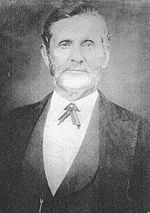 |
Lane, Walter P. Walter P. Lane Walter Paye Lane was a Confederate general during the American Civil War who also served in the armies of the Republic of Texas and the United States of America.-Early life:... |
Brigadier General | Born February 18, 1817, County Cork, Ireland; emigrated to United States at age 4. First settled in Guernsey County, Ohio. At age 18 went to Louisiana, then Texas. Fought at Battle of San Jacinto Battle of San Jacinto The Battle of San Jacinto, fought on April 21, 1836, in present-day Harris County, Texas, was the decisive battle of the Texas Revolution. Led by General Sam Houston, the Texian Army engaged and defeated General Antonio López de Santa Anna's Mexican forces in a fight that lasted just eighteen... . Crew of a Texas privateer; Indian fighter; teacher. Mexican-American War veteran. Miner in California, Nevada, Arizona and Peru. Lieutenant colonel, 3rd Texas Cavalry. Fought at Wilson's Creek, Pea Ridge (Elkhorn Tavern), in Louisiana and in Red River campaign. Severely wounded at Battle of Mansfield. Brigadier general, March 17, 1865, the last day the Confederate Senate met. Post-war merchant at Marshall, Texas. Died January 28, 1892, Marshall, Texas. |
||
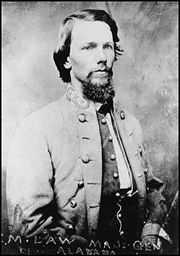 |
Law, Evander M. Evander M. Law Evander McIver Law was an author, teacher, and a Confederate general in the American Civil War.-Early life:... |
Brigadier General | Born August 7, 1836, Darlington, South Carolina. South Carolina Military Academy (The Citadel), 1856. Helped found and taught at Military High School, Tuskeegee, Alabama. Took company of State troops to Pensacola at start of war. Lieutenant colonel, 4th Alabama Infantry; colonel in November 1861. Severely wounded at First Bull Run (First Manassas). Fought at Seven Pines, Seven Day's Battles, Second Bull Run (Second Manassas), Antietam (Sharpsburg). Brigadier general, October 2, 1862. Fought at Gettysburg, Chickamauga. Led Hood's division after Hood wounded at Chickamauga. Fought at the Wilderness, Spotsylvania and Cold Harbor, where he was wounded again. Relieved from Army of Northern Virginia at own request and commanded cavalry force under Gen. Joseph E. Johnston in the Carolinas. New York Times obituary, other histories state promotion to major general, March 20, 1865; but major general promotion never ratified by the Confederate Congress which last met March 17, 1865. Helped establish Florida educational system; newspaperman until age 80, commander of Florida division of United Confederate Veterans. Died October 31, 1920, aged 84, Bartow, Florida. | ||
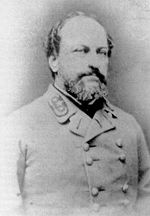 |
Lawton, Alexander R. | Brigadier General | Born November 4, 1818, Beaufort District, South Carolina. USMA, 1839, resigned 1841 to enter Harvard Law School. Lawyer at Savannah, Georgia. President, Augusta and Savannah Railroad Augusta and Savannah Railroad The Augusta and Savannah Railroad was chartered in 1838 as the Augusta and Waynesboro Railroad but didn't begin operations until 1854. Two years later in 1856, it changed its name to Augusta and Savannah Railroad. The A&S ran of track between Augusta and Millen, Georgia, USA. It was absorbed by... . Served in both houses of Georgia legislature. Seized Fort Pulaski. Brigadier general, appointed April 13, 1861, confirmed August 28, 1861. Fought at Seven Days' Battles, badly wounded at Antietam (Sharpsburg). Quartermaster department from fall 1863 until end of war. Resumed law practice, state legislator, 1870–1875. Active in Democratic Party. Minister to Austria, 1887. Died July 2, 1896, Clifton Springs, New York. Buried at Savannah, Georgia. |
||
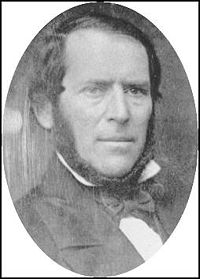 |
Leadbetter, Danville Danville Leadbetter Danville Leadbetter was a career U.S. Army officer and later he served as a Confederate general during the American Civil War.... |
Brigadier General | Born August 26, 1811, Leeds, Maine. USMA, 1836. Resigned commission at Mobile, 1857, where he had helped construct and repair harbor forts. Chief engineer of Alabama. Mainly an engineer officer in Confederate Army. Brigadier general, February 27, 1862. Supervised building defenses at Mobile, Chattanooga, Knoxville. General E. P. Alexander criticized Leadbetter's work at Knoxville. Chief engineer for Gen. Joseph Johnston, then at Mobile again. No record of capture or parole. Went to Canada by way of Mexico. Died September 26, 1866 at Clifton, Canada. | ||
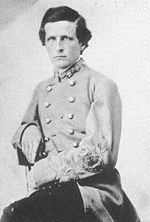 |
Lee, Edwin Gray "Ned" Edwin Gray Lee Edwin Gray Lee was an American soldier from Virginia and a Confederate brigadier general during the American Civil War. He was a member of the Lee family and second cousin of Robert E. Lee.-Biography:... |
Brigadier General | Born May 27, 1836, "Leeland", Virginia. Hallowell's School at Alexandria, Virgina; College of William and Mary. Son-in-law of Brig. Gen. Pendleton. Lawyer, 2d lieutenant, 2nd Virginia Infantry. Major, lieutenant colonel, colonel, 33rd Virginia Infantry. Aide to Stonewall Jackson at Harper's Ferry, 1861. In Jackson's Valley Campaign, Seven Days' Battles, Second Bull Run (Second Manassas), Antietam (Sharpsburg), Fredericksburg. Resigned due to ill health, December 1862. Recommissioned colonel in 1863, duty at Richmond, Virginia. In command at Staunton, Virginia for defense of Shenandoah Valley, May 17, 1864. Brigadier general, September 23, 1864 to rank from September 20, 1864. Given six month leave of absence for health, November 28, 1864. Brigadier general nomination rejected by Confederate Senate, February 24, 1865. Ran blockade with wife just before end of war to Montreal, Canada. Died from "disease of the lungs" August 24, 1870, Yellow Springs, Virginia, aged 34, buried at Lexington, Virginia. | ||
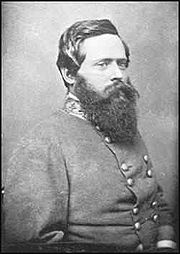 |
Lee, Fitzhugh Fitzhugh Lee Fitzhugh Lee , nephew of Robert E. Lee, was a Confederate cavalry general in the American Civil War, the 40th Governor of Virginia, diplomat, and United States Army general in the Spanish-American War.-Early life:... |
Major General | Born November 19, 1835 at "Clermont", Fairfax County, Virginia. USMA, 1856. Wounded fighting Indians on the frontier. Nephew of General Samuel Cooper and General Robert E. Lee. Resigned from U.S. Army, May 1861. On staff of General Joseph E. Johnston at Battle of First Bull Run. Lt. colonel, 1st Virginia Cavalry. In Peninsula Campaign Peninsula Campaign The Peninsula Campaign of the American Civil War was a major Union operation launched in southeastern Virginia from March through July 1862, the first large-scale offensive in the Eastern Theater. The operation, commanded by Maj. Gen. George B... . Brigadier general, July 24, 1862. In invasion of Pennsylvania. Major general, August 3, 1863. Protege of Jeb Stuart. Actions helped hold Spotsylvania Court House for the Confederates. After Wade Hampton was ordered to North Carolina in January 1865, Lee commanded the remainder of the Cavalry Corps with the Army of Northern Virginia. Post-war farmer in Stafford County, Virginia. Governor of Virginia, 1885. Consul-general to Havanna, Cuba. Major General of U.S. Volunteers in the Spanish-American War Spanish-American War The Spanish–American War was a conflict in 1898 between Spain and the United States, effectively the result of American intervention in the ongoing Cuban War of Independence... . Retired as brigadier general, U.S. Army, 1901. Died April 23, 1905, Washington, D.C. |
||
| Lee, George Washington Custis George Washington Custis Lee George Washington Custis Lee , also known as Custis Lee, was the eldest son of Robert E. Lee and Mary Anna Custis Lee... |
Major General | Born September 16, 1832, Fort Monroe, Virginia. USMA, 1854, first in class, engineer officer. Resigned May 2, 1862. Eldest son of General Robert E. Lee. Captain of engineers, constructed Richmond, Virginia defenses. Served on staff of President Jefferson Davis with the rank of colonel. Brigadier general June 25, 1863. Major general, October 20, 1864, confirmed February 3, 1865. No active field service until he organized clerks and mechanics for defense of Richmond near end of war. Captured at Battle of Sayler's Creek; paroled immediately because of mother's illness. President of Washington College, later Washington and Lee University, succeeding his father in 1870 and serving until 1897. Retired to "Ravensworth", an ancestral home near Alexandria, Virginia. Died there, February 18, 1913, buried at Lexington, Virginia. | |||
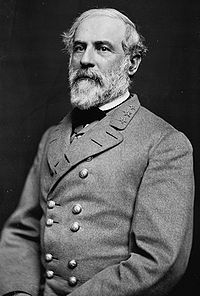 |
Lee, Robert E. Robert E. Lee Robert Edward Lee was a career military officer who is best known for having commanded the Confederate Army of Northern Virginia in the American Civil War.... |
General | Born January 19, 1807 at "Stratford", Westmoreland County, Virginia. Son of Light-Horse Harry Lee. Removed to small house at Alexandria, Virginia after father's financial losses in land speculation. USMA, 1829. Married Mary Ann Randolph Custis, great grand-daughter of Martha Washington, June 30, 1831. Succeeded to Custis estate of "Arlington" across the Potomac River from Washington, D.C. Mexican-American War veteran, fought with Maj. Gen. Winfield Scott. Engineer. Supervised construction or improvement of Forts Pulaski, Monroe, Hamilton and Carroll. Superintendent of USMA, 1855–1855. Lt. Colonel, 2nd U.S. Cavalry, 1857–1861. Led U.S. Marine detachment against John Brown at Harper's Ferry, October 1859. Resigned April 20, 1861. Commander of Virginia land and naval forces. Brigadier general, May 14, 1861. Full general to rank from June 14, 1861. Led West Virginia Campaign. Examined South Atlantic seaboard defense. Military adviser to Confederate President Jefferson Davis, devised plan for Jackson's Valley Campaign to divert Union forces from Peninsula Campaign. Command of Army of Northern Virginia after General Joseph Johnston was wounded at Battle of Seven Pines. Led that army through all campaigns and battles until surrender at Appomattox Court House. Turned more defensive after Battle of Gettysburg and held off Union Army for 10 months during Siege of Petersburg through skilful use of field fortifications and entrenchments. Given command of all Confederate armies, January 23, 1865. Opposed guerrilla warfare after surrender. Set an example of conduct on return to Union. Post-war President of Washington College, later Washington and Lee University, died October 12, 1870, Lexington, Virginia. | ||
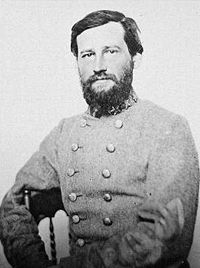 |
Lee, Stephen Dill Stephen D. Lee Stephen Dill Lee was an American soldier, planter, legislator, and author. He was the youngest Confederate lieutenant general during the American Civil War, and later served as the first president of Mississippi A&M College... |
Lieutenant General | Born September 22, 1833, Charleston, South Carolina. USMA, 1854. Captain and aide-de-camp to General Beauregard. Served in artillery through Battle of Antietam (Sharpsburg). Brigadier general, November 6, 1862. Assigned to Lt. General Pemberton at Vicksburg. Exchanged after surrender of Vicksburg. Major general, August 3, 1863. Command of Cavalry in Department of Mississippi, Alabama, West Tennessee and East Louisiana. Lieutenant general, June 23, 1864. Youngest Confederate lieutenant general. Assumed command of Hood's old corps when Hood succeeded Johnston as commander of Army of Tennessee. Led corps during Franklin-Nashville Campaign and Carolinas Campaign. Post-war farmer, state senator, first president of Mississippi State University Mississippi State University The Mississippi State University of Agriculture and Applied Science commonly known as Mississippi State University is a land-grant university located in Oktibbeha County, Mississippi, United States, partially in the town of Starkville and partially in an unincorporated area... . Leading figure in the United Confederate Veterans United Confederate Veterans The United Confederate Veterans, also known as the UCV, was a veteran's organization for former Confederate soldiers of the American Civil War, and was equivalent to the Grand Army of the Republic which was the organization for Union veterans.... , commander-in-chief, 1904–1908. Died May 28, 1908, Vicksburg, Mississippi. |
||
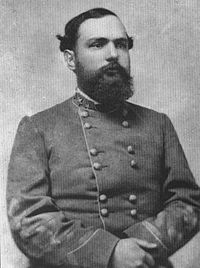 |
Lee, William Henry Fitzhugh "Rooney" William Henry Fitzhugh Lee William Henry Fitzhugh Lee , known as Rooney Lee or W.H.F. Lee, was the second son of Robert E. Lee and Mary Anna Randolph Custis. He was a planter, a Confederate cavalry General in the American Civil War, and later a member of the U.S. Congress.-Early life:Lee was born at Arlington House in... |
Major General | Born May 31, 1837, "Arlington", Virginia. Second oldest son of General Robert E. Lee. Harvard College graduate, 1857. Commissioned into U.S. Army for two years, then planter. Colonel, 9th Virginia Cavalry Regiment. Participated in most campaigns of Cavalry Corps of the Army of Northern Virginia. Brigadier general, rank from September 15, 1862. Severely wounded at the Battle of Brandy Station, June 1863. Captured by the Union Army while recovering, exchanged March 1864. Promoted to major general on April 23, 1864. In command of cavalry at Battle of Appomattox Court House. Post-war president of Virginia Agricultural Society. State senator for four years. U.S. House of Representatives, 1887–1891. Died at "Ravensworth" near Alexandria, Virginia, October 15, 1891. | ||
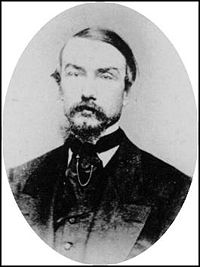 |
Leventhorpe, Collett Collett Leventhorpe Collett Leventhorpe was a brigadier general in the Confederate States Army during the American Civil War.-Early life:... |
Brigadier General | Born May 15, 1815, Exmouth, Devonshire, England. Served in British Army. Moved to North Carolina and married into prominent family. Colonel, 34th North Carolina Infantry, then colonel of 11th North Carolina Infantry. Duty mainly in North Carolina. Then with Army of Northern Virginia at Gettysburg. Badly wounded, captured and not exchanged for nine months. Then, appointed brigadier general of North Carolina state forces and operated on the Roanoke River and Weldon Railroad until the end of the war. Appointed brigadier general in the Confederate Army on February 18, 1865 and confirmed by the Confederate Senate. For unknown reasons, declined the appointment on March 6, 1865 and remained with state troops. Died December 1, 1889, Wilkes County, North Carolina. | ||
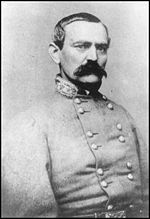 |
Lewis, Joseph Horace Joseph Horace Lewis Joseph Horace Lewis was an American lawyer, military leader and politician. He served as a brigadier general in the Confederate States Army during the American Civil War, and later a U.S. Representative from Kentucky and justice of the Kentucky Court of Appeals, the court of last resort in... |
Brigadier General | Born October 29, 1824, Glasgow, Kentucky. Centre College, 1843. Lawyer, three-term Kentucky legislator. Colonel, 6th Kentucky Infantry, September 1861. Fought at Shiloh, Murfreesboro, Chickamauga. Command of Orphan Brigade after death of Ben Hardin Helm. Brigadier general, September 30, 1863. After fall of Atlanta, brigade was mounted, attached to Maj. Gen. Wheeler's cavalry corps and opposed Union Maj. Gen. Sherman in his march to the sea and in the Carolinas. Surrendered as part of Jefferson Davis's escort, paroled at Washington, Georgia, May 9, 1865. Post-war lawyer at Glasgow, Kentucky, two terms in state legislator, three terms in U.S. Congress. Judge in Kentucky for 18 years starting in 1880, last four years as chief justice of the court of appeals. Resided on farm in Scott County, Kentucky where he died July 6, 1904. | ||
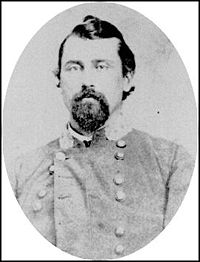 |
Lewis, William Gaston William G. Lewis William Gaston Lewis was a Confederate general in the American Civil War.-Early life:William G. Lewis was born September 3, 1835, in Rocky Mount, North Carolina. He was the son of Dr. John Wesley Lewis and Catherine Ann Battle. He was educated at Lovejoy’s Academy in Raleigh... |
Brigadier General | Born September 3, 1835, Rocky Mount, North Carolina. University of North Carolina, 1855.School teacher in North Carolina and Florida, government surveyor in Minnesota, assisted in construction of Wilmington and Weldon Railroad Wilmington and Weldon Railroad Originally chartered in 1835 as the Wilmington and Raleigh Railroad, the Wilmington and Weldon Railroad name began use in 1855. At the time of its 1840 completion, the line was the longest railroad in the world with 161.5 miles of track... , 1858–1861. Served in Bethel Regiment, major 33rd North Carolina Infantry. Lieutenant colonel, 43rd North Carolina Infantry, April 1862. Fought at Gettysburg, Plymouth, North Carolina, Siege of Petersburg. Brigadier general, May 31, 1864. In Valley Campaigns of 1864. Siege of Petersburg. Wounded and captured at Battle of Farmville, April 7, 1864, during Appomattox Campaign. Post-war civil engineer for more than 30 years; chief engineer of North Carolina for 13 years. Died January 7, 1901, Goldsboro, North Carolina. |
||
 |
Liddell, St. John Richardson St. John Richardson Liddell St. John Richardson Liddell was a prominent Louisiana planter who served as a general in the Confederate States Army during the American Civil War. He was an outspoken proponent of Southern emancipation of slaves... |
Brigadier General | Born September 6, 1815, Woodville, Mississippi. Quit USMA after one year. Planter. Colonel, aide-de-camp for Maj. Gen. Hardee; confidential courier for Gen. A. S. Johnston. Commanded brigade at Corinth. Brigadier general, July 17, 1862. Battles: Second Corinth, Perryville, Murfreesboro (Stones River), Chickamauga, Red River Campaign, Defense of Mobile, Fort Blakely. On February 14, 1870, Liddell was murdered by Charles Jones, former Lt. Col., 17th Louisiana Infantry, and his two sons aboard a steamboat. Buried on his plantation in Catahoula Parish, Louisiana. | ||
| Lilley, Robert Doak Robert D. Lilley Robert Doak Lilley was a Confederate brigadier general during the American Civil War. He served in most of the leading battles of the Army of Northern Virginia and led a brigade of infantry in the Shenandoah Valley in the last years of the war.-Early life and career:Robert D. Lilley was born near... |
Brigadier General | Born January 28, 1836, Greenville, Virginia. Washington College. Sold surveying instruments invented by father. In Charleston at fall of Fort Sumter. Recruited company which fought in Western Virginia campaign of 1861 as part of 25th Virginia Infantry. Battles Cedar Mountain, Second Bull Run (Second Manassas), Antietam (Sharpsburg), Gettybsburg. Major, January 1863, lieutenant colonel after Gettysburg. In Overland Campaign. Brigadier general, May 31, 1864, assigned to Lt. Gen. Early's old brigade. Wounded 3 times. Captured near Winchester, Virginia when wounded in July 1864 reconnaissance. Arm amputated, exchanged. In charge of reserve units in Shenandoah Valley. Post-war financial agent for Washington College (later Washington and Lee University); member of the Presbyterian Synod of Virginia. Died November 12, 1886, Richmond, Virginia, attending a meeting of the Synod. Buried at Staunton, Virginia. | |||
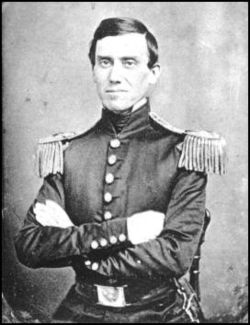 |
Little, Lewis Henry Lewis Henry Little Lewis Henry Little was a career United States Army officer and a Confederate brigadier general during the American Civil War. He served mainly in the Western Theater and was killed in action during the Battle of Iuka.... |
Brigadier General | Born March 19, 1817, Baltimore, Maryland. Commissioned directly into U.S. Army, 1839. Mexican-American war veteran. Resigned May 7, 1861. Major of artillery, soon colonel and assistant adjutant general on staff of Brig. Gen. Sterling Price. Commanded brigade at Pea Ridge (Elkhorn Tavern). Brigadier general, April 16, 1862. Gen. Bragg assigned him to command a division after evacuation of Corinth. Fought under Price at Iuka. While talking with Price, Louis Hebert and Whitfield at Iuka, September 19, 1862, a ball passed under Price's arm and struck Little in the forehead, killing him instantly. | ||
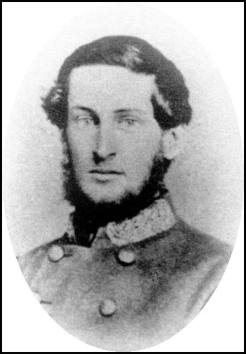 |
Logan, Thomas Muldrup Thomas M. Logan Thomas Muldrup Logan was an American soldier and businessman. He served as a Confederate general during the American Civil War, and afterward was greatly involved in railroad development in the Southern United States.... |
Brigadier General | Born November 3, 1840, Charleston, South Carolina. South Carolina College (University of South Carolina), 1860. Volunteer during bombardment of Fort Sumter, then lieutenant of a company in Hampton's Legion. Captain after First Bull Run (First Masassas). Wounded in Seven Days' Battles. Fought at Antietam (Sharpsburg), then promoted to major. Fought in Suffolk campaign, at Chickamauga and at Knoxville as lieutenant colonel. With Wade Hampton in South Carolina. Brigadier general, February 15, 1865. Post-war career in railroad development. Along with J. P. Morgan, a principal organizer of Southern Railway Company (now Norfolk Southern Railway Company). Active in Democratic Party positions. Died August 11, 1914, New York City, buried Richmond, Virginia. | ||
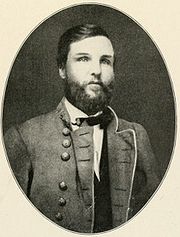 |
Lomax, Lunsford L. Lunsford L. Lomax Lunsford Lindsay Lomax was an American educator, farmer, and officer in the United States Army who resigned his commission to join the Confederate Army at the outbreak of the American Civil War.-Biography:... |
Major General | Born November 3, 1835, Newport, Rhode Island, to a Virginia family. Father was stationed there with 3rd U.S. Artillery Regiment. USMA, 1856. Resigned from U.S. Army April 25, 1861. Staff officer until 1863. Inspector general of Army of West Tennessee. Colonel, 11th Virginia Cavalry Regiment. Gettysburg. Brigadier general, June 23, 1863. Overland Campgain. Major general, August 10, 1864. Commanded cavalry in Valley Campaign of 1864, including Winchester, Cedar Creek. Command of Valley District. Surrendered at Greensboro. Farmer. President of Virginia Polytechnic Institute (Virginia Tech), 1885–1899. Spent next six years helping to compile the Official Records of the war. A commissioner of Gettysburg National Military Park. Died May 28, 1913, aged 78. Washington, D.C. | ||
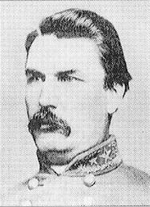 |
Long, Armistead L. | Brigadier General] | Born September 3, 1825, Campbell County, Virginia. USMA, 1850. Major of artillery in Confederate service, then staff officer. Became military secretary to General Lee when Lee took command of Army of Northern Virginia. Assigned to command artillery of 2d Corp. Brigadier general of artillery, September 21, 1863. Became totally blind in 1870. President Grant appointed his wife postmistress of Charlottesville, Virginia. Wrote biography of Lee and several historical articles. Died April 29, 1891, Charlottesville, Virginia. | ||
 |
Longstreet, James "Pete", "Old Pete" James Longstreet James Longstreet was one of the foremost Confederate generals of the American Civil War and the principal subordinate to General Robert E. Lee, who called him his "Old War Horse." He served under Lee as a corps commander for many of the famous battles fought by the Army of Northern Virginia in the... |
Lieutenant General | Born January 8, 1821, Edgefield District, South Carolina. USMA, 1842. Indian Wars Indian Wars American Indian Wars is the name used in the United States to describe a series of conflicts between American settlers or the federal government and the native peoples of North America before and after the American Revolutionary War. The wars resulted from the arrival of European colonizers who... , Mexican-American War. Resigned from U.S. Army, June 1, 1861. Brigadier general, June 17, 1861. Fought at Battle of First Bull Run (First Manassas). Major general, October 7, 1861. Battles: Peninsula Campaign, Battle of Second Bull Run (Second Manassas), Battle of Antietam (Sharpsburg). Occupied Marye's Heights at Battle of Fredericksburg. Commanded right wing at Battle of Gettysburg. Detached for service in western theater. Fought at Battle of Chickamauga. Failed to take and hold Knoxville. Returned to Army of Northern Virginia for Battle of the Wilderness, severely wounded by his own men on return from a night scout after the first day, similar to Stonewall Jackson at Chancellorsville, near same location. In Siege of Petersburg and Appomattox Campaign. Republican and friend of U.S. Grant after the war. Commissioner of Pacific railroads, 1897–1904. Last of Confederate full and lieutenant generals to die, January 2, 1904, Gainesville, Georgia. |
||
| Loring, William Wing "Blizzards" William W. Loring William Wing Loring was a soldier from North Carolina who served in the armies of the United States, the Confederacy, and Egypt.-Early life:... |
Major General | Born December 4, 1818, Wilmington, North Carolina, soon moved to Florida. Fought against the Seminoles. Lawyer, Florida state legislator. Lost arm in Mexican-American War. Stayed in the regular army and was youngest colonel at time of Civil War. Resigned from U.S. Army, May 13, 1861. Brigadier general, May 20, 1861; major general February 15, 1862. Senior major general on active service when he surrendered with General Joseph Johnston. Relieved of duty by Stonewall Jackson because of arguments during the Romney Expedition. In command in Southwest Virginia. Then in Mississippi, cut off from Vicksburg at Baker's Creek and escaped capture. Commanded a division in the Army of Tennessee until the end of the war. General in Egyptian Army after the war. Returned to U.S. in 1879, Died December 30, 1886, New York City, buried St. Augustine, Florida. | |||
 |
Lovell, Mansfield Mansfield Lovell Mansfield Lovell was a major general in the Confederate States Army during the American Civil War. He was roundly criticized in Southern newspapers for allowing Union forces to capture the city of New Orleans.... |
Major General | Born October 20, 1822, Washington, D.C. USMA, 1842. Mexican-American War veteran. Deputy street commissioner in New York City. Appointed major general in Confederate Army, October 7, 1861. Assigned to New Orleans, but had to evacuate city due to attack by superior Union forces. At Second Battle of Corinth. No further assignments despite requests by Generals Johnston and Hood. Post-war: Returned to New York and was assistant engineer working on removal of East River obstructions.Died June 1, 1884, New York City. | ||
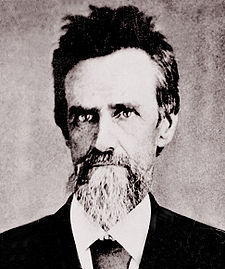 |
Lowrey, Mark Perrin Mark Perrin Lowrey Mark Perrin Lowrey was a Southern Baptist preacher otherwise known as the "Preacher General". He is known for being a Confederate brigadier general during the Civil War, for his works in the Mississippi Southern Baptist Convention, and for founding the Blue Mountain College.-Early life and... |
Brigadier General | Born December 30, 1828, McNairy County, Tennessee. Son of Irish immigrants; father died, family moved to Tishomingo County, Mississippi, 1845. Mexican-American War veteran. Brick mason. Baptist minister, 1853–1861. Commanded 4th Mississippi State Troops, a 60-day regiment, then colonel 32nd Mississippi Infantry in 1862. Fought in Kentucky campaign, at Chickamauga. Brigadier general, October 4, 1863. Fought in Atlanta campaign, Franklin-Nashville campaign. Resigned March 14, 1863. Founded Blue Mountain Female Institute, Blue Mountain Mississippi, 1873. President and professor of history and moral science until his death. Fell dead February 27, 1885, train station at Middleton, Tennessee, buried at Blue Mountain, Mississippi. | ||
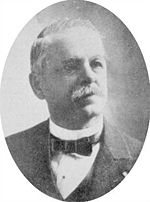 |
Lowry, Robert | Brigadier General | Born March 10, 1830, Chesterfield District, South Carolina. Parents moved to Tennessee, then to Tishomingo County, Mississippi. Mercantile businessman, then lawyer. Enlisted as private, soon major, 6th Mississippi Infantry. Twice wounded at Shiloh. Colonel in Vicksburg campaign. Led regiment in Atlanta campaign, Franklin-Nashville campaign. Promoted to brigadier general to rank from February 4, 1865 after death of Brig. Gen. John Adams at Franklin. With Gen. Joseph E. Johnston in the Carolinas, at Bentonville, and at surrender at Greensboro. Post-war state senator for two years. Governor of Mississippi, 1881–1889. Defeated for U.S. Senate seat. State commander of United Confederate Veterans, 1903–1910. Died January 19, 1910, Jackson, Mississippi. | ||
 |
Lyon, Hylan B. Hylan B. Lyon Hylan Benton Lyon was a career officer in the United States Army until the start of the American Civil War, when he resigned rather than fight against the South... |
Brigadier General | Born February 22, 1836, Caldwell (now Lyon) County, Kentucky. USMA, 1856. Resigned from U.S. Army, April 30, 1861. Battery captain, the lieutenant colonel, 8th Kentucky Infantry. Taken prisoner at Fort Donelson, exchanged after 7 months in prison. Served at Holly Springs, Vicksburg. Escaped with command from Vicksburg. Brigadier general, June 14, 1864. Commanded brigade of 4 Kentucky regiments under Lt. Gen. Forrest near end of war. Command of District of Kentucky. Temporary command of all artillery at Chattanooga. Post-war: went to Mexico briefly, farmer at Eddyville, Kentucky. One of lessees of state penitentiary and commissioner to build new branch penitentiary at Eddyville. Died April 25, 1907, Eddyville, Kentucky. |
M
| Image | Name | Rank | Mackall, William W. | Brigadier General | Born January 18, 1817, Cecil County, Maryland. USMA, 1837. Severely wounded in Seminole War. Mexican-American War veteran. Declined USA promotion May 11, 1861, resigned July 3, 1861. Lieutenant colonel, adjutant general, staff of Gen. Albert S. Johnston. Brigadier general, February 27, 1862. Captured at Island No. 10, later exchanged. Held District commands. Chief of staff to Gen. Bragg, April 1863, relieved at own request after Chickamauga. Chief of staff to Gen. Joseph Johnston. Declined to serve under Gen. Hood. Post-war: owned farms in Fairfax County, Virginia. Died at one of them, "Langley", near McLean, Virginia, August 12, 1891. |
|---|---|---|---|---|---|
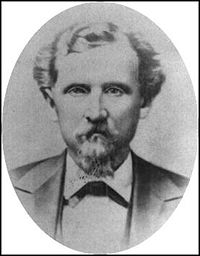 |
MacRae, William William MacRae William MacRae was a brigadier general in the Confederate States Army during the American Civil War.-Early life:... |
Brigadier General | Born September 9, 1834, Wilmington, North Carolina. Civil engineer. Enlisted as private in infantry company, elected captain when it became a company in 15th North Carolina Infantry; lieutenant colonel April 1862, colonel, February 1863. Fought at Seven Days' Battles, Second Bull Run (Second Manassas), Antietam (Sharpsburg), Fredericksburg. Served in North Carolina. Returned to Army of Northern Virginia for Overland Campaign. Brigadier general (temporary), June 22, 1864, permanent November 4, 1864. Paroled at Appomattox. Post-war: general superintendent of several southern railroads. Died February 11, 1882, Augusta, Georgia, buried at Wilmington, North Carolina. | ||
 |
Magruder, John Bankhead "Prince John" John B. Magruder John Bankhead Magruder was a career military officer who served in the armies of three nations. He was a U.S. Army officer in the Mexican-American War, a Confederate general during the American Civil War, and a postbellum general in the Imperial Mexican Army... |
Major General | Born May 1, 1807, Port Royal Virginia. USMA, 1830. Mexican-American War veteran. Brigadier general, June 17, 1861. Major general, October 7, 1861. Distinguished in the Peninsula Campaign by deceiving Union General McClellan of the strength of his force and delaying his advance so Confederates could gather forces and build defenses. Less successful in Seven Days Battles. Assigned to duty in Texas, successfully defended Galveston and dispersed Union fleet. Joined Imperial forces in Mexico but returned to Texas after downfall of Maximilian. Died in comparative poverty February 18, 1871, Houston, Texas. | ||
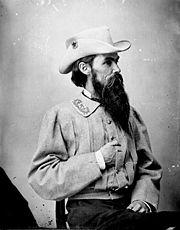 |
Mahone, William "Little Billy" William Mahone William Mahone was a civil engineer, teacher, soldier, railroad executive, and a member of the Virginia General Assembly and U.S. Congress. Small of stature, he was nicknamed "Little Billy".... |
Major General | Born December 1, 1826, Southampton County, Virginia. VMI Virginia Military Institute The Virginia Military Institute , located in Lexington, Virginia, is the oldest state-supported military college and one of six senior military colleges in the United States. Unlike any other military college in the United States—and in keeping with its founding principles—all VMI students are... graduate, 1847. Engineer of several Virginia railroads. President of Norfolk and Petersburg Railroad Norfolk and Petersburg Railroad The Norfolk and Petersburg Railroad was built between Norfolk and Petersburg, Virginia and was completed by 1858.It played a role on the American Civil War , and became part of the Atlantic, Mississippi and Ohio Railroad in 1870. The AM&O became the Norfolk and Western in 1881... . Colonel of 6th Virginia Volunteer Infantry Regiment. Took part in capture of Norfolk Navy Yard. Built defenses at Drewry's Bluff. Continuously with Army of Northern Virginia for remainder of war except when recovering from severe wound at Battle of Second Bull Run (Second Manassas). Brigadier general, November 16, 1861. Major general, July 30, 1864 for successful defense of Confederate line at Battle of the Crater Battle of the Crater The Battle of the Crater was a battle of the American Civil War, part of the Siege of Petersburg. It took place on July 30, 1864, between the Confederate Army of Northern Virginia, commanded by General Robert E. Lee and the Union Army of the Potomac, commanded by Major General George G. Meade The... during the Siege of Petersburg. After the war, Mahone created the railroad system that became the Norfolk and Western Railway Norfolk and Western Railway The Norfolk and Western Railway , a US class I railroad, was formed by more than 200 railroad mergers between 1838 and 1982. It had headquarters in Roanoke, Virginia for most of its 150 year existence.... . Elected to U.S. Senate in 1880. Died October 8, 1895, Washington, D.C., buried at Petersburg, Virginia. |
||
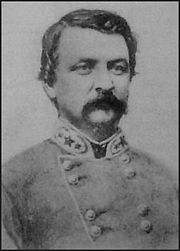 |
Major, James Patrick James Patrick Major James Patrick Major was a career U.S. Army officer and a Confederate brigadier general during the American Civil War.-US Cavalry service:... |
Brigadier General | Born May 14, 1836, Fayette, Missouri. USMA, 1856. Staff of Maj. Gen. Van Dorn, Maj. Gen. Twiggs. Missouri State Guard lieutenant colonel at Battle of Wilson's Creek. Acting chief of artillery for Van Dorn at Vicksburg, 1862. Brigadier general, July 21, 1863. Fought in Red River Campaign, Battles of Mansfield, Pleasant Hill. Cavalry brigade commander under Maj. Gen. John A. Wharton. In France after war, then planter in Louisiana and Texas. Died May 7, 1877, Austin, Texas. | ||
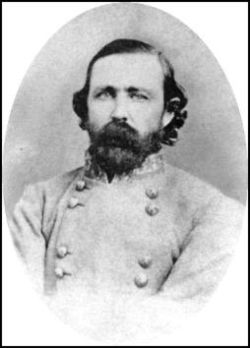 |
Maney, George Earl George Maney George Earl Maney was an American soldier, politician, railroad executive and diplomat. He was a general in the Confederate States Army during the American Civil War and a postbellum U.S... |
Brigadier General | Born August 24, 1826, Franklin, Tennessee. University of Nashville, 1845. Mexican-American War veteran. Lawyer. Captain, 11th Tennessee Infantry. Colonel, 1st Tennessee Infantry, May 1861. Fought in Cheat River Campaign, Stonewall Jackson's Romney Campaign, then with Army of Tennessee at Shiloh. Brigadier general, April 16, 1862. Battles: Perryville, Murfreesboro (Stones River), Chickamauga, Chattanooga, Atlanta Campaign. Temporary command of Cheatham's division, but relieved of command, August 31, 1864. Record states paroled at Greensboro, North Carolina, May 1, 1865. Post-war president of Tennessee & Pacific Railroad. Diplomat in Columbia, Bolivia, Paraguay, Uruguay, 1881–1894. Died February 9, 1901, Washington, D.C. | ||
 |
Manigault, Arthur Middleton Arthur Middleton Manigault -External links:... |
Brigadier General | Born October 26, 1824, Charleston, South Carolina. Commission business. Mexican-American War veteran. Captain of militia company, supervised construction of Charleston harbor batteries, aide to Gen. Beauregard during attack on Fort Sumter. Colonel, 10th South Carolina Infantry. Commanded first military district of South Carolina. Army of Tennessee after Shiloh; fought in battles from Second Battle of Corinth to Franklin. Brigadier general, April 26, 1863. Severe head wound at Franklin, incapacitated. Post-war rice planter. Adjutant and inspector general of South Carolina, 1880–1886. Died August 17, 1886, South Island, Georgetown County, South Carolina. | ||
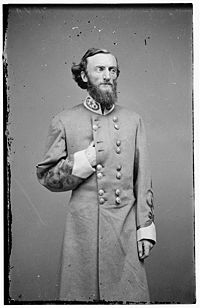 |
Marmaduke, John Sappington John S. Marmaduke John Sappington Marmaduke was a career military man and a West Point graduate. He is known for his service as a Confederate Major general during the American Civil War... |
Major General | Born March 14, 1833, Arrow Rock, Missouri. Studied at Harvard, Yale; USMA, 1857. Colonel of Missouri militia, lieutenant colonel of 1st Arkansas Battalion, colonel of 3rd Confederate Infantry, essentially a state based unit. Brigadier general, November 15, 1862. Raided Missouri twice and attacked Helena, Arkansas in 1863. Defense of Little Rock under Major General Stirling Price. Killed General L. M. Walker in a duel. Fought in Red River Campaign, Price's Missouri Raid. Captured at Mine Creek, Kansas, October 25, 1864. Appointed major general, March 18, 1865, the last such Confederate major general appointment, although a prisoner of war. Post-war businessman, editor of agricultural journal, railway commissioner and Governor of Missouri, 1884–1887. Died December 28, 1887, Jefferson City, Missouri. | ||
 |
Marshall, Humphrey Humphrey Marshall (general) Humphrey Marshall was a four-term antebellum United States Congressman and a brigadier general in the Confederate States Army and a Confederate Congressman during the American Civil War.-Early life and career:... |
Brigadier General | Born January 13, 1812, Frankfort, Kentucky. Nephew of abolitionist James G. Birney James G. Birney James Gillespie Birney was an abolitionist, politician and jurist born in Danville, Kentucky. From 1816 to 1818, he served in the Kentucky House of Representatives... . USMA, 1832, resigned 1833. Mexican-American War veteran. U.S. Congressman, 1849–1853; 1855–1859. U.S. minister to China, 1854. Tried to maintain border state neutrality. Brigadier general, October 30, 1861. Minor victory at Princeton, West Virginia. Resigned, June 16, 1862 but reappointed four days later; no record of further confirmation. In Gen. Bragg's Kentucky campaign. Resigned June 17, 1863. Lawyer at Richmond, Virginia; elected to Second Confederate Congress (from Kentucky). Went to Texas at end of war; returned to Louisville to practice law in 1866. Died March 28, 1872, Louisville, Kentucky; buried Frankfort, Kentucky. |
||
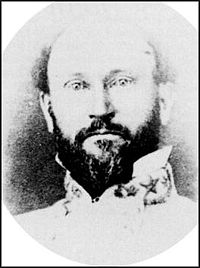 |
Martin, James Green "One Wing" James Green Martin James Green Martin was a brigadier general in the Confederate States Army during the American Civil War.-Early life:... |
Brigadier General | Born February 14, 1819, Elizabeth City, North Carolina. USMA, 1840. Mexican-American War veteran, lost right arm. Adjutant general of North Carolina state troops. Major general of militia in charge of defense of North Carolina, September 1861. In first year of war, North Carolina provided most, best equipped Confederate soldiers. Brigadier general, May 15, 1862, resigned July 25, 1862, reappointed August 11, 1862 and confirmed as of first date appointed. In command of District of North Carolina. Fought at Siege of Petersburg. Health broke and put in command of District of Western North Carolina. Lawyer at Asheville, North Carolina, until death there, October 4, 1878. | ||
| Martin, William T. William T. Martin William Thompson Martin was an American lawyer and politician who became a Confederate States Army general of cavalry during the American Civil War.-Biography:... |
Major General | Born March 25, 1823, Glasgow, Kentucky. Centre College graduate. Moved to Natchez, Mississippi, 1842. Lawyer, district attorney. Became colonel of Jeff Davis Legion. Commanded rear third of Jeb Stuart's cavalry force in the ride around McClellan. Fought in Seven Days Battles, Battle of Antietam. Brigadier general, December 2, 1862. Took part in Tullahoma campaign, Battle of Chickamauga. With Longstreet at Knoxville. Major general, November 10, 1863. Led a division under Wheeler in Atlanta campaign. Command of District of Northwest Mississippi at end of war. Post-war Mississippi state senator for 12 years. University trustee. President of Natchez, Jackson & Columbus Railroad. Died March 16, 1910. | |||
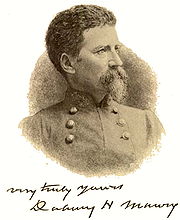 |
Maury, Dabney Herndon "Little Dab", "Puss-in-Boots" |
Major General | Born May 21, 1822, Fredericksburg, Virginia. USMA, 1846 after graduating from University of Virginia in 1842. Mexican-American War veteran. Colonel and chief of staff to Van Dorn. Fought at Battle of Pea Ridge. Brigadier general, to rank from March 12, 1862. Battles of Iuka, Second Corinth. Major general, November 4, 1862. Brief service at Vicksburg and in East Tennessee. Then in command at Mobile, Alabama until the end of the war. Founder of Southern Historical Society in 1868. Executive committee of National Guard Association. Minister to Colombia for 4 years. Died January 11, 1900 at home of son in Peoria, Illinois; buried Fredericksburg, Virginia. | ||
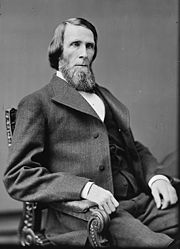 |
Maxey, Samuel Bell Samuel B. Maxey Samuel Bell Maxey was an American soldier, lawyer, and politician from Paris, Texas, United States. He was a Major General for the Confederacy in the Civil War and later represented Texas in the U.S. Senate.-Early life:... |
Brigadier General | Born March 30, 1825, Tompkinsville, Kentucky. USMA, 1846. Mexican-American War veteran. Resigned in 1849 to study law; moved to Texas with attorney father in 1857. Texas state senator. Colonel, 9th Texas Infantry. Brigadier general, March 4, 1862. Fought in East Tennessee, at Port Hudson, in Vicksburg campaign under Gen. Joseph E. Johnston. In command of Indian Territory, December 1863. Fought in Red River Campaign. Assigned to duty as major general by General Edmund Kirby Smith on April 18, 1864, but not subsequently appointed to that rank by President Jefferson Davis; nonetheless shown as general by Wright (U.S. War Dept.), Warner. Post-war lawyer, declined appointment as judge. United States Senator, 12 years, defeated for re-election in 1887. Died August 16, 1895 Eureka Springs, Arkansas, buried Paris, Texas. | ||
 |
McCausland, John "Tiger John" John McCausland John McCausland, Jr. was a brigadier general in the Confederate States Army, famous for the ransom of Hagerstown, Maryland, and the razing of Chambersburg, Pennsylvania, during the American Civil War.... |
Brigadier General | Born September 13, 1836, St. Louis, Missouri. VMI, 1857, University of Virginia, 1858. Asst. professor of mathematics at VMI after graduation from Virginia. Colonel, 36th Virginia Infantry. In West Virginia Campaign. Escaped with command from Fort Donelson before surrender. Fought in Virginia. In 1864, assumed command at Cloyd's Mountain after Brig. Gen. Albert Jenkins's death. Brigadier general, May 16, 1864. Fought in Valley Campaigns of 1864. Burned Chambersburg, Pennsylvania on orders of Lt. Gen. Early in retaliation of Union Army destruction of property in Shenandoah Valley. Fought at Petersburg, Five Forks. Cut way out from Appomattox before surrender. Paroled at Charleston, West Virginia. In Europe for 2 years. Acquired 6,000 acres of land in Mason County, West Virginia and lived there for almost 60 years. Next to last surviving Confederate general. Died January 22, 1927, aged 91, at farm near Henderson, West Virginia. | ||
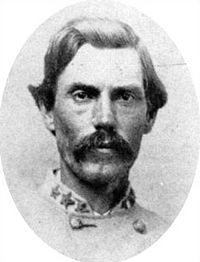 |
McComb, William William McComb William McComb was a Confederate brigadier general born in Pennsylvania, but is best associated with Tennessee.-Early life:... |
Brigadier General | Born November 21, 1828, Mercer County, Pennsylvania. One account gives birth year as 1832. Manufacturing interests in Clarksville, Tennessee starting in 1854. Private, 14th Tennessee Infantry, 2d lieutenant, May 1861, major, 1862, lieutenant colonel after Battle of Cedar Mountain, colonel after Battle of Second Bull Run (Second Manassas). Fought at Cheat Mountain; campaigns of Army of Northern Virginia. Severely wounded at Antietam (Sharpsburg) and Chancellorsville. Not at Gettysburg. Fought in Overland campaign, Siege of Petersburg. Brigadier general, January 20, 1865. Paroled at Appomattox Court House. Resided in Alabama, Mississippi. Moved to Louisa County, Virginia in 1869. Farmer. Died July 21, 1918 near Gordonsville, Virginia. | ||
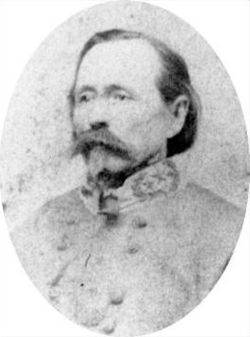 |
McCown, John P. John P. McCown John Porter McCown was a career officer in the United States Army, fighting in the Mexican–American War and in the Seminole Wars. He also served as a general in the Confederate Army during the American Civil War.... |
Major General | Born August 19, 1815, Sevierville, Tennessee. USMA, 1840. Mexican-American War veteran. Colonel of Tennessee Artillery Corps. Brigadier general, October 12, 1861; major general, March 10, 1862. Battles of Belmont, New Madrid, Fort Pillow. Temporary command of Army of the West; command in East Tennessee. Battle of Murfreesboro (Stones River). Bragg preferred charges against him for disobedience of orders and he served out the war without significant command. Defended Catawba River crossing in April 1865 with one artillery piece and 300 men against a division of Union cavalry. Post-war teacher, farmer at Magnolia, Arkansas. Died January 22, 1879 at Masonic Lodge meeting at Helena, Arkansas. | ||
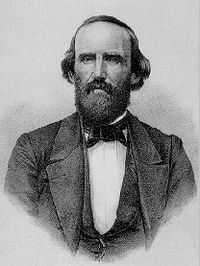 |
McCulloch, Ben | Brigadier General | Born November 11, 1861, Rutherford County, Tennessee. Elder brother of General Henry E. McCulloch. Battle of San Jacinto. Mexican-American War veteran. 49er. U.S. marshal in Texas for 6 years. Received surrender of General Twiggs at San Antonio. Brigadier general, May 11, 1861, in command in Arkansas. Victorious at Battle of Wilson's Creek. Killed in action at the Battle of Pea Ridge (Elkhorn Tavern), March 7, 1862, while directing the right wing of the army, clothed in a black velvet suit because he refused to wear a uniform. Second ranking brigadier general at time of death. Buried Austin, Texas. | ||
 |
McCulloch, Henry Eustace Henry Eustace McCulloch Henry Eustace McCulloch was a soldier in the Texas Revolution, a Texas Ranger, and a brigadier general in the army of the Confederate States during the American Civil War.-Early life:... |
Brigadier General | Born December 6, 1816, Rutherford County, Tennessee. Younger brother of General Ben McCulloch. Sheriff of Guadalupe County, Texas, 1843. Mexican-American War veteran. State legislator, U.S. marshal. Colonel 1st Texas Mounted Riflemen. Brigadier general, March 14, 1862. Served almost entirely within Texas except for unsuccessful campaign to relieve Vicksburg and unsuccessful storming of Union fortifications at Milliken's Bend. Post-war farmer in Guadelupe County, Texas. Died March 12, 1895, Rockport, Texas. | ||
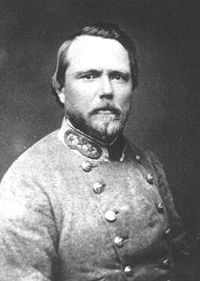 |
McGowan, Samuel Samuel McGowan (general) Samuel McGowan was a general from South Carolina in the Confederate States Army during the American Civil War. He commanded a brigade in A.P. Hill's famous "Light Division" and was wounded several times... |
Brigadier General | Born October 9, 1819, Laurens District, South Carolina. South Carolina College, 1841. Lawyer. Mexican-American War veteran. State legislator, 13 years. Major general of militia, commanded brigade at Fort Sumter. Colonel, 14th South Carolina Infantry in 1862. Brigadier general, January 17, 1863. Wounded four times. Fought in all Army of Northern Virginia battles except when recovering from wounds. Refused seat in Congress after the war. State legislator, 1878. Associate justice of South Carolina Supreme Court, 1879–1893. Died August 9, 1897, Abbeville, South Carolina. | ||
| McIntosh, James M. James M. McIntosh James McQueen McIntosh was a career American soldier who served as a brigadier general in the Confederate Army during the Civil War... |
Brigadier General | Born 1828, Fort Brooke (now Tampa), Florida. Son of Colonel James S. McIntosh, USA, who was mortally wounded at Battle of Molino Del Ray in Mexican-American War. Brother of Union Brevet Major General John B. McIntosh, graduate of U.S. Naval Academy. USMA, 1849, last in class. Colonel 2d Arkansas Mounted Rifles. Brigadier general, January 24, 1862. Killed at the Battle of Pea Ridge (Elkhorn Tavern), March 7, 1862. | |||
| McLaws, Lafayette Lafayette McLaws Lafayette McLaws was a United States Army officer and a Confederate general in the American Civil War.-Early life:... |
Major General | Born, January 15, 1821, Augusta, Georgia. USMA, 1842. Mexican-American War veteran. Colonel, 10th Georgia Infantry Regiment. Brigadier general, September 25, 1861; major general May 23, 1862. Peninsula campaign. Relieved by Longstreet because of failure of assault at Fort Sanders in Knoxville campaign. Restored to command by President Davis. Assigned to command in Georgia and under Joseph E. Johnston. Post-war insurance business, collector of internal revenue, postmaster. Died July 24, 1897, Savannah, Georgia. | |||
| McNair, Evander Evander McNair Evander McNair was a brigadier general in the Confederate States Army during the American Civil War.-Biography:... |
Brigadier General | Born April 15, 1820, Richmond County, North Carolina; family moved to Mississippi in 1821. Merchant. Mexican-American War veteran. Moved to Washington, Arkansas, 1856. Recruited and elected colonel of 4th Arkansas Infantry. Fought at Wilson's Creek, Pea Ridge (Elkhorn Tavern), Richmond, Kentucky. Brigadier general, November 4, 1862. Fought at Murfreesboro (Stones River), with Gen. Joseph E. Johnston's forces near Vicksburg. Wounded at Chickamauga. With Price in Missouri Raid, 1864. Post-war resident of New Orleans, Louisiana, Magnolia, Mississippi and Hattiesburg, Mississippi. Died November 13, 1902, Hattiesburg, Mississippi. | |||
| McRae, Dandridge Dandridge McRae Dandridge McRae was a lawyer, court official, and inspector general of Arkansas, as well as a brigadier general in the Confederate States Army during the American Civil War... |
Brigadier General | Born October 10, 1829, Baldwin County, Alabama. South Carolina College, 1849. Lawyer and 6-year court clerk at Searcy, Arkansas. Inspector general of state on staff of Governor Henry Massey Rector Henry Massey Rector Henry Massey Rector was the sixth Governor of the state of Arkansas.Henry Massey Rector was born near Louisville, Kentucky. Rector was educated by his mother and attended one year of school at Louisville. He moved to Arkansas in 1835. Rector served as U.S... , 1861. Major, 3rd Battalion Arkansas Infantry. Colonel, 21st Arkansas Infantry. Fought at Wilson's Creek, Pea Ridge (Elkhorn Tavern). Brigadier general, November 5, 1862. Fought in effort to capture Helena, Arkansas to relieve Vicksburg. Fought in Red River Campaign (Camden Expedition) at Battles of Marks Mills, Jenkins' Ferry. Resigned commission in late 1864 and returned to Searcy to practice law. Deputy Secretary of State, 1881. Promoted commerce of the state. Died April 23, 1899, Searcy, Arkansas. |
|||
 |
Mercer, Hugh Weedon | Brigadier General | Born November 27, 1807, Fredericksburg, Virginia. Grandson of Revolutionary War General Hugh Mercer Hugh Mercer Hugh Mercer was a soldier and physician. He initially served with British forces during the Seven Years War but later became a brigadier general in the Continental Army and a close friend to George Washington... . USMA, 1828. Resigned April 30, 1835; settled at Savannah, Georgia, cashier of Planters' Bank, 1841–1861. Colonel, 1st Georgia Volunteers. Brigadier general, October 29, 1861. Commanded at Savannah; fought in Atlanta Campaign. Accompanied Lt. Gen. Hardee to Savannah after Battle of Jonesboro due to ill health and had no more field duty. Returned to banking after the war. Moved to Baltimore in 1869, commission merchant. In declining health, spent last 5 years of life in Baden-Baden, Germany, where he died June 9, 1877. |
||
| Miller, William William Miller (soldier) William Miller was an American soldier, attorney, timberman, and politician. He served as a general in the Confederate States Army during the American Civil War... |
Brigadier General | Born August 3, 1820, Ithaca, New York; family soon moved to Louisiana. Louisiana College. Mexican-American War veteran. Moved to Pensacola, Florida, operated a saw mill. Commanded battalion of 6 companies as major. Colonel, 1st Florida Infantry after Shiloh. Fought in Kentucky campaign; seriously wounded at Murfreesboro (Stones River). Commander of conscripts for State of Florida. Brigadier general, August 2, 1864; in command of Florida reserve forces. Commanded District of Florida. Post-war: lumber business, one term in lower house of Florida legislature, two terms in Florida senate. Died August 8, 1809, Point Washington, Florida. | |||
| Moody, Young Marshall | Brigadier General | Born June 23, 1822, Chesterfield, Virginia. Moved to Marengo County, Alabama at age 20. Teacher, merchant, clerk of circuit court, 1856–1861. Captain, 11th Alabama Infantry. Helped raise 43rd Alabama Infantry, elected lieutenant colonel, then colonel in November 1862. Fought in Kentucky campaign, at Chickamauga, in Knoxville campaign. At Siege of Petersburg under Gen. Beauregard. Severely wounded at Battle of Drewry's Bluff. In brigade command after Brig. Gen. Gracie's death, December 2, 1864. Brigadier general, March 4, 1865. Paroled at Appomattox Court House. Went to Mobile, Alabama to engage in business. Died September 18, 1866 of yellow fever while in New Orleans, Louisiana on business. | |||
| Moore, John Creed John Creed Moore John Creed Moore was an United States Army officer and a graduate of West Point. He is known for being a Confederate brigadier general during the Civil War and his works in the educational system in Texas.... |
Brigadier General | Born February 28, 1824, Hawkins County, Tennessee. Emory and Henry College; USMA, 1849. Seminole Wars. Resigned 1855. Professor at Shelby College, Kentucky in 1861. Organized and elected colonel of 2d Texas Infantry at Galveston, Texas. Commended by Maj. Gen. Withers for Battle of Shiloh. Brigadier general, May 26, 1862. Fought at Second Corinth, Vicksburg. Captured and exchanged; then sent to help with Mobile, Alabama defenses. In Command of Eastern and Western Districts of Department of the Gulf, December 10, 1863. Resigned February 3, 1864. Post-war: taught school in Texas and wrote many magazine and journal articles. Died December 31, 1910, Osage, Texas. | |||
| Moore, Patrick T. | Brigadier General | Born September 22, 1821, Galway, Ireland; family went to Canada, 1835. Moved to Richmond, Virginia in 1850. Merchant and militia captain. Colonel, 1st Virginia Infantry. Fought at First Bull Run (First Manassas), severely wounded and incapacitated for field duty. Volunteer aide to Gen. Joseph E. Johnston at Seven Pines and to Lt. Gen. Longstreet at Seven Days Battles. Court martial duty. Helped organized Virginia reserve forces in 1864. Brigadier general, September 20, 1864. At end of war commanded brigade of Lt. Gen. Ewell's Richmond local defense troops, but no record he accompanied them during Appomattox campaign. Paroled at Manchester, Virginia, April 30, 1865. Post-war insurance business at Richmond. Died February 19, 1883, Richmond, Virginia. | |||
| Morgan, John Hunt "Thunderbolt" John Hunt Morgan John Hunt Morgan was a Confederate general and cavalry officer in the American Civil War.Morgan is best known for Morgan's Raid when, in 1863, he and his men rode over 1,000 miles covering a region from Tennessee, up through Kentucky, into Indiana and on to southern Ohio... |
Brigadier General | Born June 1, 1825, Huntsville, Alabama. Two sisters marred Lt. Gen. A. P. Hill and Brig. Gen. Basil Duke. Transylvania College. Mexican-American War veteran. Manufacturer hemp and engaged in general merchandise business at Lexington, Kentucky. Militia captain. Joined forces with Brig. Gen. Buckner at start of war. Colonel, 2nd Kentucky Cavalry, April 2, 1862. Brigadier general, December 11, 1862. Conducted a series of raids in Tennessee, Kentucky, Indiana and Ohio; received Thanks of Confederate Congress. Raided into Ohio in 1863, captured near New Lisbon, Ohio, imprisoned in Ohio State Penitentiary with several officers. Escaped, made way south, in command of Department of Southwestern Virginia, April 1864. Killed in garden of house where he had been sleeping September 3, 1864, at Greeneville, Tennessee while on way to Knoxville to attack Union forces there. | |||
| Morgan, John Tyler John Tyler Morgan John Tyler Morgan was a general in the Confederate States Army during the American Civil War, and a six-term U.S. senator from the state of Alabama after the war. He was a strong supporter of states rights and racial segregation through the Reconstruction era. He was an expansionist, arguing for... |
Brigadier General | Born June 20, 1823, Athens, Tennessee; family moved at age 9 to Calhoun County, Alabama. Studied law at Tuskegee and admitted to bar in 1845. Moved to Selma, Alabama, 1855. Enlisted at private, soon major and lieutenant colonel of 5th Alabama Infantry. Resigned in 1862 and recruited and elected colonel of 51st Alabama Partisan Rangers. Declined first offer to command Rodes's old brigade. Brigadier general, November 16, 1863. Fought at First Bull Run (First Manassas), Murfreesboro (Stones River), Chickamauga and in harassment of Sherman's march across Georgia. At end of the war he was trying to recruit black troops in Mississippi. Post-war lawyer, U.S. Senator, 1876–1907. Made long effort for building a canal in Central America to pass from the Atlantic Ocean to the Pacific Ocean. Died June 11, 1907, Washington, D.C., buried at Selma, Alabama. | |||
| Mouton, Jean J.A.A. Alfred Mouton Jean-Jacques-Alfred-Alexandre "Alfred" Mouton was a Confederate general in the American Civil War. He was born in Opelousas, Louisiana, and spent most of his life in Lafayette. Beloved by those under his command, Mouton was a strict drillmaster and disciplinarian who simultaneously freely... |
Brigadier General | Born February 18, 1829, Opelousas, Louisiana. Son of ex-Governor and U.S. Senator Alexander Mouton Alexander Mouton Alexandre Mouton was a United States Senator and the 11th Governor of Louisiana.-Early life:He was born in Attakapas district into a wealthy plantation owning Acadian family. He pursued classical studies and graduated from Georgetown College... . Learned English as young man. USMA, 1850. Resigned soon after graduation to become railroad construction engineer and brigadier general of state militia. Colonel, 18th Louisiana Infantry, October 1861. Fought at Battle of Shiloh, dangerously wounded. Brigadier general, April 16, 1862. Led a brigade under Lt. Gen. Richard Taylor. In command of his brigade and that of Brig. Gen. de Polignac at Battle of Mansfield in the opening of the Red River campaign, killed in action leading a charge. Buried at Lafayette, Louisiana. |
N
| Image | Name | Rank | Nelson, Allison Allison Nelson Allison Nelson was the ninth mayor of Atlanta, Georgia, as well as a brigadier general in the Confederate army during the American Civil War.... | Brigadier General | Born March 11, 1822, Fulton County, Georgia. Lawyer. State legislator, 1848–1849; 1859–1860. Mexican-American War veteran. Supported independence for Cuba, brigadier general under General Narcisco Lopez. In Kansas during the "border troubles". Fought Indians in Bosque County, Texas. Raised and elected colonel of 10th Texas Infantry. In minor engagement at DeVall's Bluff on the White River. Brigadier general, September 12, 1862. Assigned to command two brigades under then Maj. Gen. Holmes the day after falling ill of camp fever. Died October 7, 1862, Little Rock, Arkansas. |
|---|---|---|---|---|---|
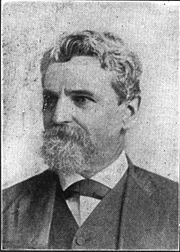 |
Nicholls, Francis Redding Tillou | Brigadier General | Born August 20, 1834, Donaldsville, Louisiana. USMA, 1855. Resigned the next year to study law at University of Louisiana (Tulane University). Practicing law at Napoleonville, Louisiana. Started war as captain but soon elected lieutenant colonel, 8th Louisiana Infantry. Fought at First Bull Run (First Manassas) and in Jackson's Valley Campaign of 1862. Wounded at Winchester and lost left arm. Brigadier general October 14, 1862. Left foot torn off at Chancellorsville. Commanded at Lynchburg, Virginia for a time, then in charge of volunteer and conscript bureau in Trans-Mississippi Department. Elected Governor of Louisiana, 1876, 1888. Suppressed Louisiana Lottery in second term. Associate justice or chief justice of Louisiana Supreme Court from 1892 to 1911. Died January 4, 1912, buried at Thibodeaux, Louisiana. | ||
| Northrop, Lucius B. Lucius B. Northrop Lucius Bellinger Northrop , was the Commissary-General of the armed forces of the Confederate States of America... |
Brigadier General | Born September 8, 1811, Charleston, South Carolina. USMA, 1831. Severely wounded in Seminole Wars, 1839, and put on sick furlough. Studied and practiced medicine. Appointed colonel and commissary general of the Confederacy soon after his resignation from the U.S. Army on January 8, 1861. Responsibility for providing food for soldiers and Union prisoners. Appointed brigadier general to rank from November 26, 1864 but nomination not forwarded to Confederate Senate; nonetheless shown on full general list by Wright (U.S. War Dept.), Warner. Relieved February 15, 1865. Arrested June 30, 1865 on suspicion of deliberately starving Union prisoners. Charges dropped in October. Post-war farmer near Charlottesville, Virginia until 1890 when paralyzed. Died February 9, 1894 at Confederate Home, Pikesville, Maryland. |
O
| Image | Name | Rank | LaGrange College LaGrange College LaGrange College is the oldest private college in the U.S. state of Georgia. Affiliated with the United Methodist Church, it is located in LaGrange, Georgia, with an enrollment of about 1,000 students. The student-to-faculty ratio is 11:1... graduate, 1836; lawyer. Wounded at the Battle of Seven Pines and at the Battle of Boonsboro Battle of Boonsboro The Battle of Boonsboro took place on July 8, 1863, in Washington County, Maryland, as part of the Retreat from Gettysburg during the Gettysburg Campaign of the American Civil War.... in the Antietam Campaign. Commanded brigade at Battle of Chancellorsville and fought at the Battle of Gettysburg. Gen. Robert E. Lee returned commission for O'Neal and it was canceled. Fought in Atlanta Campaign; was arresting deserters in Alabama at end of the war. Post-war lawyer, Democratic Party leader. Elected Governor of Alabama in 1882 and 1884. Died November 7, 1890, Florence, Alabama. |
|---|
P
| Image | Name | Rank | Page, Richard Lucian Richard Lucian Page Richard Lucian Page was a United States Navy officer who joined the Confederate States Navy and later became a brigadier general in the Confederate States Army during the American Civil War. He was a cousin of Confederate General Robert E. Lee. Another cousin was poet Thomas Nelson... | Brigadier General | Born December 20, 1807, Clarke County, Virginia. First cousin of Robert E. Lee. Midshipman in U.S. Navy, 1824. Commander, 1855. Sea duty throughout the world, three tours of ordnance duty, executive officer of Norfolk Navy Yard. Resigned at outset of war and designed and supervised construction of works on James River and Nansemond River. Assigned ordnance officer at Norfolk. Promoted to captain and established ordnance and naval construction bureau at Charlotte, North Carolina. Took part in naval battle of Port Royal, South Carolina. Brigadier general, March 1, 1864. In command of outer defenses of Mobile Bay. Compelled to surrender after Union sea and land attack of August 1864. Paroled from Fort Delaware Fort Delaware Fort Delaware is a harbor defense facility, designed by Chief Engineer Joseph Gilbert Totten, and located on Pea Patch Island in the Delaware River. During the American Civil War, the Union used Fort Delaware as a prison for Confederate prisoners of war, political prisoners, federal convicts, and... , July 24, 1865. Post-war: at Norfolk, Virginia, superintendent of city schools, 1975–1883. Died August 9, 1901, Blue Ridge Summit, Pennsylvania, buried Norfolk, Virginia. |
|---|---|---|---|---|---|
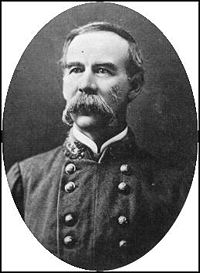 |
Palmer, Joseph B. Joseph B. Palmer Joseph Benjamin Palmer was an American lawyer, legislator, and soldier. He served as a Confederate general in the American Civil War, during which he was wounded four times. After the conflict he resumed his law practice in Tennessee.-Early life and career:Joseph B. Palmer was born in 1825 in... |
Brigadier General | Born November 1, 1825, Rutherford County, Tennessee. Union University, Murfreesboro, 1848. Lawyer, state legislator, 1849-1853, mayor of Murfreesboro, 1855-1859. Colonel, 18th Tennessee Infantry. Captured at Fort Donelson, exchanged. Wounded three times at Battle of Murfreesboro (Stones River). Severely wounded at Chickamauga, returned for Atlanta campaign. Wounded at Jonesboro. Brigadier general, November 15, 1864. In Franklin-Nashville campaign; Palmer's brigade was in rear guard after Nashville. Commanded Tennessee regiments in Carolinas campaign. Fought at Bentonville, paroled at Greensboro, May 1, 1865. Post-war: resumed law practice. Died November 4, 1890, Murfreesboro, Tennessee. | ||
 |
Parsons, Mosby M. Mosby Parsons Mosby Monroe Parsons was a United States officer in the Mexican-American War and brigadier general of the Confederate States Army during the American Civil War.-Early life and career:... |
Brigadier General | Born May 21, 1822, Charlottesville, Virginia. Moved to Cole County, Missouri as a young man. Lawyer, Mexican-American war veteran. Attorney general of Tennessee, 1853-1857. Commanded pro-Confederate 6th Division of Missouri State Guard until commissioned brigadier general in Confederate States Army, November 5, 1862. Found at Carthage, Springfield, Pea Ridge (Elkhorn Tavern) and in Arkansas campaigns. Fought in the Red River campaign and Camden expedition, including the battles of Pleasant Hill, Marks' MIlls and Jenkins' Ferry. Assigned to duty as major general by Gen. E. Kirby Smith, April 30, 1864 but never officially appointed. With Maj. Gen. Sterling Price in 1864 raid into Missouri. Went to Mexico at the end of the war. Apparently was killed by Republican irregulars while fighting for Imperialist forces, probably on October 15, 1865 in the vicinity of China, Nuevo Leon state. | ||
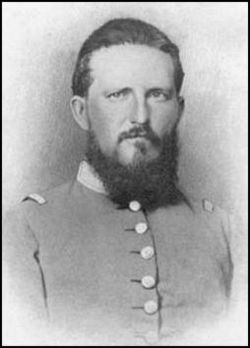 |
Paxton, Elisha F. "Bull" Elisha F. Paxton Elisha Franklin Paxton was an American lawyer and soldier who served as a general in the Confederate States Army during the American Civil War. He died in combat leading the famed Stonewall Brigade during the Battle of Chancellorsville.-Early life and career:Paxton was born in Rockbridge County,... |
Brigadier General | Born March 4, 1828, Rockbridge County, Virginia. Washington College, 1845, Yale University, 1847, then studied law at University of Virginia. Practiced law in Ohio, returned to Lexington, Virginia in 1854. Ceased practicing law in 1859 due to failing eyesight. Lieutenant of Rockbridge Rifles, part of 27th Virginia Infantry. Fought at First Bull Run (First Manassas), in Jackson's Valley campaign of 1862 as a major on Stonewall Jackson's staff. Promoted to brigadier general and assigned to command the Stonewall Brigade, September 1, 1862. Fought with command at Fredericksburg, Chancellorsville. Killed at Chancellorsville, May 3, 1863, when struck by a Minie ball Minié ball The Minié ball is a type of muzzle-loading spin-stabilising rifle bullet named after its co-developer, Claude-Étienne Minié, inventor of the Minié rifle... while in the front line; later buried in Lexington, Virginia. |
||
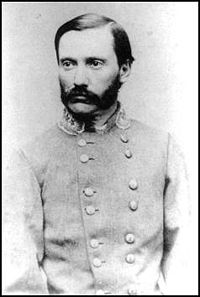 |
Payne, William H.F. William H. F. Payne William Henry Fitzhugh Payne was a general in the Confederate States Army during the American Civil War.-Early life:... |
Brigadier General | Born January 27, 1830, Fauquier County, Virginia. VMI, 1848, University of Virginia law school, 1850. Commonwealth attorney, 1856, at Warrenton, Virginia. Enlisted as a private. Wounded and captured at Williamsburg in May 1862. Wounded and captured during Gettysburg campaign. Brigadier general, November 1, 1864. Wounded at Five Forks. Captured near Warrenton on night of President Lincoln's assassination. Released May 29, 1865. Post-war lawyer, one term in Virginia house of delegates, 1879. Moved to Washington and became general counsel of Southern Railway. Died March 29, 1904, Washington, D.C., buried in Warrenton, Virginia. | ||
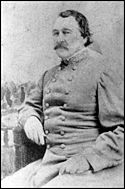 |
Peck, William R. William R. Peck William Raine Peck was a wealthy American plantation owner, politician, and soldier who served as a general in the Confederate Army during the American Civil War... |
Brigadier General | Born January 31, 1818, Jackson County, Tennessee. Moved to Louisiana in early 1840's; planter. Enlisted as a private on July 7, 1861 in 9th Louisiana Infantry, future Lt. Gen. Richard Taylor was the first colonel, Brig. Gen. Leroy Stafford was the second, Peck was the third, October 8, 1863. Fought in all the battles of Army of Northern Virginia from First Bull Run (First Manassas) until the last week of the war. Commanded brigade with rank of colonel in several actions including Battle of Monocacy Battle of Monocacy The Battle of Monocacy was fought on July 9, 1864, just outside Frederick, Maryland, as part of the Valley Campaigns of 1864, in the American Civil War. Confederate forces under Lt. Gen. Jubal A. Early defeated Union forces under Maj. Gen. Lew Wallace... . Brigadier general, February 18, 1865. Not at Appomattox, paroled at Vicksburg, June 6, 1865. He repeatedly placed himself in danger while in command in battle but was never wounded. Died January 22, 1871 at his plantation; buried in family cemetery at Jefferson City, Tennessee. |
||
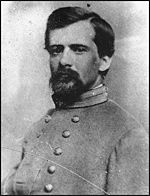 |
Pegram, John John Pegram (general) John Pegram was a career soldier from Virginia who served as an officer in the United States Army and then as a brigadier general in the Confederate Army during the American Civil War. He became the first former U.S... |
Brigadier General | Born January 24, 1832, Petersburg, Virginia. USMA, 1854. Lieutenant colonel, captured at Battle of Rich Mountain. Colonel, chief engineer, staffs of Generals Beauregard, Bragg. Brigadier general, November 7, 1862, cavalry. Battles of Murfreesboro (Stones River), Chickamauga. Transferred to Army of Northern Virginia, commanded infantry brigade at the Wilderness, where wounded. Valley Campaigns of 1864. Commanded Rodes's division after Rodes's death at Winchester but was not formally promoted to major general. Killed in action at Hatcher's Run, February 6, 1865. | ||
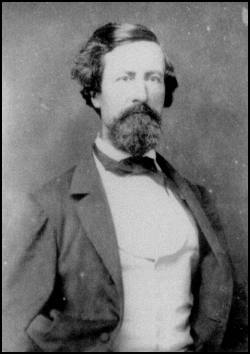 |
Pemberton, John Clifford John C. Pemberton John Clifford Pemberton , was a career United States Army officer who fought in the Seminole Wars and with distinction during the Mexican–American War. He also served as a Confederate general during the American Civil War, noted for his defeat and surrender in the critical Siege of Vicksburg in... |
Lieutenant General | Born August 10, 1814, Philadelphia, Pennsylvania. USMA, 1837. Mexican-American War veteran. Wife was from Norfolk, Virginia. Commander of Department of Georgia, South Carolina and Florida. Brigadier general, June 17, 1861. Major general, January 14, 1862. Lieutenant general, October 10, 1862. Assigned to command of Department of Mississippi and Louisiana and defense of Vicksburg. Surrendered Vicksburg on July 4, 1863. No further duty for his rank was found for him. He resigned in 1864 but was then appointed lieutenant colonel of artillery. Post-war lived on farm at Warrenton, Virginia. Returned to Pennsylvania later. Died July 13, 1881 at Penllyn, Pennsylvania. | ||
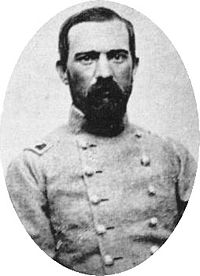 |
Pender, William Dorsey William Dorsey Pender William Dorsey Pender was one of the youngest, and most promising, generals fighting for the Confederacy in the American Civil War. He was mortally wounded at the Battle of Gettysburg.-Early life:... |
Major General | Born February 6, 1834, Edgecomb County, North Carolina. USMA, 1854. Colonel of 3rd (later 13th) North Carolina Volunteer Infantry Regiment. Fought at Battle of Seven Pines. Brigadier general, June 3, 1862. Fought in engagements from Seven Days Battles to Battle of Chancellorsville. Wounded three times. Major general, May 27, 1863. Division command at the Battle of Gettysburg, mortally wounded on the second day of that battle, died at Staunton, Virginia, July 18, 1863, after infection in leg and amputation on long retreat after battle. Buried at Tarboro, North Carolina Tarboro, North Carolina Tarboro is a city located in Edgecombe County, North Carolina. It is part of the Rocky Mount, North Carolina Metropolitan Statistical Area. As of 2010, the town had a total population of 13,121. It is the county seat of Edgecombe County. Tarboro is located in North Carolina's Inner Banks region... . |
||
| Pendleton, William N. William N. Pendleton William Nelson Pendleton was an American teacher, Episcopal priest, and soldier. He served as a Confederate general during the American Civil War, noted for his position as Gen. Robert E. Lee's chief of artillery for most of the conflict... |
Brigadier General | Born December 26, 1809, Richmond, Virginia. USMA, 1830. Resigned from U.S. Army, 1833. Teacher, Episcopal minister. Chief of Artillery of General Joseph E. Johnston. Brigadier general, March 26, 1862. Nominal chief of artillery of Army of Northern Virginia but mainly administrative work in last two years of war. Often preached to troops. Resumed rectorship in Lexington, Virginia after war. Died January 15, 1883, Lexington, Virginia. | |||
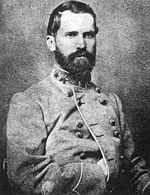 |
Perrin, Abner Monroe Abner Monroe Perrin Abner Monroe Perrin was a Confederate general in the Army of Northern Virginia during the American Civil War. He was killed at the Battle of Spotsylvania.-Early life:... |
Brigadier General | Born February 2, 1827, Edgefield District, South Carolina. Mexican-American War veteran. Lawyer, Columbia, South Carolina. Captain, 14th South Carolina Infantry. Fought in the Seven Days' Battles, at Cedar Mountain, Second Bull Run (Second Manassas), Harpers Ferry, Antietam (Sharpsburg, Fredericksburg. Colonel, February 20, 1863; led regiment, then brigade (after McGowan was wounded) at Chancellorsville. Led brigade at Gettysburg. Brigadier general, September 10, 1863. Fought at the Wilderness. Killed at the battle of Spotsylvania Court House, May 12, 1864, while leading his men to reinforce the Confederate line after Union forces took the Mule Shoe salient. Buried at Fredericksburg, Virginia. | ||
 |
Perry, Edward Aylesworth | Brigadier General | Born March 15, 1831, Richmond, Massachusetts Richmond, Massachusetts Richmond is a town in Berkshire County, Massachusetts, United States. It is part of the Pittsfield, Massachusetts Metropolitan Statistical Area. The population was 1,475 at the 2010 census.-History:... . Entered Yale, 1950, withdrew to study law at University of Alabama. Lawyer at Pensacola, Florida, 1857-1861. Captain, 2nd Florida Infantry. Colonel, May 1862. Severely wounded at Battle of Frayser's Farm during the Seven Days' Battles. Brigadier general, August 28, 1862. Led Florida brigade at Chancellorsville. Contracted typhoid fever. Returned for start of Overland campaign, severely wounded at Battle of the Wilderness. Upon return, assigned to reserve forces of Alabama. Post-war lawyer and opponent of carpetbag rule. Governor of Florida, 1884. Did not seek re-election. Died from a stroke, October 15, 1889, visiting Kerrville, Texas. Buried at Pensacola, Florida. |
||
| Perry, William F. | Brigadier General | Born March 12, 1823, Jackson County, Georgia; parents moved family to Alabama when he was 10 years old. Self-taught. Admitted to bar in 1854 but did not practice law. Twice elected as Alabama's first superintendent of public instruction. President of East Alabama Female College, 1858-1862. Enlisted as private in 44th Alabama Infantry; within a few weeks was elected major. Fought at Second Bull Run (Second Manassas) and Antietam (Sharpsburg), then colonel. Fought at Gettysburg, Chickamauga, the Wilderness and Spotsylvania Court House. After battle of Cold Harbor, led Law's brigade until surrender at Appomattox Court House. Brigadier general, February 21, 1865. Post-war planter in Alabama for 2 years. Moved to Kentucky and for many years was professor of English and philosophy at Ogden College, Bowling Green, Kentucky. Died December 18, 1901, Bowling Green, Kentucky. | |||
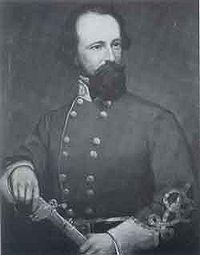 |
Pettigrew, James Johnston J. Johnston Pettigrew James Johnston Pettigrew was an author, lawyer, linguist, diplomat, and a Confederate general in the American Civil War... |
Brigadier General | Born July 4, 1828, Tyrrell County, North Carolina. University of North Carolina graduate, 1847, age 18. Two years as assistant professor at the United States Naval Observatory United States Naval Observatory The United States Naval Observatory is one of the oldest scientific agencies in the United States, with a primary mission to produce Positioning, Navigation, and Timing for the U.S. Navy and the U.S. Department of Defense... , Washington, D.C. Studied law, traveled abroad, practiced law in Charleston. South Carolina legislator. Served in Charleston Harbor at fall of Fort Sumter. Colonel, 12th South Carolina Infantry. Brigadier General, February 26, 1862. Fought in Peninsula Campaign; wounded and captured at Seven Pines. Exchanged in two months, defenses of Petersburg and North Carolina. Commanded Heth's division after Heth was wounded at Gettysburg. Led division against center of Union Army line on Cemetery Ridge at Gettysburg in charge on third day known as Pickett's Charge Pickett's Charge Pickett's Charge was an infantry assault ordered by Confederate Gen. Robert E. Lee against Maj. Gen. George G. Meade's Union positions on Cemetery Ridge on July 3, 1863, the last day of the Battle of Gettysburg during the American Civil War. Its futility was predicted by the charge's commander,... . Mortally wounded on July 14, 1863 at Falling Waters, Maryland while commanding rear guard of Army of Northern Virginia in retreat from Gettysburg. Died July 17, 1863. |
||
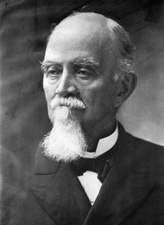 |
Pettus, Edmund Winston | Brigadier General | Born July 6, 1821, Limestone County, Alabama. Educated at the short-lived Clinton College Clinton College (Tennessee) Clinton College was a college in New Middleton, Smith County, Tennessee. The original Porter's Hill Academy was formed in 1830 and then reorganized as Clinton College in 1833-4. Its main teacher was Francis Haynes Gordon. The school had failed by February 1842.... , Smith County, Tennessee. Lawyer, 1842, moved to Gainesville, Alabama. Solicitor of district; judge of Alabama seventh circuit. Moved to Cahaba, Alabama, 1858. In 1861, sent as commissioner to Mississippi where his brother, John J. Pettus, was governor. Helped recruit 20th Alabama Infantry, elected major, then lieutenant colonel in October 1861. Captured at Vicksburg. Colonel after exchange. Brigadier general, September 18, 1863. Fought with Army of Tennessee from Chattanooga to Bentonville. Wounded in Carolinas campaign. Postwar lawyer and politician at Selma, Alabama. United States Senator, 1896-1907. Died July 27, 1907, Hot Springs, North Carolina. |
||
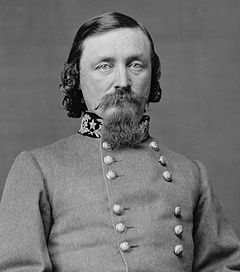 |
Pickett, George E. George Pickett George Edward Pickett was a career United States Army officer who became a general in the Confederate States Army during the American Civil War... |
Major General | Born January 28, 1825, Richmond, Virginia. USMA, 1846, last in class. Mexican-American War veteran. Defied British in 1859 in occupation of San Juan Island. Brigadier General, January 14, 1862. Peninsula Campaign; severely wounded at Battle of Gaines Mill. Major general, October 10, 1862. Battles of Fredericksburg, Suffolk. Advanced his division against center of Union line on Cemetery Ridge at Gettysburg on July 3, 1863, the third day of the battle, along with divisions led by Pettigrew and Trimble, under Longstreet, in action which became known as Pickett's Charge. Later commanded Department of Virginia and North Carolina. Defense of Petersburg. Defeated by Sheridan at Battle of Five Forks while away from front line for most of battle. Relieved of command after Battle of Sayler's Creek but remained with army until surrender at Appomattox three days later. Insurance agent at Norfolk, Virginia until death in 1875. | ||
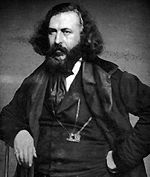 |
Pike, Albert Albert Pike Albert Pike was an attorney, Confederate officer, writer, and Freemason. Pike is the only Confederate military officer or figure to be honored with an outdoor statue in Washington, D.C... |
Brigadier General | Born December 29, 1809 in Boston, Massachusetts but was a prominent lawyer and land owner in Arkansas at outbreak of the war. Mexican-American War veteran. Brigadier general, August 15, 1861, responsible for recruiting Native American (Indian) troops. Pike was blamed for his Native American troops dubious conduct at Battle of Pea Ridge (Elkhorn Tavern). Resigned July 12, 1862, resignation accepted November 5, 1862. Indicted for treason at the end of the war but civil rights eventually restored. Lived in Memphis, moved to Washington. Writer of legal treatises, poems and other works, teacher, advocate of Freemasonry. Died April 2, 1891, Washington, D.C. | ||
| Pillow, Gideon J. | Brigadier General | Born June 8, 1806, Williamson County, Tennessee. University of Nashville graduate, 1827. Law partner of President James K. Polk James K. Polk James Knox Polk was the 11th President of the United States . Polk was born in Mecklenburg County, North Carolina. He later lived in and represented Tennessee. A Democrat, Polk served as the 17th Speaker of the House of Representatives and the 12th Governor of Tennessee... . Brigadier general of volunteers in Mexican-American War. Quarreled with General Scott but was upheld by Polk. Senior major general of Tennessee provisional army in 1861. Brigadier general, CSA, July 9, 1861. At Battle of Belmont. Second in command at Fort Donelson. Passed command to Brigadier General Simon Buckner after General John B. Floyd passed command to him. Escaped with Floyd before surrender. Relieved of duty and assigned to volunteer and conscript bureau in Tennessee. Commissary general of prisoners from February 1865 after death of General John Winder. Practiced law with former Tennessee governor Isham G. Harris after the war. Died October 8, 1878 near Helena, Arkansas. |
|||
 |
De Polignac, Camille A.J.M. Camille Armand Jules Marie, Prince de Polignac Camille Armand Jules Marie, Prince de Polignac was a French nobleman, scholar and soldier who joined the Confederate States Army at the outbreak of the American Civil War and became major general before the end of the war... |
Major General | Born February 16, 1832, Millemont, Seine-et-Oise, France. Son of the president of King Charles X's Council of Ministers. College of Stanislaus, Paris. French Army lieutenant, 1853-1859. Crimean War veteran. In Central America when war began. Lieutenant colonel, July 16, 1861, on staffs of Gen. Beauregard and Gen. Bragg. Brigadier general, January 10, 1863; major general, April 8, 1864. Served in Louisiana with Lt. Gen. Richard Taylor. Fought in Red River campaign battles, including Mansfield, Pleasant Hill. Ran blockade March 17, 1865 in order to urge Napoleon III to intervene on behalf of the Confederacy. War ended soon after he arrived in Spain. Led 1st French Division in Franco-Prussian War Franco-Prussian War The Franco-Prussian War or Franco-German War, often referred to in France as the 1870 War was a conflict between the Second French Empire and the Kingdom of Prussia. Prussia was aided by the North German Confederation, of which it was a member, and the South German states of Baden, Württemberg and... ; awarded the Legion of Honour. Studied mathematics and achieved a reputation in the field. Died November 15, 1913, Paris, France, last survivor of Confederate major generals. |
||
 |
Polk, Leonidas Leonidas Polk Leonidas Polk was a Confederate general in the American Civil War who was once a planter in Maury County, Tennessee, and a second cousin of President James K. Polk... |
Lieutenant General | Born April 10, 1806, Raleigh North Carolina. USMA, 1827. Uncle of Brigadier General Lucius E. Polk. Resigned from army almost immediately and became an Episcopal bishop. Appointed major general on June 25, 1861 and lieutenant general on October 10, 1862. Army of Tennessee corps commander at Shiloh, Perryville, Murfreesboro (Stones River), Chickamauga, opening of Atlanta campaign. Censured by General Bragg for dilatory tactics at Chickamauga. Killed by Union artillery shell at Pine Mountain, Georgia, near Marietta, Georgia, during the Atlanta campaign on June 14, 1864 while in the company of Generals Joseph E. Johnston and Hardee. First buried in Augusta, Georgia; remains later moved to New Orleans, Louisiana. | ||
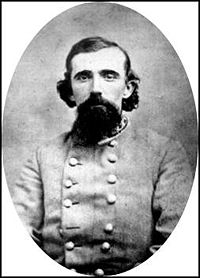 |
Polk, Lucius E. Lucius E. Polk -References:* Warner, Ezra J., Generals in Gray: Lives of the Confederate Commanders, Louisiana State University Press, 1959, ISBN 978-0-8071-0823-9.-External links:*... |
Brigadier General | Born July 10, 1833, Salisbury, North Carolina; at age 2, family moved to plantation near Columbia, Tennessee. Nephew of Lt. Gen. Leonidas Polk. University of Virginia, 1850-1851. Planter near Helena, Arkansas. Enlisted as a private. Promoted from junior second lieutenant to colonel of 15th Arkansas Infantry after battle of Shiloh. Brigadier general December 13, 1862, succeeded Maj. Gen. Patrick Cleburne in brigade command. Fought at Murfreesboro (Stones River), Chickamauga, Chattanooga, Atlanta campaign. Severely wounded for the fourth time at Battle of Kennesaw Mountain Battle of Kennesaw Mountain The Battle of Kennesaw Mountain was fought on June 27, 1864, during the Atlanta Campaign of the American Civil War. It was the most significant frontal assault launched by Union Maj. Gen. William T. Sherman against the Confederate Army of Tennessee under Gen. Joseph E... in June 1864. Retired from Army; returned to old home near Columbia, Tennessee. Delegate to Democratic National Convention in 1884. Elected to state senate in 1887. Two sons served in Spanish-American war Spanish-American War The Spanish–American War was a conflict in 1898 between Spain and the United States, effectively the result of American intervention in the ongoing Cuban War of Independence... ; one was later a U.S. Congressman from Pennsylvania. Died December 1, 1892, Columbia, Tennessee. |
||
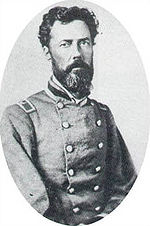 |
Posey, Carnot Carnot Posey Carnot Posey was a Mississippi planter and lawyer, and a Confederate general in the American Civil War. He was mortally wounded at the Battle of Bristoe Station, dying from infection.-Early life and family:... |
Brigadier General | Born August 5, 1818, Wilkinson County, Mississippi. College education at Jackson, Louisiana; University of Virginia law school. Planter for some years, then lawyer at Woodville, Mississippi. Mexican-American War veteran. President Buchanan appointed him U.S. District Attorney for Southern District of Mississippi. Captain of Wilkinson Rifles. Colonel, 16th Mississippi Infantry, June 1861. Fought at First Bull Run (First Manassas), Ball's Bluff (Leesburg), and in further campaigns of the Army of Northern Virginia. Brigadier general, November 1, 1863. Mortally wounded at Battle of Bristoe Station Battle of Bristoe Station The Battle of Bristoe Station was fought on October 14, 1863, at Bristoe Station, Virginia, between Union forces under Maj. Gen. Gouverneur K. Warren and Confederate forces under Lt. Gen. A.P. Hill during the Bristoe Campaign of the American Civil War... , October 14, 1863. Slight leg wound became infected, died November 13, 1863, Charlottesville, Virginia. Buried on the grounds of University of Virginia. |
||
| Preston, John S. John S. Preston John Smith Preston was a wealthy planter, soldier, and attorney who became prominent in South Carolina politics in the 19th century... |
Brigadier General | Born April 20, 1809, the Salt Works, near Abingdon, Virginia Abingdon, Virginia Abingdon is a town in Washington County, Virginia, USA, 133 miles southwest of Roanoke. The population was 8,191 at the 2010 census. It is the county seat of Washington County and is a designated Virginia Historic Landmark... . Attended Hampden-Sydney College, University of Virginia, Harvard University law school. Lawyer at Abingdon, Virginia. Moved to Columbia, South Carolina, then moved to Louisiana and engaged in sugar planting. Returned to South Carolina in 1848. State senator for 8 years. Lived abroad, 1856-1860. Head of state delegation to 1860 Democratic Party convention. Commissioner to Virginia to plead for secession of that state. Lieutenant colonel and assistant adjutant general to General Beauregard at Fort Sumter, First Bull Run (First Manassas). Colonel, April 23, 1863; brigadier general, June 10, 1864. Served in command of prison camps, conscript camps and from July 30, 1863 as superintendent of bureau of subscription in Richmond, Virginia. Lived in England, 1865-1868. Died May 1, 1881, Columbia, South Carolina. |
|||
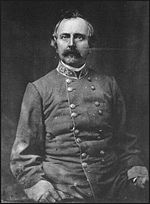 |
Preston, William William Preston (Kentucky) William Preston was an American lawyer, politician, and ambassador. He also was a brigadier general in the Confederate Army during the American Civil War.-Biography:... |
Brigadier General | Born October 16, 1816, Louisville, Kentucky. Educated in Kentucky and at Harvard University law school. Lawyer at Louisville. Mexican-American War veteran. Elected to both houses of Kentucky legislature. U.S. Representative from Kentucky, 1853-1857. Minister to Spain. Colonel, on staff of brother-in-law, General Albert Sidney Johnston, until Johnston was killed at the Battle of Shiloh. Brigadier general, April 14, 1862. Battles of Second Corinth, Murfreesboro (Stones River), Chickamauga. In 1864, appointed Confederate minister to Imperial Mexican government but could not reach Maximilian's court; spent remainder of war in Trans-Mississippi. No record of supposed promotion to major general. Went to Mexico, England, Canada after the war; returned to Kentucky, 1866. Member of lower house of state legislature, 1868-1869. Died September 21, 1887, Lexington, Kentucky, buried at Louisville, Kentucky. | ||
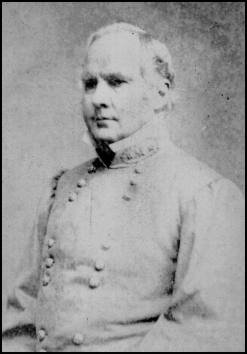 |
Price, Sterling "Old Pap" Sterling Price Sterling Price was a lawyer, planter, and politician from the U.S. state of Missouri, who served as the 11th Governor of the state from 1853 to 1857. He also served as a United States Army brigadier general during the Mexican-American War, and a Confederate Army major general in the American Civil... |
Major General | Born September 20, 1809, Prince Edward County, Virginia. Hampden-Sydney College graduate. Moved to Missouri in 1831 and purchased a farm in Chariton County. Six years in Missouri legislator; speaker for four years. U.S. Representative, 1846–1848. Mexican-American War veteran. Military governor of New Mexico. Governor of Missouri, 1853–1857. President of state convention that opposed secession but disagreed with extreme Unionists and joined pro-Confederate militia. Combined with General Ben McCulloch at Battle of Wilson's Creek to defeat Union General Nathaniel Lyon. Captured Lexington, Missouri and 3,000 prisoners but forced to retreat to Arkansas. Battle of Pea Ridge (Elkhorn Tavern). Major general, March 6, 1862. Iuka, Second Corinth. Failed to retake Helena, Arkansas. Aided General E. Kirby Smith in repulsing Union Major General Frederick Steele's Frederick Steele Frederick Steele was a career military officer in the United States Army, serving as a major general in the Union Army during the American Civil War. He was most noted for his successful campaign to retake much of secessionist Arkansas for the Union cause.-Early life:Steele was born in Delhi, New... Camden Expedition Camden Expedition The Camden Expedition was a military campaign in southern and central Arkansas during the American Civil War. It involved Union forces stationed at Little Rock and Fort Smith under the command of Major General Frederick Steele... . Raided Missouri in September and October, 1864. Ultimately defeated at Battle of Westport, retreated to Texas until the end of the war. Went to Mexico after the war but returned to U.S. when Maximillian's rule in Mexico collapsed. Died September 29, 1867, St. Louis, Missouri. |
||
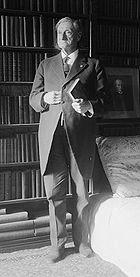 |
Pryor, Roger Atkinson Roger Atkinson Pryor Roger Atkinson Pryor was both an American politician and a Confederate politician serving as a congressman on both sides. He was also a jurist, serving in the New York Supreme Court, a lawyer, and newspaper editor... |
Brigadier General | Born July 19, 1828, Petersburg, Virginia. Hampden-Sydney College valedictorian, 1845; University of Virginia law school. Lawyer, newspaper editor and U.S. Congressman before the war. Resigned from Provisional Confederate Congress to join army as colonel, 3rd Virginia Infantry. After the battle of Williamsburg, April 16, 1862, promoted brigadier general. Led brigade at Seven Days' Battle, Second Bull Run (Second Manassas), Antietam (Sharpsburg). Stationed south of James River but in 1863 his regiments were reassigned. Resigned August 18, 1863 and served as a special courier without rank for the cavalry. Captured November 27, 1864, not released until near end of war. Went to New York in 1865, associated with the Daily News and was admitted to the state bar. Practice law, judge of the court of common pleas and state supreme court; last seven years, a special referee of the appellate division of the court. Died March 14, 1919, New York City, buried Princeton, New Jersey. |
Q
| Image | Name | Rank | Quarles, William Andrew William Andrew Quarles William Andrew Quarles was a Tennessee lawyer, politician, railroad executive, and a general in the Confederate States Army during the American Civil War.-Early life:... | Brigadier General | Born July 4, 1825 near Jamestown, Virginia; family moved to Christian County, Kentucky when he was age 5. University of Virginia Law School graduate, 1848; lawyer; circuit court judge, supervisor of banks for Tennessee; president of Memphis, Clarksville and Louisville Railroad Memphis, Clarksville and Louisville Railroad The Memphis, Clarksville and Louisville Railroad received its charter on January 28, 1852, from the state of Tennessee. The line connected with the Memphis and Ohio Railroad and the Louisville and Nashville Railroad connects between Memphis and Louisville.The railroad had a major strike in 1868... . Colonel 42nd Tennessee Infantry. Captured at Battle of Fort Donelson. Served at Port Hudson, fought in Vicksburg Campaign. Brigadier general to rank from August 25, 1863. Fought in Atlanta campaign, Franklin-Nashville campaign. Wounded at Battle of Franklin, captured, paroled May 25, 1865. Tennessee state senator, elected 1880, 1884. Died December 28, 1893 at the home of a daughter in Logan County, Kentucky. |
|---|
R
| Image | Name | Rank | Rains, Gabriel J. Gabriel J. Rains Gabriel James Rains was a career United States Army officer and a brigadier general in the Confederate States Army during the American Civil War.-Early life:... | Brigadier General | Born June 4, 1803, Craven County, North Carolina. USMA, 1827. Brevet major for Seminole Wars. Lieutenant colonel, 5th U.S. Infantry, June 5, 1860. Brigadier general CSA (PACS), September 23, 1861. Command of brigade on the Peninsula. In falling back from Yorktown, he devised the anti-personnel mine and deployed them in roads, causing a large number of Union casualties. Major General Longstreet forbade further use of the mines during the campaign. Fought at Seven Pines and was severely criticized by A. P. Hill and relieved. First superintendent of the volunteer and conscript bureau, December 1862-May 1863. Set up mine and torpedo defenses at several threatened cities and harbors for duration of war. Post-war: resided in Atlanta; then clerk in quartermaster department at Charleston, South Carolina, 1877-1880. Died August 6, 1881, Aiken, South Carolina. |
|---|---|---|---|---|---|
| Rains, James Edward James Edward Rains James Edward Rains was a lawyer and general in the Confederate States Army during the American Civil War. He was killed at the Battle of Stones River .-Early life:... |
Brigadier General | Born April 10, 1833, Nashville, Tennessee. Yale Law School graduate at age 21. Attorney at Nashville. City attorney, 1858; associate editor of the Nashville Banner. District attorney general for Davidson, Williamson and Sumner counties, 1860. Enlisted as private in 11th Tennessee Infantry. Colonel, May 10, 1861. Occupied Cumberland Gap during winter of 1861-1862. Flanked out of that position in June 1862. During E. Kirby Smith's advance in Kentucky, Major General Stevenson's division, including Rains's brigade, operated against the Union General Morgan in Cumberland Gap. Brigadier general, November 4, 1862. Assigned to John P. McCown's division of Lt. Gen. Hardee's corp in the Battle of Murfreesboro (Stones River). Killed in action leading his men against a Union battery, December 31, 1862. Reburied in Nashville. | |||
| Ramseur, Stephen Dodson Stephen Dodson Ramseur Stephen Dodson Ramseur was one of the youngest Confederate generals in the American Civil War. He was mortally wounded in battle at the Battle of Cedar Creek in the Shenandoah Valley.-Early life:... |
Major General | Born May 31, 1837, Lincolnton, North Carolina. USMA, 1860. Captain of Ellis Light Artillery. Colonel of 49th North Carolina Volunteer Infantry Regiment. Seven Days' Battles. Severely wounded at Battle of Malvern Hill. Brigadier general, November 1, 1862. Wounded again at Battle of Chancellorsville. Wounded at Battle of Spotsylvania Court House. With General Jubal Early in Valley Campaigns of 1864. Major general, June 1, 1864, age 27. Mortally wounded at the Battle of Cedar Creek, October 19, 1864; captured, died October 20, 1864. Buried at Lincolnton, North Carolina. | |||
| Randolph, George Wythe | Brigadier General | Born March 10, 1818 at Monticello, the home of his maternal grandfather, Thomas Jefferson, near Charlottesville, Virginia. Midshipman in Navy, age 13, served for 6 years. Entered University of Virginia, 1837, resigned from U.S. Navy, 1839. Lawyer in Albemarle County, Virginia until 1850. Moved to Richmond. Organized Richmond Howitzers artillery battery after John Brown's raid on Harpers Ferry. Chief of artillery to Brig. Gen. Magruder at Battle of Big Bethel Battle of Big Bethel The Battle of Big Bethel, also known as the Battle of Bethel Church or Great Bethel was one of the earliest land battles of the American Civil War after the surrender of Fort Sumter... . Brigadier general, February 12, 1862. Confederate Secretary of War, March 1862. Resigned November 15, 1862. Soon diagnosed with tuberculosis. Went to France for his health; resigned Army commission December 18, 1864. Returned to Virginia after the war but died April 3, 1867 at a family estate near Charlottesville. |
|||
| Ransom, Matt Whitaker | Brigadier General | Born October 8, 1826, Warren County, North Carolina. University of North Carolina graduate, 1847. Lawyer. North Carolina legislator, 1858–1861. Colonel, 35th North Carolina Volunteer Infantry Regiment, part of younger brother's, Robert Ransom Jr.'s, brigade. Brigadier general, June 13, 1863. Fought at Seven Pines, Seven Days' Battles, Antietam (Sharpsburg), Fredericksburg, Plymouth, Weldon, Suffolk, siege of Petersburg. Wounded three times; paroled at Appomattox Court House. Post-war: lawyer, farmer, then U.S. Senator from North Carolina, 1872–1895. Then minister to Mexico. Died October 8, 1904, Garysburg, North Carolina. | |||
| Ransom, Robert Jr. Robert Ransom, Jr. Robert Ransom, Jr. was a major general in the Confederate States Army during the American Civil War. His brother Matt W. Ransom was also a Confederate general officer and U.S. Senator.-Early life:... |
Major General | Born February 12, 1828, Warren County, North Carolina. USMA, 1850. Colonel, 1st North Carolina Cavalry, (aka 9th North Carolina Volunteers). Brigadier general, March 1, 1862. Seven Days' Battles, Fredericksburg. Transferred to North Carolina. Major general, May 26, 1863. Defended Weldon Railroad. Commanded in Richmond and in East Tennessee. Fought with Beauregard against Union General Butler at Drewry's Bluff. Commanded cavalry during Lieutenant General Jubal Early's raid on Washington (Fort Stevens). Retired due to illness in Fall 1864. Civil engineer at New Bern, North Carolina after the war. Died January 14, 1892, New Bern, North Carolina. Younger brother of Brigadier General Matt Whitaker Ransom. | |||
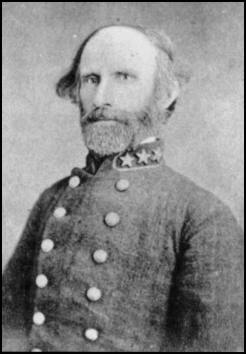 |
Reynolds, Alexander Welch Alexander W. Reynolds Alexander Welch Reynolds was a career United States Army officer and a Confederate Army general during the American Civil War, primarily fighting in the Western Theater. After the conflict he served as a staff officer in the Egyptian Army.-Early life and career:Alexander W... |
Brigadier General | Born April, 1816, Clarke County, Virginia. USMA, 1838. Seminole War veteran. Captain, Regular Confederate Army, as early as March 1861. Colonel, 50th Virginia Infantry. With Brig. Gen. John B. Floyd in West Virginia; Kirby Smith at Knoxville. Was captured and paroled and later exchanged, at Siege of Petersbug. Brigadier general, September 14, 1863. Fought at Chattanooga and in the Atlanta campaign. Wounded at New Hope Church. In North Alabama and Middle Tennessee at the end of the war. Post-war service as colonel in several staff positions with Khedive Khedive The term Khedive is a title largely equivalent to the English word viceroy. It was first used, without official recognition, by Muhammad Ali Pasha , the Wāli of Egypt and Sudan, and vassal of the Ottoman Empire... of Egypt, 1869-1876. Died May 26, 1871, Alexandria, Egypt. |
||
| Reynolds, Daniel H. | Brigadier General | Born December 14, 1832, Centerburg, Ohio. Ohio Wesleyan; Law school at Somerville, Tennessee. Lawyer, 1858, moved to Lake Village, Arkansas. Recruited a company for Confederate service, elected captain, assigned to 1st Arkansas Mounted Rifles, fought at Battle of Wilson's Creek. Promoted to major, lieutenant colonel and colonel, after the battle of Chickamauga. Brigadier general, March 5, 1864. Fought in Atlanta campaign, Franklin-Nashville campaign, Carolinas campaign. Lost leg at Battle of Bentonville. Paroled at Charlottesville, Virginia, May 29, 1865. Post-war lawyer, Arkansas State Senator, 1866-1867. Died March 14, 1902, Lake Village, Arkansas. | |||
| Richardson, Robert Vinkler Robert V. Richardson Robert Vinkler Richardson was a brigadier general in the Confederate States Army during the American Civil War.-Early life:... |
Brigadier General | Born November 4, 1820, Granville County, North Carolina, moved early in life to Hardeman County, Tennessee. Lawyer, business associate of future Confederate generals Forrest and Pillow. Colonel, 12th Tennessee Cavalry. Fought at Shiloh, Second Corinth. Brigadier general, December 3, 1863 and duly confirmed, but nomination was returned to President Davis on February 9, 1864, at his request. Then it seems he operated with Brigadier General James R. Chalmers until the end of the war. Involved with railroad interests after the war. Mortally wounded by an unknown assailant at a tavern in Clarkton, Missouri on January 5, 1870 and died the next day. Buried at Memphis, Tennessee. | |||
| Ripley, Roswell Sabine | Brigadier General | Born March 14, 1823, Worthington, Ohio., USMA, 1843, age 20. Mexican-American War veteran, wrote two-volume history of the war. Nephew of Brigadier General James W. Ripley, chief of ordnance of the U.S. Army, 1861-1863. Married into the Middleton family of Charleston, South Carolina, 1852. Resigned from army, 1853, to engage in business at Charleston. Lieutenant colonel of state forces in 1860; occupied Fort Moultrie after Major Robert Anderson moved the garrison to Fort Sumter; occupied Fort Sumter after its surrender. Brigadier general, August 15, 1861. In command in South Carolina until relieved by Major General Pemberton. Fought throughout the Seven Days Battles, severely wounded at Antietam (Sharpsburg). On duty in South Carolina in 1863 and 1864; ordered to General Joseph E. Johnston's army in spring 1865, arrived one day before the Battle of Bentonville. Went to England after the war but a manufacturing venture failed. He returned to Charleston but spent much time in New York City. Died March 29, 1887 at New York City; buried at Charleston, South Carolina. | |||
| Roane, John Selden John Selden Roane John Selden Roane was a Confederate Brigadier General during the American Civil War. He also served as the fourth Governor of the State of Arkansas.-Biography:... |
Brigadier General | Born January 8, 1817, Wilson County, Tennessee. Cumberland College. Moved to Arkansas. State legislator, 1844, elected speaker. Mexican-American war veteran. Fought a duel with Captain, later Confederate General, Albert Pike. Governor of Arkansas, 1849-1852. Opponent of secession, did not take up arms immediately. Brigadier general, March 20, 1862. Fought at Battle of Prairie Grove Battle of Prairie Grove The Battle of Prairie Grove was a battle of the American Civil War fought on 7 December 1862, that resulted in a tactical stalemate but essentially secured northwest Arkansas for the Union.-Strategic situation: Union:... . Served in Arkansas, Louisiana and Texas in garrison and detached duty. Paroled at Shreveport, Louisiana, June 11, 1865. Died April 8, 1867, Pine Bluff, Arkansas; buried at Little Rock, Arkansas. |
|||
| Roberts, William Paul William Paul Roberts William Paul Roberts was a brigadier general in the Confederate States Army during the American Civil War. He was the youngest Confederate general officer to serve in the War.-Early life:... |
Brigadier General | Born July 11, 1841, Gates County, North Carolina. Youngest general officer in Confederate service. Born July 11, 1841. Enlisted at age 19 in the 19th North Carolina Volunteers, later the 2nd North Carolina Infantry. served in North Carolina, then with Army of Northern Virginia after Fall 1862. Colonel, June 1864. Fought at Battle of Reams' Station. Appointed brigadier general to rank from February 21, 1865 on February 23, 1865. Brigade fought well but was overcome by superior forces at Battle of Five Forks, April 1, 1865. State auditor, 1880–1888. Died at Norfolk, Virginia, March 28, 1910, buried at Gatesville, North Carolina. | |||
| Robertson, Beverly Holcombe Beverly Robertson Beverly Holcombe Robertson was a cavalry officer in the United States Army on the Western frontier and a Confederate general during the American Civil War.-Early life:... |
Brigadier General | Born June 5, 1827, Amelia County, Virginia. USMA, 1849. Colonel 4th Virginia Cavalry. Fought in Jackson's Valley Campaign of 1862; commanded cavalry after death of General Turner Ashby. Fought at Battle of Second Bull Run (Second Manassas), duty in North Carolina, fought at battle of Gettysburg. Distrusted by Major General Jeb Stuart. Relieved and assigned to South Carolina until evacuated at the approach of Union Major General W. T. Sherman. Insurance business in Washington. Died November 12, 1910, Washington, D.C., buried in Amelia County, Virginia. | |||
| Robertson, Felix Huston Felix Huston Robertson Felix Huston Robertson was the only native-born Texan to serve as a general in the Confederate States Army during the American Civil War. At the time of his death, he was the last surviving general of the Confederacy... |
Brigadier General | Born March 9, 1839, Washington, Texas. Resigned from USMA in January 1861. Fort Sumter, Pensacola, Shiloh, Murfreesboro (Stones River), Chickamauga, Atlanta campaign in charge of artillery of General Wheeler's cavalry corps. Appointed brigadier general on July 26, 1864 but for unknown reasons his nomination was rejected by the Confederate Senate, February 22, 1865. Severely wounded at Buckhead Creek, near Augusta, Georgia, November 26, 1864. Only native Texan to have been appointed a Confederate general. Post-war lawyer at Waco, Texas. Died April 20, 1928, Waco, Texas, the last surviving general officer of the Confederacy. Son of Confederate Brigadier General Jerome Bonaparte Robertson. | |||
| Robertson, Jerome Bonaparte | Brigadier General | Born March 14, 1815, Woodford County, Kentucky. Studied medicine, Transylvania University graduate, 1835. Army of Republic of Texas. Practice medicine in Washington County, Texas. Indian fighter. Member of both houses of Texas legislature. Delegate to secession convention. Captain, 5th Texas Infantry Regiment, then lieutenant colonel and colonel. Brigadier general, November 1, 1862. Fought in Seven Days' Battles. Wounded at Battles of Second Bull Run (Second Manassas) and Gettysburg. Fought at Chickamauga and Knoxville with Longstreet. Spent Remainder of the war in Texas in command of state reserve corps. Post war doctor, superintendent of state bureau of immigration in 1874. In 1879 moved to Waco, interested in railroad building. Father of Confederate Brigadier General Felix Huston Robertson. Died January 7, 1891, Waco, Texas. | |||
| Roddey, Philip D. Phillip Roddey Philip Dale Roddey was a brigadier general in the army of the Confederate States of America during the American Civil War.-Biography:... |
Brigadier General | Born April 2, 1826, Moulton, Alabama. Little or no formal schooling. Tailor, sheriff of Lawrence County, steamboat business. Captain of a cavalry company in 1861. Scouting missions. Colonel, December 1862, 4th Alabama Cavalry. Served under Generals Forrest and Wheeler, mainly in North Alabama. Active in Atlanta campaign, Franklin-Nashville campaign. Under Forrest, resisted Union General James W. Wilson's advance on Selma, Alabama. Forrest and Roddey swam the Alabama River to escape after collapse of Confederate lines. Paroled May 17, 1865. Post-war: engaged in business in New York. Became interested in a patent pump. Died July 20, 1897 in Westminster Hospital, London, England, on a business trip to negotiate sale of the patent. | |||
| Rodes, Robert E. Robert E. Rodes Robert Emmett Rodes was a railroad civil engineer and a promising young Confederate general in the American Civil War, killed in battle in the Shenandoah Valley.-Education, antebellum career:... |
Major General | Born March 29, 1829, Lynchburg, Virginia. VMI graduate, 1848. Assistant professor, civil engineer. Colonel 5th Alabama Volunteer Infantry Regiment at Battle of First Bull Run (First Manassas). Brigadier general, October 21, 1861. Wounded at Seven Pines. Fought at Battle of Gaines Mill although not yet recovered. Long recovery from wounds, illness. Fought at Battles of South Mountain, Antietam (Sharpsburg). Then on duty in North Carolina. Led van of Stonewall Jackson's flank march at Battle of Chancellorsville. Major general for services at Chancellorsville. Division command at Gettysburg, the Wilderness, Spotsylvania Court House and Valley Campaigns of 1864. Mortally wounded at Winchester, Virginia, September 19, 1864, while directing a counterattack that helped Confederate force escape capture. Buried at Lynchburg, Virginia. | |||
| Ross, Lawrence Sullivan Lawrence Sullivan Ross Lawrence Sullivan "Sul" Ross was the 19th Governor of Texas , a Confederate States Army general during the American Civil War, and a president of the Agricultural and Mechanical College of Texas, now called Texas A&M University.Ross was raised in the Republic of Texas, which was later annexed to... |
Brigadier General | Born September 27, 1838, Bentonsport, Iowa; family moved to Texas while an infant. Wesleyan University, Florence, Alabama, 1859. Spent vacations fighting the Comanches. Captain in Texas Rangers, 1859. Entered Confederate Army as a private. Colonel, 6th Texas Cavalry, May 14, 1862. Fought at Second Battle of Corinth. Brigadier general, December 21, 1863. Fought in 135 battles and engagements. Post-war farmer in Brazos valley. Sheriff of McLennan County, 1873; member of constitutional convention, 1875; State senator, 1881-1885. Governor of Texas, 1887-1891. President of Agricultural and Mechanical College of Texas at College Station, 1891-1898. Died January 3, 1898, College Station, Texas. Buried at Waco, Texas. | |||
| Rosser, Thomas L. Thomas L. Rosser Thomas Lafayette Rosser was a Confederate general during the American Civil War, and later an officer in the Spanish American War and railroad construction engineer. A favorite of J.E.B... |
Major General | Born October 15, 1836, Campbell County, Virginia; family moved to Texas in 1849. USMA, resigned two weeks before graduation in 1861. First Bull Run (First Manassas). Wounded at Battle of Mechanicsville. Colonel, 5th Virginia Volunteer Cavalry Regiment. Wounded at Battle of Kelly's Ford. Brigadier General, September 28, 1863. Command of Laurel Brigade. Overland Campaign. Valley Campaigns of 1864. In October 1864 assumed command of Lt. Gen. Early's cavalry. Major General, November 1, 1864. Defeated at Woodstock and Cedar Creek. Two raids into West Virginia, then returned to Siege of Petersburg. Battle of Five Forks. Refused to surrender at Appomattox Court House but was captured and paroled in May 1865. Chief engineer of Norther Pacific and Canadian Pacific Railroads. On June 10, 1898, appointed brigadier general of U.S. Volunteers for the Spanish-American War; mustered out October 31, 1898. Died March 29, 1910 at Charlottesville, Virginia. | |||
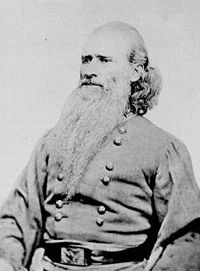 |
Ruggles, Daniel Daniel Ruggles Daniel Ruggles was a brigadier general in the Confederate States Army during the American Civil War. He commanded a division at the Battle of Shiloh.-Biography:Ruggles was born in Barre, Massachusetts, in 1810... |
Brigadier General | Born January 31, 1810, Barre, Massachusetts. USMA, 1833. Fought in Seminole War of 1839–1840, Mexican-American War. Married into a Virginia family. Resigned from U.S. Army, May 7, 1861. Commanded Virginia state forces on Rappahannock River. Brigadier general, August 9, 1861. Led Bragg's First Division at Battle of Shiloh. Second Battle of Corinth; administrative duties. Commissary general of prisoners, March 30, 1865. Post-war: resided in Fredericksburg, Virginia except for four years managing a ranch in Texas. Member of USMA Board of Visitors, 1884. Died June 1, 1897, Fredericksburg, Virginia. | ||
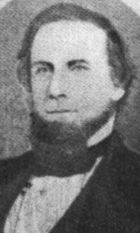 |
Rust, Albert Albert Rust Albert Rust was a member of the United States House of Representatives from Arkansas, and a delegate to the Provisional Confederate Congress... |
Brigadier General | Born in 1818 in Fauquier County, Virginia. Moved to Union County, Arkansas about 1837. Lawyer. State legislator, 1842-1848, 1852-1854. U.S. Congressman, 1855-1857, 1859-March 3, 1861. Colonel, 3rd Arkansas Infantry. Fought at Cheat Mountain under General Lee. Served under Stonewall Jackson in winter of 1861-1862. Brigadier general, March 4, 1862. Fought at Second Battle of Corinth. Sent to report to Major General Sterling Price in April 1863. Served under General Hindman in Arkansas and Generals Richard Taylor and Pemberton in Louisiana. Post-war farmer near Little Rock, Arkansas. Died April 4, 1870, Little Rock, Arkansas. |
S
| Image | Name | Rank | Baltimore and Ohio Railroad Baltimore and Ohio Railroad The Baltimore and Ohio Railroad was one of the oldest railroads in the United States and the first common carrier railroad. It came into being mostly because the city of Baltimore wanted to compete with the newly constructed Erie Canal and another canal being proposed by Pennsylvania, which... . With Blue Ridge Railroad Blue Ridge Railroad The Blue Ridge Railroad was owned by the Commonwealth of Virginia. Its purpose was to provide a state-financed crossing of the Blue Ridge Mountains for the Virginia Central Railroad, which it became a part of after completion.-History:... , 1855-1861. Private in Fort Hill Guards of South Carolina. Brigadier General Magruder's chief engineer at Yorktown in the Peninsula Campaign; captain of engineers. Major of artillery, October 1862. In charge of Nitre (later Nitre and Mining) Corps; lieutenant colonel and colonel in 1863. Produced crucial ordnance supplies for Confederate Army. Brigadier general and commissary general, February 16, 1865. Paroled at Thomasville, Georgia. Post-war civil engineer for railroads and two years with city of Louisville, Kentucky. Head of Mining and Engineering Department of Chesapeake and Ohio Railway. Died April 7, 1880, White Sulphur Springs, West Virginia; buried Richmond, Virginia. |
|---|---|---|---|
| Sanders, John C.C. | Brigadier General | Born April 4, 1840, Tuscaloosa, Alabama. Left University of Alabama at outbreak of war to become captain in the 11th Alabama Volunteer Infantry Regiment. Fought at Seven Pines, Seven Days' Battles. Severely wounded at Battle of Frayser's Farm. Colonel after Battle of Antietam (Sharpsburg). Fredericksburg, Salem Church, Gettysburg, Overland Campaign, Spotsylvania "Mule Shoe" salient. Appointed brigadier general from May 31, 1864. Fought at Petersburg, Battle of the Crater. Killed in action during the Siege of Petersburg while fighting along the Weldon Railroad, August 21, 1864, aged 24. First Buried at Richmond, Virginia. Reburied in Alabama 1918. | |
| Scales, Alfred Moore Alfred Moore Scales Alfred Moore Scales was a North Carolina state legislature, Confederate general in the American Civil War and the 45th Governor of the US state of North Carolina from 1885 to 1889, and Congressman.-Early life:... |
Brigadier General | Born November 26, 1827, Reidsville, North Carolina. Educated at Caldwell Institute, Greensboro, North Carolina and University of North Carolina. Studied law, practiced at Madison, North Carolina; solicitor of Rockingham County. State legislator for four terms. U.S. Representative, 1857-1859. Enlisted as private, immediately elected captain of company in 13th North Carolina Infantry. Fought in Peninsula Campaign, Seven Days Battles, at Fredericksburg and at Chancellorsville, where he was wounded. Brigadier general, June 13, 1863. Severely wounded at Gettysburg. Fought in Valley Campaign of 1864 but on sick leave at end of war. Post-war lawyer at Greensboro, North Carolina. State legislator, 1866-1869. U.S. Representative, 1875-1884. Governor of North Carolina, 1885-1889. Died February 8, 1892, Greensboro, North Carolina. | |
| Scott, Thomas M. Thomas M. Scott Thomas Moore Scott was a Confederate States Army brigadier general during the American Civil War. He saw active service in several battles in the Western Theater of the American Civil War. He was a planter before and after the war.... |
Brigadier General | Born in 1829 in Georgia, probably Athens. Went to New Orleans, Louisiana as a young man but returned to reside at La Grange, Georgia. Farmer in Claiborne Parish, Louisiana at start of war. Colonel, 12th Louisiana Infantry. At Columbus, Kentucky. At Battle of Belmont but regiment was inactive. Part of garrison at Island Number 10. Part of garrison at Fort Pillow, April 1862. Duty at Port Hudson in late 1862 and early 1863. Fought at Battle of Champion's Hill (Baker's Creek) in the Vicksburg Campaign. Fought with General Joseph E. Johnston's forces. Remained in Mississippi. Went to Dallas, Georgia with Lt. General Leonidas Polk in 1864 for Atlanta campaign. Brigadier general, May 10, 1864. Fought in Franklin-Nashville Campaign. Severely wounded at Battle of Franklin, November 30, 1864; no further service. Post-war farmer, sugar plantation operator. Died April 21, 1876, New Orleans, Louisiana. | |
| Scurry, William Read William Read Scurry William Read Scurry was a general in the Confederate States Army in the American Civil War.-Biography:... |
Brigadier General | Born February 10, 1821, Gallatin, Tennessee; went to Texas at age 16. Mexican-American War veteran. Commissioner from Texas to fix boundary with New Mexico. Lieutenant colonel of 4th Texas Cavalry Regiment. With General Sibley in New Mexico. Fought at Battles of Valverde, Glorieta Pass. In command at Glorieta because Sibley was allegedly under a doctor's care, but more likely intoxicated. Brigadier general, September 12, 1862. With Major General Magruder at recapture of Galveston. Fought in Red River Campaign, Battles of Mansfield, Pleasant Hill. Then went to help opposed Union General Steele's advance in the Camden Expedition in Arkansas. Mortally wounded at the Battle of Jenkins' Ferry, April 30, 1864. Bled to death when he refused to be taken to the rear. Buried at Austin, Texas. | |
| Sears, Claudius Wistar Claudius W. Sears Claudius Wistar Sears was an United States Army officer, an educator, and a Confederate general during the American Civil War.... |
Brigadier General | Born November 8, 1817, Peru, Massachusetts Peru, Massachusetts Peru is a town in Berkshire County, Massachusetts, United States. The population was 821 at the 2000 census.- History :Originally known as Northern Berkshire Township Number 2 and including all of Hinsdale and part of Middlefield, the town was first settled in 1767 and was officially incorporated... . USMA, 1841. Resigned from army in 1842 to become a teacher at St. Thomas's Hall, Holly Springs, Mississippi. Professor of mathematics at University of Louisiana (Tulane University), 1845-1859. Married into Southern family from Houston, Texas. President of St. Thomas's Hall until 1861. Captain, 17th Mississippi Infantry. Colonel, 46th Mississippi Infantry. Fought at Battle of Chickasaw Bayou Battle of Chickasaw Bayou The Battle of Chickasaw Bayou, also called Walnut Hills, fought December 26–29, 1862, was the opening engagement of the Vicksburg Campaign during the American Civil War. Confederate forces under Lt. Gen. John C. Pemberton repulsed an advance by Union Maj. Gen. William T... and Battle of Port Gibson Battle of Port Gibson The Battle of Port Gibson was fought near Port Gibson, Mississippi, on May 1, 1863, between Union and Confederate forces during the Vicksburg Campaign of the American Civil War. The Union Army was led by Maj. Gen. Ulysses S... , May 1863. Captured and paroled at Vicksburg but not exchanged for several months. Brigadier general, March 1, 1864. Fought in Atlanta campaign until incapacitated by illness. Fought at Battle of Allatoona and in Franklin-Nashville Campaign. Lost leg at Battle of Franklin. Captured near Pulaski, Tennessee a few days after the battle. Paroled June 23, 1865. Chair of Mathematics, University of Mississippi, 1866-1889. Died February 15, 1891, Oxford, Mississippi. |
|
| Semmes, Paul Jones Paul Jones Semmes Paul Jones Semmes was a banker, businessman, and a Confederate general in the American Civil War, mortally wounded at the Battle of Gettysburg.-Early life:... |
Brigadier General | Born June 4, 1815, Wilkes County, Georgia. Attended University of Virginia; banker, planter in Georgia. Captain of Columbus Guards militia company, 1846-1861. Colonel, 2d Georgia Volunteer Infantry Regiment. Brigadier general, March 11, 1862. With Major General Magruder at Yorktown, Williamsburg. Seven Pines, Seven Days' Battles, Crampton's Gap. Antietam (Sharpsburg). Brigade aided in defense of Marye's Heights at Battle of Fredericksburg. Salem Church. Mortally wounded at the Battle of Gettysburg, July 2, 1863, in Longstreet's attack on the Round Tops. Died during the retreat from Gettysburg at Martinsburg, Virginia (later West Virginia), July 10, 1863. Buried at Columbus, Georgia. | |
| Sharp, Jacob H. Jacob H. Sharp Jacob Hunter Sharp was a Mississippi lawyer, newspaperman and politician, as well as a general in the Confederate States Army during the American Civil War... |
Brigadier General | Born February 6, 1833, Pickensville, Alabama; taken as an infant to Mississippi. Attended University of Alabama, 1851-1852. Studied law; began practice at Columbus, Mississippi. Private in 1st Battalion of Mississippi Infantry; elected captain. Fought at Shiloh, in the Kentucky Campaign, at the Battle of Murfreesboro (Stones River). Colonel, 44th Mississippi Infantry before battle of Chickamauga. Fought at Chickamauga, Chattanooga and in Atlanta campaign. Brigadier general, July 26, 1864. Fought in Franklin-Nashville campaign, Carolinas campaign. No record of parole. Post-war lawyer, owner of Columbus, Mississippi Independent newspaper, president of Mississippi Press Association. State legislator, 1886-1890. Died September 15, 1907. | |
| Shelby, Joseph Orville | Brigadier General | Born December 12, 1830, Lexington, Kentucky. Educated by step-father and at Transylvania University. Manufacturer of rope at Lexington, Kentucky, then at Waverly, Missouri. Led pro-slavery Kentuckians in Kansas-Missouri border conflict of the 1850s. Organized a Confederate cavalry company at the start of the war. Usually attached to forces of Major General Sterling Price. Fought in nearly all campaigns and many minor actions west of the Mississippi River. Brigadier general, December 15, 1863. At the end of the war, Shelby and a few of his men buried their battle flag and went to Mexico to fight but apparently could not reach an agreement to fight for either side. Returned to Missouri after fall of Maximilian in 1867. U.S. marshal for the Western District of Missouri, 1893-1897. Died February 13, 1897, Adrian, Missouri, buried at Kansas City, Missouri. | |
| Shelley, Charles M. Charles M. Shelley Charles Miller Shelley was a brigadier general in the Confederate States Army and a postbellum U.S. Representative from Alabama.-Early life:... |
Brigadier General | Born December 28, 1833, Sullivan County, Tennessee; taken to Talladega, Alabama, 1836. Architect, builder. Lieutenant of Talladega Artillery, 1861. Captain, 5th Alabama Infantry. In Virginia during battle of First Bull Run (First Manassas). In January 1862, he recruited 30th Alabama Infantry and was made colonel. Fought in Kentucky campaign, at Port Gibson and at Vicksburg, where he was captured. Upon exchange, he joined the Army of Tennessee and participated in every campaign from Chattanooga to the surrender at Greensboro, North Carolina. Brigadier general, September 17, 1864. Lost 432 men killed and wounded out of 1100 at Battle of Franklin; Shelley's horse was killed under him and he had bullet holes in his uniform. Spent a year in Louisiana, then returned to Alabama. Sheriff of Dallas County, 1874. Four terms in U.S. Congress. President Cleveland appointed him fourth auditor of the U.S. Treasury. Promoted industrial interests of Birmingham, Alabama. Died January 20, 1907, Birmingham, Alabama; buried at Talladega, Alabama. | |
| Shoup, Francis A. Francis A. Shoup Francis Asbury Shoup was a lawyer from Indianapolis, Indiana, who decided to become a brigadier general for the Confederate States Army during the American Civil War.-Pre-war:... |
Brigadier General | Born at Laurel, Indiana, March 22, 1834. Educated at Asbury College (DePauw University DePauw University DePauw University in Greencastle, Indiana, USA, is a private, national liberal arts college with an enrollment of approximately 2,400 students. The school has a Methodist heritage and was originally known as Indiana Asbury University. DePauw is a member of both the Great Lakes Colleges Association... ) and USMA, 1855. Resigned from army in 1860 to study law. Admitted in Indiana bar in 1860, to Florida (St. Augustine) bar in 1861. No apparent reason for adherence to Confederacy other than admiration for Southern men in the U.S. Army and recent move to Florida. Lieutenant of artillery; major, October 1861. Chief of artillery for Major General Hardee at Shiloh, for Major General Hindman at Prairie Grove. Brigadier general, September 12, 1862. Commanded a Louisiana brigade at Vicksburg; was captured, paroled and exchanged. Chief of artillery to General Joseph E. Johnston in Atlanta campaign. Chief of staff to General Hood. At end of war, Chair of Mathematics at University of Mississippi. Took Episcopal orders in 1868 and became rector of St. Peter's Parish in Oxford, Mississippi. In 1869, he went to Sewanee University as professor of mathematics and chaplain. In 1875, he left to become rector of several churches. He returned to Sewanee in 1883 as professor of mathematics, physics and engineering. Died September 4, 1896, Columbia, Tennessee, buried at Sewanee, Tennessee. |
|
| Sibley, Henry Hopkins Henry Hopkins Sibley Henry Hopkins Sibley was a brigadier general during the American Civil War, leading the Confederate States Army in the New Mexico Territory. His attempt to gain control of trails to California was defeated at the Battle of Glorieta Pass... |
Brigadier General | Born May 25, 1816, Natchitoches, Louisiana. USMA, 1838. Seminole War, Mexican-American War, Utah War veteran. Inventor of the Sibley tent. Resigned from U.S. Army, May 13, 1861. Brigadier general, June 17, 1861. Commanded disastrous Confederate New Mexico Campaign New Mexico Campaign The New Mexico Campaign was a military operation of the American Civil War from February to April 1862 in which Confederate Brigadier General Henry Hopkins Sibley invaded the northern New Mexico Territory in an attempt to gain control of the Southwest, including the gold fields of Colorado and the... . Defeated at the Battle of Glorieta Pass Battle of Glorieta Pass The Battle of Glorieta Pass, fought from March 26 to 28, 1862 in northern New Mexico Territory, was the decisive battle of the New Mexico Campaign during the American Civil War. Dubbed the "Gettysburg of the West" by some historians, it was intended as the killer blow by Confederate forces to break... , New Mexico, March 26–28, 1862, where he was allegedly intoxicated. Sibley also lost many men in his retreat to Texas because Union forces had destroyed most of his supplies. General E. Kirby Smith twice preferred charges against him. Alleged alcohol problems. Without a command at the end of the war. Egyptian Army, 1869–1873. Returned to United States and lectured on his Egyptian service. Died August 28, 1886, Fredericksburg, Virginia. |
|
| Simms, James P. | Brigadier General | Born January 16, 1837, Covington, Georgia. Lawyer. First CSA record as major, 53rd Georgia Infantry, September 24, 1862. Regiment fought in Seven Days Battles. Simms fought at Second Bull Run (Second Manassas) and Antietam (Sharpsburg). Colonel at Fredericksburg. Fought at Salem Church, ancillary battle to Chancellorsville. Fought at Gettysburg, Knoxville, in the Overland Campaign and in the Valley Campaign of 1864. Distinguished at Cedar Creek. In later months of the Siege of Petersburg. Brigadier general, December 8, 1864. Captured at Sayler's Creek, released July 24, 1865. Post-war: resumed law practiced at Covington. State legislator, 1865-1866, 1877 term. Died May 30, 1887, Covington, Georgia. | |
| Slack, William Yarney William Y. Slack William Yarnel Slack was a Missouri lawyer, politician, and general in the Missouri State Guard during the American Civil War... |
Brigadier General | Born August 1, 1816, Mason County, Kentucky; taken to Boone County, Missouri, near Columbia, at age 3. Lawyer; moved to Chillicothe, Missouri. Mexican-American War veteran. Brigadier general of pro-Confederate Missouri State Guard in 1861. Fought at Carthage, Springfield (where severely wounded). Promoted to brigadier general, April 17, 1862 to rank from April 12, 1862 but had already died on March 21, 1862 from wounds received close to his old wound at the Battle of Pea Ridge (Elkhorn Tavern) on March 7, 1862. Slack was taken to a house within a mile of the battlefield but after a few days was moved to Moore's Mill, seven miles away, where his condition rapidly deteriorated, leading to his death. Word of Slack's death may not have reached Confederate Senate at time of his confirmation. Reburied at Fayetteville, Arkansas. | |
| Slaughter, James E. James E. Slaughter James Edwin Slaughter was born in Cedar Mountain, Virginia, the oldest son of Daniel French Slaughter and Letitia Madison and great-nephew of James Madison. He attended the Virginia Military Institute in Lexington, Virginia from August 6, 1845 until his resignation on July 6, 1846 to accept a... |
Brigadier General | Born in June 1827 on his father's estate, which would become the battlefield of Cedar Mountain or Slaughter's Mountain. Nephew of President James Madison James Madison James Madison, Jr. was an American statesman and political theorist. He was the fourth President of the United States and is hailed as the “Father of the Constitution” for being the primary author of the United States Constitution and at first an opponent of, and then a key author of the United... . Attended VMI, 1845-1846. Withdrew to accept commission in U.S. Army, in which he remained until 1861. Captain of artillery with General Bragg at Pensacola. Major, November 1861. Brigadier general, March 8, 1862. Assistant inspector general with Generals Albert Sidney Johnston, Beauregard and Bragg. Line command at Mobile. Chief of artillery to Major General Magruder at Galveston in April 1863; later, Magruder's chief of staff. Commanded Confederate force at Battle of Palmito Ranch Battle of Palmito Ranch The Battle of Palmito Ranch, also known as the Battle of Palmito Hill and the Battle of Palmetto Ranch, was fought on May 12–13, 1865, during the American Civil War. It was the last major clash of arms in the war... , near Brownsville, Texas Brownsville, Texas Brownsville is a city in the southernmost tip of the state of Texas, in the United States. It is located on the northern bank of the Rio Grande, directly north and across the border from Matamoros, Tamaulipas, Mexico. Brownsville is the 16th largest city in the state of Texas with a population of... , the last engagement of the war between Confederate and Union forces. Post-war: lived several years in Mexico, returned to Mobile, Alabama and was engaged in civil engineering and as postmaster. Moved to New Orleans. Died while visiting Mexico City on January 1, 1901 and is buried there. |
|
| Smith, Edmund Kirby Edmund Kirby Smith Edmund Kirby Smith was a career United States Army officer and educator. He served as a general in the Confederate States Army during the American Civil War, notable for his command of the Trans-Mississippi Department of the Confederacy after the fall of Vicksburg.After the conflict ended Smith... |
General | Born May 16, 1824, St. Augustine, Florida. Parents were from New England. USMA, 1845. Mexican-American War veteran. Professor of mathematics at West Point. Fought in campaigns against the Indians. As major of 2d U.S. Cavalry, refused to surrender Fort Colorado, Texas to Texas militia under Ben McCulloch. Resigned from U.S. Army on April 6, 1861 when native state of Florida seceded. Brigadier general, June 17, 1861. Severely wounded at Battle of First Bull Run (First Manassas). Major general October 11, 1861. In command in East Tennessee; with Bragg during invasion of Kentucky. Victor at Battle of Richmond, Kentucky, August 30, 1862. Lieutenant general, October 9, 1862. Command of Trans-Mississippi Department, 1862–1865. Full general, February 19, 1864. Repulsed Union Major General Banks's Red River expedition and General Steele's associated Camden Expedition. Almost the last Confederate general to surrender on May 26, 1865. President of Pacific and Atlantic Telegraph Company for two years. President of Western Military Academy at Nashville, then chancellor of University of Nashville. Professor of mathematics at University of the South, 1875–1893. Last survivor of full generals of the Confederacy, died March 28, 1893, Sewanee, Tennessee. | |
| Smith, Gustavus Woodson Gustavus Woodson Smith Gustavus Woodson Smith , more commonly known as G.W. Smith, was a career United States Army officer who fought in the Mexican-American War, a civil engineer, and a major general in the Confederate States Army during the American Civil War.-Early life and Mexico:Smith was born in Georgetown,... |
Major General | Born November 30 or December 1, 1821, Georgetown, Kentucky. USMA, 1842. Mexican-American war veteran; USMA professor. Street commissioner of New York City at outbreak of war. Major general, September 19, 1861. Commanded a wing of Army of Northern Virginia during Peninsula campaign. Interim Secretary of War, November 1862. Resigned in 1863 because of the promotion of junior officers over him. Major general of Georgia militia. Fought on the Chattahoochee before the Battle of Atlanta. Fought at Savannah; surrendered at Macon, Georgia, April 20, 1865. Superintendent of an iron works at Chattanooga. Insurance commissioner of Kentucky, 1870–1876. Then returned to New York City until his death there on June 24, 1896. Published several works on Mexican-American War and American Civil War. Buried at New London, Connecticut. | |
| Smith, James A. | Brigadier General | Born July 1, 1831, Maury County, Tennessee. USMA, 1853. Major, assistant adjutant general to Lt. Gen. Leonidas Polk. Colonel, 5th Confederate Infantry at Perryville, Murfreesboro (Stones River), Chickamauga. Brigadier general, September 30, 1863. Atlanta campaign. Franklin-Nashville campaign. Led Major General Cleburne's division after his death at Franklin. Led part of remainder of Major General Cheatham's corps in Carolinas campaign. Paroled at Greensboro, May 1, 1865. Farmer, State Superintendent of Education in Mississippi. Died December 6, 1901, Jackson, Mississippi. | |
| Smith, Martin Luther | Major General | Born September 9, 1819, Tompkins County, New York. USMA, 1842. Mexican-American War veteran. U.S. Army career almost entirely in the South, married a girl from Athens, Georgia. Major, CSA Corps of Engineers; Colonel, 21st Louisiana Volunteer Infantry Regiment. Brigadier general, April 11, 1862, major general, November 4, 1862. Planned defenses and commanded troops at New Orleans and Vicksburg. Paroled prisoner of war for seven months. Chief engineer of Army of Northern Virginia, then Army of Tennessee. Prepared defenses of Mobile under General Beauregard. Died July 29, 1866, Savannah, Georgia. | |
| Smith, Preston Preston Smith (general) Preston Smith was a lawyer and soldier from the state of Tennessee who served as a general in the Confederate States Army during the American Civil War. He was killed in action during a night attack during the Battle of Chickamauga in northern Georgia.-Biography:Preston Smith was born in Giles... |
Brigadier General | Born December 25, 1823, Giles County, Tennessee. Attended Jackson College Jackson College (Columbia, Tennessee) Jackson College was a college affiliated with the Presbyterian Church, located in Columbia, Tennessee.Jackson College was originally founded as the Manual Labor Academy at Spring Hill, Tennessee in 1830. Its original enrollment was seven students. As part of its curriculum each student was required... , Columbia Tennessee. Studied law, admitted to bar, moved to Waynesboro, Tennesseee, then to Memphis, Tennessee. Colonel of militia regiment mustered into CSA as 154th Tennessee Volunteer Infantry Regiment. Severely wounded at Shiloh. Commanded brigade at Richmond, Kentucky, then division after Major General Cleburne was wounded. Brigadier general, October 27, 1862. At Battle of Chickamauga, rode in front of Union Army detachment during an attack at dark and was killed in action, September 19, 1863. Reburied at Memphis, Tennessee. |
|
| Smith, Thomas Benton Thomas Benton Smith Thomas Benton Smith was a brigadier general in the Confederate States Army during the American Civil War.-Biography:... |
Brigadier General | Born February 24, 1838, Mechanicsville, Tennessee. Nashville Military Institute graduate. Fought at Battles of Mill Springs, Shiloh. Colonel of 20th Tennessee Volunteer Infantry Regiment, May 1862. Severely wounded at Murfreesboro (Stones River). Fought at Baton Rouge, Chickamauga, Atlanta campaign. Brigadier general, July 29, 1864. Captured at Battle of Nashville. After he was taken prisoner, he was repeatedly struck with a sword by Colonel William Linn McMillen of 95th Ohio Infantry Regiment. Recovered temporarily and worked as a railroad brakeman after war. Admitted to state asylum at Nashville, Tennessee in 1876 and died there, May 21, 1923. | |
| Smith, William "Extra Billy" | Major General | Born September 6, 1797, King George County, Virginia. Lawyer, owner of mail coach service, rapidly expanded routes, resulting in extra payments and a nickname. Five terms in Virginia legislature, five terms as U.S. Representative, one term as governor of Virginia. As a civilian, took charge of a militia company and fought in first land battle of the war against a Union cavalry company, the Battle of Fairfax Court House (June 1861) Battle of Fairfax Court House (June 1861) The Battle of Fairfax Court House was a skirmish between a small Union Regular Army cavalry force and a Virginia militia infantry company in the village of Fairfax Court House in Fairfax County, Virginia on June 1, 1861, during the early days of the American Civil War... . Colonel of 49th Virginia Volunteer Infantry Regiment at Battle of First Bull Run (First Manassas). Representative at First Regular Confederate Congress, attended between campaigns, resigned from Congress in 1863. Peninsula campaign, Seven Days' Battles, Second Bull Run (Second Manassas), Antietam (Sharpsburg), and Gettysburg. Wounded 5 times. Brigadier general, January 31, 1863, major general August 12, 1863. Governor of Virginia, inaugurated January 1, 1864. After war retired to estate near Warrenton, Virginia. Delegate to Virginia House of Delegates, 1877–1879. Died May 18, 1887, on his estate, "Monterosa", near Warrenton, Virginia. |
|
| Smith, William Duncan William Duncan Smith William Duncan Smith was a career United States Army officer who fought in the Mexican–American War. Later he served as a Confederate general during the American Civil War, and he died in the second year of the war from the disease yellow fever.-Early life and career:Smith was born in Augusta,... |
Brigadier General | Born July 28, 1825, Augusta, Georgia. USMA, 1846. Mexican-American War veteran. Colonel, 20th Georgia Volunteer Infantry Regiment, July 14, 1861. Brigadier general, March 7, 1862. Command of District of South Carolina. Battle of Secessionville. Died of yellow fever at Charleston, South Carolina, October 4, 1862, aged 37. Buried at Augusta, Georgia. | |
| Sorrel, Gilbert Moxley | Brigadier General | Born February 23, 1838, Savannah, Georgia. Clerk in banking department of Central Railroad of Georgia; private in militia company. Took part in capture of Fort Pulaski. Volunteer aide-de-camp to Gen. Longstreet at Battle of First Bull Run (First Manassas). Became lieutenant colonel and chief of staff to 1st corps of Army of Norther Virginia. Detailed to lead troops against Union left at the Wilderness. Brigadier general, October 27, 1864. Wounded at Petersburg and Hatcher's Run, February 1865. Post-war merchant, associated with steamship company. Died August 10, 1901 near Roanoke, Virginia. Buried at Savannah, Georgia. | |
| Stafford, Leroy A. | Brigadier General | Born April 13, 1822 near Cheneyville, Rapides Parish, Louisiana. Educated in Kentucky and Tennessee. Planter in Louisiana; elected sheriff of parish in 1845. Mexican-American War veterans. Recruited Stafford Guards and was elected captain. Mustered into 9th Louisiana Infantry, Stafford elected lieutenant colonel. Colonel, October 1861. In Jackson's Valley Campaign, Seven Days Battles, Cedar Mountain, Second Bull Run (Second Manassas), Harpers Ferry, Antietam (Sharpsburg), Fredericksburg, Chancellorsville and Gettysburg. Brigadier general, October 8, 1863. Assigned to 2nd Louisiana Brigade, Stonewall Division. In command at Mine Run. Mortally wounded on the first day of the Battle of the Wilderness, May 5, 1864. Died three days later. Reburied at "Greenwood", his place of birth. | |
| Starke, Peter Burwell Peter Burwell Starke Peter Burwell Starke was a Mississippi politician and sheriff, and a brigadier general in the Confederate States Army during the American Civil War. He was active in several important campaigns and battles in the Western Theater, including the Vicksburg, Atlanta, and Franklin-Nashville campaigns... |
Brigadier General | Born in 1815 in Brunswick County, Virginia. Operated a stage line with brothers from Lawrenceville to Petersburg in Virginia. Moved to Mississippi in the 1840s. State legislator, 1850–1854, state senator, 1856–1862. Colonel, 28th Mississippi Cavalry, February 24, 1862. Fought in defense of Vicksburg, detached to forces of General Joseph E. Johnston near the end of the campaign. Fought in Atlanta campaign. Brigadier general, November 4, 1864. Under Lt. Gen. Forrest in Franklin-Nashville campaign. With General Chalmers in Mississippi at end of war. Member of board of Mississippi levee commissioners, 1866–1872 and one-term sheriff of Bolivar County. Returned to Virginia in 1873. Died July 13, 1888, Lawrenceville, Virginia. Buried in unmarked grave on former farm of second wife's family. Younger brother of Brigadier General William E. Starke. | |
| Starke, William E. William E. Starke William Edwin Starke was a wealthy Gulf Coast businessman and a brigadier general in the Confederate States Army during the American Civil War... |
Brigadier General | Born in 1814 in Brunswick County, Virginia. After operating a stage line with brothers in Virginia, became cotton broker in Mobile and New Orleans. Aide-de-camp to Brigadier General Robert S. Garnett in West Virginia campaign. Colonel, 60th Virginia Volunteer Infantry Regiment. Seven Days' Battles. Brigadier general, August 6, 1862. At Battle of Second Bull Run (Second Manassas) commanded Stonewall Division after Gen. Taliaferro wounded. Harper's Ferry. Command of division at Antietam (Sharpsburg) after Brigadier General J. R. Jones (actually colonel, never confirmed as general) was wounded. Killed in action at Antietam (Sharpsburg) on September 17, 1862. Buried at Richmond, Virginia. | |
| Steele, William William Steele (general) William Steele was a career United States Army officer who served with distinction during the Mexican–American War. He later served as a Confederate general during the American Civil War.-Early life and career:... |
Brigadier General | Born May 1, 1819, Albany, New York. USMA, 1840. Mexican-American War veteran. Married into Texas family. Resigned from U.S. Army, May 30, 1861. Colonel, 7th Texas Cavalry. Commanded Mesilla area during Sibley's New Mexico campagin. Brigadier general, September 12, 1862. Command of Indian Territory in 1863. In charge of Galveston defenses, 1864. Fought with Lt. General Taylor in the Red River Campaign. Distinguished service at Pleasant Hill. Commanded Brigadier General Thomas Green's division after Green died at the Battle of Blair's Landing Battle of Blair's Landing The Battle of Blair's Landing was fought on April 12, 1864, in Red River Parish, Louisiana, as a part of the Red River Campaign of the American Civil War.-Battle:... . Post-war commission merchant at San Antonio, Texas. Moved to Austin, Texas in 1873, state adjutant general for six years. Died January 12, 1885, San Antonio, Texas. |
|
| Steuart, George H. "Maryland" | Brigadier General | Born August 24, 1828, Baltimore, Maryland. USMA, 1847. Routine cavalry service, resigned April 22, 1861. Captain of cavalry in Regular Confederate Army. Lieutenant colonel of 1st Maryland Infantry. Colonel after First Bull Run (First Manassas) when Arnold Elzey was promoted. Brigadier general, March 6, 1862. Fought in Jackson's Valley Campaign, seriously wounded at Battle of Cross Keys. Led a brigade at Gettysburg and continued in command until most of division was captured at the "Mule Shoe" at Spotsylvania Court House, May 12, 1864. Exchanged, in Pickett's division north of the James River during Siege of Petersburg. Commanded division in Pickett's absence at the Battle of Five Forks and during the Appomattox Campaign. Post-war farmer in Anne Arundel County, Maryland. Died November 22, 1903, South River, Maryland. Buried at Baltimore, Maryland. | |
| Stevens, Clement H. | Brigadier General | Born August 14, 1821, Norwich, Connecticut, son of a U.S. Navy officer. Moved to Pensacola, Florida then to Pendleton, South Carolina, the state of his mother's birth. At sea, secretary to kinsmen, Commodores William Shubrick and William Bee. Worked for Planters and Mechanics Bank in Charleston, starting in 1842; cashier at start of war. Constructed the (arguably) first armored fortification at Morris Island. Severely wounded at First Bull Run (First Manassas) while serving as aide to his brother-in law, General Barnard Bee. Colonel, 24th South Carolina Infantry. Was in Vicksburg campaign, the transferred to Army of Tennessee. Severely wounded at Chickamauga. Brigadier general, January 20, 1864. Fought in Atlanta campaign. Mortally wounded in Battle of Beach Tree Creek, July 20, 1864. Died July 25, 1864, Atlanta, Georgia. Buried in Pendleton, South Carolina. | |
| Stevens, Walter H. | Brigadier General | Born August 24, 1827, Penn Yan, New York. USMA, 1848. Served almost entirely in Louisiana and Texas; married a sister of General Louis Hebert of Louisiana. Captain of engineers in Regular Confederate Army. Engineer to General Beauregard at First Bull Run (First Manassas). Major, chief engineer of Army of Northern Virginia under General Joseph E. Johnston. Colonel, in charge of Richmond defenses, after General Lee assumed command. Brigadier general, August 28, 1864. Again chief engineer of Army of Northern Virginia. Supposed to have been the last uniformed man to cross the Mayo Bridge during the evacuation of Richmond after the Battle of Five Forks. Paroled at Appomattox. Went to Mexico, became chief engineer of Imperial Railroad. Died November 12, 1867, aged 40, Vera Cruz, Mexico. Buried at Richmond, Virginia. | |
| Stevenson, Carter Littlepage Carter L. Stevenson Carter Littlepage Stevenson, Jr. was a career military officer, serving in the United States Army in several antebellum wars and then in the Confederate States Army as a general in the Western Theater of the American Civil War.-Early life and career:Stevenson was born to a prominent family in... |
Major General | Born September 21, 1817, near Fredericksburg, Virginia. USMA, 1838. Mexican-American War veteran. Colonel, 53rd Virginia Volunteer Infantry Regiment. Brigadier general, February 27, 1862. Drove Union General Morgan from Cumberland Gap. Fought in Kentucky campaign. Major general, October 10, 1862. Captured at Vicksburg, paroled and later exchanged. At every battle of Army of Tennessee from Chattanooga to Bentonville, except at Franklin where his division were left to demonstrate against Union Major General Schofield south of the Duck River. Paroled at Greensboro, North Carolina, May 1, 1865. Post-war civil and mining engineer. Died August 15, 1888, Caroline County, Virginia, buried at Fredericksburg, Virginia. | |
| Stewart, Alexander P. "Old Straight" Alexander P. Stewart Alexander Peter Stewart was a career United States Army officer, college professor, and a general in the Confederate States Army during the American Civil War.-Early life and career:... |
Lieutenant General | Born October 2, 1821, Rogersville, Tennessee. USMA, 1842. Resigned from army in 1842 to become an educator. Initially opposed secession. Fought at Battle of Belmont. Brigadier general, November 8, 1861. Fought in all battles of Army of Tennessee. Major general, June 2, 1863, lieutenant general June 23, 1864. Succeeded to command of Polk's corps. Paroled at Greensboro. Professor at Cumberland University until 1870. In business at St. Louis, 1870–1874. Chancellor of University of Mississippi, 1874–1886. Commissioner of Chickamauga and Chattanooga National Military Park until his death, August 30, 1908, Biloxi, Mississippi. Buried at New Orleans, Louisiana. | |
| Stovall, Marcellus A. | Brigadier General | Born September 18, 1818, Sparta, Georgia. Enlisted for service in the Seminole War. USMA appointment, 1836, left after one year because of illness. Toured Europe, returned to an estate near Rome, Georgia. At outbreak of war, colonel of artillery in state militia. Lieutenant colonel, 3rd Georgia Artillery Battalion, October 1861. Stationed in East Tennessee, with Major General E. Kirby Smith in Kentucky. Attached to Army of Tennessee. at Murfreesboro (Stones River) and Chickamauga. Brigadier general, January 30, 1863. Fought in Atlanta Campaign, Franklin-Nashville Campaign and Carolinas Campaign. Paroled May 9, 1865. Post-war cotton broker, manufacturer of fertilizers, organized and operated the Georgia Chemical Wars. Died August 4, 1895, Augusta, Georgia. Buried at Augusta, Georgia. | |
| Strahl, Otho French Otho F. Strahl Otho French Strahl was an attorney and a brigadier general in the Confederate States Army during the American Civil War. He was one of a small number of Southern generals who were born in the North.-Biography:... |
Brigadier General | Born June 3, 1831, McConnelsville, Ohio. Attended Ohio Wesleyan University. Lawyer in Tennessee, at Dyersburg at start of the war. Captain 4th Tennessee Volunteer Infantry Regiment, lieutenant colonel in early 1862. Battles of Shiloh, Murfreesboro (Stones River). Brigadier general, July 28, 1863. Chickamauga, Chattanooga, Atlanta campaign, Hood's Franklin-Nashville Tennessee campaign. Killed in action, November 30, 1864, one of six Confederate generals killed or mortally wounded at Battle of Franklin. Reburied at Dyersburg, Tennessee. | |
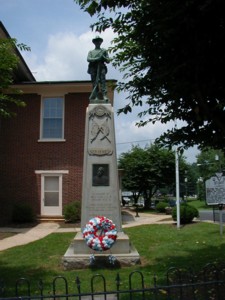 |
Stuart, James Ewell Brown "Jeb" J.E.B. Stuart James Ewell Brown "Jeb" Stuart was a U.S. Army officer from Virginia and a Confederate States Army general during the American Civil War. He was known to his friends as "Jeb", from the initials of his given names. Stuart was a cavalry commander known for his mastery of reconnaissance and the use... |
Major General | Born February 6, 1833, Patrick County, Virginia. USMA, 1854. 1st United State Cavalry until Virginia seceded. Colonel 1st Virginia Volunteer Cavalry Regiment. Fought at Battle of First Bull Run (First Manassas). Brigadier general, September 24, 1861. Fought in Seven Days' Battles. Rode completely around Union Major General McClellan's army gathering information. Major general, July 25, 1862. Commanded cavalry corps of the Army of Northern Virginia. Seized large amount of supplies and documents before Battle of Second Bull Run (Second Manassas). Detained Union force at Crampton Gap before Battle of Antietam. At Fredericksburg, and with Stonewall Jackson on flank march at Chancellorsville. Fought at Battle of Brandy Station. Controversial ride around Union Army before Battle of Gettysburg delayed his arrival until last day of the battle. Mortally wounded at the Battle of Yellow Tavern Battle of Yellow Tavern The Battle of Yellow Tavern was fought on May 11, 1864, as part of the Overland Campaign of the American Civil War. Union cavalry under Maj. Gen. Philip Sheridan was detached from the Army of the Potomac to conduct a raid on Richmond, Virginia, and challenge legendary Confederate cavalry... , May 11, 1864 and died at Richmond the following day. Son-in-law of Union Brigadier General Philip St. George Cooke Philip St. George Cooke Philip St. George Cooke was a career United States Army cavalry officer who served as a Union General in the American Civil War. He is noted for his authorship of an Army cavalry manual, and is sometimes called the "Father of the U.S... . Wife's brother was Confederate Brigadier General John Rogers Cooke. Skilled, daring and renowned cavalryman and intelligence officer; one of America's great cavalry commanders. Buried at Richmond, Virginia. |
T
| Image | Name | Rank | Taliaferro, William Booth William B. Taliaferro William Booth Taliaferro , was a United States Army officer, a lawyer, legislator, and Confederate general in the American Civil War.-Early life:... | Brigadier General | Born December 28, 1822, Gloucester County, Virginia. College of William and Mary, 1841; studied law at Harvard. Mexican-American War veteran. State legislator, 1850-1853. Commanded Virginia militia at time of John Brown's Harpers Ferry raid. Major general of state militia at beginning of war. Colonel, 23rd Virginia Infantry. With Brigadier General Robert Garnett in West Virginia campaign. With Stonewall Jackson in wither campaign. Brigadier general, March 4, 1862. Fought in Jackson's Valley Campaign of 1862; severely wounded at Groveton. Ordered to join General Beauregard in Charleston after Fredericksburg. Served in South Carolina, Georgia, Florida. Paroled at Greensboro, May 2, 1865, as a major general but no record of his promotion to that grade has been found. Post-war: state legislator, 1874-1879; judge of Gloucester County Court, 1891-1897. Member of board of Visitors of VMI, William and Mary. Died February 27, 1898, Gloucester County, Virginia. |
|---|---|---|---|---|---|
| Tappan, James C. | Brigadier General | Born September 9, 1825, Franklin, Tennessee. Yale University, 1845. Lawyer at Vicksburg, Mississippi, 1846. Moved to Helena, Arkansas. State legislator, 2 terms. Circuit court judge. Colonel, 13th Arkansas Infantry. Fought at the Battles of Belmont, Shiloh, Perryville, Pleasant Hill Battle of Pleasant Hill The Battle of Pleasant Hill was fought on April 9, 1864, during the Red River Campaign of the American Civil War, near Pleasant Hill, Louisiana, between Union forces led by Maj. Gen. Nathaniel P. Banks and Confederate forces, led by Maj. Gen... , and Jenkins' Ferry and during Price's Raid Price's Raid Price's Missouri Expedition, also known as Price's Raid, was an 1864 Confederate cavalry raid through the states of Missouri and Kansas during the American Civil War. While Confederate Major General Sterling Price enjoyed some successes during this campaign, he was decisively beaten at the Battle... into Missouri in 1864. Post-war: lawyer at Helena, Arkansas; two-term state legislator. Died March 19, 1906, Helena, Arkansas. |
|||
| Taylor, Richard Richard Taylor (general) Richard Taylor was a Confederate general in the American Civil War. He was the son of United States President Zachary Taylor and First Lady Margaret Taylor.-Early life:... |
Lieutenant General | Born January 27, 1826, near Louisville, Kentucky. Son of President President of the United States The President of the United States of America is the head of state and head of government of the United States. The president leads the executive branch of the federal government and is the commander-in-chief of the United States Armed Forces.... and General Zachary Taylor Zachary Taylor Zachary Taylor was the 12th President of the United States and an American military leader. Initially uninterested in politics, Taylor nonetheless ran as a Whig in the 1848 presidential election, defeating Lewis Cass... . Brother of Jefferson Davis's first wife. Yale University graduate. Served in Mexican-American War as father's military secretary. Sugar planter in Louisiana, 1850. State senator, 1856-1861. Brigadier general, October 21, 1861; major general, July 28, 1862. Fought in Jackson's Valley Campaign of 1862 and Seven Days' Battles. Assigned to command the District of West Louisiana. Defeated Union General Nathaniel Banks at the Battle of Mansfield Battle of Mansfield The Battle of Mansfield, also known as the Battle of Sabine Crossroads, occurred on April 8, 1864, in De Soto Parish, Louisiana. Confederate forces commanded by Richard Taylor attacked a Union army commanded by Nathaniel Banks a few miles outside the town of Mansfield, near Sabine Crossroads... and turned Banks back at the Battle of Pleasant Hill during the Red River Campaign. Offered to resign because General E. Kirby Smith would not allow him to follow up advantage. Lieutenant general, April 8, 1864. Assigned to Department of Alabama and Mississippi. Surrendered last Confederate forces east of the Mississippi River in May 1865. Worked for less severe application of Reconstruction laws. Died April 12, 1879, New York, New York; buried at New Orleans, Louisiana. |
|||
| Taylor, Thomas H. | Brigadier General | Born July 31, 1825, Frankfort, Kentucky. Centre College graduate. Mexican-American War veteran. Lieutenant colonel 1st Kentucky Infantry, a 12-month regiment. Fought in Peninsula Campaign. Commanded brigade at Cumberland Gap and with General E. Kirby Smith in Kentucky. Provost marshal for Lieutenant General Pemberton at Vicksburg. Captured, paroled and exchanged. Commanded District of South Mississippi and East Louisiana. Provost marshal for Lieutenant General S. D. Lee. Post commander at Mobile, Alabama at end of war. Appointed brigadier general November 4, 1862 but President Jefferson Davis failed to nominate him to the Confederate Senate at that grade. Post-war: returned to Kentucky; deputy U.S. marshal, 5 years. Eleven years as police chief of Louisville. Died April 12, 1901 at Louisville, Kentucky; buried at Frankfort, Kentucky. | |||
| Terrill, James Barbour | Brigadier General | Born February 20, 1838, Bath County, Virginia. VMI, 1858. Lawyer at Warm Springs, Virginia at beginning of war. Major, 13th Virginia. Brother of Union General William R. Terrill William R. Terrill William Rufus Terrill was a United States Army soldier and general who was killed in action at the Battle of Perryville during the American Civil War... , who was killed at the Battle of Perryville. Fought at First Bull Run (First Manassas), Jackson's Valley Campaign, Cedar Mountain, second Bull Run (Second Manassas), Antietam (Sharpsburg). Promoted colonel May 15, 1863 after Chancellorsvile. Fought at Gettysburg. Fought in Overland Campaign. Killed at the Battle of Totopotomoy Creek Battle of Totopotomoy Creek The Battle of Totopotomoy Creek , also called the Battle of Bethesda Church, Crumps Creek, Shady Grove Road, and Hanovertown, was a battle fought May 28–30, 1864, in Union Lt. Gen. Ulysses Grant's Overland Campaign against Confederate Gen. Robert E... , Virginia (Battle of Bethesda Church) during the 1864 Overland Campaign on May 30, 1864. Date of brigadier general appointment was June 1, 1864 to rank from May 31, 1864. Buried by Union soldiers near where he fell. |
|||
| Terry, William | Brigadier General | Born August 14, 1824, Amherst County, Virginia. University of Virginia, 1848. Lawyer and newspaper editor in Wytheville, Virginia. Lieutenant, 4th Virginia Infantry; major after Battle of First Bull Run (First Manassas). Fought in Seven Days' Battles, Second Manassas (where wounded). Colonel September 1863. Brigadier general, May 19, 1864. Fought with Army of Northern Virginia from Fredericksburg to siege of Petersburg. Severely wounded at the Battle of Fort Stedman, Virginia, March 25, 1865, during the Siege of Petersburg. Post-war: lawyer. Served two terms in the United States House of Representatives in 1871–1873 and 1875–1877. Died September 5, 1888, hit by a freshet trying to cross a freshet and drowned; Buried at Wytheville, Virginia. | |||
| Terry, William R. William R. Terry William Richard Terry was a businessman, politician, prison superintendent and a brigadier general in the Confederate Army during the American Civil War.-Biography:... |
Brigadier General | Born March 12, 1827, Liberty, Virginia. Graduate of VMI and University of Virginia. Merchant. Captain of cavalry at start of war. Fought at First Bull Run (First Manassas). Colonel 24th Virginia Infantry. Wounded seven times, including during Pickett's Charge at the Battle of Gettysburg and Dinwiddie Court House near Petersburg before the Battle of Five Forks. Would at Battle of Williambsburg. Led regiment at Second Bull Run (Second Manassas), Brigadier general, May 31, 1864. Post-war: Member of Virginia Senate for eight years after the war. | |||
| Thomas, Allen | Brigadier General | Born December 14, 1830, Howard County, Maryland. Princeton University, law, 1850. Moved to Louisiana after marriage, planter. Major of Louisiana infantry battalion. Colonel, 29th Louisiana Infantry, May 3, 1862. Captured and paroled at Vicksburg. Assigned to gather and organize paroled prisoners in the west. Brigadier general, February 4, 1864. Assigned to his brother-in-law's, Lt. Gen. Richard Taylor's department. Commanded division after General de Polignac departed for Europe. Post-war planter, Presidential elector, professor and member of the board of supervisors of Louisiana State University; coiner of the New Orleans mint and U.S. counsul to Venezuela. Moved to Florida, 1889-1907. Bought a plantation at Waveland, Mississippi Waveland, Mississippi Waveland is a city located in Hancock County, Mississippi, on the Gulf of Mexico. It is part of the Gulfport–Biloxi, Mississippi Metropolitan Statistical Area. The City of Waveland was incorporated in 1972. As of the 2000 census, the city had a total population of 6,674... in 1907, died there December 3, 1907; buried Donaldsonville, Louisiana Donaldsonville, Louisiana Donaldsonville is a city in and the parish seat of Ascension Parish, Louisiana, United States, along the west bank of the Mississippi River. The population was 7,605 at the 2000 census. It is part of the Baton Rouge Metropolitan Statistical Area.-History:Acadians began to settle in the area in... . |
|||
| Thomas, Bryan Morel Bryan M. Thomas Bryan Morel Thomas was an American soldier, farmer, marshal, and educator. He served as an officer in the United States Army, and later in the Confederate States Army during the American Civil War. He was a son-in-law of Jones M. Withers, under whom Thomas would serve in the war... |
Brigadier General | Born May 8, 1836 near Milledgeville, Georgia. USMA, 1858. Resigned from U.S. Army April 6, 1861. Lieutenant in Confederate regular army. Served on the staff of Major General Jones M. Withers at Shiloh, in Kentucky campaign and at Murfreesboro (Stones River). Colonel of reserve cavalry regiment in Brigadier General Clanton's brigade in Alabama. Brigadier General, August 4, 1864. Commander of a mixed brigade of infantry, cavalry and artillery in the Department of the Gulf. Captured at Fort Blakely, Alabama, April 9, 1865. Post-war planter in Georgia, deputy U.S. marshal, founder of a private school, 1884. Superintendent of public schools, Dalton, Georgia, 1891-1905. Died July 16, 1905, Dalton, Georgia. | |||
| Thomas, Edward Lloyd | Brigadier General | Born March 23, 1825, Clarke County, Georgia. Emory College graduate. Mexican-American War veteran. Planter. Colonel, 35th Georgia Infantry, October 15, 1861. Fought at Seven Pines, Seven Days Battles, wounded at the Battle of Mechanicsville, Virginia. Fought in every major battle of the Army of Northern Virginia thereafter, except for the Battle of Antietam because he was paroling Union prisoners at Harper's Ferry. Brigadier general November 1, 1862. Paroled at Appomattox, April 9, 1865. Post-war: lived on estate until 1885 when appointed by President Cleveland to a position in the Land Department and later the Indian Bureau. Died March 8, 1898, South McAlester, Indian Territory, now Oklahoma. | |||
| Tilghman, Lloyd Lloyd Tilghman Lloyd Tilghman was a railroad construction engineer and a Confederate general in the American Civil War, killed at the Battle of Champion Hill... |
Brigadier General | Born January 18, 1816, near Claiborne, Maryland. USMA, 1836; resigned from U.S. Army, 1836. Railroad construction engineer in the South. Mexican-American War veteran. Brigadier general, October 18, 1861. Surrendered Fort Henry, Tennessee to Union Brigadier General Ulysses S. Grant in February 1862; prisoner-of-war until exchanged in Fall 1862. Fought at Second Battle of Corinth and during retreat from Holly Springs to Grenada. Killed at the Battle of Champion's Hill, Mississippi on May 16, 1863. Buried in New York City. | |||
| Toombs, Robert A. | Brigadier General | Born July 2, 1810, Wilkes County, Georgia. Graduate of Union College, New York, 1830. Lawyer, 1830. Pre-war State legislator, United States Congressman and United States Senator. Almost chosen Confederate President. Confederate Secretary of State until July 19, 1861 when appointed brigadier general. Fought in the Peninsula Campaign, Seven Days' Battles and Second Bull Run (Second Manassas) camapign. Wounded at Burnside's Bridge during the Battle of Antietam. Resigned March 4, 1863. Vocal critic of Confederate President Jefferson Davis. Served with Georgia Militia Georgia Militia The Georgia Militia existed from 1733 to 1879. It was originally planned by General James Oglethorpe prior to the founding of the Province of Georgia, the British colony that would become the state of Georgia. One reason for the founding of the colony was to act as a buffer between the Spanish... during Sherman's March to the Sea Sherman's March to the Sea Sherman's March to the Sea is the name commonly given to the Savannah Campaign conducted around Georgia from November 15, 1864 to December 21, 1864 by Maj. Gen. William Tecumseh Sherman of the Union Army in the American Civil War... . Fled abroad in 1865, returned 1867. Again became a power in Georgia politics but held no office because he did not apply for a pardon. Died December 15, 1885, Washington, Georgia. |
|||
| Toon, Thomas F. Thomas F. Toon Thomas Fentress Toon was a brigadier general in the Confederate States Army during the American Civil War.-Early life:... |
Brigadier General | Born June 10, 1840, Columbia County, North Carolina. Wake Forest College Wake Forest University Wake Forest University is a private, coeducational university in the U.S. state of North Carolina, founded in 1834. The university received its name from its original location in Wake Forest, north of Raleigh, North Carolina, the state capital. The Reynolda Campus, the university's main campus, is... , 1861. June 1861, first lieutenant, July 1861 captain of company in 20th North Carolina Infantry. Fought at Seven Pines, the Seven Days battles, South Mountain, and Fredericksburg. Colonel, February 26, 1863. Led regiment in Jackson's flank attack at Chancellorsville; fought at Gettysburg, in the Mine Run campaign, the Wilderness and Spotsylvania Court House. Brigadier general, May 31, 1864. Commanded brigade in Valley Campaign of 1864 and at Battle of Monocacy. In Siege of Petersburg. Wounded seven times, most severely at the Battle of Fort Stedman Battle of Fort Stedman The Battle of Fort Stedman was fought on March 25, 1865, during the final days of the American Civil War. The Union Army fortification in the siege lines around Petersburg, Virginia, was attacked in a pre-dawn Confederate assault by troops led by Maj. Gen. John B. Gordon. The attack was the last... , Virginia, March 25, 1865. Reverted to grade (rank) of colonel when General R. D. Johnston returned to his command of the brigade in August 1864. Returned to North Carolina after the war, moved to Robeson County in 1891; state superintendent of education, 1901-1902. Died February 19, 1902, Raleigh, North Carolina. |
|||
| Tracy, Edward D. Edward D. Tracy Edward Dorr Tracy was a general of the Confederate States Army during the American Civil War. After serving in Eastern Tennessee, he was killed in the Siege of Vicksburg at the Battle of Port Gibson. Prior to the war, he was a lawyer.... |
Brigadier General | Born November 5, 1833, Macon, Georgia. Lawyer, moved to Huntsville, Alabama in 1850s. Captain of a Madison County company that became part of 4th Alabama Infantry. Fought at First Bull Run (First Manassas). Lieutenant colonel of 19th Alabama Infantry, October 12, 1861. Horse killed under him at Shiloh. Went to East Tennessee with McCown's division. Brigadier general, August 16, 1862. Sent to Vicksburg early in 1863. Killed at the Battle of Port Gibson Battle of Port Gibson The Battle of Port Gibson was fought near Port Gibson, Mississippi, on May 1, 1863, between Union and Confederate forces during the Vicksburg Campaign of the American Civil War. The Union Army was led by Maj. Gen. Ulysses S... , Mississippi, May 1, 1863. Buried at Macon, Georgia. |
|||
| Trapier, James H. James H. Trapier James Heyward Trapier was a career United States Army officer who fought during the Mexican–American War... |
Brigadier General | Born November 24, 1815, near Georgetown, South Carolina. USMA graduate, 1838, 3rd in class. Resigned from U.S. Army in 1848, resided on plantation in South Carolina, active in militia. With Beauregard in construction of batteries in Charleston Harbor. Brigadier general, October 21, 1861; assigned to command District of Eastern and Middle Florida. Commanded a division at Second Battle of Corinth. Criticized by Florida State convention and by General Braxton Bragg. Held inferior posts in South Carolina until end of war. Died December 21, 1865, Georgetown, South Carolina, aged 50. | |||
| Trimble, Isaac Ridgeway Isaac R. Trimble Isaac Ridgeway Trimble was a United States Army officer, a civil engineer, a prominent railroad construction superintendent and executive, and a Confederate general in the American Civil War, most famous for his leadership role in the assault known as Pickett's Charge at the Battle of... |
Major General | Born May 15, 1802, Culpeper County, Virginia. USMA graduate, 1822. Resigned for the U.S. Army in 1832 to enter the field of railroad development. Burned bridges north of Baltimore at the outbreak of the Civil War. Colonel of engineers in State forces, building defenses of Norfolk, Virginia. Brigadier general, August 9, 1861. Fought in Jackson's Valley Campaign, the Seven Days' Battles, at Cedar Mountain and with Jackson in capture of Manassas Junction. Severely wounded at the Battle of Second Bull Run (Second Manassas). Major general, January 17, 1863. Lost a leg and was captured during Pickett's Charge at the Battle of Gettysburg, July 3, 1863. Not exchanged until February 1865; unable to rejoin army before surrender. Died January 2, 1888, Baltimore, Maryland. | |||
| Tucker, William F. William F. Tucker William Feimster Tucker was a brigadier general in the Confederate States Army during the American Civil War.-Early life:... |
Brigadier General | Born May 9, 1827, Iredell County, North Carolina. Emory and Henry College, 1848. Lawyer and probate judge. Captain in 11th Mississippi Infantry. Fought at the Battle of First Bull Run (First Manassas). Company was transferred to 41st Mississippi Infantry in the west with Tucker as colonel, May 8, 1862. Led regiment at Perryville, Murfreesboro (Stones River), Chickamauga and Chattanooga. Brigadier general, March 1, 1864. Severely wounded at the Battle of Resaca, Georgia, May 14, 1864 and incapacitated for further field duty. Commanded District of Southern Mississippi and East Louisiana at end of the war. Post-war lawyer, state legislator, elected 1876, 1878. Murdered September 14, 1881, Okolona, Mississippi, allegedly by two men hired by a person against whom Tucker had a case pending for misappropriation of guardianship funds. | |||
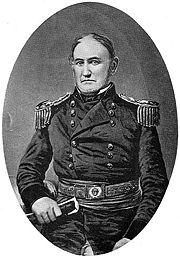 |
Twiggs, David Emanuel | Major General | Born in 1790, Richmond County, Georgia. Captain in 8th United States Infantry Regiment, March 12, 1812. Veteran of War of 1812 War of 1812 The War of 1812 was a military conflict fought between the forces of the United States of America and those of the British Empire. The Americans declared war in 1812 for several reasons, including trade restrictions because of Britain's ongoing war with France, impressment of American merchant... and Mexican-American War. Promoted to brigadier general and brevetted major general for Mexican-American War service. One of the four general officers of the line in the pre-Civil War U.S. Army. Surrendered U.S. Army forces and military stores in Texas before the beginning of the Civil War and for this reason was dismissed from the U.S. Army on March 1, 1861. Appointed major general in the Confederate Army on May 22, 1861 and assigned to command District of Louisiana, but soon was virtually retired due to infirmities. Died July 15, 1862, Augusta, Georgia; buried on property where born. |
||
| Tyler, Robert C. Robert C. Tyler Brigadier General Robert Charles Tyler was a Confederate General. He is generally credited with being born in MD, although some claim he was born in Jonesborough, Tennessee. He served as an officer on William Walker's filibustering army... |
Brigadier General | Stated age as 28 when enlisted as private in Company D of 15th Tennessee Infantry, April 18, 1861. Supposed to have been born in Baltimore, Maryland but no definite record. Nothing known before his participation in William Walker's 1856 filibuster expedition to Nicaragua. Then moved from Baltimore to Memphis. Quartermaster, then lieutenant colonel of 15th Tennessee Infantry. At Battle of Belmont. Wounded at the Battle of Shiloh. After Second Battle of Corinth, was elected colonel of regiment. For a time was General Bragg's provost marshal during the Kentucky campaign. Wounded and lost a leg at the Battle of Missionary Ridge. Brigadier general February 23, 1864 but appears not to have rejoined army. Posted to duty at West Point, Georgia. With a small group of extra-duty men, militia and detached soldiers, defended Fort Tyler at West Point from forces of Union Major General James H. Wilson; killed by a sharpshooter, August 16, 1865, one week after the surrender of General Robert E. Lee and the Army of Northern Virginia. Buried at West Point, Georgia. |
V
| Image | Name | Rank | Date, Place of Birth | Date, Place of Death | Vance, Robert Brank Robert B. Vance Robert Brank Vance , nephew of the earlier Congressman Robert Brank Vance and brother of Zebulon Baird Vance, was a North Carolina Democratic politician who served as a member of the U.S. House of Representatives for six terms . He was chairman of the United States House Committee on Patents... | Brigadier General rank: March 4, 1863 nom: March 9, 1863 conf: April 23, 1863 |
April 24, 1828 Buncombe County, North Carolina |
November 28, 1899 Asheville, North Carolina |
Pre-war: Older brother of North Carolina Governor and U.S. Senator Zebulon Vance. Merchant, planter, clerk of court of pleas and quarter sessions. War: Recruited "Buncombe Life Guards" company, elected captain. Colonel, 29th North Carolina Infantry, when formed. In East Tennessee in defense of Cumberland Gap and in Kentucky Campaign with Major General E. Kirby Smith. Fought at Murfreesboro (Stones River), contracted yellow fever. As brigadier general, assigned to duty in Western North Carolina; captured at Crosby Creek, North Carolina, January 14, 1864, exchanged and final parole: March 10, 1865. Post-war: U.S. Congressman, 1873-1885. Assistant commissioner of patents, 1885-1889. State legislator, 1894-1896. |
|---|---|---|---|---|---|---|---|---|---|
| Van Dorn, Earl "Buck" Earl Van Dorn Earl Van Dorn was a career United States Army officer, fighting with distinction during the Mexican-American War and against several tribes of Native Americans... |
Major General rank, nom: September 19, 1861 conf: December 13, 1861 Brigadier General rank, nom: June 5, 1861 conf: August 28, 1861 |
September 17, 1820 Port Gibson, Mississippi |
May 7, 1863 Spring Hill, Tennessee |
Pre-war: USMA graduate, 1842, 52nd of 56. Indian campaigns and Mexican-American War veteran. War: Confederate colonel upon joining CSA, then brigadier general, June 5, 1861. Commander of Confederate Army of the West. Defeated at battle of Pea Ridge (Elkhorn Tavern). Transferred to Army of Mississippi at Vicksburg. Defeated at Second Battle of Corinth by Union General William S. Rosecrans. Relieved by Lieutenant General John C. Pemberton. Destroyed Union Major General Grant's supply depots at Holly Springs, Mississippi, December 1862. Killed by a Dr. Peters, May 7, 1863, who alleged Van Dorn "violated the sanctity of his home." | |||||
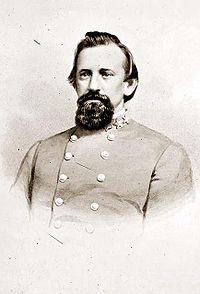 |
Vaughan, Alfred Jefferson Jr. Alfred Jefferson Vaughan, Jr. Alfred Jefferson Vaughan, Jr. was an American civil engineer, planter, soldier, and writer. He served as a Confederate general during the American Civil War, in which he was wounded twice, and fought mainly in the Western Theater of the conflict.After the war Vaughan resumed farming, was active in... |
Brigadier General rank: November 18, 1863 nom: November 21, 1863 conf: February 17, 1864 |
May 10, 1830 Dinwiddie County, Virginia |
October 1, 1899 Indianapolis, Indiana |
Pre-war: VMI graduate, 1851. Civil engineer, deputy U.S. surveyor in Southern California, private secretary to Alfred Cumming of Georgia who was negotiating a treaty with Indians of the upper Missouri River area for the Northern Pacific Railroad. Farmer in Marshall County, Mississippi, 1856. War: Captain of Dixie Rifles of Moscow, Tennessee. Lieutenant colonel, then colonel, 13th Tennessee Infantry. Fought in every battle in the west from Belmont to Vining Station. Wounded, lost leg at the Battle of Vining Station, Georgia during the Atlanta Campaign. Post-war: farmer in Mississippi until 1872 when moved to Memphis, prominent in Grange movement Grange movement The National Grange of the Order of Patrons of Husbandry, also simply styled the Grange, is a fraternal organization for American farmers that encourages farm families to band together for their common economic and political well-being... . Clerk of the criminal court of Shelby County, elected 1872, 1882. Commander of Tennessee Division of United Confederate Veterans, 1897-1899. Buried at Memphis, Tennessee. |
||||
| Vaughn, John C. John C. Vaughn John C. Vaughn was a Confederate cavalry officer from East Tennessee.He served in the Mexican-American War, prospected in the California Gold Rush, and participated in American Civil War battles... |
Brigadier General rank: September 22, 1862 nom: September 26, 1862 conf: October 3, 1862 |
February 24, 1824 Roane County, Tennessee |
September 10, 1875 Thomasville, Georgia |
Pre-war: Mexican-American War veteran. Merchant. War: Witnessed bombardment of Fort Sumter. Colonel, 3rd Tennessee Infantry, June 6, 1861. Reported to Harpers Ferry, fought at Battle of First Bull Run (First Manassas). Fought at Vicksburg, captured July 4, 1863. Commanded cavalry brigade during the Shenandoah Valley Campaign (1864). Fought at Battle of Piedmont Battle of Piedmont The Battle of Piedmont was fought June 5, 1864, in the village of Piedmont, Augusta County, Virginia. Union Maj. Gen. David Hunter engaged Confederates under Brig. Gen. William E. "Grumble" Jones north of Piedmont. After severe fighting, Jones was killed and the Confederates were routed... , with Lieutenant General Early in march on Washington, wounded at Martinsburg, West Virginia. In command in East Tennessee, joined General Joseph E. Johnston's forces in North Carolina. Brigade formed part of Jefferson Davis's escort in flight south after fall of Richmond. Paroled May 9, 1865, Washington, Georgia. Post-war: lived in Brooks County, Georgia and Monroe County, Tennessee; one term as presiding officer of Tennessee senate. |
|||||
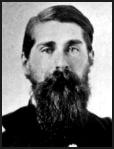 |
Villepigue, John Bordenave John Bordenave Villepigue John Bordenave Villepigue was a career U.S. Army officer who served on the Western Frontier and became a Confederate general in the American Civil War... |
Brigadier General rank: March 13, 1862 nom: March 14, 1862 conf. March 18, 1862 |
July 2, 1830 Camden South Carolina |
November 9, 1862 Port Hudson, Louisiana |
Pre-war: USMA graduate, 1854. Resigned from U.S. Army, March 31, 1861. War: Captain of artillery in Regular Confederate Army. Colonel, 36th Georgia Infantry. Commanded at Pensacola and Mobile, Alabama until promoted and ordered to join General Bragg at Corinth. Assigned to command Fort Pillow on the Mississippi River. Ordered to retire, blew up fort. Commanded a brigade under Major General Van Dorn at Second Battle of Corinth. Died of "fever," November 9, 1862. Ancestor of World War I Medal of Honor recipient John Canty Villepigue John C. Villepigue John Canty Villepigue was a S.C. National Guard 118th Infantry Regiment, 30th Infantry Division, United States Army Corporal who received the Medal of Honor for his actions during World War I.-Biography:... . |
W
| Image | Name | Rank | Date, Place of Birth | Date, Place of Death | Walker, John George John George Walker John George Walker was a Confederate general in the American Civil War.-Early life and military career:Walker was born in Jefferson City, Missouri... | Major General rank:, nom: November 8, 1862 conf: April 22, 1863 Brigadier General nom: December 9, 1861 rank, conf: January 9, 1862 |
July 22, 1822 Cole County, Mississippi |
July 20, 1893 Winchester, Virginia |
Pre-war: Jesuit College, St. Louis. U.S. Army commission, 1846. Mexican-American War veteran. War: Major of cavalry in Regular Confederate Army. Lieutenant colonel of 8th Texas Cavalry. Fought in Maryland Campaign, including Harpers Ferry, Antietam (Sharpsburg). Transferred to the Trans-Mississippi Department after Battle of Antietam. Command of Texas Infantry division. After fighting in Red River Campaign, relieved Lieutenant General Richard Taylor in District of West Louisiana. End of War: Command of a division in District of Texas, New Mexico and Arizona. Went to Mexico before being paroled. Post-war: U.S. consul at Bogota, Columbia; special commissioner to South American republics for Pan-American Convention. Buried at Winchester, Virginia. |
|---|---|---|---|---|---|---|---|---|---|
| Walker, Leroy Pope LeRoy Pope Walker LeRoy Pope Walker was the first Confederate States Secretary of War.-Early life and career:Walker was born near Huntsville, Alabama in 1817, the son of John Williams Walker and Matilda Pope, and a grandson of LeRoy Pope. He was educated by private tutors, then attended universities in Alabama and... |
Brigadier General rank:, nom: September 17, 1861 conf: December 13, 1861 |
February 7, 1817 Huntsville, Alabama |
August 22, 1884 Huntsville, Alabama |
Pre-war: Attended University of Alabama; left to study law; lawyer, 1837. State legislator; judge of circuit court, delegate to Nashville Convention Nashville Convention The Nashville Convention was a political meeting held in Nashville, Tennessee, on June 3 – 11, 1850. Delegates from nine slave holding states met to consider a possible course of action if the United States Congress decided to ban slavery in the new territories being added to the country as a... , secessionist. War: First Confederate Secretary of War; resigned September 16, 1861; appointed brigadier general September 17, 1861; garrison command at Mobile, Alabama and Montgomery, Alabama; resigned March 31, 1862; presided over military court, April 6, 1864 until end of war as a colonel. Post-war: Lawyer at Huntsville, Alabama; president of state constitutional convention of 1875; delegate to Democratic Party National Conventions, 1876, 1884. |
|||||
| Walker, Lucius M. Lucius M. Walker Lucius Marshall "Marsh" Walker was a Confederate general during the American Civil War. He was mortally wounded in a duel with fellow general John S. Marmaduke.-Early life and career:... |
Brigadier General rank:, nom: March 11, 1862 conf: April 11, 1862 |
October 18, 1829 Columbia, Tennessee |
September 6, 1863 Little Rock, Arkansas |
Pre-war: USMA graduate, 1850. Resigned, 1852; mercantile business at Memphis, Tennessee. War: Lieutenant colonel, 40th Tennessee Infantry; colonel, November 11, 1861; assigned to Memphis. Ill during Battle of Shiloh. Fought at Second Battle of Corinth, Tupelo, Farmington. Distrusted by General Braxton Bragg. Transferred to Trans-Mississippi Department under General E. Kirby Smith. Commanded cavalry brigade in Major General Sterling Price's attack on Helena, Arkansas. Killed in a duel with General John S. Marmaduke, who questioned Walker's courage, on September 6, 1863. Price had tried to prevent the duel. Buried at Memphis, Tennessee. | |||||
| Walker, Reuben Lindsay Reuben Lindsay Walker Reuben Lindsay Walker was a Confederate general who served in the artillery during the American Civil War.-Early life:... |
Brigadier General rank: February 18, 1865 nom: February 24, 1865 conf: March 1, 1865 |
May 29, 1827 Logan County, Virginia |
June 7, 1890 Fluvanna County, Virginia |
Pre-war: VMI, 1845. Civil engineer; farmer in New Kent County, Virginia. War: artillery commander; fought at First Bull Run (First Manassas); 63 battles with Army of Northern Virginia. Major, March 31, 1862, then lieutenant colonel, colonel; A.P. Hill's chief of artillery. Only leave of absence during Seven Days Battles due to illness. Paroled, May 8, 1865. Post-war: farmer at Selma, Alabama; superintendent, Marine and Selma Railroad, construction engineer of Richmond street railways; Richmond and Alleghany Railroad, Virginia state penitentiary and for Texas State Capitol. Farmer in Fluvanna County, Virginia, 1888-1890. | |||||
| Walker, William H.T. | Major General rank: May 23, 1863 nom: June 27, 1863 conf: January 25, 1864 Brigadier General rank, nom: February 9, 1863 conf: March 2, 1863 |
November 26, 1816 Augusta, Georgia |
July 22, 1864 Atlanta, Georgia |
Pre-war: USMA graduate, 1837. Wounded in Seminole Wars; gravely wounded in Mexican-American War. Resigned as major U.S. Army, December 20, 1860. War: Brigadier general in Confederate Army, May 25, 1861. At Pensacola, Florida, in Northern Virginia. Resigned October 29, 1861; commissioned major general of Georgia state troops. Recommissioned brigadier general, then major general in Confederate service in 1863. In Vicksburg campaign with General Joseph E., Johnston; commanded Reserve Corps at Chickamauga. Killed by a picket of Union Army's 16th Corps at the Battle of the Atlanta, July 22, 1864. Buried at Augusta, Georgia. | |||||
| Walker, William Stephen | Brigadier General rank, nom: October 30, 1862 conf: April 22, 1863 |
April 13, 1822 Pittsburgh, Pennsylvania |
June 7, 1899 Atlanta, Georgia |
Pre-war: Raised by uncle, U.S. Secretary of the Treasury and Senator Robert J. Walker Robert J. Walker Robert John Walker was an American economist and statesman.- Early life and education :Born in Northumberland, Pennsylvania, the son of a judge. He lived in Bellefonte, Pennsylvania from 1806 to 1814, where his father was presiding judge of the judicial district. Walker was educated at the... , Mississippi, also from Pennsylvania, who adhered to the Union during the Civil War. Mexican-American War veteran; mustered out August 31, 1848. Commissioned captain of 1st U. S. Cavalry Regiment in 1855 when U.S. Army expanded. Resigned May 1, 1861. War: Captain in Regular Confederate Army as from Florida. Colonel and acting inspector general of Department of South Carolina and Georgia. Commanded various districts; at Kinston, North Carolina in 1864, then with General Beauregard in defense of Petersburg. Wounded, captured at Petersburg on May 20, 1864, foot amputated, exchanged in Fall 1864. In command in North Carolina at the end of the war. Paroled May 1, 1865. Post-war: Lived at Atlanta, Georgia. |
|||||
| Wallace, William Henry | Brigadier General (temporary) rank, nom: September 30, 1864 conf: September 21, 1864 |
March 24, 1827 Laurens District, South Carolina |
March 21, 1901 Union, South Carolina. |
Pre-war: South Carolina College, 1849. Planter, newspaper publisher, lawyer, State legislator, 1860. War: Enlisted as private, 18th South Carolina Infantry; lieutenant colonel, May 1862. Led regiment into Virginia shortly after Seven Days Battles. Colonel killed at Second Bull Run (Second Manassas), Wallace succeeded him but was not nominated until June 10, 1864. Fought at battles of South Mountain and Antietam (Sharpsburg), defense of Charleston, South Carolina, and Siege of Petersburg. Fought at Battle of the Crater, July 30, 1864. Led brigade at Petersburg and in Appomattox Campaign. Paroled April 9, 1865. Post-war: lawyer, planter, State legislator. Circuit judge, 1877-1893. | |||||
| Walthall, Edward Cary | Major General (temporary) rank: June 6, 1864 nom: June 9, 1864 conf: June 10, 1864 Brigadier General rank: December 12, 1862 nom: December 23, 1862 conf: April 23, 1863 |
April 4, 1831 Richmond, Virginia |
April 21, 1898 Washington, D.C. |
Pre-war: Moved to Holly Springs, Mississippi, age 10. Lawyer, 1852. District attorney. War: 1st lieutenant, Yalobusha Rifles, 15th Mississippi Infantry; soon lieutenant colonel. Colonel, 29th Mississippi Infantry, April 11, 1862. Battles: Second Battle of Corinth, Kentucky campaign (except ill at Murfreesboro), Chickamauga, Chattanooga, Atlanta campaign, Franklin-Nashville campaign, Carolinas campaign. With Army of Tennessee through the war. Wounded at "Battle Above the Clouds" at Chattanooga. Two horses killed under him at Battle of Franklin, Tennessee where six other Confederate generals died. Commanded rear guard from Nashville. Paroled at Greensboro, May 1, 1865. Post-war: lawyer, leader of movement to overthrow carpetbag government in Mississippi. United States Senator, 1885-1898. Buried at Holly Springs, Mississippi. | |||||
| Waterhouse, Richard Richard Waterhouse (general) Richard Waterhouse was an American Civil War Confederate brigadier general.-Early life:Waterhouse was born in Rhea County, Tennessee. As a teenager, he ran away from home to fight in the Mexican–American War. After he returned, he and his parents moved to San Augustine, Texas in 1849... |
Brigadier General rank March 17, 1865 nom, conf: March 18, 1865 |
January 12, 1832 Rhea County, Tennessee |
March 20, 1876 Waco, Texas |
Pre-war: Mexican-American War veteran; fought while still a boy. Moved to San Augustine, Texas, 1849; mercantile business. War: Recruited 19th Texas Infantry, colonel, May 13, 1862. In major battles in the Trans-Mississippi Department. Fought at Milliken's Bend, Mansfield, Pleasant Hill. Assigned to command as brigadier general to date from April 30, 1864 by General E. Kirby Hill. Officially appointed to rank from March 17, 1865 by Jefferson Davis. Post-war: Land speculator in San Augustine and Jefferson, Texas. Fell down stairs at a Waco hotel and dislocated shoulder, died of pneumonia two days later. Buried at Jefferson, Texas | |||||
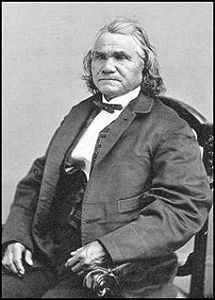 |
Watie, Stand Stand Watie Stand Watie , also known as Standhope Uwatie, Degataga , meaning “stand firm”), and Isaac S. Watie, was a leader of the Cherokee Nation and a brigadier general of the Confederate States Army during the American Civil War... |
Brigadier General rank, nom: May 6, 1864 conf: May 10, 1864 |
December 12, 1806 near Rome, Georgia |
September 9, 1871, Delaware County, Oklahoma |
Pre-war: Planter in Georgia, published Cherokee newspaper. Signed treaty agreeing to removal of Cherokee from Georgia, 1835; split tribe; leader of minority "treaty" faction. War: Leader of a minority faction of the Cherokees in Oklahoma in allegiance to the Confederacy. Colonel, 1st Cherokee Mounted Rifles, 1861. Battles: Wilson's Creek, Pea Ridge (Elkhorn Tavern), raids, skirmishes. Last Confederate general to surrender, June 23, 1865. Post-war: Planter, business enterprises. | ||||
| Waul, Thomas N. | Brigadier General rank: September 18, 1863 nom: September 19, 1863 conf: June 10, 1864 |
January 5, 1813 Sumter District, South Carolina |
July 28, 1903 Hunt County, near Greenville, Texas |
Pre-war: Attended South Carolina College until junior year. Teacher at Florence, Alabama. Lawyer at Vicksburg, Mississippi, 1835. Moved to Gonzales County, Texas: lawyer, planter. Elected to Provisional Confederate Congress, 1861. Recruited Waul's Texas Legion, colonel, May 17, 1862. Surrendered at Vicksburg, exchanged September 18, 1863. Fought in Red River campaign Battles of Mansfield, Pleasant Hill and Camden Expedition Battle of Jenkins' Ferry. Post-war: First Texas reconstruction convention. Lawyer at Galveston. Later in life retired to a farm in Hunt County, Texas. | |||||
| Wayne, Henry C. Henry C. Wayne Henry Constantine Wayne was an United States Army officer, and is known for his commanding the expedition to test the U.S. Camel Corps as part of Secretary of War Jefferson Davis's plan to use camels as a transport in the West... |
Brigadier General rank, nom: December 16, 1861 conf: December 24, 1861 |
September 18, 1815 Savannah, Georgia |
March 15, 1883 Savannah, Georgia |
Pre-war: USMA, 1838. 4th Artillery; transferred to quartermaster department, 1846. Mexican-American War veteran. Procured camels to test as means of army transportation in the southwestern U.S. Resigned from U.S. Army, December 31, 1860. War: Adjutant and inspector general of State of Georgia. Resigned brigadier general appointment after three weeks; on January 7, 1862, four days after being ordered to Manassas Junction and returned to former position as adjutant and inspector general of Georgia Militia until end of the war. Directly in command of Georgia militia until relieved by General G. W. Smith. Post-war: Lumber business in Savannah, Georgia, 1866-1875. | |||||
| Weisiger, David A. | Brigadier General rank: July 30, 1864 nom: November 1, 1864 conf: February 3, 1865 |
December 23, 1818 Chesterfield County, Virginia |
February 23, 1999 Richmond, Virginia |
Pre-war: Mexican-American War veteran. Officer of the day in Virginia militia at hanging of John Brown in 1859. War: Colonel, 12th Virginia Infantry, May 9, 1861. Battles: Seven Pines, Seven Days' Battles, Second Manassas. Wounded, disabled from Second Manassas to following July. Succeeded Major General William Mahone in brigade command. Along with Mahone, Waul led successful counterattack at the Battle of the Crater at Petersburg, Virginia, July 30, 1864. Wounded at the Crater. Paroled at Appomattox, April 9, 1864. Post-war: Bank cashier at Petersburg, Virginia; businessman at Richmond, Virginia. Buried at Petersburg, Virginia. | |||||
| Wharton, Gabriel Colvin Gabriel C. Wharton Gabriel Colvin Wharton was an American civil engineer and soldier who served as a general in the Confederate Army during the American Civil War. After the war he was a politician and later resumed his engineering work.... |
Brigadier General rank: July 8, 1863 nom: September 25, 1863 conf: February 17, 1864 |
July 23, 1824 Culpeper County, Virginia |
May 12, 1906 Radford, Virginia |
Pre-war: VMI, 1847, 2d in class. Civil engineering, mining interest, in Arizona. War: Major, 45th Virginia Infantry, July 1861. Colonel, 59th Virginia Infantry, August 1861. Battles: West Virginia campaign with Floyd. Escaped with Floyd from Fort Donelson in February 1862, then transferred east. Frequently operated in western Virginia. With Longstreet in East Tennessee. In Valley Campaign of 1864, Battle of New Market, pursued Hunter, with Early in campaign near Washington. Command overwhelmed and dispersed at Waynesboro, Virginia, March 1865. Paroled at Lynchburg, Virginia, June 21, 1865. Post-war: Resided in Radford, Virginia; elected several times to state senate, developed mining in the state. | |||||
| Wharton, John A. John A. Wharton John Austin Wharton was a lawyer, plantation owner, and Confederate general during the American Civil War. He is considered one of the Confederacy's best tactical cavalry commanders.-Early life:... |
Major General rank: November 10, 1863 nom: November 12, 1863 conf. January 25, 1864 Brigadier General rank, nom: November 18, 1862 conf: April 22, 1863 |
July 3, 1828 near Nashville, Tennessee |
April 6, 1865 Houston, Texas |
Pre-war: Moved to Texas at young age. Educated at South Carolina College. Lawyer at Brazoria, Texas. Member of secession convention. War: Captain in Terry's Texas Rangers, 8th Texas Cavalry. Commander after deaths of Terry, Lubbock. Wounded at Shiloh; in Kentucky campaign. Served under Forrest, Wheeler. Battles of Murfreesboro, Chickamauga. Assigned to command cavalry in Richard Taylor's department. Red River campaign. Remainder of war in Trans-Mississippi Department. Killed by Colonel George W. Baylor, 2nd Texas Cavalry, on April 6, 1865 after Baylor stated the unarmed Wharton slapped him and called him a liar. Buried at Austin, Texas. | |||||
| Wheeler, Joseph Joseph Wheeler Joseph Wheeler was an American military commander and politician. He has the rare distinction of serving as a general during war time for two opposing forces: first as a noted cavalry general in the Confederate States Army in the 1860s during the American Civil War, and later as a general in the... |
Major General rank: January 20, 1863 nom: January 23, 1863 conf: February 4, 1864 Brigadier General rank, nom: October 30, 1862 conf: April 22, 1863 |
September 10, 1835 Augusta, Georgia |
January 25, 1906 Brooklyn, New York |
Pre-war: USMA, 1859. Resigned from U.S. Army, April 22, 1861. War: 1st lieutenant of artillery. Colonel, 19th Alabama Infantry, September 4, 1861. Fought at Shiloh; transferred to cavalry. Chief of cavalry of the Army of Mississippi, July 13, 1862, and the Army of Tennessee. Wounded three times. Battles: Kentucky campaign, Murfreesboro (Stones River), Chattanooga, Atlanta campaign. Raided Sherman's communications, unsuccessful in opposing Sherman's advance to Savannah. In Carolinas Campaign; succeeded by Lieutenant General Wade Hampton as command became increasingly undisciplined. Post-war: Lived in New Orleans, moved to Wheeler, Alabama, 1868. U.S. Congressman, 1882-1898. Major general of U.S. Volunteers in the Spanish-American War Spanish-American War The Spanish–American War was a conflict in 1898 between Spain and the United States, effectively the result of American intervention in the ongoing Cuban War of Independence... . Retired as brigadier general in the U.S. Army (Regular Army). One of two Confederate generals buried at Arlington National Cemetery. |
|||||
| Whitfield, John Wilkins John Wilkins Whitfield John Wilkins Whitfield was a territorial delegate to the United States Congress representing the Kansas Territory from 1854 until 1856. He was late a general in the Confederate Army during the American Civil War.... |
Brigadier General rank, nom: May 9, 1863 conf: January 25, 1864 |
March 11, 1818 Franklin, Tennessee |
October 27, 1879 Halletsville, Texas |
Pre-war: Mexican-American War veteran. Moved to Independence, Missouri, about 1853. Indian agent in Missouri and Arkansas. Congressional delegate from Kansas Territory, 1857. Register of land office at Doniphan, Kansas. War: Major, 4th Battalion Texas Cavalry. Colonel, 27th Texas Infantry. Fought at Pea Ridge (Elkhorn Tavern), Iuka, Vicksburg campaign with General Joseph E. Johnston. Wounded at Battle of Iuka Battle of Iuka The Battle of Iuka was fought on September 19, 1862, in Iuka, Mississippi, during the American Civil War. In the opening battle of the Iuka-Corinth Campaign, Union Maj. Gen. William S. Rosecrans stopped the advance of the army of Confederate Maj. Gen. Sterling Price.Maj. Gen. Ulysses S... , Mississippi. Commanded a brigade under Major General W. H. Jackson in Mississippi. Without a command later in the war. Paroled June 29, 1865, Columbus, Texas. Post-war: State legislator from Lavaca County, Texas. |
|||||
| Whiting, William Henry Chase | Major General rank: February 28, 1863 nom: March 5, 1863 conf: April 22, 1863 Brigadier General rank, nom: July 21, 1861 conf: August 28, 1861 |
March 22, 1824 Biloxi, Mississippi |
March 10, 1865 New York, New York |
Pre-war: USMA, 1845; highest grades at West Point achieved up to that time. Rivers and harbors and fortifications construction in South and California. War: Joined Joseph E. Johnston's Army of the Shenandoah as chief engineer and arranged its transfer to the Battle of First Bull Run (Manassas). Commanded a division in Jackson's Valley Campaign of 1862, Seven Pines, Seven Days Battles. After Battle of Malvern Hill, developed Fort Fisher, North Carolina. Briefly at Siege of Petersburg. Severely wounded, taken prisoner at Battle of Fort Fisher Second Battle of Fort Fisher The Second Battle of Fort Fisher was a joint assault by Union Army and naval forces against Fort Fisher, outside Wilmington, North Carolina, near the end of the American Civil War... , January 15, 1865. Died of wounds, March 10, 1865, at Fort Columbus, New York Harbor. Buried in Wilmington, North Carolina. |
|||||
| Wickham, Williams Carter Williams Carter Wickham Williams Carter Wickham was a lawyer, judge, politician, and an important Confederate cavalry general who fought in the Virginia campaigns during the American Civil War... |
Brigadier General rank: September 1, 1863 nom: September 2, 1863 conf: January 25, 1864 |
September 21, 1820 Richmond, Virginia |
July 23, 1888 Richmond, Virginia |
Pre-war: University of Virginia graduate. Lawyer, 1842, then planter. Elected to Virginia House of Delegates, 1849, Virginia Senate, 1859. Presiding justice of Hanover County court. Union supporter in principle but took militia company immediately into Confederate service upon secession of Virginia. War: Present at Battle of First Bull Run (First Manassas); lieutenant colonel, 4th Virginia Cavalry, September 1861, colonel, August 1862. With Major General Jeb Stuart's cavalry corps. Wounded at Battle of Williamsburg and during Maryland campaign. Remained with army until fall 1864 despite being elected to Second Regular Confederate Congress after Battle of Chancellorsville. Active in Valley Campaigns of 1864. Resigned November 9, 1864 to take seat in Confederate Congress. Post-war: president of Virginia Central Railroad and of the Chesapeake and Ohio Railway. Chairman of Board of Supervisors of Hanover County, Virginia, 1871-1888. Member of Virginia State senate, 1883-1888. | |||||
| Wigfall, Louis Trezevant | Brigadier General rank, nom: October 21, 1861 conf: December 30, 1861 |
April 21, 1816 Edgefield, South Carolina |
February 18, 1874 Galveston, Texas |
Pre-war: Attended University of Virginia; South Carolina College graduate, 1837. Lawyer, 1839. Fire-eater Fire-Eaters In United States history, the term Fire-Eaters refers to a group of extremist pro-slavery politicians from the South who urged the separation of southern states into a new nation, which became known as the Confederate States of America.-Impact:... Secessionist from 1844. Moved to Marshall, Texas, served in both houses of Texas legislature. U.S. Senate, 1859. Helped defeat Crittenden Compromise. Expelled from U.S. Senate, July 11, 1861. War: At Fort Sumter, tried to separately negotiate surrender with Major Anderson. Colonel, 1st Texas Infantry, August 28, 1861. Commanded Texas Brigade. Resigned February 20, 1862 to take a seat in the Confederate Senate. Supported Joseph E. Johnston; worked to undermine Jefferson Davis. Responsible for bill making Robert E. Lee General in Chief of all Confederate forces. Post-war: Lived in Texas without parole for about a year at the end of the war. Lived in England, 1866-1872. Lived in Baltimore for two years, moved to Galveston, Texas where he died a month later, February 18, 1874. |
|||||
| Wilcox, Cadmus Marcellus Cadmus M. Wilcox Cadmus Marcellus Wilcox was a career United States Army officer who served in the Mexican–American War and also was a Confederate general during the American Civil War.-Early life and career:... |
Major General rank: August 3, 1863 nom. August 13, 1863 conf: January 25, 1864 Brigadier General rank, nom: October 21, 1861 conf: December 13, 1861 |
May 29, 1824 Wayne County, North Carolina |
December 2, 1890 Washington, D.C. |
Pre-war: Grew up in Tipton County, Tennessee. University of Nashville; USMA, 1846. Mexican-American War veteran. Resigned June 8, 1861. War: At all major battles of Army of Northern Virginia. Fought at Battle of First Bull Run as colonel, 9th Alabama Infantry. Defense of Fort Gregg at Petersburg, Virginia on April 2, 1865 allowed the Confederate Army to escape from Petersburg and Richmond. Post-war: Lived in Washington, D.C. Land chief of railroad division of Land Officer, 1886-1890. Buried at Oak Hill Cemetery, Washington, D.C. | |||||
| Williams, John Stuart "Cerro Gordo" John Stuart Williams John Stuart Williams was a general in the Confederate States Army during the American Civil War and a postbellum Democratic U.S. Senator from Kentucky.-Early life and career:... |
Brigadier General rank, nom: April 16, 1862 conf: April 18, 1862 |
July 10, 1818 Near Mount Sterling, Kentucky |
July 17, 1898 Mount Sterling, Kentucky. |
Pre-war: Graduate of Miami (of Ohio) University, 1839. Lawyer. Mexican-American War veteran. Kentucky legislator, 1851-1855. War: Colonel, 5th Kentucky Infantry Regiment, November 16, 1861. Commanded Department of East Tennessee in Fall 1863. Helped defeat Union attack on salt works at Abingdon, Virginia. Later with Wheeler and in southwestern Virginia. Paroled May 9, 1865. Post-war: Farmer. Kentucky legislator, 1873-1877. U.S. Senator, 1879-1885; defeated for relection. Buried at Winchester, Kentucky. | |||||
| Wilson, Claudius C. | Brigadier General rank: November 16, 1863 nom: November 18, 1863 conf: February 17, 1864 (posthumous) |
October 1, 1831 Effingham County, Georgia |
November 27, 1863 Ringgold, Georgia |
Pre-war: Emory College graduate. Lawyer. Solicitor general for eastern circuit of Georgia. War: Captain, Company I, 25th Georgia Infantry. Served along South Carolina and Georgia coasts and with General Joseph E. Johnston in Vicksburg campaign. Commanded a brigade at Battle of Chickamauga. Died from camp fever at Ringgold, Georgia Ringgold, Georgia Ringgold is a city in Catoosa County, Georgia, United States. The population was 2,422 at the 2000 census. The city is the county seat of Catoosa County... , November 27, 1863. Posthumously confirmed as brigadier general by Confederate Senate, February 17, 1864. Buried at Savannah, Georgia. |
|||||
| Winder, Charles Sidney Charles Sidney Winder Charles Sidney Winder , was a career United States Army officer and a Confederate general officer in the American Civil War. He was killed in action during the Battle of Cedar Mountain.-Early life and career:... |
Brigadier General rank: March 1, 1862 nom: March 5, 1862 conf: March 7, 1862 |
October 18, 1829 Talbot County, Maryland |
August 9, 1862 Cedar Mountain, West Virginia |
Pre-war: USMA, 1850. Youngest captain in U.S. Army at the time, March 3, 1855, for heroism on a troop ship in a hurricane. Resigned from U.S. Army, April 1, 1861, War: Major of artillery in Confederate Regular Army to rank from March 16, 1861. Led the Stonewall Brigade in Jackson's Valley Campaign of 1862. Fought in the Seven Days Battles. Killed at the Battle of Cedar Mountain, August 9, 1862. Buried at Wye House, near Easton, Maryland. | |||||
| Winder, John H. John H. Winder John Henry Winder was a career United States Army officer who served with distinction during the Mexican War... |
Brigadier General rank, nom: June 21, 1861 conf. June 28, 1861 reappointed nom. June 6, 1864 conf: June 10, 1864 |
February 21, 1800 Somerset County, Maryland |
February 7, 1865 Florence, South Carolina |
Pre-war: USMA, 1820. Mexican-American War veteran. Resigned as major, 3rd U.S. Artillery, April 27, 1861. War: Provost marshal in Richmond, Virginia. Appointed commissary general of prisoners, November 21, 1864; died February 7, 1865, aged 64. Accused by Northern press and public of starving Union prisoners of war, but, in mitigation, he had to cope with food shortages and unavailable or unreliable transport. Buried at Green Mountain Cemetery, Baltimore, Maryland. | |||||
| Wise, Henry A. Henry A. Wise Henry Alexander Wise was an American politician and governor of Virginia, as well as a general in the Confederate States Army during the American Civil War.-Early life:... |
Brigadier General rank: June 5, 1865 nom: June 5, 1865 conf: August 28,1861 also February 17, 1864 |
December 3, 1806, Drummondtown, Virginia |
September 12, 1876 Richmond, Virginia |
Pre-war: Graduate of Washington College, Pennsylvania. Lawyer in Nashville, Tennessee, 1828-1830. Returned to Virginia, elected to Congress, 1833. Minister to Brazil, 1844-1847. Governor of Virginia, 1856–1860. Brother-in-law of Union Army Major General George G. Meade. War: Fought in West Virginia campaign, in North Carolina, in defense of Charleston, South Carolina, in Florida, at Drewry's Bluff, defense of Richmond. Post-war: Lawyer, author. Never sought amnesty or restoration of civil rights. Buried at Hollywood Cemetery, Richmond, Virginia. | |||||
| Withers, Jones M. Jones M. Withers Jones Mitchell Withers was a United States Army officer who fought during the Mexican–American War and later served as a Confederate major general during the American Civil War... |
Major General rank: April 6, 1862 nom: August 16, 1862 conf: September 22, 1862 Brigadier General rank, nom: July 10, 1861 conf: August 28, 1861 |
January 12, 1814 Mobile, Alabama |
March 13, 1890 Mobile, Alabama |
Pre-war: USMA graduate, 1835. Resigned to study law. Fought in Creek uprising. Mexican-American War veteran, colonel of 9th U.S. Infantry. Resigned again after war, merchant at Mobile, Alabama. Mayor of Mobile, Alabama, before and after the war. War: Colonel, 3rd Alabama Infantry. Defense of Mobile. Led 2 brigades at Battle of Shiloh. Fought in Kentucky campaign. In August 1863 until end of war in charge of reserve forces in Alabama. Post=war: Cotton broker, editor of Mobile Tribune, mayor of Mobile, 1867, city treasurer, 1878-1879, claim agent in Washington. Buried in Magnolia Cemetery, Mobile, Alabama. | |||||
| Wofford, William T. William T. Wofford William Tatum Wofford was an officer during the Mexican-American War and a general in the Confederate States Army during the American Civil War.-Early life and career:... |
Brigadier General rank: January 17, 1865 nom: January 23, 1863 conf: April 23, 1863 |
June 28, 1824 Habersham County, Georgia |
May 22, 1884 Cass Station, Georgia |
Pre-war: Mexican-American War veteran. Lawyer at Cassville, Georgia. State legislator, 1849-1853. Editor of Cassville Standard. Voted against secession at Georgia convention. War: Colonel, 18th Georgia Infantry. In North Carolina, Seven Days' Battles, Second Bull Run, South Mountain, Sharpsburg, Fredericksburg, Gettysburg, Chancellorsville, Knoxville, Overland Campaign, Valley Campaign of 1864; in command of Department of North Georgia. Post-war: Active in railroad organization; trustee of several educational institutions, member of 1877 state constitutional convention. Buried in Cassville Cemetery. | |||||
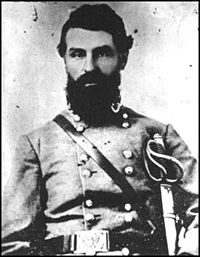 |
Wood, Sterling A.M. | Brigadier General rank: January 7, 1862 nom: January 9, 1862 conf: January 7, 1862 |
March 17, 1823 Florence, Alabama |
January 26, 1891 Tuscaloosa, Alabama |
Pre-war: Graduate of Jesuit College of St. Joseph, Bardstown, Kentucky. Lawyer at Murfreesboro, Tennessee, then Florence, Alabama. Solicitor of 4th judicial circuit of Alabama, 1851-1857. State legislator, 1857. Editor of Florence Gazette. War: Colonel, 7th Alabama Infantry, May 18, 1861. Served at Pensacola. Fought at Battle of Shiloh, badly wounded at Battle of Perrysville. Fought at Murfreesboro and Chickamauga under Major General Patrick Cleburne. Not mentioned in Cleburne's report on the Battle of Chickamauga but other brigade commanders praised. Resigned October 17, 1863. Post-war: attorney for Alabama Great Southern Railway. | ||||
| Wright, Ambrose Ransom "Rans" Ambrose R. Wright Ambrose Ransom Wright was a lawyer, Georgia politician, and Confederate general in the American Civil War.-Early life:... |
Major General (temporary) rank:, nom: November 26, 1864 conf. November 30, 1864 Brigadier General rank, nom: June 3, 1862 conf: September 30, 1862 |
April 26, 1826 Louisville, Jefferson County, Georgia |
December 21, 1872 Augusta Georgia |
Pre-war: Lawyer, politician. War: Colonel, 3rd Georgia Infantry, May 18, 1861. Badly wounded at the Battle of Antietam (Sharpsburg), September 17, 1862. With Army of Northern Virginia until November 1864, then in command in Georgia until the end of the war. Post-war: Lawyer, newspaper owner. Died in December 1872, just after being elected to U.S. House of Representatives. Former Confederate Vice President Alexander Stephens won the special election to fill the Congressional vacancy caused by Wright's death. | |||||
| Wright, Marcus Joseph Marcus Joseph Wright Marcus Joseph Wright was a lawyer, author, and a Confederate general in the American Civil War. He was agent for collection of Confederate records for War of the Rebellion: Official Records of the Union and Confederate Armies, a U.S. War Department publication.-Early life:Wright was born in Purdy,... |
Brigadier General rank: December 13, 1862 nom. December 20, 1862 conf: April 22, 1863 |
June 5, 1831 Purdy, Tennessee |
December 27, 1922 Washington, D.C. |
Pre-war: Lawyer, clerk of common law and chancery court at Memphis, Tennessee. Militia colonel. War: Militia regiment mustered into Confederate Army as 154th Tennessee Infantry. Military governor of Columbus, Kentucky. Fought at Battle of Belmont. Wounded at the Battle of Shiloh. Staff of General Cheatham at Battle of Perryville. Fought at Chickamauga, Chattanooga. Commanded posts at Atlanta, Macon and District of North Mississippi and West Tennessee. Paroled May 19, 1865. Post-war: Lawyer at Memphis, purser of U.S. Navy yard. From 1878 through 1917, agent for collection of Confederate records for the War of the Rebellion: Official Records of the Union and Confederate Armies, published by the U.S. government. Wrote many historical books and magazine articles. One of two Confederate generals buried in Arlington National Cemetery. |
Y
| Image | Name | Rank | Date, Place of Birth | Date, Place of Death | York, Zebulon Zebulon York Zebulon York was a general in the Confederate States Army during the American Civil War. He was among a small group of Northern-born Confederate generals.-Early life:York was a native of Avon, Maine... | Brigadier General (temporary) rank: May 31, 1864 nom: conf: June 2, 1864 |
October 19, 1819 Avon, Maine |
August 5, 1900 Natchez, Mississippi. |
Pre-War: Wesleyan Seminary, Kent Hill Maine; Transylvania University; Law graduate of the University of Louisiana (now Tulane University). Lawyer and cotton planter at Vidalia, Louisiana. War: Recruited a company of the 14th Louisiana Infantry, elected major, lieutenant colonel, colonel, in turn. Fought in Peninsula campaign, Seven Days Battles, Second Bull Run (Second Manassas), Maryland campaign, Fredericksburg; recruiting in Louisiana during Chancellorsville; commanded regiment at Gettysburg and in Overland campaign. Fought in Valley Campaign of 1864. Lost left arm at Battle of Opequon Battle of Opequon The Battle of Opequon, more commonly known as the Third Battle of Winchester, was fought in Winchester, Virginia, on September 19, 1864, during the Valley Campaigns of 1864 in the American Civil War.... or Third Battle Winchester, Virginia, September 19, 1864. Recruited among foreign born prisoners of war. Paroled May 6, 1865, North Carolina. Post-war: Operated York House, Natchez, Mississippi in later years. |
|---|---|---|---|---|---|---|---|---|---|
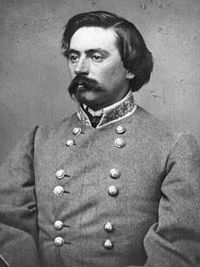 |
Young, Pierce Manning Butler | Major General (temporary) nom: December 29, 1864 rank: December 30, 1864 conf: January 28, 1865 Brigadier General rank: September 28, 1863 nom: October 10, 1863 conf: February 17, 1864 |
November 15, 1836 Spartanburg, South Carolina |
July 6, 1896 New York City |
Pre-war: Family moved to Bartow, Georgia when he was a small boy. Resigned from USMA before graduation in 1861. War: Appointed second lieutenant of artillery in Regular Army of the Confederacy, March 16, 1861. Lieutenant colonel of Cobb's Legion, commander of its cavalry. Distinguished in Major General Wade Hampton's brigade in the Maryland campaign. Colonel, November 1, 1862. Commanded Hampton's old division for part of 1864. Resisted Union General William T. Sherman's advance on Augusta, Georgia and then through the Carolinas.Post-war: U.S. House of Representatives, 1868–1875, later, several diplomatic posts. Buried: Cartersville, Georgia. | ||||
| Young, William Hugh | Brigadier General (temporary) rank: August 15, 1864 nom: August 16, 1864 conf: February 20, 1865 |
January 1, 1838 Booneville, Missouri |
November 28, 1901 San Antonio, Texas. |
Pre-war: Family moved to Texas when he was an infant. Educated at Washington College, Tennessee, McKenzie College, Texas, and finally University of Virginia, 1859–1861. War: In September 1861 recruited and became captain of a company of the 9th Texas Infantry. Promoted to colonel after Battle of Shiloh. Fought at Perryville, Murfreesboro (Stones River), in the Vicksburg campaign with General Joseph E. Johnston and at Chickamauga and Kennesaw Mountain in the Atlanta campaign; wounded at the last four battles, twice at Kennesaw Mountain. Wounded, left foot shot off, taken prisoner at Allatonna, Georgia, October 5, 1864 during the march into the Franklin-Nashville campaign; released and paroled July 24, 1865. Post-war lawyer and real estate operator at San Antonio, Texas. |
Z
| Image | Name | Rank | Date, Place of Birth | Date, Place of Death | Brigadier General rank:, nom: July 9, 1861 conf: August 28, 1861 |
May 19, 1812 Maury County, Tennessee |
January 19, 1862 Battle of Mill Springs, Kentucky |
Pre-war: Newspaper work at Paris, Tennessee at age 16. Served as lieutenant of volunteers during Seminole war of 1836. Returned to journalism and politics after one year's service. Adjutant general, state comptroller, state senator. Three terms in the U.S. House of Representatives until 1859; declined to run for fourth term. Member of "Peace Conference". War: Tried to mollify Union sentiment in East Tennessee. Contrary to General Albert Sidney Johnston's instructions, moved forces to Kentucky side of Cumberland River before his superior officer, Maj. Gen. George B. Crittenden, arrived. Crittenden had to attack the approaching Union force because his force was against the river, precipitating the Battle of Mill Springs Battle of Mill Springs The Battle of Mill Springs, also known as the Battle of Fishing Creek in Confederate terminology, and the Battle of Logan's Cross Roads in Union terminology, was fought in Wayne and Pulaski counties, near current Nancy, Kentucky, on January 19, 1862, as part of the American Civil War. It... (Fishing Creek or Logan's Cross Roads), January 19, 1862. Buried at Nashville, Tennessee. |
|---|
Others
The following officers are not generally considered full-grade Confederate Generals. However, due to increasing communication difficulties and increasing officer casualties in the Confederate Army as the war progressed, historian Bruce Allardice identified an additional 137 officers as arguably worthy of consideration as Confederate generals because of appointment of some sort by President Davis or a general in command in the field and exercise of command for at least some period of time. Many of the officers identified by Allardice, and others who take an expansive view of general appointments, are militia officers who were never mustered into national service, nor did they serve as generals in any campaign. However, the following selected personnel are notable for a variety of reasons. Several of them were assigned to duty as Generals by General Edmund Kirby SmithEdmund Kirby Smith
Edmund Kirby Smith was a career United States Army officer and educator. He served as a general in the Confederate States Army during the American Civil War, notable for his command of the Trans-Mississippi Department of the Confederacy after the fall of Vicksburg.After the conflict ended Smith...
, who, as the commander of the Trans-Mississippi Department
Trans-Mississippi Theater of the American Civil War
The Trans-Mississippi Theater of the American Civil War was the major military and naval operations west of the Mississippi River. The area excluded the states and territories bordering the Pacific Ocean, which formed the Pacific Coast Theater of the American Civil War.The campaign classification...
was generally recognized to have broad power over his department after the fall of Vicksburg
Battle of Vicksburg
The Siege of Vicksburg was the final major military action in the Vicksburg Campaign of the American Civil War. In a series of maneuvers, Union Maj. Gen. Ulysses S. Grant and his Army of the Tennessee crossed the Mississippi River and drove the Confederate army of Lt. Gen. John C...
cut communication between the region and the rest of the Confederacy. Some of these officers are more notable than others that are not listed because they did serve in the field in command of militia units, on guard duty or in temporary command of Confederate Army brigades or divisions. The Eichers call most or all such officers "might-have-beens." About 24 of the officers listed above are shown by Warner and Wright as full generals but in fact their appointments, confirmations and commissions were incomplete or they died before receiving the commission. These may be moved to the section below upon completion of the article.
| Image | Name | Rank | Anderson, Charles David Charles D. Anderson Charles David Anderson was an American planter, businessman, legislator, and soldier. He served as a Confederate general during the American Civil War, in which he was wounded three times. After the war Anderson was a tax collector in Georgia.-Early life and career:Charles D... | Brigadier General, Georgia Militia Georgia Militia The Georgia Militia existed from 1733 to 1879. It was originally planned by General James Oglethorpe prior to the founding of the Province of Georgia, the British colony that would become the state of Georgia. One reason for the founding of the colony was to act as a buffer between the Spanish... |
Militia Brigadier General. Resigned commission as lieutenant colonel in the Confederate Army on January 20, 1864. Thereafter appointed brigadier general of the 3rd Georgia Militia brigade. Brigade fought with the Army of Tennessee in the Atlanta campaign Atlanta Campaign The Atlanta Campaign was a series of battles fought in the Western Theater of the American Civil War throughout northwest Georgia and the area around Atlanta during the summer of 1864. Union Maj. Gen. William T. Sherman invaded Georgia from the vicinity of Chattanooga, Tennessee, beginning in May... ; sent to oppose Sherman's March to the Sea Sherman's March to the Sea Sherman's March to the Sea is the name commonly given to the Savannah Campaign conducted around Georgia from November 15, 1864 to December 21, 1864 by Maj. Gen. William Tecumseh Sherman of the Union Army in the American Civil War... . Wounded at the Battle of Griswoldville Battle of Griswoldville The Battle of Griswoldville was the first battle of Sherman's March to the Sea, fought November 22, 1864, during the American Civil War. A Union Army brigade under Brig. Gen. Charles C. Walcutt fought three brigades of Georgia militia under Brig. Gen. Pleasant J... on November 22, 1864. |
|---|---|---|---|---|---|
| Alcorn, James Lusk James L. Alcorn James Lusk Alcorn was a prominent American political figure in Mississippi during the 19th century. He was a leading southern white Republican or "scalawag" during Reconstruction in Mississippi, where he served as governor and U.S. Senator... |
Brigadier General, Mississippi Militia | Brigadier General of Mississippi State militia. Not appointed and confirmed as a general in the Confederate Army (Provisional Army, Confederate States (PACS)). Post-war Governor of Mississippi and United States Senator. Supported a new college for African-American students, now known as Alcorn State University Alcorn State University Alcorn State University is an historically black university comprehensive land-grant institution in Lorman, Mississippi. It was founded in 1871-History:... . |
|||
| Ashby, Henry Marshall | Colonel | Commander, 2nd Tennessee Cavalry; commissioned a Brigadier General in April 1865 while commanding a division in Maj. Gen. Joseph Wheeler's corps; commission never delivered. | |||
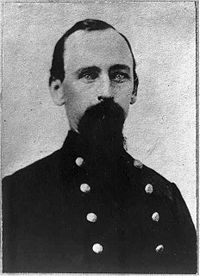 |
Bagby, Arthur Pendleton Jr. Arthur P. Bagby, Jr. Arthur Pendleton Bagby, Jr. was a lawyer, editor, and Confederate general during the American Civil War.-Early life:... |
Colonel | Assigned to duty as brigadier general, March 17, 1864 and major general, May 16, 1865 (to rank from May 10), by General E. Kirby Smith. | ||
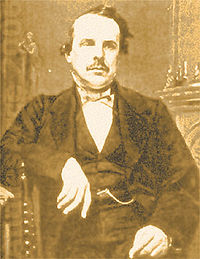 |
Bartow, Francis Stebbins Francis S. Bartow Colonel Francis Stebbins Bartow was an attorney, Confederate States of America political leader, and military officer during the early months of the American Civil War... |
Colonel | Colonel, 8th Georgia Volunteer Infantry Regiment. Brigade commander, commanding two of his brigade's regiments at the Battle of First Bull Run (First Manassas), where he was killed in action. Confederate Congress accorded him the posthumous rank of acting brigadier general. | ||
| Boggs, James | Brigadier General, Virginia Militia Virginia Militia The Virginia militia is an armed force composed of all citizens of the Commonwealth of Virginia capable of bearing arms. The Virginia militia was established in 1607 as part of the British militia system. Militia service in Virginia was compulsory for all free males... |
Commander, 18th Brigade. Served in Jackson's Valley Campaign. | |||
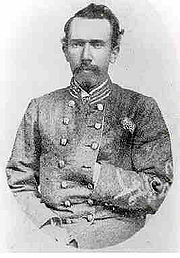 |
Bowles, Pinckney Downie Pinckney Downie Bowles Pinckney Downie Bowles was a lawyer, county prosecutor, probate judge, and a Confederate military officer during the American Civil War.-Early years:... |
Colonel | Temporary commands of brigade or brigade sized units. No record ever promoted to brigadier general despite some sources claiming he was commissioned as such on April 2, 1865. | ||
| Carson, James Harvey | Brigadier General, Virginia Militia | Commander, 16th Brigade. Served in Jackson's Valley Campaign. | |||
| Carswell, Reuben Walker | Brigadier General, Georgia Militia | Commander, 1st Brigade. Served in the Atlanta campaign. | |||
| Chapman, Augustus A. Augustus A. Chapman Augustus Alexandria Chapman was a 19th century politician and lawyer from Virginia.-Biography:Born in Union, Virginia , Chapman studied law as a young adult. He was admitted to the bar in 1825 and commenced practice in Union... |
Brigadier General, Virginia Militia | Commander, 19th Brigade. Served in the Kanawha Campaign. | |||
 |
Clark, Edward Edward Clark (governor) Edward Clark was the eighth Governor of Texas. His term coincided with the beginning of the American Civil War.-Biography:... |
Colonel, CSA; Brigadier General, Texas Militia | Acting governor of Texas, March 18, 1861 – November 7, 1861. Colonel of 14th Texas Infantry. Appointment as CSA brig. gen. not confirmed. Wounded at Battle of Pleasant Hill, Louisiana, April 9, 1864. Brigadier general of Texas state militia, 1865. | ||
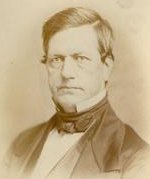 |
Clark, John Bullock John Bullock Clark John Bullock Clark, Sr. was a member of both the United States Congress and the Confederate Congress.-Biography:... |
Brigadier General, Missouri State Guard Missouri State Guard The Missouri State Guard was a state militia organized in the state of Missouri during the early days of the American Civil War. While not initially a formal part of the Confederate States Army, the State Guard fought alongside Confederate troops and, at times, under regular Confederate... |
Antebellum Congressman. Brigadier general of Confederate Missouri State Guard, 1861–1862. Representative and senator from Missouri in Confederate Congress. | ||
| Clark, Meriwether Lewis Sr. Meriwether Lewis Clark, Sr. Meriwether Lewis Clark, Sr. was an architect, civil engineer, politician, and a general in the Confederate Army during the American Civil War. He first served in the Trans-Mississippi Theater as the initial commander of the Ninth Division of the Missouri State Guard and later commanded a brigade... |
Brigadier General, Missouri State Guard Colonel |
Commander, 9th Division. Later a Colonel of the PACS, commanded a brigade during the Appomattox Campaign. Son of explorer William Clark. |
|||
| DeBray, Xavier Blanchard | Colonel | Commander, 26th Texas Cavalry. Assigned to duty as brigadier general, April 13, 1864 by General E. Kirby Smith. | |||
| DeSaussure, William Gibbs | Brigadier General, South Carolina Militia | Commander, 4th Brigade. Served in the Second Battle of Charleston Harbor Second Battle of Charleston Harbor The Second Battle of Charleston Harbor, also known as the Siege of Charleston Harbor, Siege of Fort Wagner, or Battle of Morris Island, took place during the American Civil War in the late summer of 1863 between a combined Union Army/Navy force and the Confederate defenses of Charleston, South... . |
|||
| Fauntleroy, Thomas Turner | Brigadier General, Provisional Army of Virginia | Appointed Brigadier General of the PACS, July 9, 1861, but refused the appointment | |||
| Fiser, John Calvin John Calvin Fiser John Calvin Fiser was an American merchant and soldier. He served as an officer in the Confederate Army during the American Civil War, fighting in both the Eastern as well as the Western theaters... |
Colonel | Commanded a brigade of Georgia reservists in 1865 Carolinas Campaign Carolinas Campaign The Carolinas Campaign was the final campaign in the Western Theater of the American Civil War. In January 1865, Union Maj. Gen. William Tecumseh Sherman advanced north from Savannah, Georgia, through the Carolinas, with the intention of linking up with Union forces in Virginia. The defeat of ... . Appointment as brigadier general in the Confederate Army never confirmed. |
|||
| Ford, John Salmon "R.I.P." "Rip" John Salmon Ford John Salmon Ford , better known as "Rip" Ford, was a member of the Republic of Texas Congress and later of the State Senate, and mayor of Brownsville, Texas. He was also a Texas Ranger, a Confederate colonel, and a journalist... |
Brigadier General, Texas Militia Colonel, CSA |
Commanded Confederate forces at the Battle of Palmito Ranch Battle of Palmito Ranch The Battle of Palmito Ranch, also known as the Battle of Palmito Hill and the Battle of Palmetto Ranch, was fought on May 12–13, 1865, during the American Civil War. It was the last major clash of arms in the war... , Texas, the last battle of the Civil War, on May 13, 1865 |
|||
| Garlington, Albert Cresswell | Brigadier General, South Carolina Militia | Served in the Carolinas campaign. | |||
| Gordon, Benjamin Franklin | Colonel | Commander, 5th Missouri Cavalry. Assigned to duty as brigadier general, May 16, 1865 by General E. Kirby Smith. | |||
| Hagan, James | Colonel | Appointed Brigadier General sometime between February and March, 1865 and referred to as such in official reports; commission never delivered. | |||
| Hannon, Moses Wright | Colonel | Appointed Brigadier General sometime between February 15 and March, 1865 and referred to as such by General Wheeler; commission never delivered, paroled as a Colonel. | |||
| Harman, William Henry | Brigadier General, Virginia Militia | Commander, 13th Brigade. Commanded part of a force that seized Harper's Ferry, April 18, 1861. Later replaced Kenton Harper as Colonel of the 5th Virginia Infantry regiment. | |||
| Harper, Kenton | Major General, Virginia Militia | Commander, 5th Division. Commanded a force that seized Harper's Ferry, April 18, 1861. Later commissioned into PACS as a Colonel in command of the 5th Virginia Infantry regiment. | |||
| Harris, Jeptha Vining | Brigadier General, Mississippi Militia | Served at Battle of Vicksburg. | |||
| Henderson, Robert Johnson | Colonel | Promoted by General Joseph E. Johnston in March, 1865 at the Battle of Bentonville, never confirmed by civil authorities. | |||
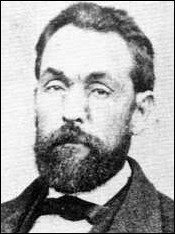 |
Jackman, Sidney Drake Sidney D. Jackman Sidney Drake Jackman was an American farmer, teacher, and soldier. He served as an officer in the Confederate Army during the American Civil War, most noted for his performance in the early part of the Battle of Westport in 1864.After the war Jackman fled to Mexico, then returned to the United... |
Colonel | Commander, Jackman's Missouri Cavalry. Assigned to duty as brigadier general, May 16, 1865 by General E. Kirby Smith. | ||
| King, Wilburn Hill | Colonel | Commander, 18th Texas Infantry. Assigned to duty as brigadier general, April 16, 1864 by General E. Kirby Smith. | |||
| Lewis, Levin Major | Colonel | Commander, 7th Missouri Infantry. Assigned to duty as brigadier general, May 16, 1865 by General E. Kirby Smith. | |||
| Maclay, Robert P. | Major | Major of artillery. Assigned to duty as brigadier general, May 13, 1864 to date from April 30, 1864, by General E. Kirby Smith. | |||
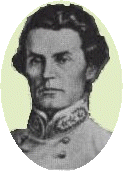 |
McBride, James Haggin James H. McBride James Haggin McBride was an American businessman, lawyer, banker, judge, legislator, and soldier. He served as a Confederate general during the American Civil War, dying in the conflict from pneumonia in 1864.-Early life and career:... |
Brigadier General, Missouri State Guard | Commanded 7th Division at the Siege of Lexington, Missouri. | ||
| McKay, Henry Kent | Brigadier General, Georgia Militia | Commander, 4th Brigade. Fought at the Battle of Griswoldville Battle of Griswoldville The Battle of Griswoldville was the first battle of Sherman's March to the Sea, fought November 22, 1864, during the American Civil War. A Union Army brigade under Brig. Gen. Charles C. Walcutt fought three brigades of Georgia militia under Brig. Gen. Pleasant J... . |
|||
| Meem, Gilbert Simrall | Brigadier General, Virginia Militia | Commander, 7th Brigade. Served in Jackson's Valley Campaign. | |||
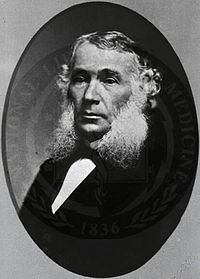 |
Moore, Samuel Preston Samuel P. Moore Samuel Preston Moore was an American physician, who served in the medical corps of the United States Army during the Mexican–American War, and later as the Confederate Surgeon General throughout nearly all of the American Civil War.-Early life and career:Samuel P. Moore was born in 1813 in... |
Colonel, Surgeon General | Surgeon general of the Confederate Army. Frequently listed as a Brigadier General erroneously; repeated attempts to pass legislation giving the post of Surgeon General the automatic rank of Brigadier General failed. | ||
| Munford, Thomas Taylor Thomas T. Munford Thomas Taylor Munford was an American farmer and Confederate brigadier general during the American Civil War.-Biography:... |
Colonel | Recommended for promotion by General Robert E. Lee March 23, 1865 to rank from November, 1864. Commission never received. | |||
| Phillips, Pleasant Jackson | Brigadier General, Georgia Militia | Commander, 2nd Brigade. Served in the Atlanta campaign Atlanta Campaign The Atlanta Campaign was a series of battles fought in the Western Theater of the American Civil War throughout northwest Georgia and the area around Atlanta during the summer of 1864. Union Maj. Gen. William T. Sherman invaded Georgia from the vicinity of Chattanooga, Tennessee, beginning in May... . |
|||
| Randal, Horace | Colonel | Commander, 28th Texas Cavalry. Assigned to duty as brigadier general, April 8, 1864 by General E. Kirby Smith. Wounded at Battle of Jenkins' Ferry Battle of Jenkins' Ferry The Battle of Jenkins' Ferry was fought April 30, 1864, in Grant County, Arkansas during the American Civil War. It was the climactic battle of the Camden Expedition, which was a part of the Union Army’s failed Red River Campaign. Each side sustained a large number of casualties, especially... , April 30, 1864; Died of wounds, May 2, 1864. |
|||
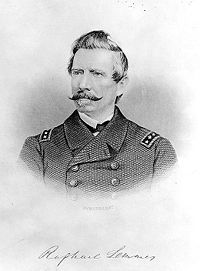 |
Semmes, Raphael Raphael Semmes For other uses, see Semmes .Raphael Semmes was an officer in the United States Navy from 1826 - 1860 and the Confederate States Navy from 1860 - 1865. During the American Civil War he was captain of the famous commerce raider CSS Alabama, taking a record sixty-nine prizes... |
Rear Admiral, Confederate States Navy Confederate States Navy The Confederate States Navy was the naval branch of the Confederate States armed forces established by an act of the Confederate Congress on February 21, 1861. It was responsible for Confederate naval operations during the American Civil War... |
Assigned as a Brigadier General by President Davis to command the Danville Danville, Virginia Danville is an independent city in Virginia, United States, bounded by Pittsylvania County, Virginia and Caswell County, North Carolina. It was the last capital of the Confederate States of America. The Bureau of Economic Analysis combines the city of Danville with Pittsylvania county for... defenses. |
||
| Smith, Francis Henney Francis Henney Smith Francis Henney Smith was a United States Military Academy graduate, United States Army second lieutenant, college professor, including teacher at West Point, Confederate Army colonel, Virginia Militia general, first superintendent of Virginia Military Institute and its rebuilder after the American... |
Brevet Brigadier General, Virginia Militia Colonel |
Commanded 9th Virginia Infantry Regiment and Virginia Military Institute Corps of Cadets battalion. USMA graduate. Superintendent of VMI from 1839 through 1889. | |||
| Terrell, Alexander Watkins Alexander W. Terrell Alexander W. Terrell was a U. S. minister to Turkey and a Confederate military officer.-Biography:Terrell was born in Patrick County, Virginia. In 1831, his Quaker family moved to Boonville, Missouri. He graduated from the University of Missouri and was admitted to the bar in 1849. He practiced... |
Colonel | Commander, 34th Texas Cavalry. Assigned to duty as brigadier general, May 16, 1865 by General E. Kirby Smith, two days after disbanding his brigade. | |||
 |
Thompson, Meriwether Jeff M. Jeff Thompson Meriwether Jeff Thompson was a brigadier general in the Missouri State Guard during the American Civil War. He served the Confederate Army as a cavalry commander, and had the unusual distinction of having a ship in the Confederate Navy named for him.-Early life:*Father: Meriwether Thompson b.... |
Brigadier General, Missouri State Guard | Commander, 1st Division. Later placed in command of regular PACS Brigade (Shelby's Iron Brigade Shelby's Iron Brigade Shelby's "Iron Brigade" was a Confederate cavalry brigade in the Trans-Mississippi Theater of the American Civil War.The brigade originally formed under orders from Major General Thomas C. Hindman following a successful recruiting expedition into Missouri by Joseph O. Shelby, John T. Coffee, and... ) by Major General Sterling Price. |
||
| Walker, Francis Marion | Colonel | Killed at Battle of Atlanta, June 22, 1864; commission received June 23, 1864. |
See also
- General officers in the Confederate States Army
- General officers in the United States

